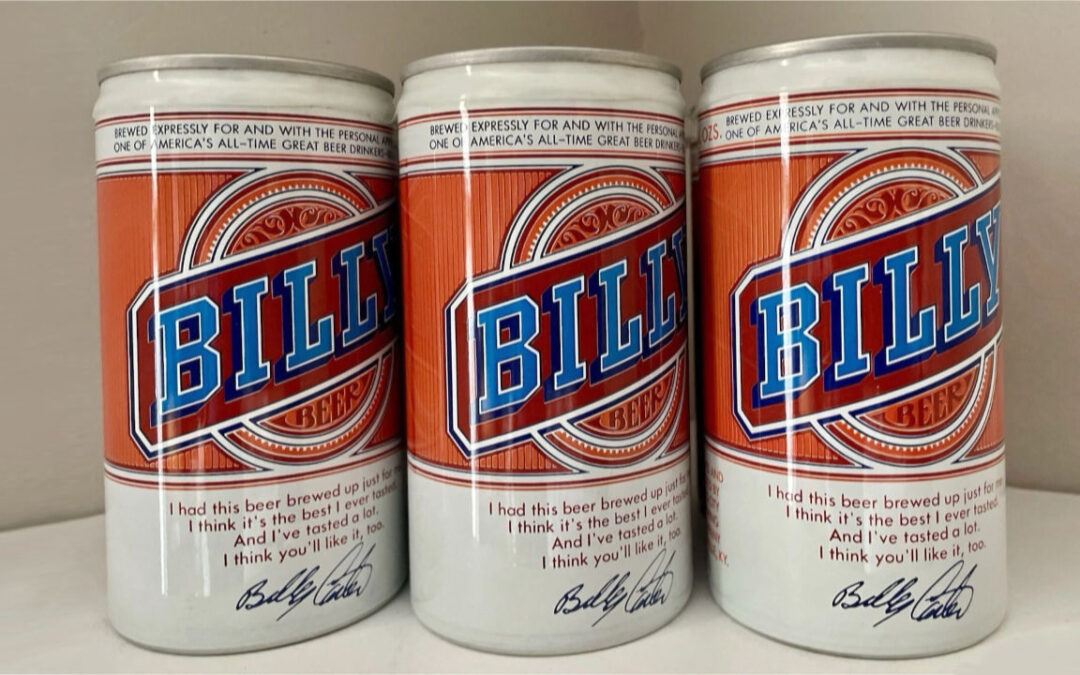
Ethics Made Me Miss the Boat
When I started to practice law, Jimmy Carter was elected president. To avoid some unimaginable conflict of interest, he sold his family farm for peanuts. Since I retired from the practice of law 10 years ago, apparently the ethics have changed.
President Trump for his birthday last week gave himself a military parade, which which cost the American taxpayers approximately $25 million and tore up the streets of Washington.
Several news services have recently reported that since the early days of President Trump‘s reelection campaign he has made more than double his net worth, about $5.4 billion dollars.
In the past, I would’ve been horrified, but now my reaction is that it’s a shame I didn’t somehow make a bigger profit back when ethics prohibited me.
Back during those ethical times I would preach to the lawyers at my firm that the easiest way to check your professional ethics is to ask yourself if what you were about to do would be embarrassing if it would become a headline in the New York Times. If so, don’t do it.
President Trump has re-organized and turned upside down the professional ethics of the presidency and the ethics I was used to. Everything unethical or untrue that Trump has done now is routinely front page headlines on the New York Times, which nobody reads anymore.
I have gone back to thinking about how rich I would be if I’d taken on cases that I ultimately rejected long ago because of ethical concerns.
Consider the amount of money I could’ve made if I had taken that case long ago of two Hindu businessmen who came into the office and told me they wanted to incorporate (for personal liability reasons) an ongoing business that provided Hindu Americans a chance to bury their families in the Ganges River for about $5,000 per loved one.
They told me that the contract that they offered guaranteed that the loved ones ashes, with which they were entrusted, would be respectfully sent to the Ganges, a boat would be hired as well as a videographer to make a movie of the ceremony as the ashes were transported in a beautiful urn, and a man rowing the boat out in the Ganges would be filmed opening the container and emptying it so the ashes were visible as they were were gently poured into the river.
The $5,000 would be collected in exchange for the video of the ceremony.
I will admit I was intrigued by this novel, religious practice and I asked about the heavy cost of the procedure and the profit they were making per contract.
Without batting an eye both businessmen looked at me and said it was about 95% profit. I asked them how could they possibly make such a profit and they answered: “We send everyone the same video.”
If you’re using the same video and you are making a 95% profit you certainly don’t have to be greedy. You could include a beautiful hologram of the soul rising from the Ganges and fluttering off into reincarnation.
Also they completely missed the opportunity for relics, swag, and real cool T-shirts.
When you include the total Trump’s family and political friends have made in the “pay to play” access and favors, which have included the opportunity to show your personal love and respect by purchasing Trump bitcoin and Trump Bibles, and such gifts as an airplane from the government of Qatar, no wonder Trump wants a third term.
I was so stupid I refused to represent the two Hindu businessmen, even though they generously offered me a free burial in the Ganges.
I could also have befriended the President by referring him to another client who I rejected. For a while, “viatical contracts” were easy money. Several people had the idea at the same time. During the AIDS epidemic several entrepreneurs were going into hospitals or hospices and offering to buy life insurance policies at about 10% of their face value from those who would soon die. There’s nothing illegal about that, but for me it didn’t pass the smell test.
There is some justice in the world. Once effective HIV treatment became available, they were stuck continually paying for ongoing life insurance policies.
I suspect that the Trump family has already seen the future of medical profit as is evident from the appointment of Robert Kennedy, Jr. and the future of TMD (Trump Measles Deterrent). This is not a vaccine. it is free and called “The Trump Blessing,” which is administered over a Zoom call after you buy some of the remaining overstocked Bibles that will become collectors items soon.
I think the only benefit Jimmy Carter received from his presidency was a gift given by his brother: a couple of cans of Billy Beer.
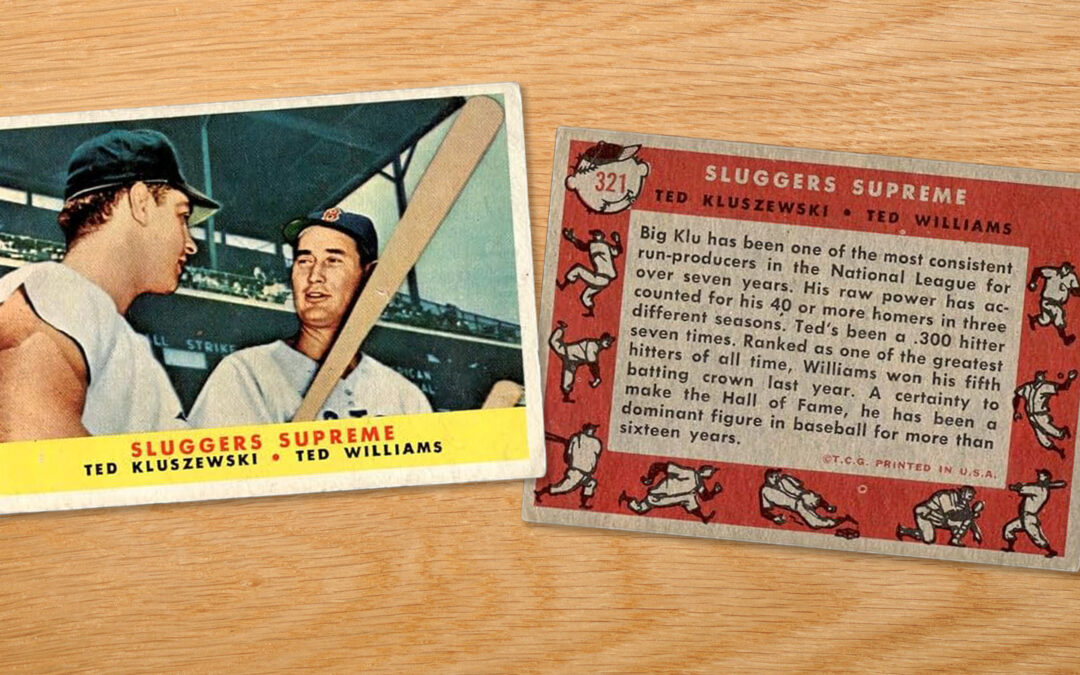
Hold onto Your Baseball Cards and Don’t Lose Your Marbles
Have you been following the economics of this country recently?
Guess who was invited to President Trump’s private event for customers of his cryptocurrency business on Thursday and given a White House tour on Friday?
I wasn’t!
I called my friends, Peter, Belinda and Liza, to see if they had been part of this same oversight by the President.
Peter, Belinda and Liza and I were neighbors during our middle school years and have been friends ever since for over 60 years, and all of us were there from the beginning of cryptocurrency.
They weren’t invited either!
We concluded that this oversight by the President was not his fault and was due to only one possible interpretation.
Our President does not know a lot of American history or, to be a little more polite, he has not yet become aware of the true history of cryptocurrency.
As the rest of us already know, cryptocurrency was quietly created after Nixon took the country off the gold standard. Quite conveniently, it was the same time the first Topps baseball cards were issued in five-card packs with a card size slab of bubblegum included.
The retail cost was five cents per pack. A penny for each card and the bubblegum was free — age appropriate pre-pubescent genius marketing.
A half century before cryptocurrency entered the world stock market, Peter and I were both early investors in baseball cards, and then found another lucrative market in marble monopolies. We were early traders in pre-crypto middle school cards and marbles during recess.
Peter cornered the marble market so effectively that the marble market collapsed after he won all the marbles.
I tried to make a run on “big marbles” so I dressed up my little middle school self and went to pawn shops and antique stores looking for clear round door knobs.
Regrettably, no door knobs are completely round and thus valueless in the larger marble markets.
As a result — for the good of the market — Peter gave a written announcement handed out to the neighborhood that he would be emptying several boxes of marbles to the neighborhood market for free one late spring Saturday afternoon. It happened out of a second floor window with the driveway below. It was an early example of flooding the market.
Peter emptied five bankers boxes of multi currency marbles, including “puresy boulders” and several stunning “jumbo spirals.” The market was saved and Peter had made recess fun again.
Baseball cards back then were “to die for,” particularly if you had a complete set. Peter had a complete set of baseball cards for the years 1957, 1958, and 1959.
Even in middle school, you knew these people were serious people! Peter was a born collector and became a well known New York art dealer. Liza became a respected museum curator in Washington DC, and Belinda became a brilliant art writer and critic.
In the alternative, when I went off to college, my mother emptied my closets and threw away all of my marbles and baseball cards… and I became a lawyer.
At the same time as Trump’s cryptocurrency banquet and tour of the White House, his administration announced that they would be retiring the penny because it was not cost-effective to produce it anymore. They had determined that it took four cents to produce a penny. Think about the appreciated value of just one card, bought for a penny. Or even better, a complete set.
Ever since Nixon took us off the gold standard, our currency, stocks and bonds, like cryptocurrency, have no value other than the theoretical value according to the market.
However, with marbles and baseball cards, unlike cryptocurrency, there is the added component of artistic beauty. They are self valuing and hold a valuable historical record on the flip side of the picture — batting average and stolen bases and other stats.
Also, the bubble gum is great for the dental economy.
Hold onto your baseball cards and don’t lose your marbles!

A Complete Unknown
When Susan and I flew to Paris again this year for three weeks this spring, I had planned to watch the Bob Dylan movie, “A Complete Unknown” on the flight that night, but I was too tired so I slept instead.
Paris was warming to its spring as we landed at Charles De Gaul airport and traveled into the heart of Paris to a beautiful flat with its view of the Seine from its fifth floor living room and bedroom windows on the Île Saint-Louis.
The six hour difference in the time between the East Coast of the United States and Paris delayed the news reports that poured into my cell phone at three in the afternoon Paris time as America woke up and went to work.
The distance and the time change diminished my obsession to keep up with America’s politics, but nothing could uncouple it from my daily concerns.
Over our three weeks, Susan and I committed to walk the city, but for longer trips to Montmartre or the outskirts of Paris to the Louis Vuitton Museum to see the huge new David Hockney exhibit, we took the Metro.
Each evening, we would go to one of the little restaurants on Île Saint-Louis and then climb the stairs or take the little elevator to the flat to read the news before bed.
Last year. we had taken three days off from Paris to go to the LaVar Valley to stay in a beautiful Château and visit the region’s medieval history. This year, we went to Normandy and, as I observed the beaches and cliffs, and finally the dramatic American cemetery, the pride I’ve always felt for America rekindled with my respect.
On the morning that we flew back in mid May, Paris was in full bloom as we got on the plane to fly into the upcoming day on our return to the United States.
I again committed to watch the Bob Dylan movie on our way home.
Even though it had been out for some time, I still had not seen it, but I knew enough from the reviews that it was about the transition from Dylan’s early folk years to the electric folk rock that Dylan made in 1965.
In the fall of 1965, I had started my first year at the Cambridge School of Weston, a progressive high school that knew something about learning disorders and thus was unlike the boarding schools and summer schools I had attended previously.
It was my second try at 11th grade. My new school was so very different in so many ways, but as my classmates wore sandals and blue jeans and played guitars out on the quad or went off to the ceramic studio and the wide range of classes offered, I attended my classes in a sport jacket, but eventually gave up on the tie.
I believed I was in transition to a better place and I believed that from the start. I was hoping that repeating the 11th grade would rekindle my love of learning in a new environment with a fresh start.
Within weeks of my first day, a sign-up sheet went up in the dining room, which offered tickets and a bus ride provided by the school to see Bob Dylan play in a Boston theater.
I signed up with about 15 of my fellow students and we got on a little bus to go down to the theater.
When we got to the venue in downtown Boston, we were told that it had been sold out almost immediately and, though we had paid for our tickets, no seats had been assigned for us.
The theater instantly took action and placed folding chairs in a semicircle on stage directly behind Bob Dylan.
The first half of the performance was all Bob Dylan singing his folk songs in front of an adoring audience with us directly behind him.
When the audience returned to their seats for the second half of the program, however, a rock ’n’ roll band was now set up to back up Dylan. We pushed our seats back further to accommodate the instruments and cables.
When Dylan entered, he was met with catcalls. I could not believe what was happening in front of me. I sat, self-conscious and a little bit frightened, as Dylan faced the catcalling audience.
Dylan played the first few songs with the electrical back up in the midst of the continuing catcalls.
Somewhere in the middle of one of those songs, a very loud voice broke through and yelled something like, “You sold out!”
Dylan stopped the performance. After a very awkward moment, the silence was broken by Dylan’s voice over the microphone:
“I don’t believe you!” he said, and there was a smattering of applause as he signaled to start the song again, resuming the concert.
As the movie portrayed the transition at the Newport Folk Festival from folk to folk rock, Dylan spoke those same lines to that hostile audience and I returned momentarily to being a teenager on the back of that stage. But I was proud to be there rather than surprised and frightened by the event.
As we landed at Dulles Airport in Washington DC, and returned to our political world, I felt reborn and re-nourished by the experience.
I had this very odd feeling that these juxtapositions had reawakened me to the messy but resilient democracy in which I have been fortunate to have lived and prospered.
Somehow, America, through its history, has been endlessly capable of being reborn, newly appreciative of what the Declaration of Independence and the Constitution have provided for each generation.
Shortly thereafter, I laughed when the news reported that Harvard University had discovered in its archives an original copy of the Magna Carta, which had been presumed to be a copy, purchased in England for less than $30 after the Second World War. It turned out to be the thing itself.
It was a great trip to Paris, which taught me yet again how much I love this country.
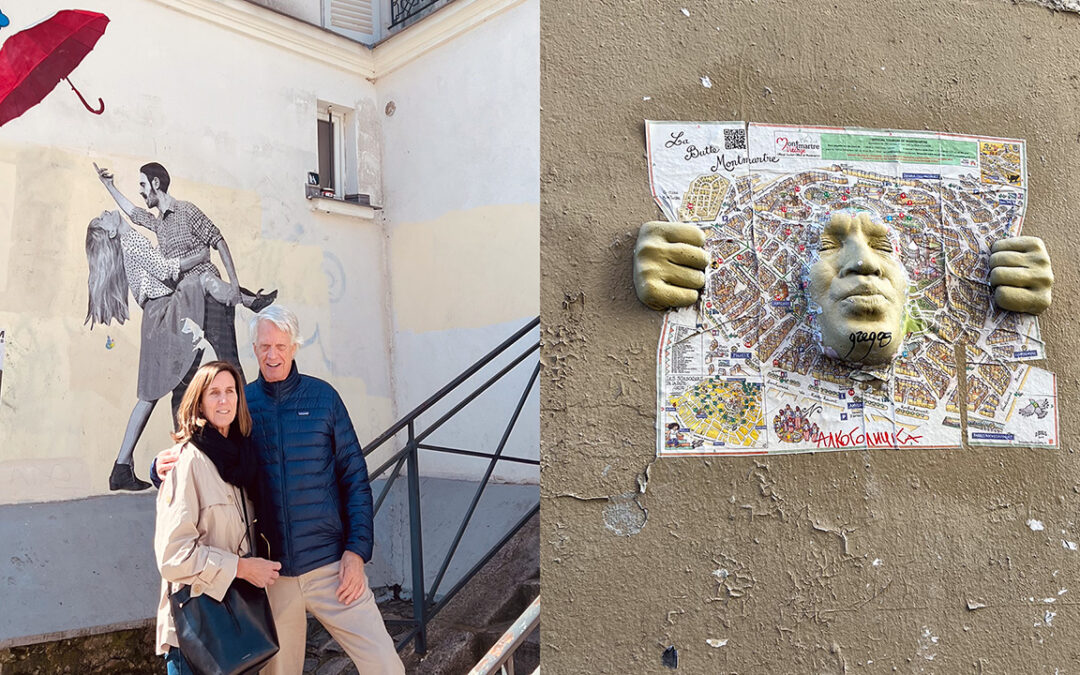
April in Paris + a Week in May
I’m not really worried about Trump taking over Harvard, so Susan and I are going to Paris this Saturday for a couple of weeks.
Why is everybody so upset? It seems like all the commentators have completely overlooked Trump’s leadership skills when he ran Trump University.
Trump has been very vocal about his business acumen and, by his own account, he ran the university brilliantly for the five years before its bankruptcy.
There was some unsubstantiated criticism about gold toilet seats, but he claimed he was always very hands-on and was good at keeping the overhead low.
For example, despite its name, Trump University was never an accredited university or college. It did not confer college credit, grant degrees, or grade its students.
Think about the savings on the cost of paper.
In contrast, the data from the 2023–24 academic year, 72% of Harvard University’s first-time, full-time undergraduates received financial aid. In the alternative, Trump University was apparently so popular, it never needed to offer scholarships. And Trump has already said that he wants to get rid of Harvard’s nonprofit status.
Really! So where is the art of the deal?
Harvard is not effectively selling its product! No. Harvard has been giving it away for free.
What is also great is that Trump has the experience to navigate these litigious times. In 2011, Trump University became the subject of an inquiry by the New York Attorney General’s office for illegal business practices, which resulted in a lawsuit filed in August, 2013. It was also the subject of two class actions in federal court. The lawsuits centered on allegations that Trump University defrauded its students by using misleading marketing practices and engaging in aggressive sales tactics.
Of course!
Everyone knows that Trump is a marketing genius! Okay, let’s get down to what Trump‘s real motives may be.
Both schools have one thing in common.
Neither school has a mascot.
Everybody knows that Trump is a master marketer. I think the hidden agenda will be that Trump will insist that Harvard finally adopt a formal mascot, befitting our country’s white Christian heritage: a Pilgrim, of course!
But even more importantly, this way he can get rid of that out of date logo “Veritas” and change it to “If you piss off a pilgrim, you’ll get yourself a witch trial.” Then he can raise money at halftime with a raffle where the winner gets whisked away for a lifetime in El Salvador.
Anyway, just like last year, Susan and I will be sending back Parisian commentary and pictures to celebrate our spring time and hopefully brighten yours. À bientôt!

The Best Memory You May Have Ever Had
If you’re like me, the best memory you ever have had is an act of self-deception that you can’t remember. However, if you happen to stop forgetting for only a fraction of second it will be abrupt recollection.
It is like if you have ever accidentally slammed a door in your own face. It’s not easy to do, but you’ll remember it if you succeed.
On the first day of spring this year, I had one of those abrupt remembrances.
My New Year’s resolution this year is to get into better physical shape this spring. Unconsciously, of course, I have been getting less and less inclined the closer I get to springtime when I must start fulfilling my commitment to myself.
The truth is this New Year’s resolution has been the same New Year’s resolution I have made each year for over 20 years, but each previous spring I had successfully forgotten that years’s resolution.
Then I stumbled upon one of the sonnets in the book I wrote more than 20 years ago, entitled “Marathon Man.”
This year the door slammed in my face. Coincidentally, it occurred on the first day of spring last week, at a doctor’s appointment when I was told I must start exercising. I had forgotten that over 20 years ago I wrote “Marathon Man.” which made it much worse.
It starts:
The Marathon Man
“In a world of educated guesses
About one’s loves, integrity and health,
It is my custom to keep promises,
Even if they are only to myself.”
This is the perfect example of delusions of grandeur, which I had pleasantly forgotten into a magnificent memory of never committing to exercise, which is regrettably false.
As early as I can remember, I have consistently joked that I was so lazy I played goalie in all sports to avoid running laps. (The coach always shoots on the goalie while the rest of the team runs laps.)
But in my defense, technically being a goalie is not about the commitment to never exercise. It is a commitment not to exercise that I practiced religiously. I never committed to exercise. That’s entirely different.
Nonetheless, I’m highly competitive.
My memory is that I have saved myself from exercise to avoid injury so I will be ready for the senior Olympics when some doctor finally tells me I must exercise.
I have been told this before over 20 years ago when I was the marathon man but still as lazy and competitive as always.
Back then, I challenged a friend who is a very good runner to a 10 K race, but I got a 10-minute reduction of my time as a handicap to even the odds. For about three weeks before the race, I committed to run a mile around the high school track and, as a further commitment, I would eat four raw eggs poured out of a blender because I had seen “Rocky” the movie and Rocky did that.
It didn’t go well, which led to the delusion of grandeur in the form of a marathon. As is indicated in the third stanza:
“I trained on a treadmill, March to July.
Got my first runner’s high at 55.
Depleted my life‘s endorphin supply,
and blew out both knees and begged to die.“
So this time the doctor prescribed a certain number of steps as a target for each day. The doctor reminded me hopefully that it would also get me outdoors and into sunlight neither of which happened.
At the end of every day around midnight, before bed, I would find myself doing endless laps around the dining room table to meet my minimum requirement of steps.
Covid helped me along. My wife, who exercises regularly, proudly told me one evening her total steps and asked me about mine. I had decided to take the day off, so I happily worked and read pretty much all day. My total step count was around 50. Which probably is two trips to the bathroom and one to the kitchen.
Then I ran into this damn poem and I don’t feel good about getting ready for the senior Olympics. I feel my lethargy has not sufficiently ripened.
The sonnet ended with this final couplet:
“Oh yes, but the hell with all this fun;
Next year, for sure, I’ll be ready to run.”
— “An Accidental Diary: A Sonnet a Week for a Year” by Robert Bowie, Jr.
https://a.co/eg2uDCx
That was 20 years ago. No escaping it now. The door slammed in my face.
I guess I better go try to find my shoes.
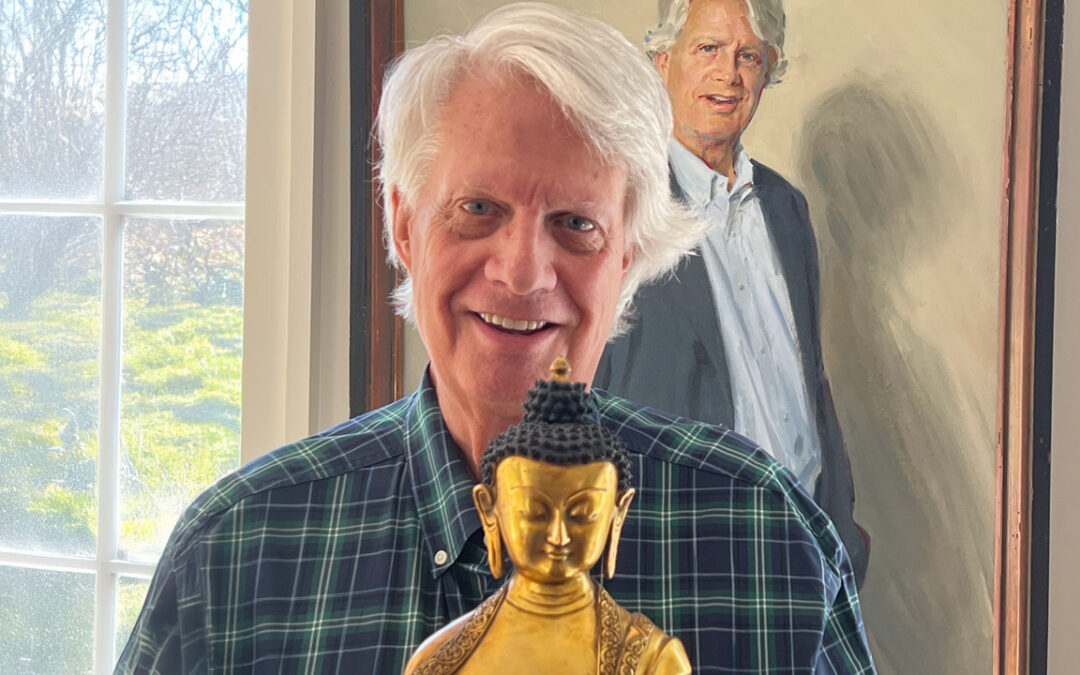
The Butterfly Effect and My Accidental Enlightenment
In Buddhism, there are instances of instant enlightenment brought by shock or surprise.
(I feel it is okay for me to comment on Buddhism and its wisdom as long as I admit to you that I know nothing about it.)
Nonetheless, I offer an example:
There are instances where a monk will slap a student of Buddhism to surprise them or shock them into enlightenment.
I have always worried about this experience of receiving shock and resultant enlightenment ever since I may have accidentally shocked some Buddhists out of their enlightenment.
It all occurred in the second floor men’s room of The Charles Hotel in Cambridge, Massachusetts.
Many years ago, I took a morning plane to Boston dressed travel casual, with my blue suit, white shirt, tie, black socks and black lace-up shoes in my suitcase. I was to attend important meetings that afternoon in Cambridge.
When I got to The Charles Hotel in the early afternoon, I was informed my room was not ready. I had nowhere to change into my suit.
I was told the delay was because the Dalai Lama and his large entourage were staying at the hotel. The Dalai Lama was there to plant a tree in Harvard Yard with the Harvard president and then scheduled to go off to Foxborough to give a message to the masses in the football stadium. Apparently, the hotel was behind schedule because of these new guests.
Since I couldn’t get into my room, my only alternative was to go to the second floor men’s room of The Charles Hotel with my suitcase and haul it into the handicap stall of the public men’s room, where I would have enough room to change.
I put the suitcase on the toilet seat and began to disrobe and change into my business attire.
I hung my suit on the back of the stall door, unpacked my black shoes and pulled out my dark socks, and was starting to put on the white shirt when I heard the unexpected sound of chattering female voices exploding into the men’s room.
There seemed to be a great urgency and effort to bring in two people who were in wheelchairs. One, a very old woman and the other, a very old man. These voices were not in English.
I stood there, stunned with my suit pants in one hand and a black sock in the other and stood listening. It sounded like a kitchen in a busy restaurant.
I tried to peek through the crack in the door, but only saw a flurry of female activity. All I could make out was at least one person, perhaps more, had an urgent need to go to the bathroom.
I waited patiently with my sock and my pants, but nobody was leaving. It was as if everybody, male or female, had to urgently go to the bathroom.
I waited for nearly 10 minutes, but I was late for my meetings, so I had to make a decision about what to do.
I quickly dressed and repacked my suitcase. I decided to open the door and just march straight through this mob of people.
Given the circumstances, this was a very rude thing for me to do, but given the fact that I was in a men’s room, I felt entitled.
With my suitcase in one hand, I pushed open the door and confronted the group.
Instantly, there was stunned silence and, as if my mind were a flash camera, I had a mental picture of as many as 20 colorfully-dressed people staring at me with their mouths open.
There were people staring as they stopped washing their hands. There were people staring as they stopped midway through entering or exiting a stall. Everything was frozen.
Then there was a collective gasp. Not a shriek or anything, just a gasp. I tried to pretend I was invisible as I barreled toward the exit with a sea of bright colors parting on both sides.
I may have caused significant damage. Or, possibly, I shocked some of the entourage into a different vision of enlightenment.
First, it was clearly an emergency of some sort. Somebody had to really go to the bathroom badly and I fear it was an old person.
Second, these were elderly people in wheelchairs and I am not handicapped but I was in a handicap bathroom.
Third, and finally, I consider myself a very sensitive person but even if I had no empathy at all, one must consider reincarnation in all of this.
I offer no excuses. I think there may have been damage done to me, as well. I’m certain my karma is permanently shot. If there is reincarnation, I shudder to think what I will come back as.
So I’ve confessed it. I will also confess that I’m a believer in the “butterfly effect,” which is that every action causes a ripple across the universe.
If anything good comes from this, it is simply that I can warn you to be careful if you run into a similar situation.
You never know when a cosmic event will hit you.
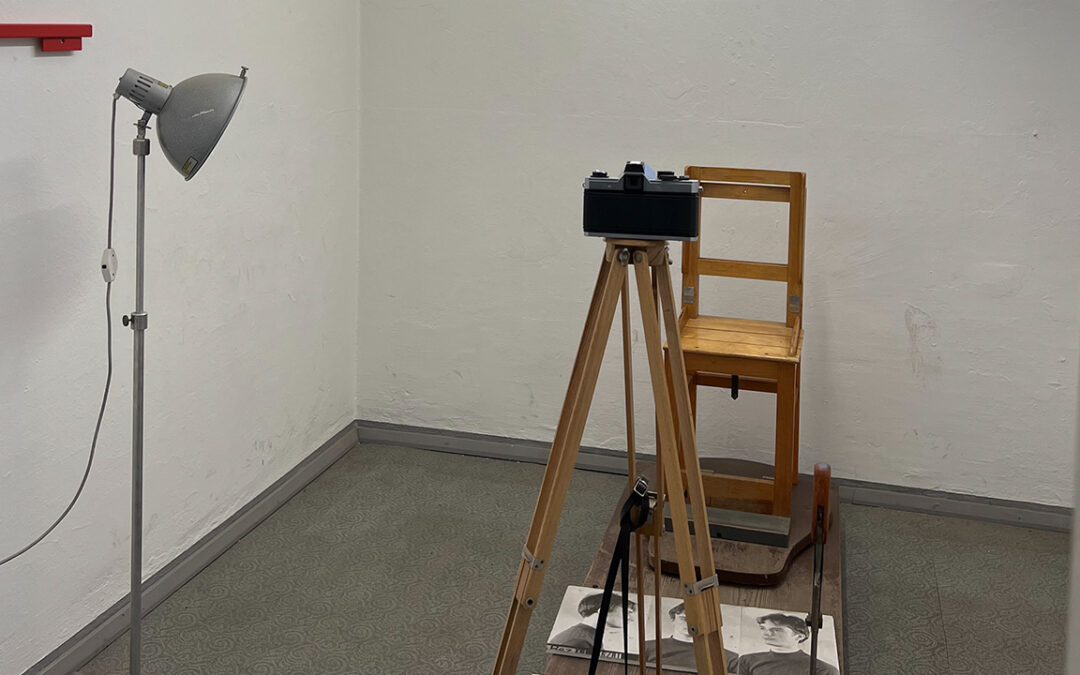
It’s Important to Know That Claustrophobia Can Be Funny
I am an American, who loves our country, but hates its present polarization. I have not written about politics over the last several months because I have been putting together and marketing my book “The Older You Get the Shorter Your Stories Should Be.” However, any chance at humor will break down my resolve to avoid politics and be politically incorrect.
Today I couldn’t resist the humorous head-on collision of President Trump being sworn in (without his hand on the Bible) at the same spot where almost 50 years ago, Jimmy Carter, a devote Christian, was sworn in as our 39th president. But it got more ironic after Donald Trump was sworn in where four years before he had led an insurrection to overthrow the election that he had lost and, within hours after being sworn in, signed an executive order releasing 1500 people convicted of the insurrection. It made me laugh to think of poor Jimmy rolling over face down, as he lay in state.
Of course, my observation was random this morning because I had been randomly leafing through the section of the book entitled “It Can’t Happen Here” and found, on page 159, “Back to the Future.”
What made me laugh and write this now was a feeling of claustrophobia, which made no sense. I know this is dark and perhaps inappropriate, but we still have to figure out how we can all laugh together again at the absurdity of all this irony.
—
Back to the Future
Last month I took a trip because I wanted to “feel” what it was like to live in WWII Germany and the Soviet Cold War occupation in Czechoslovakia and Poland.
I already knew the dates, places and times from textbooks, but it’s quite different to experience what it was like to have lived during those times.
Of course the trip would come alive in museums and, unexpectedly, it brought back for me a long lost feeling I had years ago when I was just a young boy. I had gotten lost off shore in Buzzards Bay in a small motorboat that was running out of gas on an outgoing tide in thick predawn fog.
It is odd how we learn through memories and association.
How odd that museums, which were about imprisonment, brought back the feeling of drifting out to sea, creating an odd claustrophobia without barriers other than an endless borderless fog.
The claustrophobia slowly kicked in when I visited Checkpoint Charlie, the famous heavily guarded passthrough in the Berlin Wall, which kept the East Germans imprisoned inside.
It started with a set of pictures of a boy who had scrambled to climb the wall in an effort to live in freedom, but the photos chronicled how he had died riddled with bullets, hanging from barbed razor wire near the top of the wall.
How odd that I could feel claustrophobic under wide-open skies?
A few days later, the claustrophobia increased in one of the East German museums that focused on the Nazi SS and their little gray bread trucks. These had no windows, just a sliding door on one side and three closet-sized cells so small that prisoners could not stand but only sit in a narrow chair, hands by their sides, while they were taken to a concentration camp somewhere outside of Berlin.
A few days later as we traveled toward Prague, we stopped at another prison that was three or four stories high with interrogation cells on the top floor. The inmates who would not answer were showed pictures of their family who would be killed if they continued to resist.
Putin had spent six months in the house across the street when he was in Soviet intelligence, attempting to flip the tortured inmates to become Soviet spies.
The claustrophobia wrapped around me in that silent building when I realized what it must have felt like day and night in there. It was missing the noise of slamming cell doors, the echoing screams and the smell of the single bucket in the corner, which acted as a bathroom in each cramped cell, with three to a single bed and no mattress.
I know now why the feeling I had on this trip was claustrophobic but I thought it was still an odd reaction to the history of the past until I realized I had lived my whole life free in a democracy.
All of a sudden, I felt imprisonment under borderless wide open skies as a psychological imprisonment which became unbearable.
All of a sudden, I could feel the last breath of the boy crucified and bleeding from razor wire on the top of a Berlin Wall as a reaction to my claustrophobia and his death.
Years ago, as I slowly ran out of gas in my little boat, I saw the outline of a cliff as the late morning fog broke. There were connected ladders and a climbing set of stairs. I beached the boat and climbed to the top of the cliff and knocked on the door of a little cottage overlooking the ocean.
A woman with the Sunday newspaper tucked under her arm answered the door. I breathlessly asked, “Where am I?” She looked at me quizzically and answered “Menemsha,” then paused, “Martha’s Vineyard,” and then paused again… “The United States of America.”
I remember feeling happy and alive.
—
My only hope is that we can end this polarization with the brilliance of our democracy as we go into the future.

Geezer Freezer
At 8:30 pm, kickoff time last Saturday night, it was four degrees below freezing but that didn’t bother me because I am still a young man and invincible. The truth is I was probably the oldest geezer at this playoff game at Ravens Stadium that night.
The only concern I had was how many layers I needed. I figured about three or four layers would keep me warm. I put on hiking boots, double socks, old long johns, regular zip-up khaki pants, zip-up snow pants with a snap at the top to hold it all together and then, above the waist, two parkas layered on top of each other, and my Ravens’ Ray Lewis jersey, then finished off with thick gloves and a hat that I could pull down over my ears. I probably looked like a Michelin Man moments before a career ending explosion.
As I dressed for the game, it never occurred to me that this might be absolutely the coldest I wiould ever be in my whole life.
Susan and I have compiled six season tickets on the rail at the corner of the end zone. These tickets are great because they are so close to the field it is like watching high school football.
I bought the tickets over 20 years ago when my son, age 12 and under five feet tall, announced he wanted to be a quarterback and begged me to get us Ravens tickets, which I did.
Of course, as soon as I had purchased the tickets, my son asked my assurance that if, per chance, the Ravens went to the Super Bowl we would also go to the Super Bowl, to which I agreed.
Even the Las Vegas odds makers were good with that bet. Much to my horror, that year we went to the Super Bowl and I found myself behind a 711 in a dark parking lot peeling off $100 bills to get tickets to Tampa Bay where the Ravens would beat the New York Giants.
Nonetheless, in the first game of that very first season, way before that Super Bowl, we met lifelong friends who would occupy the seats behind us. The father sat right behind me on the aisle and, next to him, right behind my son, was his son Derek, who was several years older than my son. Derek listened to the game with a headset while we all watched live. The first play there was a whistle blown, and all the people behind us burst into rowdy inquiries about what the hell was that whistle for.
My son, already a scholar of the game, immediately turned around and answered: “The quarterback took a step before the snap.” Instantly, the stadium announcer repeated the exact same words my son had said, as did the announcer on the radio, which Derek then quoted. From the beginning, Derek, his father, his family, and Rick and I became friends and have remained friends ever since. Derek, from the start, was a fact checker and reserved, thoughtful observer.
During the regular season, we give the tickets to our children and watch the games on TV. However, if the Ravens got into the playoffs, you gotta go!
So that’s how I got to see Derek again for the first time this year at Saturday’s playoff game. Everybody was bundled up, but the hugs and the high fives were everywhere as the stadium filled and became more and more raucous.
Despite my layering, I started to get cold as soon as I got out of the car. We had about an eight-minute walk to the stadium. I proved to myself what I had often heard, that you lose 30 percent of your heat from the top of your head, so I pulled the hat down over my ears as I plodded toward the stadium.
I was shaking with cold by the time we reached our seats. I wanted to take pictures with my phone but I had to take off my gloves first. I had no place to put my gloves so, finally, I tucked them into my hat and put my hat back on. Then I started to shake and the hand warmers fell with my gloves, onto the field. After my gloves were returned to me, my hat fell off onto the field, and that had to be returned to me as well.
By halftime, my feet were freezing and I had to go to the bathroom to try to warm up. There was a line in front of the stall where I had hoped to strip off each one of my three layers in order to be able to stand and deliver in front of the toilet with privacy. But because the line was too long, I had to strip down in front of one of the many urinals, and so a crowd watched me slowly disrobe as I tried to unzip three sets of zippers and drop my pants. That took some time, but it got much worse when I tried to pull the three layers back up, because the long johns’ old elastic waist belt had deteriorated and broke so I developed “droopy drawers.”
In order to re-dress myself, I had to move out of the way of others who wanted to use the urinal, so I stood in the middle of the floor with a bank of urinals on either side of me as football fans with beer-loaded bladders filed in, looking at me as I tried to zip up and button up and pull up my pants as they passed. The button snap at the top of the snow pants was an Olympic event.
By the time I reached my seats again, the roar in the stadium had continued to rise so nothing could be heard except the screaming of the crowd. Derek was screaming at the top of his lungs and had moved from his aisle seat down to stand next to me at the rail. The place was insane.
At the other end of the stadium, in the second balcony, a man started ripping off his shirt and started spelling out R-A-V-E-N-S, bare chested, and the stadium burst into cheers and chanted the letters. Then, of course, his entire performance was being performed on the Jumbotrons at both ends of the stadium.
At this point, I was convinced if I thought about how cold I was, I would give my brain frostbite.
I clenched my whole body to try and keep warm. Then there was an explosion of noise all around me. Why was everybody shouting around me and pointing at Derek?
Derek, who had always been reserved, was upstaging the guy at the other end of the stadium, and was now ripping off his shirt to the delight of the crowd. As I was freezing to death, Derek was getting naked on the Jumbotron.
If it takes a village to raise a child, it apparently takes a football stadium to mature a geezer.
I’m not quite as upset that the Ravens’ next game won’t be at home, and I’m certainly not going to Buffalo. If I don’t get pneumonia from the postseason, I’m planning to go to the first preseason game in late August — in shorts and a Ravens T-shirt.
Life has always been good to me as a slow learner. I finally threw away the snow pants with the broken elastic belt.

Did You Lose That Christmas Spirit Somewhere Along the Way?
Once upon a time… I was in a Rotary Club that was going to sing Christmas carols at an old age home, but because I couldn’t sing or dance, I had to be Santa. I had to wear a huge red Santa suit, and a big grey beard that hooked behind my ears, install two king-sized pillows into my new jolly belly and then keep it all together with a big black belt to hold my pants up.
It took a long time to assemble Santa, so I dressed at home and drove in my little BMW Z3 convertible to the event. I’m a good driver, but I was listening to Jingle Bell Rock or the Chipmunks or something and I found myself as the last car in the middle of an intersection trying to turn left into an old age home as the light changed. All of a sudden, there was loud honking as traffic passed in front of me and behind me as I spread Christmas joy throughout the intersection.
It was a pretty long light, so I got a lot of attention from the Santa-stalled traffic. Everybody was honking at me and children were laughing and waving at Santa from the backseat in the slow moving cars that went past me as the traffic jam spread like a stain in all directions. When the light changed, the last car to get past me gave me a Merry Christmas two-fisted finger and stopped in front of me and leaned on the horn as we spread our joy of Christmas in all directions.
That is the exact place. The “when” and “where,” the “place and time” I lost my Christmas spirit those many years ago.
It’s not come back yet. Someday I may want to be Santa again, but not yet. I still have Santa PTSD but I’m working my way through it. I try to think about happy things as I fight to regain my real inner Santa. I imagine I am taking a warm shower:
Santa
Like a massive multicolored parachute
His boxers have collapsed upon the floor
Slightly south of a wrinkled Santa suit
That was left just outside the bathroom door.
A bunch of imagined elves in repose,
Smokin’ cigarettes, feet on the table,
Hangin’ and laughin’ ’bout Rudolf’s nose
Are lovin’ life as only elves are able.
Another Christmas is, at long last, past
As the fat man shampoos in the shower
And thinks of golf and summer thoughts at last.
Who’s this metaphor for redemptive power?
An old fat guy driving a sled with gifts?
A father at midnight is what it is.
——
If you are like me and somewhere, perhaps in some random traffic jam, you also lost your Christmas spirit, here is Santa’s two-step solution:
First, seriously get over yourself and just do something nice for someone else. I’m serious about this! It can be nothing but a random act of kindness but make it happen. You will be amazed at what will happen. It will rekindle that lost Christmas spirt. Don’t expect anything in return.
…And second, when you are asked who gave you this advice, straight out tell them, without hesitation, that you got the advice from Santa. There’s a pretty good chance you can share a free Christmas dinner in some state institution.
Merry Christmas and Happy Holidays from me to you. Peace on Earth! Make it happen with random acts of kindness while expecting nothing in return.
P.S. A little side note: If you want to make commercial Santa’s Christmas, you can buy his book, An Accidental Diary: A Sonnet a Week for a Year on Amazon. Or maybe pick up his new book, The Older You Get the Shorter Your Stories Should Be at The Ivy Bookstore in Baltimore, The Manner Mill in Monkton, Maryland, or at https://bookshop.org/shop/robertrbowiejr)
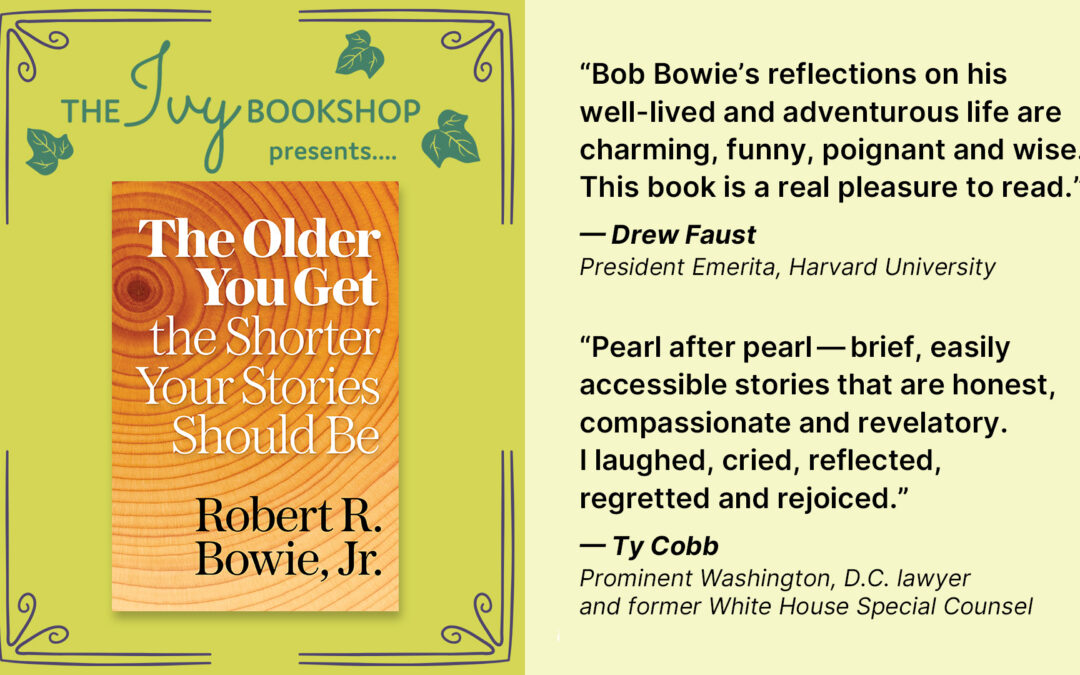
Gift Return Tuesday
If you’re tired of Black Friday, Small Business Saturday, Cyber Monday, and Gift Return Tuesday, I have an alternative for you that will make you laugh.
First, I bet you that you have never been as embarrassed as I have been. If you start laughing as you read this story, continue on to get a reward after you’ve finished reading.
The Story:
You think you’ve been embarrassed? Well, I’ve got you beat.
First, it all happened to me on the other side of the planet so I couldn’t go home, turn off the lights and put my head under the pillow.
It happened in Xi’an, China, in an airport the morning I was scheduled to fly to Chongqing to see a panda sanctuary, then board a boat to go down the Yangtze river through the Three Gorges, and then down to Shanghai.
Second, I was traveling with a small group and the Xi’an Airport was huge, so I had nowhere to hide as my embarrassment went on and on and on…
It all started innocently at dinner the night before we were scheduled to fly out of the Xi’an airport the next morning. Our guide addressed the group and informed us that because our plane left so early the next day we all must have our bags packed and outside of our door at 4:30 so they could be picked up and taken to the airport before we went to breakfast.
Everything had to be packed except the clothes we would be wearing the next day and whatever toiletries we required for that morning.
We were told that those toiletries, once used, had to be carried on our person until we landed at Chongqing airport several hours later at which time we could return them to our suitcases.
After dinner that night, we all went up to our rooms, picked out the essential toiletries, which in my case was toothpaste, toothbrush, shampoo, razor, soap, and hairbrush. I also chose my clothes for the next day, which in my case, were one of my endless pairs of khaki pants, a blue long sleeve business shirt, underwear, sox and shoes.
All the rest was packed in the suitcase, which I put outside the door right before I set the alarm and went to bed.
The next morning when my alarm went off, before I showered and shaved, I peeked out the door. My suitcase was gone and on its way to the airport. I looked at the clock and measured the short time I had to get to breakfast.
After my shower, I bundled up my toiletries, put on my blue business shirt and started to pull up my khaki pants, but couldn’t understand why I couldn’t get them on until I realized that the only pair of pants I had to wear were actually those I had mistakenly packed, which unfortunately belonged to my teenage son.
My son has a 32-inch waist. I do not.
I was running out of time. I had to get to breakfast.
I grabbed both sides of the pants so that my fingers gripped the pockets and I hoisted as hard as I could. No progress.
Next, I lay on my back on the bed with my feet extended in the air and bounced on the bed to get maximum leverage, kicked my feet into the air and yanked with all my strength. No progress.
The top of the pants made it to maybe slightly above my crotch. I’m pretty certain I did not get the pants high enough to halfway cover my back end. Nothing.
Next, I tried straddling a chair and forcefully rode my pants like a cowboy rides a horse in order to force the crotch into submission. I then tried jumping up and down to get maximum thrust, lift and torque. Nothing. This was not good!
I had to get to breakfast but I couldn’t leave the room. This was not good at all!
I reassessed my situation.
I still had to put on my shoes and socks. I would have to roll up the bottom of the pants so that I wouldn’t trip over them.
I was able to walk, but only if I could hold the top of my pants up as high as possible, and walk with my knees banging together every time I took a step.
I searched the room for any possible help. I was fortunate to find yesterday’s Chinese newspaper — bright with color — to cover my crotch.
It was a very long and slow elevator ride for every inch of the decent down maybe three floors. I noticed that the Chinese people in Xi’an, at least in this elevator on this particular morning, tended to be very quiet as they tried to find someplace else to look other than at my crotch.
My group at breakfast was less forgiving. They had to stop eating because they couldn’t stop laughing.
Our guide tried to be helpful and encouraged me to wander the airport to find a clothing store, apparently in the hope that I could learn Mandarin instantly and acquire a pair of pants that was twice the size that any self-respecting member of the culture would never wear.
The guide was just trying to be helpful I know, but didn’t seem to understand that I was really, at this point, no longer interested in clothing. I was no longer hoping to fit into the culture.
I was hoping to vanish from the face of the earth.
Everyone in the airport seemed to be walking by and rubbernecking in order to catch sight of whatever everyone else was laughing at.
I was completely hunched over, gripping my newspaper and pants, with my pant legs rolled up above my ankles and, just to add to my unlikely assimilation into the culture, I was wearing my disposable razor, shaving cream, toothbrush, toothpaste and hairbrush bundled up into a boutonniere blooming from my shirt pocket to add to my look.
The Chinese newspaper was fast becoming my most valuable asset since, as it turned out, my seat on the plane was between two meticulously dressed, very frightened Chinese businessmen who apparently feared any eye contact with me, their fellow traveler, for fear that it might prompt me to flash them.
In times like this I try to focus on making my situation into a positive learning experience.
After thinking about my situation for a little while, I concluded there wasn’t a lot to learn so, in the alternative, I thought it might be helpful to try to imagine what could be worse than what was happening to me at this exact moment.
I no longer wonder what it must feel like to wear a miniskirt if you are knock kneed, but that wasn’t bad enough, so I tried to imagine what it was like to wear a miniskirt, knock kneed with high heels.
I made sure that I would be the last person to leave the plane when we landed. in order to give the baggage handlers extra time so when I went to pick up my bag it would be there.
I hid in the airport men’s room for a while. I was afraid I had permanently injured my lower intestines. I was sure I had bruising. I couldn’t really lift or lower my pants now.
Eventually, I built up all my courage and raced through the teeming airport hunched over, with one hand holding the top of my pants and the other gripping my newspaper.
I swooped down on my bag and hauled it into the men’s room, found a stall, opened the suitcase, liberated myself of my son’s pants, and instantly threw them away for no good reason other than I needed to purge them.
A few months ago, I went on a trip with some of that same group that had gone on the China trip. When my story came up, I refused to relive the experience, so they went right ahead and told it anyway. They kept on embellishing the story at my expense.
The trip to China was 10 years ago, and the listeners could not stop laughing. Apparently, it gets better and better.
One person, who I am not sure was even on the China trip, claimed to have seen it all from the back and referred to it as “the morning the moon rose over the Yangtze!”
I must now live in infamy forever.
—
The Reward:
Good for you! You laughed. You are honest because here you are and so you deserve a reward. Now that you’ve laughed you don’t feel quite as bad about not completing your holiday shopping on Black Friday do you?
So here is your reward.
You will be pleased to learn all your remaining shopping can be completed for everybody left on your list, including stocking stuffers!
That story, which you just read, about my “streaking” through China is the very first story in my book, The Older You Get the Shorter Your Stories Should Be, which is now available at The Ivy Bookshop, The Manor Mill, Porter Square Books, or you can order from Bookshop.org (https://bookshop.org/shop/robertrbowiejr) or Amazon.com, where there’s even a Kindle version now! Or you can ask your any book store worldwide to order it using the following ISBN: 978-1628064209.
In addition, this book is perfect for regifting. Buy a copy for yourself. Tell your second recipient that you’ve road tested it because you care so much for them.
Finally, all the stories are short and perfect for your friends and family with short attention spans and they are great for deliberate bathroom reading and, of course, if you buy lots of copies you will make me really happy, too.
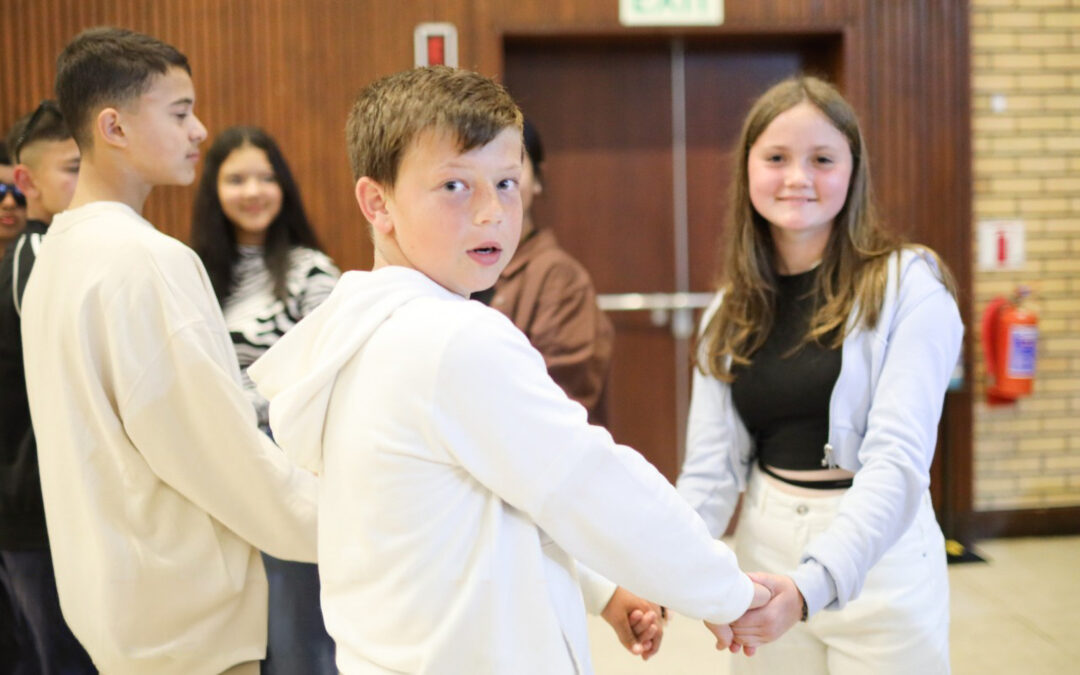
Before and After… Self Promotion
Almost 35 years ago I nearly lost my name, but 60 years ago I definitely lost my innocence.
Back in the mid-1990s, I was an aspiring business litigator who liked intellectual property. The Internet had entered the world and I reserved “bowie.com” as an email. Shortly thereafter, I got a phone call from a gentleman with a thick New York accent who asked, “Are you Robert BOWee?” I said I was Robert BOOwee. That is the exact moment I lost my name. He responded “Hello Mr.BOWee, I am David BOWee’s representative (you can look me up) and David told me to tell you that “if you will give him bowie.com he will give you front row seats, backstage passes… and all the shrimp you can eat!”
I thanked him for his interest, but demurred.
Two days later, I got a second phone call from the gentleman, who again asked me if I was Robert BOWee. I corrected him and then he corrected me back and ever since then my name was forever changed to BOWee except in Maryland and Texas.
I have been a good sport about it because, for the first five years or so, I would get email directed to David that offered “the greatest sex you’ll ever have, just meet me in the basement bathroom at Penn Station.” I am such a dork that I routinely would forward these messages directly to “Davidbowie.com,” but never once got a thank you back.
That is how I almost lost my name, but this is how I definitely lost my innocence. It’s a story from my book:
For my friends and me, life was abruptly changed on the after school athletic fields in the spring of our eighth-grade year, when all of our parents signed us up for dancing school.
My friends and I were all told it was a non-negotiable part of our education.
We were divided on the subject, until one of us confessed that in church he had recently prayed to God that he be allowed to live long enough to experience sex.
We found this to be reasonably compelling and it was sufficient to open the door for the rest of us to give in and accept the inevitable.
We had been given no previous training for this.
My preparation for dancing school was to wash my hair and then soap and rinse myself several times until I was squeaky clean, then do pull ups on the shower curtain rail in front of the mirror until I began to perspire and I couldn’t do anymore, in order to improve my physique.
Dancing school started at 4:30 pm. It was held in the middle school cafeteria at our all-boys day school. After lunch, all the tables were moved to one side, the chairs were placed side by side along opposite walls, and a piano was rolled into place.
Our instructors, Mr. and Mrs. Knot, were a husband and wife team who appeared to be in their 30s. The husband played the piano, smoked constantly, and showed no enthusiasm. We all liked him from the start.
His wife however was stern, and dressed in black high heels and a low cut black dress that featured her remarkable figure. From the start we had a problem. We couldn’t look at her, but we couldn’t take our eyes off of her.
Mrs. Knot would single out the tallest boy to dance with her. She would teach him the steps while the rest of us watched. We were then lined up with the girls from tallest to shortest and we could repeat their example.
Mrs. Knot soon showed the boys how they could politely change partners on the dance floor by tapping a boy on the shoulder.
One of the shortest boys in the class, who had big glasses, tapped Mrs. Knot’s dance partner on the shoulder in what appeared to be a shameless attempt to gain favor with his teacher. She appeared to approve, until they began to dance and she realized that her high heels and his height had placed his nose in her cleavage and his glasses were focused squarely on her breasts.
The girls were at least a head taller than most of the boys and, after a week or two, Mrs Knot announced a “ladies’ choice.”
The ladies’ choice turned out to be an extremely athletic event. The girls were choosing boyfriends but we didn’t know that.
They would slowly stand and walk toward their target, but if there was competition, they would pick up the pace and start running. There were times when two competitors, in an effort to get their boy and also to stop, would pile up and slide under the chairs where we were sitting.
The situation grew more mature. Later that spring, I had a girlfriend for almost a month, but I didn’t know that until she dumped me.
This was not unusual. Attachments were formed and broken in many cases before a boy even knew he had been going steady.
I was in my second relationship and didn’t know it until I was informed that it was over. I was told by a girl who I didn’t know that I had just broken up with a girl and that I was now available.
As the classes drifted into spring, the more adventurous girls would talk their parents into parties in the basement of their home.
They were all pretty much the same. They featured a record player and rotating chaperones to make sure nobody danced close during “Moon River.” The rule was stiff-arm dancing with visible open space between the dancers.
As the spring finished up, the chaperones and other parents migrated upstairs and gathered in the living room for cocktails. Occasionally, they would do sneak attacks or peek down into the basement to make sure the lights had not been dimmed or turned off and people were not dancing close to “Moon River.” They always claimed they were just making sure “the snacks had not run out.”
By summer, we had made friends with girls and even fallen in love and knew it.
Something beautiful had happened that spring. Nobody really knew what it was other than a transition, but it was beautifully woven together as a right of passage for everyone, including the parents.
The following spring, as upper-school ninth-graders, we would spill out of school at 4:30 pm and look in the windows of the cafeteria as Mrs. Knott waltzed her way through another dumbfounded eighth-grade class.
We had friends that were girls now, and we even knew enough to know we had girlfriends. I had even learned to do pull ups before the shower.
***
“Dancing School” appears on page 29 of The Older You Get the Shorter Your Stories Should Be, available online at bookshop.org (https://bookshop.org/contributors/robert-r-bowie-jr) and amazon.com (https://www.amazon.com/Older-Shorter-Your-Stories-Should/dp/162806420X/).
This is about self promotion before and after. Please consider buying this book and giving it as a holiday present. It would make someone very happy and also that would include me, so you get two for one!
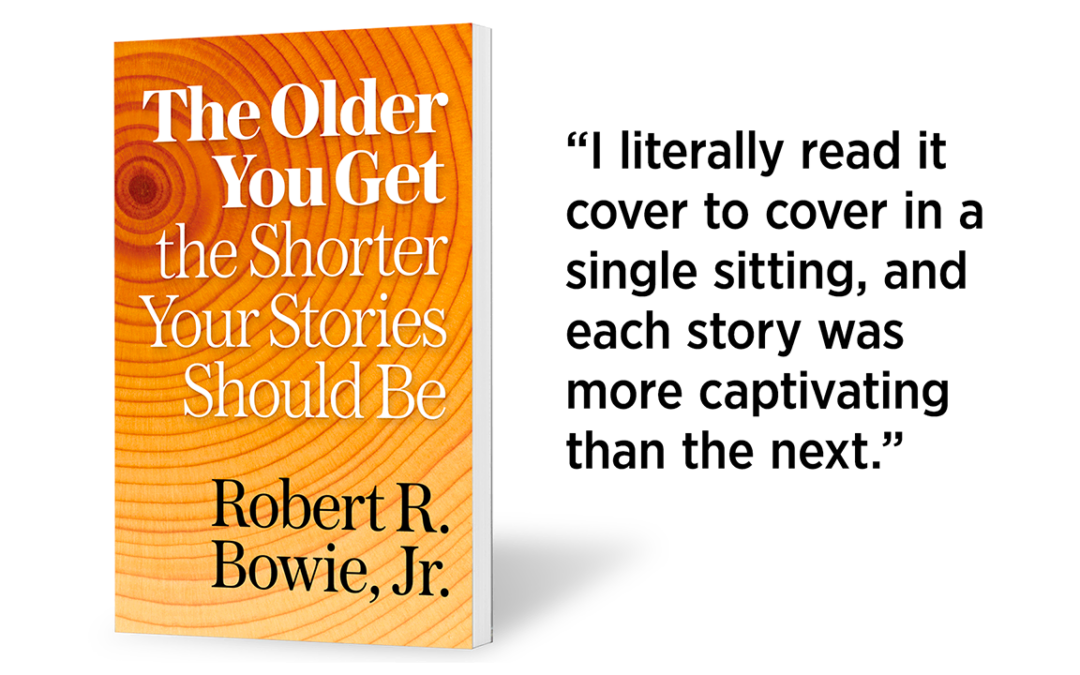
My First Unsolicited Review
Modesty prevents me from saying anything too nice about my new book, The Older You Get the Shorter Your Stories Should Be (though I am very proud of it). Fortunately, I was able to persuade several prominent folks to read it and offer nice blurbs ahead of publication, for which I am endlessly grateful.
Now, I’ve just received my first unsolicited review and I couldn’t be more elated. This really made my week!
“I wanted to write and let you know how much I loved your newest book. Starting with its clever title, this wonderful book hooked me and reeled me in immediately. I literally read it cover to cover in a single sitting, and each story was more captivating than the next. Your insight into your surgery experience was especially compelling and your Christmas story moved me to actual tears. And I had no idea what an adventure hound you are! Or that you were Mac Mathias’s driver (the last good Republican)!
“Surely more erudite readers than I will be telling you how much they love your book, but I wanted to add my voice to the chorus of your fans. I look forward to reading whatever comes next.”
— D.R.
Thanks, so much! And thanks again to everyone who came out to help launch the book and to all who’ve picked up a copy (if you’d like your own, I recommend Bookshop.org).
If you have purchased online, writing a short review would be doing me a great favor, if you’re so inclined.
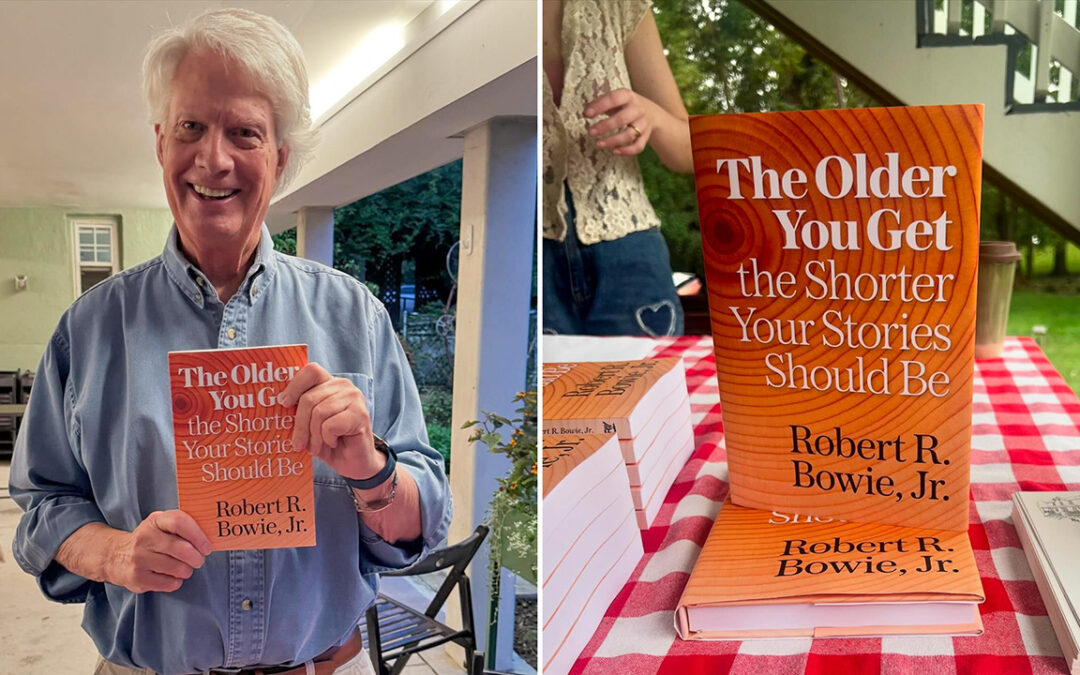
A Successful Launch
The place was packed. The readings went very well.
Thanks so much to everyone who came out to celebrate the launch of my new book, and to all who helped make the events such a rousing success. Special thanks to the Ivy Bookshop and Manor Mill, and the terrific readers who made me look good: Jenny Keith, Michael Fallon, Mel Edden, Shirley Brewer, Dan Cuddy, and Matt Horner.
You can still get a copy of the book! Just walk into your local bookstore and give them this ISBN number, 9781628064223 — they can order you one. Or you can order it online at Bookshop.org, where you can select a local bookstore to benefit from your purchase: https://bookshop.org/contributors/robert-r-bowie-f221a7ec-5949-4493-95a2-e9264cff6049. You can also find it on Amazon.
I’m so grateful to everyone who is reading these words. Thank you for your continued encouragement and support.
…
“Pearl after pearl — brief easily accessible stories that reflect the unclouded eye of the author for all things honest, compassionate and revelatory. I laughed, cried, reflected, regretted and rejoiced reading this seemingly random collection before recognizing the common thread — clear-eyed humanity. Mr. Bowie’s curation of his self-deprecating, poignant and often hilarious moments, will become a dear friend whose warmth and comfort are there to visit again and again!”
— Ty Cobb
Prominent Washington, D.C. lawyer and former White House Special Counsel
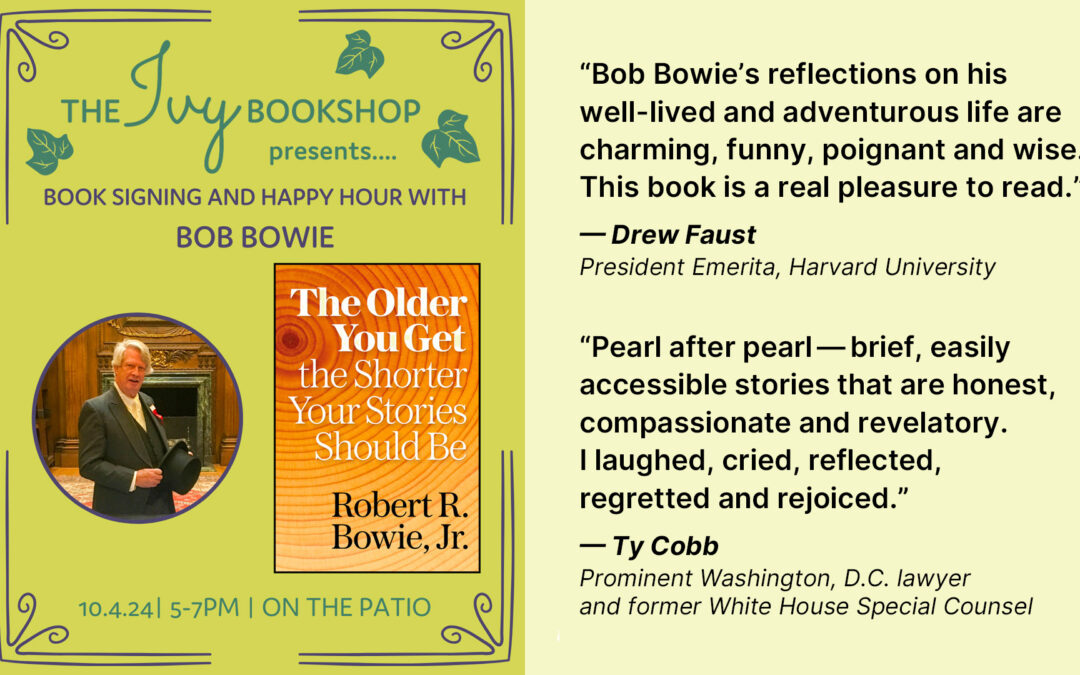
Friday at the Ivy Bookshop, Sunday at the Mill
This Friday! Please join me for a special launch celebration at The Ivy Bookshop in Baltimore, October 4th from 5:00–7:00 pm. There will be cocktails on the patio followed by a reading and book signing.
Helping me read selections from the book are the following distinguished Maryland poets: Jenny Keith, Michael Fallon, Mel Edden, Shirley Brewer, Dan Cuddy, and Matt Horner.
The Ivy Bookshop is at 5928 Falls Rd, Baltimore, MD 21209.
We’ll also be gathering on Sunday, October 6th from 4:00–5:30 pm at the Manor Mill, 2029 Monkton Rd, Monkton, MD 21111 with the same amazing lineup of terrific readers.
I hope you can make it. I look forward to seeing everyone there and signing any books that you purchased.
(If you can’t make it, the book is also available online at Amazon and bookshop.org.)
…
“Bob Bowie’s reflections on his well-lived and adventurous life are charming, funny, poignant and wise. This book is a real pleasure to read.”
— Drew Faust
President Emerita, Harvard University
“Bob Bowie has written a riveting and rollicking collection of tales comprising his life as a Renaissance Man who overcame serious childhood learning disabilities to become a Harvard Poet Laureate, adventurer, lawyer and playwright. Writing with brutal candor and self-deprecating wit, Bowie unspools stories that both entertain and pack plenty of wisdom. I thoroughly enjoyed this book.”
— Ben Bradlee, Jr.
Pulitzer Prize-winning Editor of The Boston Globe Spotlight Team
“Pearl after pearl — brief easily accessible stories that reflect the unclouded eye of the author for all things honest, compassionate and revelatory. I laughed, cried, reflected, regretted and rejoiced reading this seemingly random collection before recognizing the common thread — clear eyed humanity. Mr. Bowie’s curation of his self deprecating, poignant and often hilarious moments, will become a dear friend whose warmth and comfort are there to visit again and again!”
— Ty Cobb
Prominent Washington, D.C. lawyer and former White House Special Counsel

My New Book Is Out!
As of yesterday, The Older You Get The Shorter Your Stories Should Be is now in print. What a great present for my birthday!
Please join me if you can for a special launch celebration at The Ivy Bookshop in Baltimore on Friday, October 4th from 5:00–7:00 pm. There will be cocktails on the patio followed by a reading and book signing. Books will be available for purchase there (and I’d love to have you help support the Ivy).
The Ivy Bookshop is at 5928 Falls Rd, Baltimore, MD 21209.
We’ll also be gathering on Sunday, October 6th from 4:00–5:30 pm at the Manor Mill, 2029 Monkton Rd, Monkton, MD 21111,
You can find the book for sale on Amazon and at Bookshop.org, where you can select a local bookstore to benefit from your purchase: https://bookshop.org/contributors/robert-r-bowie-f221a7ec-5949-4493-95a2-e9264cff6049
(You should also be able to ask your local bookstore to order you a copy by providing this ISBN number: 9781628064223.)
I’m so proud of this book and can’t wait for everyone to enjoy it.
…
“Bob Bowie’s reflections on his well-lived and adventurous life are charming, funny, poignant and wise. This book is a real pleasure to read.”
— Drew Faust
President Emerita, Harvard University
“Bob Bowie has written a riveting and rollicking collection of tales comprising his life as a Renaissance Man who overcame serious childhood learning disabilities to become a Harvard Poet Laureate, adventurer, lawyer and playwright. Writing with brutal candor and self-deprecating wit, Bowie unspools stories that both entertain and pack plenty of wisdom. I thoroughly enjoyed this book.”
— Ben Bradlee, Jr.
Pulitzer Prize-winning Editor of The Boston Globe Spotlight Team
“Pearl after pearl — brief easily accessible stories that reflect the unclouded eye of the author for all things honest, compassionate and revelatory. I laughed, cried, reflected, regretted and rejoiced reading this seemingly random collection before recognizing the common thread — clear eyed humanity. Mr. Bowie’s curation of his self deprecating, poignant and often hilarious moments, will become a dear friend whose warmth and comfort are there to visit again and again!”
— Ty Cobb
Prominent Washington, D.C. lawyer and former White House Special Counsel

Sometimes the Best Judge or Jury is Laughter
As I have said before, I loved representing entrepreneurial business clients because they are crazy.
The little cases are always the funniest and the easiest to tell.
He was a general contractor who built big shopping malls and was always very gruff, extremely overweight and endlessly funny. He, his wife and I, became friends over time and my professional responsibilities merged into our friendship as we got to know each other.
After making a lot of money building shopping centers and stocking them with commercial tenants, he decided to design and build his own mansion. He bought two adjoining lots in a suburban cul-de-sac, and designed what his wife described as “a Las Vegas hotel — not only embarrassing but gauche.”
In his mansion, he determined that he wanted a large indoor fountain, as well as special toilets for his and his wife’s bathrooms. These toilets would protrude from the wall, but have no base onto the floor because he thought that was classier.
He had absolutely no sense of taste.
He battled with the architect who said that these toilets could not withstand his weight and were not classy just because they came out of a wall and didn’t have a base.
She succeeded in vetoing the lavish indoor fountain, but he won the battle in their matching bathrooms with the “extended toilet” from the wall, which had no connection to the floor.
I was his lawyer but we made each other laugh. As I was thinking back on him, I remembered defending him in a lawsuit many years before he built the mansion. He had put a roof on a tenant’s building and the tenant had decided to represent himself because he thought he knew everything about construction and could litigate better than any lawyer.
It was a little non-jury case to be tried in a packed courtroom full of lawyers and clients waiting for their cases to be called. Trying a case in a court at this level is like litigating in a circus tent a head on collision between clown cars — particularly if a defendant or plaintiff comes to represent themselves. The judges at this level have a rotating docket consisting each day of either misdemeanor, criminal, petty civil or traffic court.
I knew the judge socially. He had developed a sense of humor after too many years presiding over these petty cases and traffic court.
The plaintiff in this case argued that the “neoprene” roofing materials had been inadequate, and he was going to be his own expert witness to prove it. The plaintiff was a buffoon who didn’t know what he was talking about. It was a little case that would cost more to try than settle. The client decided to try it “on principle,” which is always a problem. He told me, “I don’t care if you win or lose, just make me laugh.”
I decided to go for broke. After the plaintiff announced that he wanted to be his own expert witness, I decided I would cross examine him on his qualifications before the judge ruled on whether he could be considered as an expert witness on roofing materials.
I asked him if he knew of the latest advancements in “neoprene” roofing materials. He clearly was uncertain but proclaimed he did. I had him hooked. I carefully asked him if he had ever heard of the new “Neofeces” roofing materials.
He said that he had. I spelled it out for him so he could be certain. He cautiously said he was certain.
So now I was crossing him on Neo (new) feces (shit) roofing materials. Clearly you could feel the courtroom saw entertainment in its future.
I asked him if it bothered him professionally that “neo-feces“ was still regrettably not yet odor free. He claimed it did not. I asked him whether he agreed that double-ply toilet paper was considered sufficient for the removal of “neo-feces.” The courtroom rustled as those watching started to follow the tightening of the noose.
After one or two more questions inquiring about the benefits of “neo-Feces,” I paused between the two words and the courtroom started to laugh a little but the witness did not. At this point, the judge stopped me to preserve order in the courtroom and instructed me that I had made my point and had “won the pot with a royal flush.” This was appreciated by all those still waiting to try their cases, as well as the backbench court watchers.
About a month after my client had moved into their new opulent mansion, I got a call from my client’s wife at around 11 o’clock on a weekend night.
She started the conversation by saying that I must come over immediately because she could no longer talk to her husband, who was presently lying on his back on his bathroom floor laughing hysterically.
Apparently, after a night of much beer and football on the super wide screen, he had sat down on his toilet and it had broken off, and he kept slipping and could not stand up because there was water shooting all over the bathroom. I told her I would contact a plumber to turn off the water and then I would be right over.
I asked her, “How bad was it?” She paused on the phone for one second and then just said, “Let’s put it this way, the goddamn toilets he wanted didn’t work, but that’s okay cause he got his goddamn fountain!”
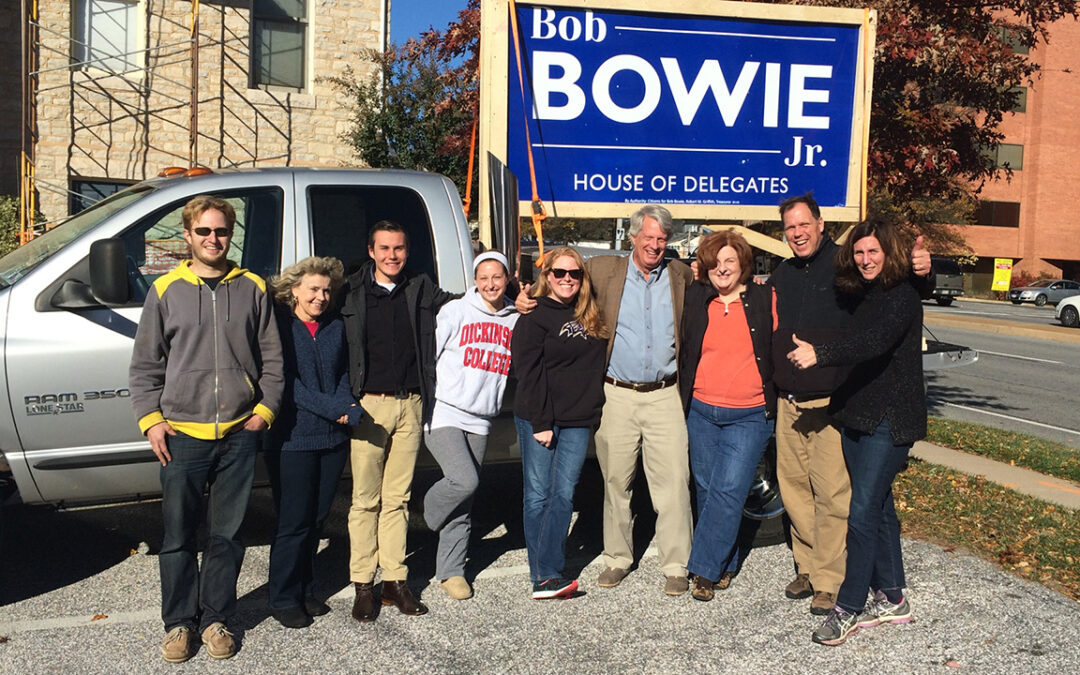
What Is Political Common Ground?
Have you ever just stopped in the street and said to yourself, ”Wow, I wish I had that to do over!” and then found yourself exploring even larger questions?
Because of my short-lived political background, I ponder irrelevant questions and worry about them all the time.
I have some regrets.
For me it all happened back in 2014, but it only became clear what my concern should have been about two weeks ago.
Back in 2014, I was asked a question that I couldn’t answer. That was the problem.
Back then, I hated gerrymandering and concluded that the country was getting dangerously divided because of it, so I ran for political office on a theme that ”We must not lose our common ground.”
My strategy would be to find common ground with every person in my divided district and thus bring them together so we could reason together.
Maryland is two-to-one Democrat and the state legislature had crammed as many Republicans as possible into the district where I lived. I am a Democrat but I was sympathetic to my outnumbered Republican neighbors. I consulted the experts and was informed that I had at best of five percent chance of winning as a Democrat in this district.
I jumped right in!
I really believed I would win if I could find some common ground each time I knocked on another door.
I was all in. I contributed my own money to the campaign and I raised over $150,000. Susan and I and a small group of overoptimistic diehards spent that summer and fall knocking on 5000 doors, and debated the three incumbents who raised only around $5,000 together. They did not need the money. They had all been in office for over a decade in this gerrymandered district.
Late one hot summer Sunday morning, it turned out I didn’t know “ common ground” as well as I thought I did. Only about two weeks ago, did it all became clear.
When I knocked on the doors, I always had the same pitch: ”I believe we must find our common ground so we can all talk together.” Then for humor I would add, because I was over 65 years old, that ”if they were worried about term limits, nature would take care of that in my case.” Everybody laughed, and we talked as friends until I was asked whether I was a Republican or a Democrat, at which point the door was slammed in my face.
Of course, I remained optimistic. As I would drive home while the sun was going down, I believed the depth of my commitment would pull me through.
The depth of my commitment was only challenged once, when I could not find “common ground.“
Late in the August heat, I knocked on the door of a well-kept home in a trailer park, which had three steps on either side of the front door.
I knocked on that door and a heavyset woman dresses in a giant muumuu answer the door and after my pitch she announced: “I can’t talk to you right now because I don’t have any underwear on.”
How was I to answer that? For the first time maybe ever, I was speechless.
I couldn’t say, “You don’t need to be wearing underwear to read my materials,” or, “No problem I’ll wait til you put on your underwear.” I was dumbfounded. I could find no common ground.
For almost ten years, I have pondered this interchange. I thought and rethought about my inability to find an answer. I have not hesitated to tell this story to others in the hope that they might suggest something. Then about two weeks ago, a friend of mine had an answer right off the top of his head!
He said, “You forgot your theme. Why didn’t you just say, “That’s okay, I don’t either!”
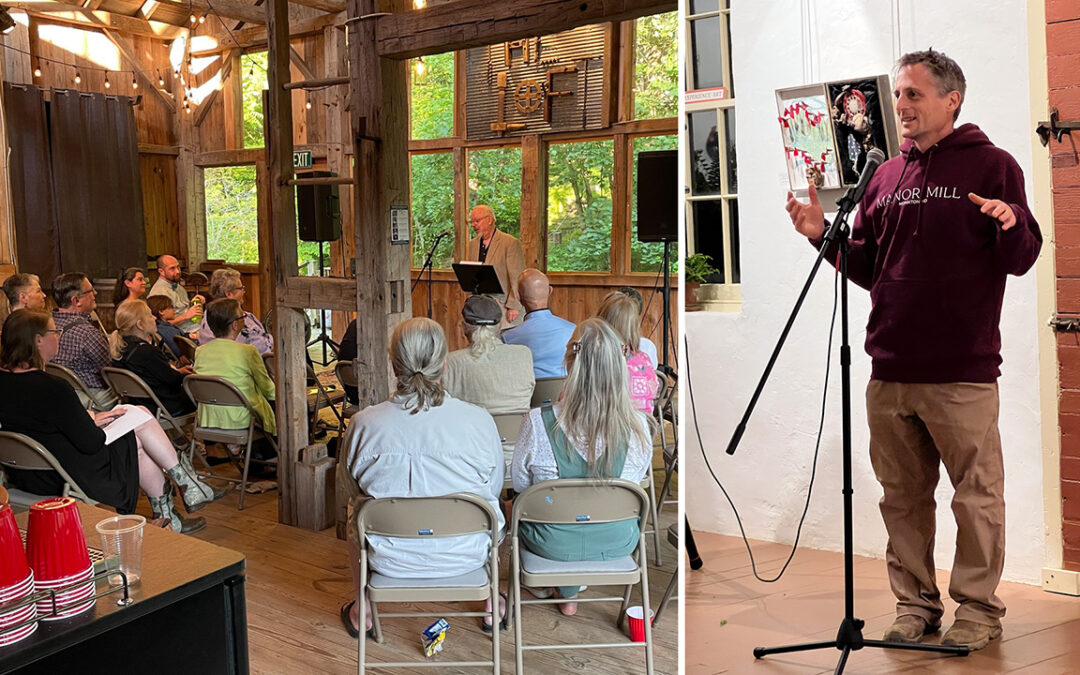
How Shame Can Be Forgiven with Humor at Your Own Expense
I’ve always been a little shy about confessing my love of poetry.
Over 40 years ago, my love of poetry got into a head-on collision with my decision to be a successful lawyer. This collision was the final confirmation I needed to reenforce my belief that I should probably keep my mouth shut about poetry.
This year, however — in fact, this spring — I have outgrown this conclusion once I appreciated the humor in my mistake and that I wasn’t the center of the universe, which is probably why it took over 40 years.
On Saturday, June 1, in less than a week, we will be celebrating “Poetry Day” at Manor Mill in Monkton, Maryland. Manor Mill is a beautifully reborn pre-revolutionary gristmill on a little tributary off the Gunpowder River. There, Angelo Otterbein, its new owner, has created a center for the creative arts in the middle of the verdant horse country of northern Baltimore County.
For the last year and a half, on the first Monday of every month, Mel Eden and I have run a poetry open mic at the Mill. We start at 6:30 pm with a reading by one or two well established mid-Atlantic poets. Then, after a brief break, we turn to the open mic sign-up sheet, with each poet sharing one poem each, providing a wide variety of work. Then, if possible, we do a second round so each poet has an opportunity to read twice.
This group has grown into an ever increasing source of inspiration and community for both established and upcoming poets from all walks of life. From the beginning, we also set up a poetry class at the nearby Hereford Library for new poets to perfect their chops before they elect to perform. This class has been led by Michael Fallon, a celebrated retired professor of poetry who has taught and published for over 35 years.
Poetry Day on June 1st was created by Mel to celebrate this new artistic community as well as the art and creation of poetry. Mel is also largely responsible for a beautiful professionally published bound book of Manor Mill open mic poems and poets that is scheduled to be available early this September.
Back to my head-on collision, though, which years ago separated my two passions and broke my fragile poet’s heart.
All through law school on Saturday nights I didn’t go out drinking with my friends. Instead, I would cook a Cornish game hen, drink whiskey and listen to one of my extensive collection of recordings of Shakespeare plays.
I kept this eccentric behavior to myself for the most part, except in my second year, I met a Baltimore Sun reporter, Carleton Jones, at our local Maryland Institute of the Arts art student bar, which featured big display panels on the walls where artists were offered a chance to display their work.
Carleton was in his early 70s, I would guess, and it turned out one night we both confessed our love of poetry. Without my knowledge he went to the owner and I was offered a chance to post my poems on the large panels in the bar, normally reserved for art and thereafter Carlton wrote a glowing review in the Sun.
I almost came out of the closet and admitted to myself that I was a poet until an all-important second job interview at a large law firm broke my heart and I went underground again.
In hindsight I was foolish and easily injured but it is funny, so here goes:
At this interview, four lawyers and a senior partner went over my resume and asked me questions until the senior partner took control. I took this as a good sign, particularly when he pointed out that at the end of my resume under “Other Interests” I had included “poetry.“
He asked me, “What is the difference between poetic writing and statutory writing?” I took this as a great final line of inquiry!
“Okay,” I said. “If you want to write a statute to prohibit throwing up on the street you would say, ‘No throwing up on the street’ and then define ‘throwing up.’ But if you were Shakespeare you would say, ‘speaking with a full flowing stomach.’”
I could not have been more excited to be so erudite on a subject I felt I knew quite well, so of course I couldn’t leave it alone.
“If you wanted to forbid fornication,” I continued. “You would write a statute prohibiting fornication and then define fornication, but if you were Shakespeare, you would say, “Making the beast with two backs.’”
I was a little surprised when the senior partner announced that the interview was now over and they would be in touch.
As I went down the elevator I was very proud of myself, but as I walked home the doubt came on slowly. By the time I reached my neighborhood bar, I went in and had a double scotch.
A couple of days later, I got a letter, and jumped to the conclusion that they thought I might not fit in. They wished me well on my future career as a lawyer.
To this day, I remain a proud (now retired) lawyer but I’m now proud to call myself a poet, too.
Thanks to Manor Mill, I have been around poets nonstop for the last year and a half and I have been welcomed. I have made wonderful, lifelong friends and have come to believe that perhaps Mel and I have encouraged future poets to find their voice and sing. These poets are remarkable people. They step out of the grind and observe it for others. They are fun to be with.
I hope you can join us for Poetry Day on Saturday and see for yourself. There’s a full schedule of events at www.manor-mill.com/poetryday.
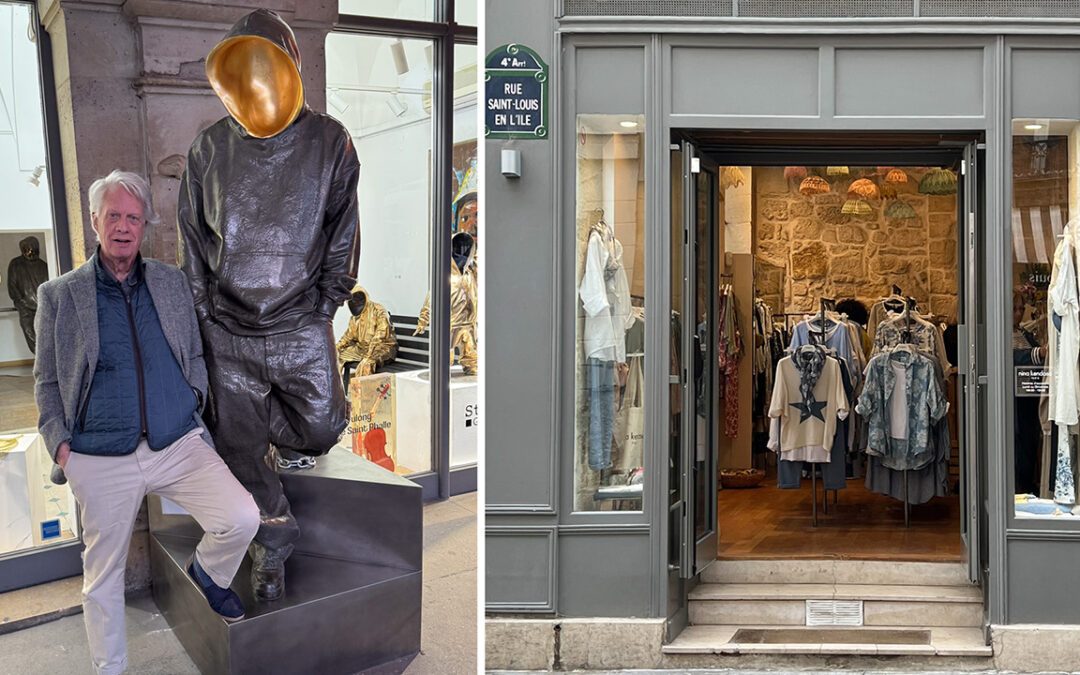
Paris Storefonts
As we have walked around Paris you can feel the pride everywhere as the city prepares to host the Olympics. That pride is always there but perhaps now it is heightened, most evident in the city where you see the care and detail in the retail efforts. Whether they are the cafés, cheese mongers, or street markets full of fresh fruits and vegetables and fresh cut flowers, there is artistry in the display and even a little bit of competition between the storefronts. They are always careful and creative but some are so odd and distinctive you stop and join the fun.
I stopped by this statue with an indented empty bronze face (even though the photo makes it appear to protrude). Other statues behind the windows sit or stand and have the same hollow faces, empty but with no bronze. To the left is a paint can supported on a base made to stay in place by what it has already poured. Gold medal!


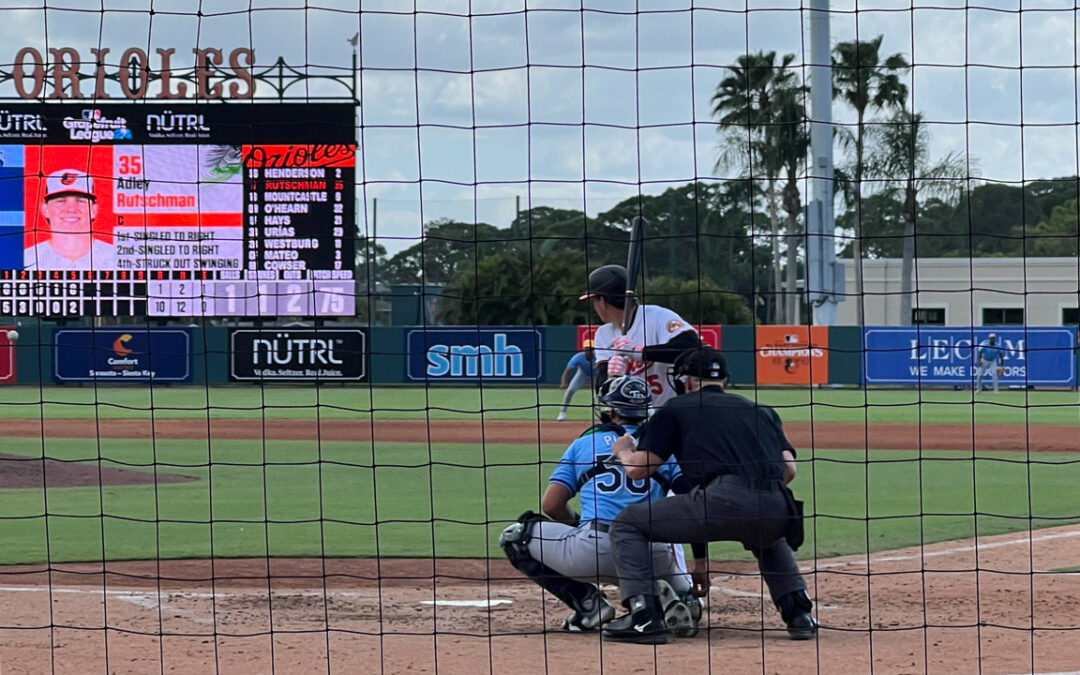
The Photograph I Was Glad I Didn’t Take
Several weeks ago, my son and I went to Orioles spring training in Sarasota. I was careful to take lots of pictures, but after our last game it was odd how my thoughts unexpectedly returned to a trip I had taken earlier this spring. I was on a tour that followed where civil rights activists had marched 60 years ago from Selma to Montgomery, Alabama in March of 1965, where they were mercilessly beaten as they tried to cross the Edmund Pettus Bridge.
This abrupt transition probably did not take place for the reasons that you may imagine.
The Orioles played well and won most of the games that we attended. No, it was something other than that.
It was about living rather than photographing life, and what gets lost and what gets saved.
The Ed Smith Stadium, where the Orioles are encamped for spring training, holds less than 7,500 people. It is like watching Little League compared to Oriole Park in Camden Yards in Baltimore, which seats about 46,000.
The ushers that take you to your seats are all Baltimore retirees, snowbirds bright with their orange uniforms and big smiles. It is magical. The team prepares for the future in a library of memories in the Florida sun.
Our first game, we sat behind home plate and watched the field being lined as the seats filled up around us. It reminded me of when my children were young and we would go to minor league games in Frederick, or even to see the Bowie Bay Sox.
I’ve got the pictures to prove it.
Sitting behind home plate in the afternoon sun, we were up so close we could see how a 90-mile-an-hour fastball looked and sounded when it snapped into place in the catcher’s mitt.
The second game we were behind the Orioles’ dugout. You could see the faces of the players and read their expressions in a way that big league baseball cannot reveal on TV. The cell phones were all focused and the cameras were taking pictures.
Every other day, when the Orioles were traveling, we went to the beach. It was worthless to try to photograph and capture the enormity of going to the beach. The sand was bedroom slipper soft, and the sky was bright blue and huge. Shore birds flocked and fought for food scraps as people packed up, left the beach and went home. You just had to experience it with the sound of the waves and the bickering of the birds.
A photograph could not have captured the environment for memory. Without context, it was all too big and undefined to be described.
The night before we went home, we chose seats by the left field fence at the foul line.
We sat next to a young boy who desperately wanted to catch a baseball in his glove, which he kept squeezing and squeezing to our left. My son, who is a college football coach and had been a fourth-grade teacher, knows and loves kids this age.
As the players warmed up in left field between innings, we all got into the act as the players warmed up. We all were trying to get a player to give the young boy a baseball.
My son was quiet for a while until he encouraged the boy to get the ball himself. The boy’s older brother and father grew suspicious. My son encouraged the boy to leave the rest of us behind and go past the left field foul line to where the bullpen was located. There, he could watch the catcher and pitching coach as they were warming up the relievers between innings.
The boy went off on his own but we all could see the interaction between that determined young boy and that aging catcher and pitching coach because it was palpable, but still professional.
On his own, the boy built up his courage and made distant contact with the catcher and ultimately, at the end of the game, the catcher handed the pitching coach a ball, pointed at the boy, and the pitching coach went over and delivered the ball to him. All this was watched with bemused approval and excitement by the local crowd who had followed the little drama.
As we were walking back to the car after the game was over, I chastised myself for not taking pictures as the little story evolved. I remember the amazing joy on that boy’s face as he pounded and re-pounded the ball in his glove as he said goodbye and we went our different ways.
I remember from my tour reading the history of the march from Selma as I started across the bridge and over the brown river with its high banks, which I photographed excessively until I stopped midway across the bridge.
All the photographs I had taken were of a bridge before spring, where there was little life along the shoreline up and down the river. All of a sudden, I stopped photographing, and just looked and felt the river flowing beneath me. I imagined what the crowd must’ve felt with the locals and their law enforcement ready to beat the daylights out of the marchers if they moved a step further and they did.
I go over those photographs now, and I don’t catch the event the way I remembered it by looking at it and avoiding the photograph. I feel the same way about seeing that boy pounding that ball in his glove and smiling as we parted. Without context, it was all too big and undefined to be described. The memory may fade, but because I didn’t take the photograph, I saw it and the experience is still alive in me.
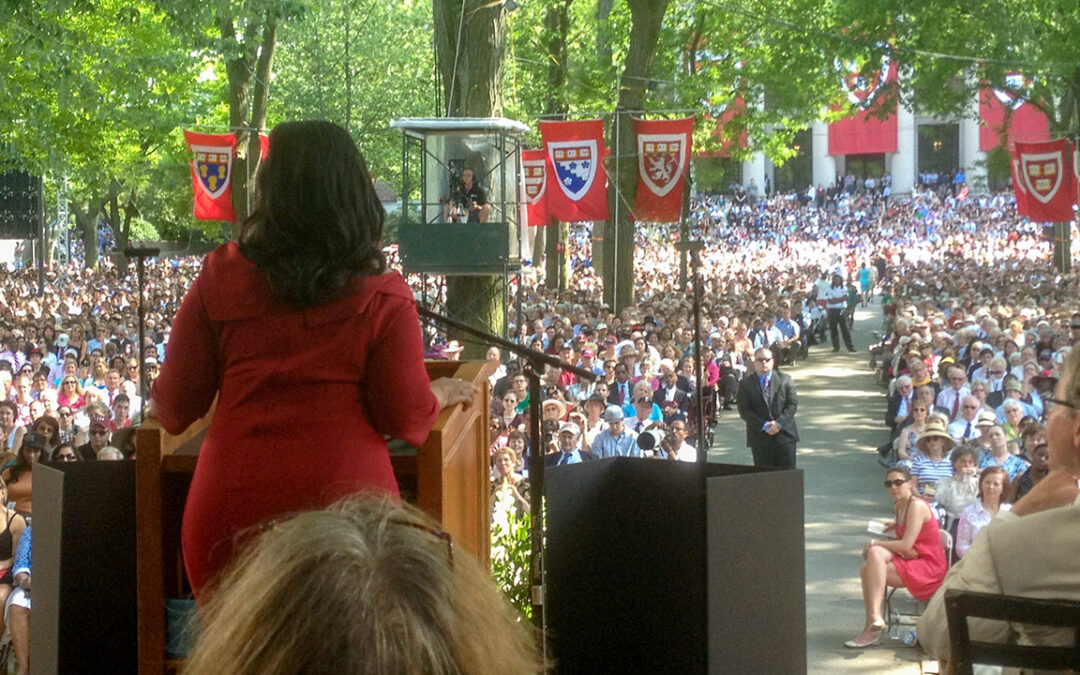
How the Hell Did You Get into They’a?
Perhaps it was always just a place in time but, for me, it was the reality of my youth. Its boundaries were Harvard Square to the east, my home on Coolidge Hill with Mount Auburn Cemetery and Cambridge Cemetery to the north, two schools — Shady Hill and Browne & Nichols — to the west, and the Charles River to my south, but all of this was lived in the shadow of Harvard University during the Kennedy years and later the Vietnam War.
I was all in. I was a townie from birth. The athletes on the football and hockey teams were my rock stars, and the professors would take time off from the university to advise United States presidents who were graduates.
If you were fortunate to be admitted, I believed you were blessed for life and, starting with your freshman year, you would be offered an education unequaled anywhere else in the world.
It took me several expulsions, numerous worthless summer schools with worthless speed reading classes if you were a dyslexic, a condition that, for me, went diagnosed for years. All in all, it six years but I finally got through high school.
Anyway, I was determined to get into Harvard.
The Cambridge School of Weston, a progressive school in the suburbs of Boston, took me in but required that I repeat 11th grade and start working with Mr. Johnson, a trained reading teacher, who convinced me to finally take an IQ test and start fresh with the alphabet. When I asked, he smiled and he told me, “Yes, you can go to college.”
I immediately packed up my report cards and went to The Harvard admissions office, where I announced that my problems would soon be solved and I would be going to Harvard. I met with one of the admissions officers, Deke Smith, who went over my report cards, then looked up at me inquisitively and said, “You have never gotten anything better than a C+.” I was ready for him, and responded, “Well, they take 20 points off for spelling.”
He gently said that I would have to be president of my school, president of the literary magazine, as well as president of the New England Student Government Association, which encompasses all New England prep schools and their student governments. In hindsight, I’m pretty sure I was being offered the door, but I didn’t know that.
My senior year I went back to Mr. Smith and informed him that I had accomplished those three goals, and he looked at me sort of long and hard and apologized. “I did not mean to lead you on, but all we do here is read books and write papers. I don’t think you could survive.”
I applied anyway and was rejected.
I went off to a wonderful school in Ohio, left the campus dorms, rented an apartment in the town and went underground. In September of 1970, I was in a high-speed motorcycle crash, which killed the driver, my friend. I spent the next several months hanging from the ceiling in a pelvic sling in several hospitals until I ended up back in Boston and Cambridge, where I started to move again in wheelchairs and on crutches.
I had a moment of genius.
I went back to Mr. Smith at the admissions office and told him that I would not be able to go back to school that spring and hoped he would let me be a “special student” at Harvard so I could take one class and get credit for it when I returned to Ohio the next year.
He was shocked to see me again but remembered me. He recollected that I had surprised him the last time we met when I had accomplished all of his goals, including being president of the New England Student Government Association when, the year before, the Cambridge School of Weston was not even been a member. He reiterated also that I might survive with one class because, as he had said, “All we do here is read books and write papers.”
I got my student ID and realized I was inside the walls and I was living my plan.
I signed up for five classes, not just one, and told my mother that I would do all the research because I had nothing better to do than go to the library on crutches, but I asked her would she type my papers to avoid the spelling issues. She laughed and agreed and I went to work.
I did nothing but work and sleep and go to class and work for that entire spring semester. My one fear was the Blue Book hourly exams where I would have to write out my answers and reveal my spelling issues. I expected I would lose 20 points for spelling. When I got the Blue Book back, there were red marks all the way through it. But about two-thirds of the way in they stopped and at the very end, in red pen, was “You know your stuff but your spelling is atrocious. A-.”
I didn’t stop celebrating for a week.
After I got my report card, I went back to Mr. Smith and showed him I had gotten all A’s and B’s except for one C+, which then put me at least in the middle of the class.
He looked like a guy who just had his pants pulled down. I told him that I would be applying as a transfer student for admission the next year, then smiled at him and left.
He was defenseless.
Several months later, I got the fat envelope. I proudly walked into my parents’ bedroom as my father was reading in the late afternoon on the bed, and I told him I just got into Harvard. He smiled and offered congratulations then went back to reading. It was not his ambition, it was mine. I went to the kitchen to tell my mother and we, in fact, celebrated.
In 1973, I graduated with honors. Fifty years later at our 50th reunion, I met classmates who I had never met before and, only then, felt that I finally fit in, even though I did not qualify for admission. I thought I had justified my acceptance and graduation because I had loved that education so much!
That school gave me a chance that others wouldn’t. That school looked deeper into me than all the other schools, other than the Cambridge School of Weston, ever had. I felt for the first time I was one of them and worthy to be one of their classmates.
I live in Maryland now, as I have for years, but I really am very much still that Cambridge townie. Only weeks ago, when we were at Oriole spring training together, my son looked at me very seriously and asked, “Are you actually a closet Red Sox fan?“
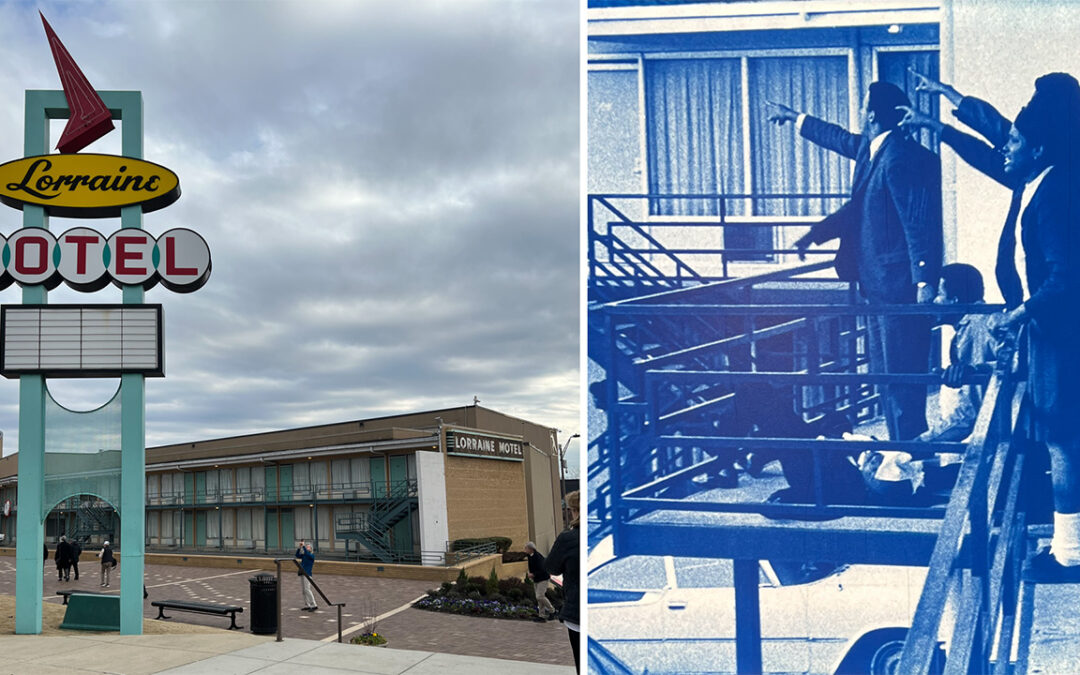
The Rebirth of the Heroes
After Ted Williams, Mohammed Ali and Bobby Orr, since I was a boy, I have been looking for heroes. There have been painfully few. The next generations have not, for me, been fertile ground.
I have just returned from a nine-day trip with a group of 15 friends through Mississippi, Arkansas, Alabama, and Tennessee. When I came home, I was shocked to learn of Alexie Navalny’s murder in a Russian prison.
I remembered that after Putin tried to kill him once before, he returned to Russia, only to be imprisoned yet again and ultimately murdered. He risked everything for the love of his country, its people and an integrity that is larger than his life. That is this old man’s kind of hero.
It wasn’t my objective but on the trip, I accidentally found the heroes like Navalny that I have been looking for.
For years, I have wanted to follow the “nonviolent” civil rights movement from the death of Emmett Till in 1955 up to when the Rev. Dr. Martin Luther King, Jr. was killed in Memphis on Aril 4th, 1968.
Yes, I had seen all the pictures, read the books and knew the dates and places as we all have. This movement started when I was in lower school and compounded until it arguably ended with the assassination of Martin Luther King, Jr. when I graduated from high school in 1968.
It was all familiar to me.
But all the histories and research I had done became like reading the script of a play until I walked onto the stage where it had happened. Then I had no escape. It is different when you are surrounded by it. It is different when you become immersed in it.
The Delta blues surrounded us as we passed the crossroads where Robert Johnson is said to have sold his soul to the devil, then parked down the road near Baptist town to walk near where he had been laid to rest.
Much of the Mississippi Delta, our guide at the front of the bus informed us, is owned by eight families.
For hour after hour, the low flat land passes by, with row after row of cotton plants as far as the eye can see on both sides of the road.
Finally, we left the two-lane road from Jackson, Mississippi and traveled down a dirt road to a big house with five or six little cottages next door to it. These are the houses for the families of the tenant farmers who live there surrounded by their work, earning an annual income of around $8,000 a year — that is, before they paid their rent.
On the bus days later, I tried to better understand the famous 1957 picture of young Elizabeth Eckford as she tried to integrate Little Rock Central High School while screaming white people threatening her 67 years ago. Days later, I met her — now in her 80s — as she sat quietly in front of us and answered questions across from where it had all happened.
She said her parents were determined not to back down and they would not talk about it. She said it had taken her almost 40 years to come to grips with what had happened to her in that one day, and for the remainder of the school year, day after day, as she withstood catcalls and being shoved into lockers as she walked the halls.
That little girl in the picture with the sunglasses on, holding her books alone and determined, gives no evidence of the damage that was done to her, which had stayed with her for so long.
It was much the same with the picture I had seen of the cluster of black men in Memphis as they were all turning and pointing in unison as Martin Luther King, Jr. lay at their feet on the balcony of room 306 of the Lorraine Hotel. The hotel has been turned into a much bigger museum, with a plate glass wall preserving the hotel room that these men had left to talk to friends three stories below. It is now forever frozen with the shades all drawn.
I was not ready for 14-year-old Emmett Till’s final journey down from Chicago to visit family in Mississippi to the candy store where he whistled at a white girl. His two assassins had tracked him down three days later and extracted him at gunpoint from his relative’s house to be beaten beyond recognition and dumped in the river. Days later, he was fished out to be buried back home in Chicago in an open casket.
It all rushed at me hours later, when I found myself in the courtroom where the two men were exonerated in 67 minutes by an all-white jury who said they had a ten-minute Coke break to extend the deliberations. I was sitting in the seat of juror number six, right across from the witness stand where Emmett’s mother had testified in tears.
After I opened the news when I got home, Navalny’s murder drove me back to that trip.
I found heroes in many of the locations we visited. In the Mississippi Civil Rights Museum, those heroes were in the records of the hundreds of lynchings, including many who could not be identified.
There are names we all remember, of course. They were committed to their country and to peaceful change despite the daily risk they might be killed. Martin Luther King, Jr., in his “I’ve Been to the Mountaintop” speech, said he could see the promised land, but perhaps he would not be there with them when they entered it. Soon thereafter, he was killed.
Medgar Evers, who was shot from across the street at midnight, had trained his children to run to the bathtub and hide whenever they heard gunshots, because it was the only place they might be safe from a high-powered rifle.
Medgar Evers was killed by a high-powered rifle bullet that went through him, through the front window of his living room, through the wall of his kitchen, and then lodged in the refrigerator.
These people died to advance the cause of freedom. Let’s remember them as we move toward an election that could determine how free we really are.
The night I returned, after I unpacked and turned out the light and set the alarm for an early breakfast, I thought about the people who I had met and the surroundings that had given old history a new life. I went to sleep thinking of those people as little candles where I could warm my hands, little flickering lights burning in the dark.

A New Book…
Thanks to all who have been following my posts over the years, and for all your comments, support and encouragement.
Very soon I will be putting out a new book that collects some of my favorites of these stories, focusing on people and relationships (and trying to avoid politics).
It’s called “The Older You Get, the Shorter Your Stories Should Be.”
I’d like to ask a favor.
I’m hoping to use some quotes from my readers to help market the book, but I want to make sure I have permission, so I’ve set up a form here:
https://robertbowiejr.com/book-preview
If you have any thoughts or recollections to share, just a sentence or two, please weigh in — and be sure to let me know if I can reprint them.
To jostle your memory, that same form will take you to a sneak preview of the book’s first few stories. I hope you’ll enjoy them.
I’ll also keep you posted on the upcoming book launch.
(If you know anyone else who might be interested, please pass along that URL.)
Thanks again. I hope you will contribute!
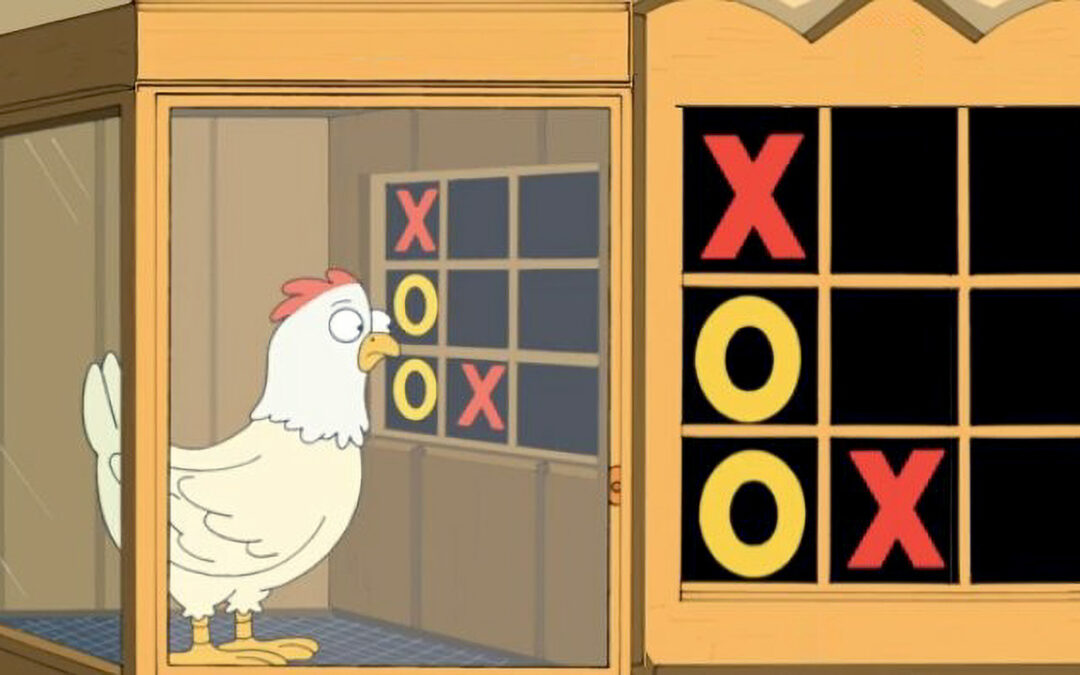
Trial Strategy Learned from a Chicken
Abraham Lincoln famously said, “You can fool all the people some of the time, and some of the people all the time, but you cannot fool all the people all the time.”
Lincoln’s quote applies to the voting public as well as trials before a judge or jury.
Former President Trump appears to be trying to win his legal cases with political arguments. He cares little about judges, but is determined to win an election, in order to pardon himself or have another Republican pardon him if he doesn’t run. Trump is leading in the polls, so this should be easy for him to do.
I learned how to do this from a chicken.
Years ago, I represented one defendant of four that were accused of stealing trade secrets that were provided to the lead defendant who allegedly included them in a patent for software designed for huge construction projects.
The plaintiff was a self-taught computer programmer. He was represented by a prominent New York patent firm.
The lead defendant was represented by a large Chicago law firm, which had contracted for the entire floor of an NYC hotel for the two month trial. The four trade secret defendants were represented by separate individual lawyers. I was one of them. The case was tried before a jury in the federal court in Manhattan.
I liked my client. I believed in his innocence after watching how he lived. Over the two years of depositions and trial prep, I became convinced of his innocence.
He had gotten a scholarship to college as an athlete. He struck me as a fellow who played hard, but he played by the rules. He was remarkably oblivious to how personal impressions shape jury decisions, perhaps because he was so straightforward.
The large Chicago firm gave the opening statement for the defendants that ran for a day and a half. They kept open every possible defense available and there wasn’t a defense that they didn’t like. One juror went to sleep but the lawyers seemed too busy to notice.
The other four defendants, the trade secrets defendants, each argued in their openings for at least two to three hours each, except for me.
As I watched those opening statements, I abruptly changed my strategy given the jury’s reaction to the openings.
I told the jury my opening statement would be no more than 15 minutes and whenever this trial ended, my closing summary would be no longer than 15 minutes and they would find that my client was not guilty.
I told them a little about my client and his little company, and then I sat down easily within the 15 minutes I had slotted for myself.
Every day of the trial, all the lawyers for the defendants went to lunch in Chinatown, which was right behind the Federal Court in Manhattan. The restaurant we went to had two attractions: 1) the dancing chicken, and 2) the chicken that would play tic-tac-toe against you.
You put the coins into the slot, and out would come the chicken. It would stare at you until you made your first move, tapping on the tic-tac-toe board that was on the glass that separated you from the chicken. An “X” would appear. The chicken would then make its counter move, pecking its choice of position, where an “O” would appear.
Even though all of the defense lawyers went to eat at this Chinese restaurant, none of them played this game because, I’m convinced, they didn’t want to dim their genius by losing to a chicken. That is certainly why I didn’t play against the chicken.
This was a serious chicken. The chicken was really good. It was so good that years later when the chicken died it got an obit in the New York Times. It was all a con job, but everyone was captivated by it. The chicken was given a signal where to pack in order to get fed, and thus peck the correct box.
As the trial progressed, I grew more worried that this case was so complicated that nobody understood it. Worse, now there were at least three jurors who were dozing off.
I became convinced that the defendants would not be considered individually. I feared that they would be lumped together with the patent defendent, and the smaller trade secret defendants would be found guilty as well, including my client.
When it became my client’s turn to testify, he came to town and, before he took the stand, we went to the Chinese restaurant. However, on the way to the men’s room, when I wasn’t looking, my client challenged the chicken.
The lawyers stopped eating and watched my client as he lost to the chicken about an hour before he was going to testify. After he lost to the chicken, everyone was remarkably quiet and nobody seemed to be eager to talk to me.
In a funny way, the loss to the chicken confirmed for me my client’s integrity and it fit quite nicely into my new strategy.
When I put him on the stand, I abandoned my prepared outline and changed gears. I kept it short, simple and direct. I flat out asked him whether he had stolen anything that became part of this purloined patent. He was surprised that I had changed our planned testimony. He replied instinctively without reservation and answered no.
I then announced that was the only question I was going to ask and then I sat down. The plaintiff never cross-examined him because he was small potatoes, and there wasn’t much testimony to cross examine.
Thereafter, I also changed gears and cross-examined the plantiff’s patent expert witnesses about the trade secrets case, which they knew nothing about. They cared only about the patent, not about the claim of trade secrets theft.
I asked each expert witness the same question: “After the years that you have put into preparation for your testimony, did you find any evidence that convinced you of my client’s guilt?” In each case, they shook their heads and answered no.
The other lawyers thought I was crazy and looked down at their papers in an effort to avoid laughter.
I added insult to injury by dramatically turning to the court reporter and saying that I wanted a copy of the answer to my question and, in each case, the court reporter nodded and I would get a couple of pages of transcript the next day.
After almost two months of trial, we went to closing, and again all the defendants gave days of closing arguments. When it came to me, I put my watch on the lectern and I looked at the jury and said, “Remember my promise of almost two months ago? I am going to give you a closing that will not exceed 15 minutes.” Then I quoted from the transcript pages that I had requested from the court reporter, the answer from each expert witness that stated they had found no evidence relating to my client.
Back then, during breaks, everybody could smoke cigarettes in the hallway. I got to know the plaintiff because he smoked a pipe and I smoked cigarettes, so we shared matches and talked.
He saw what I was doing and actually appreciated it. He would always start off after we inhaled and then, with a smile, would laugh and say, “smoke and mirrors.”
All the other lawyers waited three days for the verdict. I had to catch the train back home because I had a small trial starting the next day. After three days, the jury came down hard against all of them, but acquitted my client.
A day later I got a faxed letter from the plaintiff. He had won big, but he still sent me a letter with a smiley face and “smoke and mirrors — congratulations.”
So much of the time, appearances are more powerful and persuasive than the facts. We will see if Trump “fools the people” in the end.

You Think You’ve Been Embarrassed?…
You think you’ve been embarrassed? Well, I’ve got you beat.
First, it all happened to me on the other side of the planet so I couldn’t go home, turn off the lights and put my head under the pillow.
It happened in Xi’an, China, in an airport the morning I was scheduled to fly to Chongqing to see a panda sanctuary, then board a boat to go down the Yangtze river through the Three Gorges, and then down to Shanghai.
Second, I was traveling with a small group and the Xi’an Airport was huge, so I had nowhere to hide as my embarrassment went on and on and on…
It all started innocently at dinner the night before we were scheduled to fly out of the Xi’an airport the next morning. Our guide addressed the group and informed us that because our plane left so early the next day we all must have our bags packed and outside of our door at 4:30 so they could be picked up and taken to the airport before we went to breakfast.
Everything had to be packed except the clothes we would be wearing the next day and whatever toiletries we required for that morning.
We were told that those toiletries, once used, had to be carried on our person until we landed at Chongqing airport several hours later at which time we could return them to our suitcases.
After dinner that night, we all went up to our rooms, picked out the essential toiletries, which in my case was toothpaste, toothbrush, shampoo, razor, soap, and hairbrush. I also chose my clothes for the next day, which in my case, were one of my endless pairs of khaki pants, a blue long sleeve business shirt, underwear, sox and shoes.
All the rest was packed in the suitcase, which I put outside the door right before I set the alarm and went to bed.
The next morning when my alarm went off, before I showered and shaved, I peeked out the door. My suitcase was gone and on its way to the airport. I looked at the clock and measured the short time I had to get to breakfast.
After my shower, I bundled up my toiletries, put on my blue business shirt and started to pull up my khaki pants, but couldn’t understand why I couldn’t get them on until I realized that the only pair of pants I had to wear were actually those I had mistakenly packed, which unfortunately belonged to my teenage son.
My son has a 32-inch waist. I do not.
I was running out of time. I had to get to breakfast.
I grabbed both sides of the pants so that my fingers gripped the pockets and I hoisted as hard as I could. No progress.
Next, I lay on my back on the bed with my feet extended in the air and bounced on the bed to get maximum leverage, kicked my feet into the air and yanked with all my strength. No progress.
The top of the pants made it to maybe slightly above my crotch. I’m pretty certain I did not get the pants high enough to halfway cover my back end. Nothing.
Next, I tried straddling a chair and forcefully rode my pants like a cowboy rides a horse in order to force the crotch into submission. I then tried jumping up and down to get maximum thrust, lift and torque. Nothing. This was not good!
I had to get to breakfast but I couldn’t leave the room. This was not good at all!
I reassessed my situation.
I still had to put on my shoes and socks. I would have to roll up the bottom of the pants so that I wouldn’t trip over them.
I was able to walk, but only if I could hold the top of my pants up as high as possible, and walk with my knees banging together every time I took a step.
I searched the room for any possible help. I was fortunate to find yesterday’s Chinese newspaper — bright with color — to cover my crotch.
It was a very long and slow elevator ride for every inch of the decent down maybe three floors. I noticed that the Chinese people in Xi’an, at least in this elevator on this particular morning, tended to be very quiet as they tried to find someplace else to look other than at my crotch.
My group at breakfast was less forgiving. They had to stop eating because they couldn’t stop laughing.
Our guide tried to be helpful and encouraged me to wander the airport to find a clothing store, apparently in the hope that I could learn Mandarin instantly and acquire a pair of pants that was twice the size that any self-respecting member of the culture would never wear.
The guide was just trying to be helpful I know, but didn’t seem to understand that I was really, at this point, no longer interested in clothing. I was no longer hoping to fit into the culture.
I was hoping to vanish from the face of the earth.
Everyone in the airport seemed to be walking by and rubbernecking in order to catch sight of whatever everyone else was laughing at.
I was completely hunched over, gripping my newspaper and pants, with my pant legs rolled up above my ankles and, just to add to my unlikely assimilation into the culture, I was wearing my disposable razor, shaving cream, toothbrush, toothpaste and hairbrush bundled up into a boutonniere blooming from my shirt pocket to add to my look.
The Chinese newspaper was fast becoming my most valuable asset since, as it turned out, my seat on the plane was between two meticulously dressed, very frightened Chinese businessmen who apparently feared any eye contact with me, their fellow traveler, for fear that it might prompt me to flash them.
In times like this I try to focus on making my situation into a positive learning experience.
After thinking about my situation for a little while, I concluded there wasn’t a lot to learn so, in the alternative, I thought it might be helpful to try to imagine what could be worse than what was happening to me at this exact moment.
I no longer wonder what it must feel like to wear a miniskirt if you are knock kneed, but that wasn’t bad enough, so I tried to imagine what it was like to wear a miniskirt, knock kneed with high heels.
I made sure that I would be the last person to leave the plane when we landed. in order to give the baggage handlers extra time so when I went to pick up my bag it would be there.
I hid in the airport men’s room for a while. I was afraid I had permanently injured my lower intestines. I was sure I had bruising. I couldn’t really lift or lower my pants now.
Eventually, I built up all my courage and raced through the teeming airport hunched over, with one hand holding the top of my pants and the other gripping my newspaper.
I swooped down on my bag and hauled it into the men’s room, found a stall, opened the suitcase, liberated myself of my son’s pants, and instantly threw them away for no good reason other than I needed to purge them.
A few months ago, I went on a trip with some of that same group that had gone on the China trip. When my story came up, I refused to relive the experience, so they went right ahead and told it anyway. They kept on embellishing the story at my expense.
The trip to China was 10 years ago, and the listeners could not stop laughing. Apparently, it gets better and better.
One person, who I am not sure was even on the China trip, claimed to have seen it all from the back and referred to it as “the morning the moon rose over the Yangtze!”
I must now live in infamy forever.

Learning to Live Rather than Litigate
Recently, as I waited to exit a Southwest flight in Baltimore, a fellow traveler — who also turned out to be a fellow retired lawyer — laughed and asked me whether retirement had changed my life much, or perhaps had even changed my view of humanity.
The two of us had met and decided to sit together in the Boston airport while waiting to board from positions A-1 and A-2 for business class seating.
Now we both were waiting patiently to exit from the middle of the plane because the 22 wheelchair-assistance passengers who had pre-boarded would be exiting from their aisle seats, which they had taken when they entered the plane.
I decided to answer the two questions separately. First, I told a brief story to illustrate what my life was like as a practicing lawyer:
One afternoon around 4:00 o’clock while I was actively practicing law years ago, I developed chest pains. I was on the phone with a witness for an upcoming trial, so I decided that I would finish the call before I dealth with the pain in my chest.
After the call, I decided to try hanging off a door to ease the pain.
I found a door that was part open, put my hands on the top, and hung from the door to see if the pain would go away. Ater a while it did so I went back to work.
Later that night at dinner with my wife and children, the pain returned. I didn’t want to trouble anybody, so I left the dinner table, found a door and hung off of it for a bit until the pain subsided again. Then I flushed the toilet for cover and went back to dinner.
But later, around 1:00 o’clock in the morning, the pain returned. I got out of bed to find an open door somewhere in the house. My wife woke up, rolled over, and saw me hanging from the bedroom door. She told me to go immediately to the hospital.
However, when I went into the closet to get dressed, the only clean shirt that was readily available was a white shirt just back from the dry cleaner. I put it on and looked for a pair of pants. I found only a suit, which I immediately put on and then I was stuck with a problem. I couldn’t possibly go in a white shirt without a tie, so I just reached into the rack of ties and put on the first one I grabbed. I didn’t turn on the light because I didn’t want to wake up the house, so I didn’t even know what color it was.
Finally, I got lucky. I had no problem tying the tie in the dark.
It was about 2:00 o’clock in the morning and the roads were empty as I sped down the highway toward the nearest hospital. The pain was getting pretty bad and for the first time it occurred to me I might die.
In that moment in the dark, my mortality became very real to me. I concluded I might never leave the hospital.
It was a remarkable revelation for me, so I reached into the glove compartment and pulled out what I considered would probably be my last cigarette.
At the emergency room parking lot, I started to get out of the car, but realized that my briefcase was in the passenger seat next to me. I was concerned that there were confidential papers belonging to my client pertaining to the trial that were in that briefcase so I brought the briefcase with me into the emergency room and politely let the nurse know that I was having chest pains.
Before I knew what was happening, I was being pushed back into the seat of a wheelchair with my briefcase squarely riding on my lap and then wheeled at a high rate of speed toward cardiac care by a nurse in the night time hospital. She patted me on the shoulder and asked in an exasperated voice “So you think you might have a heart attack at 2:30 am and be back at the desk by 7:00?”
Well, the nurse overreacted. It wasn’t a heart attack. It was just gallstones that nearly killed me, but I had been right, hadn’t I?
As my story ended, we began to move down the aisle and exited the plane. Gathered by the gate were almost 20 wheelchairs. None of them had been used to take any of the passengers into the airport.
My traveling companion and I both laughed good-naturedly. “So, what about my second question,” he prompted. “Has your view of humanity changed?”
“It’s all how you look at things,” I replied with a wry smile. “Isn’t it wonderful that Southwest doesn’t charge extra for miracles?”
We laughed, then hurried to our next transportation.
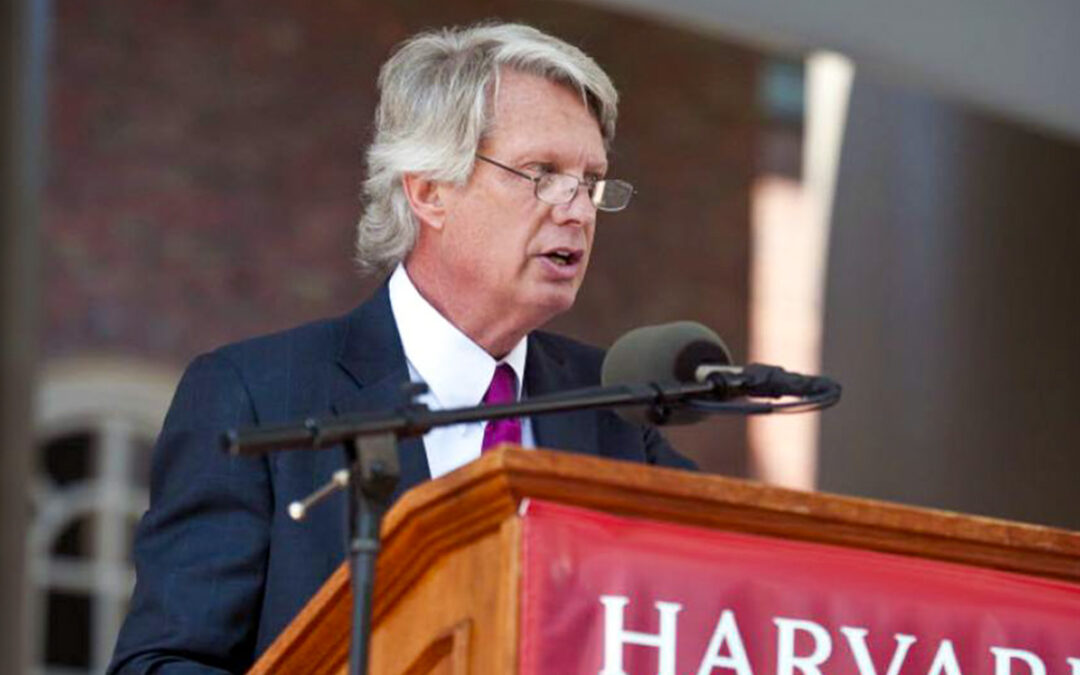
From Hippie to Happy
Hopefully this will make you laugh.
This is the year of my 50th college reunion and here is my ode about what I think about that.
–––
The 50th Reunion of the Class of 1973
(and a Tip of the Hat to the Class of 2023)
So is this where sex, drugs, and rock ‘n’ roll ends?
With grandchildren, prostate problems and Depends?
Not for the class of 1973
On this, our 50th anniversary!
We’re the Alums that never stopped having fun…
For us our college years were just a dry run
So why try to remember what I’ve forgot?
Maybe it’s a little. Maybe it’s a lot.
Who cares? Fifty years of paranoia
Now pot’s legal’n, some say, even good for ya.
Forget that thought that we are all old relics.
Now shrinks treat patients with our psychedelics.
Memory and “smarts” never go hand in glove.
I’ve no memory of what my major was.
Who cares, long as they don’t take my diploma back
If my “memory lane” is a cul-de-sac!
I do still remember my graduation!
That 50th, class of ’23, had some fun!
And that is one thing that I’ll never forget.
Them dancing to James Brown, I really regret.
I’ll tell you the whole truth. I will tell you no lie.
Wasn’t exactly “Fast Times at Ridgemont High.”
Man, we lived through some stuff you just can’t forget:
Watergate, Berlin Wall, and the Chia Pet.
But wait! Just stop and wait. I wonder what we
Look like to the grads of 2023?
They’re so advanced I check for hair on my palms.
They have evolved so much! They’re truly phenoms.
I still type with both hands and I feel very dumb.
Darwin was right. Now they can type with their thumbs.
Oh, but we’ve got wisdom in the class of ’73!
First, you must accept Harvard’s study on longevity.
It is not your new Harvard degree or your new PhD.
Joy comes from your classmates, and your friends and your family.
Second, the older you get the shorter your stories should be.
And last, “Peace ’n Love!” from the great class of ’73.
–––
For the last 10 or so years I’ve been a poet laureate. I love the school, I love my class, and I love my classmates, and all I have to do to keep the job is hope the alumni laugh. This is a very prestigious job which pays nothing and thus has made me irreplaceable.
Visit https://robertbowiejr.com/haa/ for further hometown skulduggery.
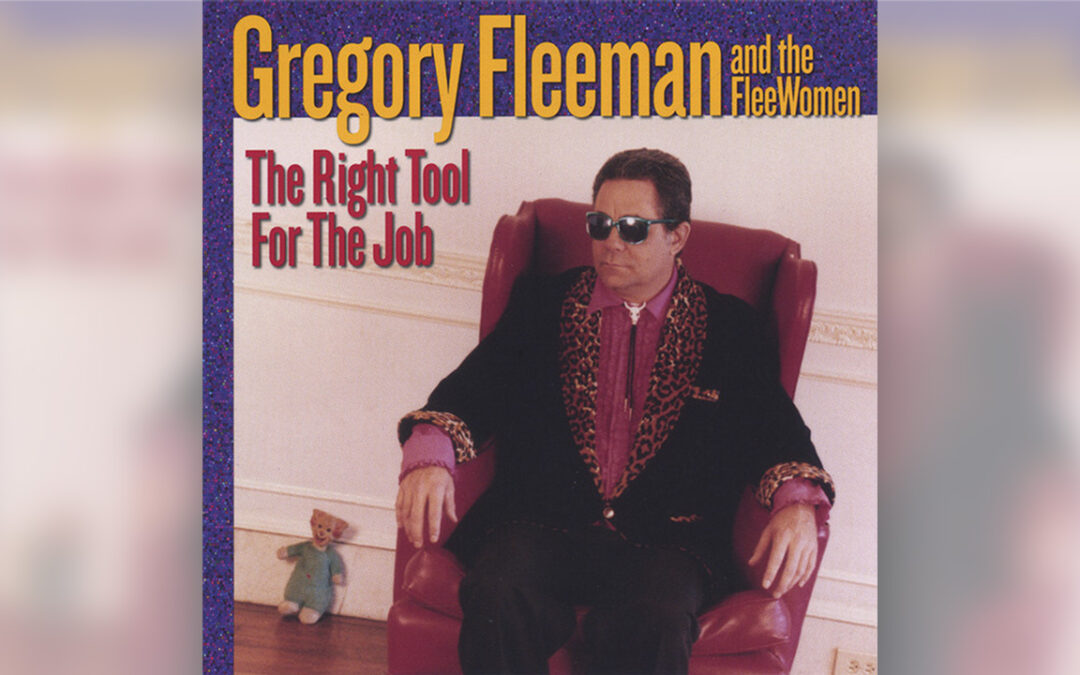
Hubris Unchained
Many of us in our joyous misspent youth, particularly in our teenage years, enjoyed the undisciplined fun of our juvenile hubris.
Hubris is an ancient Greek word that describes excessive exuberance, confidence, or pride, which can often bring about one’s downfall.
The art of teaching teenagers during the hubris years requires a middle path, somewhere between crushing the hubris and leaving it untethered. This middle path requires the difficult task of helping a student to channel hubris to promote individuality and personal growth, because this youthful burst of enthusiasm often can be the first sign of what a young person’s real interests really are.
Think of the people you know who discover that they hate their careers in midlife and go in an entirely different direction or, worse, don’t.
My experience is that many of these people were not educated to question and challenge their conclusions. Rather, they were educated to take good notes and vomit it all back on the final exam to be rewarded with a great grade, and then passively step into careers in which they were never really interested.
Whitney Haley, our drama teacher at the Cambridge School of Weston, was a master of the middle path. He marshaled his resources and directed us with surgical, gentle humor.
Whitney was an aging, portly diabetic, who had long ago retired from a career in the silent movies. He did everything with an intentional dramatic flair. He pronounced his name with one hand dancing in the air as Whit-Née (brief dramatic pause) Hay-Lée (and then wait for our response). He herded us with humor rather than a cattle prod. Everybody loved Whitney Haley!
In our high school play, I was cast in the role of John Hale, the strict Puritan minister, in Arthur Miller’s The Crucible. Before opening night, we all applied our own make up, which was approved by Whitney before we went on stage.
I came to the conclusion, as I was putting on makeup for the first time ever, that John Hale was actually “tall, dark, and handsome.” I decided he had to be Movie Star Handsome.
Whitney walked by and noticed that I was becoming darker and darker. With his customary dramatic flare and his best stage whisper, he intoned: “Perhaps my memory has failed me. Isn’t this a play about a witch-hunt, which did not happen to take place on the beach.”
The dressing room broke into laughter but it was not at me, it was how Whitney delivered his edict. I had not been shamed. I had just been encouraged to take a second look in the mirror, and become educated as to my “hubris.”
Unquestionably, Whitney Haley‘s favorite student was Greg Fleeman, who could not stop himself from making people laugh. He literally could not help himself. He was constantly funny.
When Greg would bring his chaos to Whitney’s classroom and inadvertently shut down the class, Whitney, with his perfect timing, would stop the class, go into his pocket, and offer him a handful of change: “Greg-or-ee. Would you mind if I interrupted you briefly and trouble you to step out of the room, travel down the hall to the candy machine, and acquire a Milky Way candy bar for me, which I will gladly give you as a reward at the end of this class if you will allow me to continue to pursue my chosen profession?“
Whitney, with his perfect timing, would regain order to his classroom with humor and without injury or shame.
One Christmas vacation, Greg invited me back to visit his family in Miami. His father had been a developer of real estate on Miami Beach, which had made him very wealthy, but Greg, who I believe was his youngest son, had absolutely no interest in taking over his father’s business. Greg’s family had surrendered their son to the Cambridge School Of Weston to let him be who he was, despite their ambitions for him.
The first night I was invited to a somewhat formal evening meal. Mr. Fleeman sat at the head of the table. Greg never stopped talking, and his father never stopped laughing uncontrollably.
Greg went on to become a very original and eccentric rock musician. He also became the apple of his father‘s eye, the family business be damned. Greg was much too eccentric to be appreciated by the audience of his day, but he was invited regularly backstage by those more famous than he.
I saw him perform with his band, Greg Fleeman & the FleeWomen, at a small venue in Greenwich Village. He had a small but very loyal following. He was like a standup comedian with an amazing voice. He was always Mr. hubris. but with Whitney whispering in his ear.
Greg Fleeman was far too original to even be considered by schools that granted good grades to those who were able to take notes and recite back what the teachers had said rather than question everything, which is what CSW had taught us to do.
Many of the people who I went to school with describe their experience at the Cambridge School Of Weston as “life-saving.” So it was, not only for Greg Fleeman, but also Whitney Haley and me.
Whitney is long since gone and Greg Fleeman died last year, but he left a CD, “The Right Tool for the Job,” which I go back to again and again, just because it holds all of his irreverence, both in his lyrics and his orchestration. My favorite tracks are “My Ex Wife” and “Skin Tango.”
You can listen to it on YouTube: https://youtu.be/wjqnSOl41Ac.
He was original, and became himself because everybody else was taken.

America and the Self-made Man
Back when I was growing up, I was taught two different definitions of success: the so-called “self-made man,” and the person who creates community. For me, two very different people have proved this point.
One was a client of mine in the early years of the law firm I’d created as a sole practitioner in 1990. He was a businessman from rural, hardscrabble Pennsylvania, who had moved to Maryland when he was young and made a lot of money, developing lots for home construction in the Baltimore suburbs. With his success, he built a grand house, lavished gifts upon his wife and three boys and, for himself, he bought a limousine and hired a driver.
The businessman defined himself as a “self-made man.”
The other was my soccer coach at the Cambridge School of Weston, who built a high school sports team at a progressive school in the late 1960s. He was soft-spoken, had an easy smile and natural authority.
Both were entrepreneurial but their styles couldn’t have been more different.
Cambridge School of Weston was a little progressive school outside of Boston. For every other school, the preferred fall sport was football. CSW offered either soccer or rugby, I think because the equipment was cheaper and both of these sports served the character of the school better than football.
Another difference was our mascot. The schools we played against had lions and tigers, bulldogs and bears. We had a gryphon, and our school newspaper was called The Gryphon’s Eye. For half my first year, I didn’t know what a gryphon was. When I looked it up, I found out it was a ”fabulous beast with the head and wings of an eagle and the body of a lion.”
All the other schools had fierce animals, and we had a myth as a mascot, which seemed fitting.
This little progressive school changed my life. It bucked the system and the traditional trends of the times. It taught a Socratic education. It encouraged us to question everything.
Anyway, our soccer coach was typical for this school because he taught us to challenge traditional authority and conventual behavior.
At this time, the strategy of high school soccer was to kick the ball as far as you possibly could down to the other end of the field and then try to score before the other team’s defense would kick the ball back up the field and then try to score using the exact same logic and conventions.
This strategy for the long kick game was dependent on speed and power. It required constant, repeated substitutions of the entire offensive, midfield, and defensive players whenever there was a whistle or break in the action, before the players became exhausted.
Finley was outside of the box from the start. He had to be. We only had about 15 players to fill 11 positions and, to make matters worse, we were ragtag free spirits who sang and played guitar during free periods and attended school in sandals.
Discipline, like running laps, took some reprogramming.
Finley built his future team by turning disadvantage into advantage. He told us that we would not substitute any of our 11 players unless there was an injury serious enough to cause removal. He knew our fear of exercise was real.
He informed us that we would have to get in shape, but he would not run us the way the other teams were trained. He had a plan. He informed us that anyone who kicked a ball that went over the height of the knee of the teammate we were passing to would have to instantly do a lap.
Findley built an offense out triangles. All we had to do is maintain control of the ball by passing, no higher than the knee of the recipient, and that person did the same thing to another teammate to complete the triangle. Once that was established, we were in control of the ball until we could take a shot on the opposing goaltender. If we could perfect this style, we could run the other team ragged, no matter how many substitutions they made.
Basically, it was pinball, but we bonded around it, pretty much mastered it, and my recollection is that we lost only one game against huge high schools, who replaced lines and kicked the ball down the field until we got the ball and again controlled it and scored.
We never were as big or athletic as the other teams. We were in shape, but we never ran like the other teams did. We didn’t have to. Because I was the laziest person on the team, I was the goalie. I think I only was scored on once the entire season not because I was any good but because I never saw the ball.
Findley was admired as a genius but not because he was a self-made man.
The client I represented who saw himself as a self-made man believed the soul of American capitalism was dog-eat-dog. He would, where possible, never pay his bills and, before I represented him, his prior lawyer had set up corporations within corporations that had no assets so that when a lawsuit was filed against him, there would be no money to pay the opponents if they won.
Eventually, no one would do business with him.
He lavished gifts on all of his children because it was important that they loved him, but he refused them a college education because he had none and he did not want them to be superior to him. Two of his three boys became dependent on drugs and were homeless for a period of time.
In contrast, Finley built a team that was a small but cohesive. He forced us to get out of ourselves and into supporting each other and our goal, which was to patiently beat better teams.
I’ve always believed that you are what you do, not what you say. Findley was way ahead of his time in the world of American soccer. The passing game that he taught us had been used before in Europe but he adopted it to fit his needs.
I learned from his wonderful madness.
My client’s wife called me moments after her husband died. He had been waiting for a heart transplant and was receiving daily transfusions to stay alive. When she called me, she was in tears. She said his last words were, “I can’t see! Why can’t I see? I’m not ready to die yet. I’m not ready to die.”
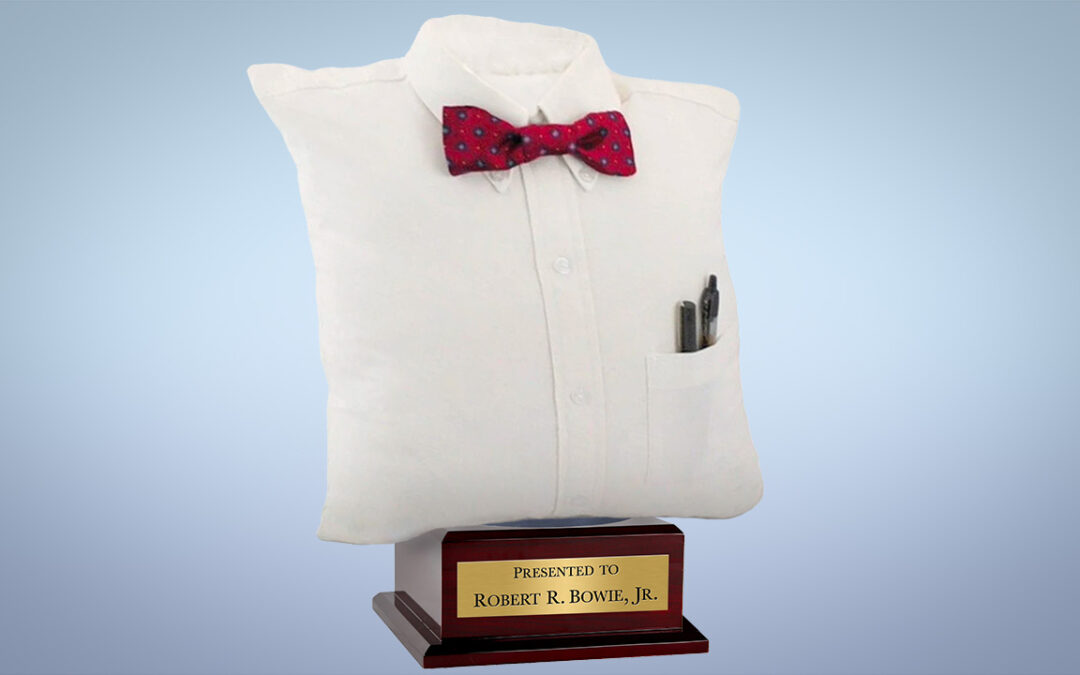
The Creation and History of the Stuffed Shirt Award
I want to tell you about a special award I created and bestowed upon myself.
The Stuffed Shirt Award.
Usually, awards are to celebrate accomplishment — with plaques or statuettes and a large party where such honors are bestowed, like The Oscars and Tonys, or Lifetime Achievement Awards.
However, there are also awards that single out questionable distinction.
For example, the Darwin Awards are annually given for “improving the gene pool.” This is deceptive because it only honors an act so stupid it often ends with the demise of the honoree and is thus given posthumously.
One of the early Darwin Awards went to a gentleman who put a jet rocket engine in the trunk of a Dodge Dart, and died after hitting a vertical cliff wall about 400 feet above the highway.
Somewhere between these two extremes lives the Stuffed Shirt Award.
The Stuffed Shirt Award is typically reserved for professionals, specifically professionals who think too highly of themselves.
The award requires a public demonstration of perceived self-worth, which must be 1) noticed by at least one other person and 2) leads to a moment of genuine disbelief demonstrated by a visible shake of the head by the observer.
An example would be the senior partner at a large law firm I was up against in NYC who FedExed his dry cleaning home to Chicago because he didn’t like the way the dry cleaners in New York City did his shirts.
Hence, the name of the award but the award is not about shirts alone. Here’s how I qualified:
I was fortunate when I first started my law firm back in 1990 to be representing a very large electrical contractor who routinely did huge jobs, such as the electrical work on Coke ovens at Bethlehem Steel, and also the Ted Williams Tunnel, which was towed in 12 sections by tug boats up to Boston from Maryland.
The case covered the construction of a subway system in southern Maryland leading from to Washington DC. There were loads of defendants.
It was an arbitration. The judge and everyone involved had agreed it should be held at the empty yet-to-be-opened subway station where the work had been done. I loved the idea because the subway station “courtroom” was my Exhibit A.
The Maryland State government had many branches and each had different lawyers representing them who were “in-house counsel.” I, however, was an independent lawyer with a big client and I was my own firm and I was damn proud of it.
I had all the makings of a stuffed shirt. All I needed was an event that would lead to a “genuine moment of sincere disbelief and the shake of the head” to be a competitor.
My client and I were seated in the middle of several tables pushed end-to-end, with all the opposing lawyers spread out on the other side.
As the arbitration began, each lawyer introduced their agency. They started at one end of the table, announced the agency, and then announced they were “in-house counsel“ for the agency.
The introductions went from left to right and finally ended after perhaps 15 minutes. None of them were independent counsel. They had all introduced themselves as “in-house counsel.”
Then it was my turn, and I decided that I needed to distinguish myself as an intimidating big shot lawyer.
I paused. I straightened the evidence books and the trial notebooks on the table, leaned forward in my chair, and announced:
“I’m Bob Bowie. Outhouse Counsel.”
My effort at intimidation had fallen short. The laughter rose and renewed several times, echoing in the large empty building. Thereafter, throughout the case, my fellow lawyers would periodically slap me on the back and say how funny I was.
I won the case but had dodged a bullet. There was no plaque or statuette. There wasn’t a celebration. They didn’t even know I had qualified for a Stuffed Shirt Award. To my amazement, this was the start of several long friendships.
Whenever I see them, they are quick to remind me that I am still their favorite “outhouse counsel.”
Self-importance can be like a hot air balloon.
It’s beautiful to see the world from an exulted height but returning back to earth may be its unexpected gift.

A Miracle in Rhinestones
Years ago, I met a boy who never once told me the truth but had the heart of a saint.
Back in August 1968, outside of Cheyenne, Wyoming, I was hitchhiking east when a state trooper pulled up next to me. He told me that he was going down the highway for 15 minutes, then turning around, and if I wasn’t gone by the time he came back he was going to lock me up in Cheyenne “until I got a court date.“
This was serious.
As the officer’s taillights disappeared down Interstate 80, I turned around to face the empty road and stuck out my thumb.
I needed a miracle.
As the first car approached, I knelt by the side of the roadway with my hands pressed together simulating prayer.
That car, an old white Ford convertible, was driven by a boy who appeared to be in his mid-20s. He wore a huge cowboy hat, and rhinestones from his shirt collar to his new boots. The boy pulled over and waved for me to get in.
As I thanked him and started to explain my predicament, he laughed and waved off any further conversation. He told me not to worry because he would be driving all night to see his father in Fort Dodge, Iowa.
First car? This guy? It was a miracle… but it gets better.
Next, he asked me if I was hungry. I laughed and nodded yes, and he reached under his seat to hand me a can of peaches, a can opener, and a plastic fork.
He was clearly showing off. You could tell by the grand gestures of his performance and his broad grin. He was having fun.
After I finished the peaches and drained the can of its last sweet syrup, I settled into the ride as he started to talk. He told me that he had been a foreman for the last several years at a ranch, and the night before in Reno, he had girls in the front and back seats of this very car because he had won money in the slots.
As we drove deeper into the night he told me that before he had been a cowboy he had been a soldier of fortune, and had parachuted into Nicaragua as an agent for the CIA.
His stories were endless and detailed, full of life and love and compassion for those he had worked with, and for the women he had been fortunate to love, as well as those who had broken his heart but had been kind enough to have loved him back for a while.
He was a natural storyteller and the more we relaxed together and talked, the more I liked him for his joy.
Slightly before dawn, when we turned off the Interstate and headed up toward Fort Dodge, he offered a surprising apology: “My old man never amounted to much. He was a postal worker. He drank himself out of the job but he’s always been there for me. He is sick now. I never knew my mom. She left him, but my father, he always has been there for me.”
As the light brought color into the outskirts of Fort Dodge, we turned onto a street of freestanding houses in an empty neighborhood with untended lawns, litter on the streets, and an occasional abandoned car.
The door to his father’s house was open and the window next to the front door was broken. As we entered, I looked to the right. There was a kitchen with a table and two chairs. To the left was a living room with no furniture. Straight ahead was a staircase with a simple railing and some of the slats missing, which led to a second floor. There were crushed beer cans on the floor and heaping ashtrays on the countertop by the sink.
The boy headed upstairs to go wake up his father. Moments later, there was some heavy coughing from upstairs and muffled voices. There was the sound of crying, raised voices, but also laughter.
After several minutes, an old man slowly navigated the steps and stopped to catch his breath when he reach the bottom step.
The old man apologized for the state of the house and immediately went the the old ice box. He got three beers and proceeded to handed them out. Apparently, these were breakfast beers.
Oddly, the whole house seemed to be filled with love and I felt welcome.
As the sun came up, the two were lost in each other’s company, and so I timidly asked if I might be allowed to take a shower since I had been on the road for several days. The old man responded “Sure!” He lit a cigarette and pointed at a wash tub leaning against the kitchen wall. He told me to fill it with hot water from the sink and handed me a big jug of dish washing detergent.
I felt that I could not refuse the kindness. I filled the tub with warm water and detergent, stripped naked, and started to take a bath. The boy and his father paid no attention as they laughed and talked and smoked.
Almost immediately the police arrived, knocked on the unlocked door, then entered. They arrested the boy, put him in handcuffs and shoved him through the door toward the squad car out front. The old man burst into tears. With a beer still in hand, he begged them to release his son as the officers pushed the boy down the walkway and put him in the back seat. The officers never spoke to the pleading old man except to say. ”If you touch me, I will take you in too.”
During the entire arrest the police paid no attention to me at all as I sat naked in a wash tub and tried to surround myself with heaps of bubbles.
When the old man returned from the street, he explained through his tears that a week ago his son had finally been released on parole from a Kansas prison. He had been thrown out of school several years before, and had been convicted as an adult for smoking marijuana near the school yard. He wasn’t a bad kid. Just a free spirit from the wrong side of town.
His father had gotten the old convertible for him and told him he could never outlive his past in Kansas. He told him to go west and “disappear” and never come back again.
The boy had initially agreed, but he had told his father upstairs that he had become homesick for the old man and he was afraid he would die and the boy would never see his father again.
Everything the boy had told me for the last 12 hours riding through the night was a lie, and also a life he would never have the chance to live.
The old man said he and his son had talked every week during the boy’s incarceration and the boy had told him he read all the books and magazines and newspapers he could find in prison.
After the old man had fortified his courage with a few more beers, he marched out the front door and headed toward the police station, which was apparently several miles away.
Alone in the empty house, I dried off with paper towels, slept a little on the living room floor, then in mid afternoon, hitchhiked to a postal delivery hub. I got a ride from a man driving a Mail truck headed east toward Chicago. He told me he’d gotten married the day before, and had been up all night. When the driver started to hallucinate dogs running across the Interstate, I volunteered to drive so he could sleep. We switched seats without stopping.
As dawn arrived, with the sleeping driver by my side, I thought about the boy and wondered why he would lie to me all night about a life he never lived, then take me to his home where his lies surely would be revealed.
Maybe it was to show he had a kind heart and a moral code, despite his life. Maybe he just gave up and didn’t care. As the sun was coming up in the cab of that mail truck, I realized that I had never asked his name, nor had he asked me mine.
Years later, it occurred to me that no matter how hard I might try, I would never be able find that boy again.
I still think of him often. He was one of the kindest people I have ever met. He has appeared in my poems and plays as a reminder that we really are what we do, not what we say.

Back to the Future
Last month I took a trip because I wanted to “feel” what it was like to live in WWII Germany and the Soviet Cold War occupation in Czechoslovakia and Poland.
I already knew the dates, places and times from textbooks, but it’s quite different to experience what it was like to have lived during those times.
Of course the trip would come alive in museums and, unexpectedly, it brought back for me a long lost feeling I had years ago when I was just a young boy. I had gotten lost off shore in Buzzards Bay in a small motorboat that was running out of gas on an outgoing tide in thick predawn fog.
It is odd how we learn through memories and association.
How odd that museums, which were about imprisonment, brought back the feeling of drifting out to sea, creating an odd claustrophobia without barriers other than an endless borderless fog.
The claustrophobia slowly kicked in when I visited Checkpoint Charlie, the famous heavily guarded passthrough in the Berlin Wall, which kept the East Germans imprisoned inside.
It started with a set of pictures of a boy who had scrambled to climb the wall in an effort to live in freedom, but the photos chronicled how he had died riddled with bullets, hanging from barbed razor wire near the top of the wall.
How odd that I could feel claustrophobic under wide-open skies?
A few days later, the claustrophobia increased in one of the East German museums that focused on the Nazi SS and their little gray bread trucks. These had no windows, just a sliding door on one side and three closet-sized cells so small that prisoners could not stand but only sit in a narrow chair, hands by their sides, while they were taken to a concentration camp somewhere outside of Berlin.
A few days later as we traveled toward Prague, we stopped at another prison that was three or four stories high with interrogation cells on the top floor. The inmates who would not answer were showed pictures of their family who would be killed if they continued to resist.
Putin had spent six months in the house across the street when he was in Soviet intelligence, attempting to flip the tortured inmates to become Soviet spies.
The claustrophobia wrapped around me in that silent building when I realized what it must have felt like day and night in there. It was missing the noise of slamming cell doors, the echoing screams and the smell of the single bucket in the corner, which acted as a bathroom in each cramped cell, with three to a single bed and no mattress.
I know now why the feeling I had on this trip was claustrophobic but I thought it was still an odd reaction to the history of the past until I realized I had lived my whole life free in a democracy.
All of a sudden, I felt imprisonment under borderless wide open skies as a psychological imprisonment which became unbearable.
All of a sudden, I could feel the last breath of the boy crucified and bleeding from razor wire on the top of a Berlin Wall as a reaction to my claustrophobia and his death.
Years ago, as I slowly ran out of gas in my little boat, I saw the outline of a cliff as the late morning fog broke. There were connected ladders and a climbing set of stairs. I beached the boat and climbed to the top of the cliff and knocked on the door of a little cottage overlooking the ocean.
A woman with the Sunday newspaper tucked under her arm answered the door. I breathlessly asked, “Where am I?” She looked at me quizzically and answered “Menemsha,” then paused, “Martha’s Vineyard,” and then paused again… “The United States of America.”
I remember feeling happy and alive.
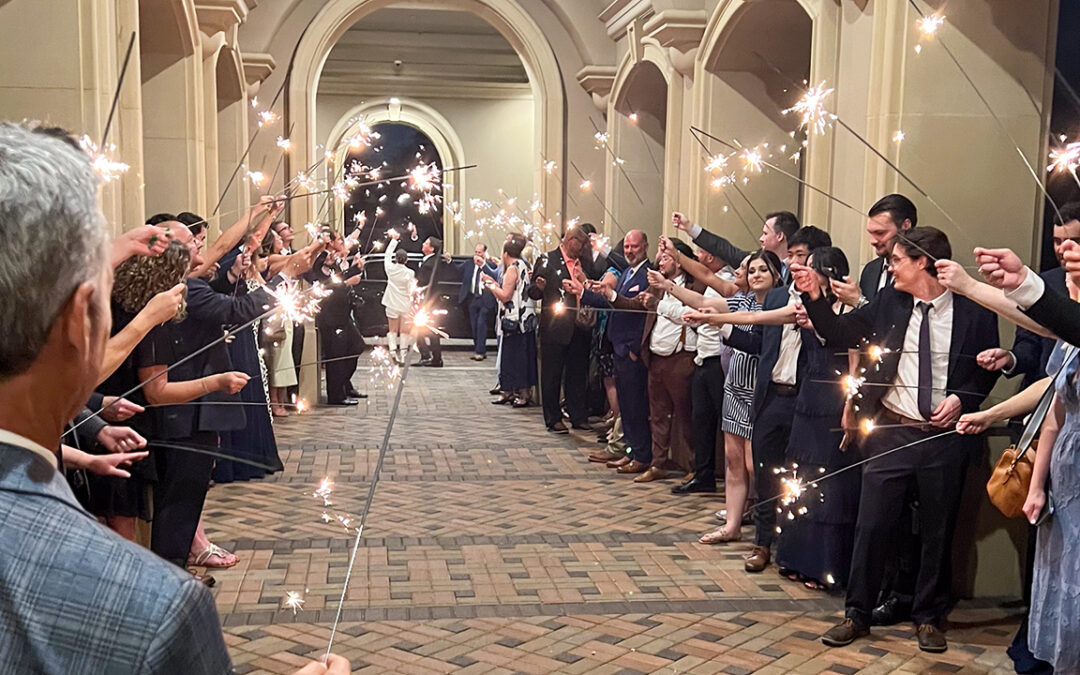
The World We Choose to Make
I have not posted a blog in the last three weeks because I have been to hell and back. I traveled to the darkest place I’ve ever been, and then returned to a place of joy, laughter, love and light.
I went on a trip through World War II in Germany, Czechoslovakia, and Poland, and then returned to witness my son’s wedding and its explosion of joy.
History as dates, places and times is taught and graded, but only the imagination can bring it to life and give it meaning.
In Poland, at the end of our trip, I went to Auschwitz, the concentration camp.
Auschwitz had the most efficient business plan I have ever seen.
I stood at the exact location where the trains emptied, and a guard made an instantaneous decision, pointing either left or right. To the left went children and their mothers (if their mothers could not work) to the gas chambers. To the right went men and women who could be worked to death. The life expectancy of those who could work was pre-calculated to be three months. Excess food was not waisted on them since there was an endless supply of new labor coming off the trains each day. They killed thousands upon thousands of these people each week.
Inside the camp today, there are multiple display cases. Behind the glass of the display cases are piles of clothes, shoes or pots and pans, which had been carried by the executed. In one display case, among the scattered clothing, there was a little pair of red children’s shoes unbuckled. In another, a perfectly intact three-foot-long braid of hair cut from the scalp of a young child. It had a light blue bow still in place at the end.
It seemed impossible to me that the neighborhoods of little country houses outside the camp did not know what was happening in there as the trains rolled in and crematoriums belched smoke that fouled the air. Could they not hear the cries of children as their parents were separated from them or of the families who came to realize that they were not being taken to a safe place outside of Germany as promised, but were living their last moments before they would die.
I was reminded of a time when I was still practicing law, when I was hired to represent a slaughterhouse in a zoning dispute. The slaughterhouse was comprised of two buildings in a suburban neighborhood in Baltimore County.
There was a little house where the business offices were located, and there was a two-story building, which had a ramp that zigzagged up to a door where three cows were lined up head to tail, waiting in line motionless.
The slaughterhouse owners were Christians, and I was introduced to a rabbi who was hired to insure that the process was kosher. I was given the tour of the site in preparation for the trial and I traveled up the ramp that held the three cows and then into the building. I remember doing a double take as I noticed the eyes of the lead cow. I saw that they were wide-eyed and afraid.
Inside the door, I passed the carcasses which had been stripped of their skin and hung swaying on hooks headless as they were carried by a conveyor belt to the efficient butchers, who cut the meat into steaks, fillets, rib roasts, and further down the line, ground beef.
Two days later, I returned from Europe and flew to Houston, where I presided over the rehearsal dinner celebrating my son’s wedding the following day.
The bridesmaids had known each other since high school. Months before, they had celebrated common birthdays together on a weeklong trip to Paris. They were destined to be lifelong friends. My son’s friends had also gone to school or college together and shared comparable deep friendships. The joy and humor of this collective group as they mingled the day before the wedding was palpable and full of laughter and love and friendship on so many levels.
After the wedding ended, the bride and groom traveled into their new life down a runway that was lined on both sides with family and friends holding sparklers.
On the flight home from the wedding, I could not forget the story I was told by our guide at Auschwitz when I asked, “did anyone ever escape?” He replied, “Only the Polish prisoners would occasionally get away because Auschwitz was in a Polish neighborhood where the prisoners could disappear and be exported out of hell by their friends.
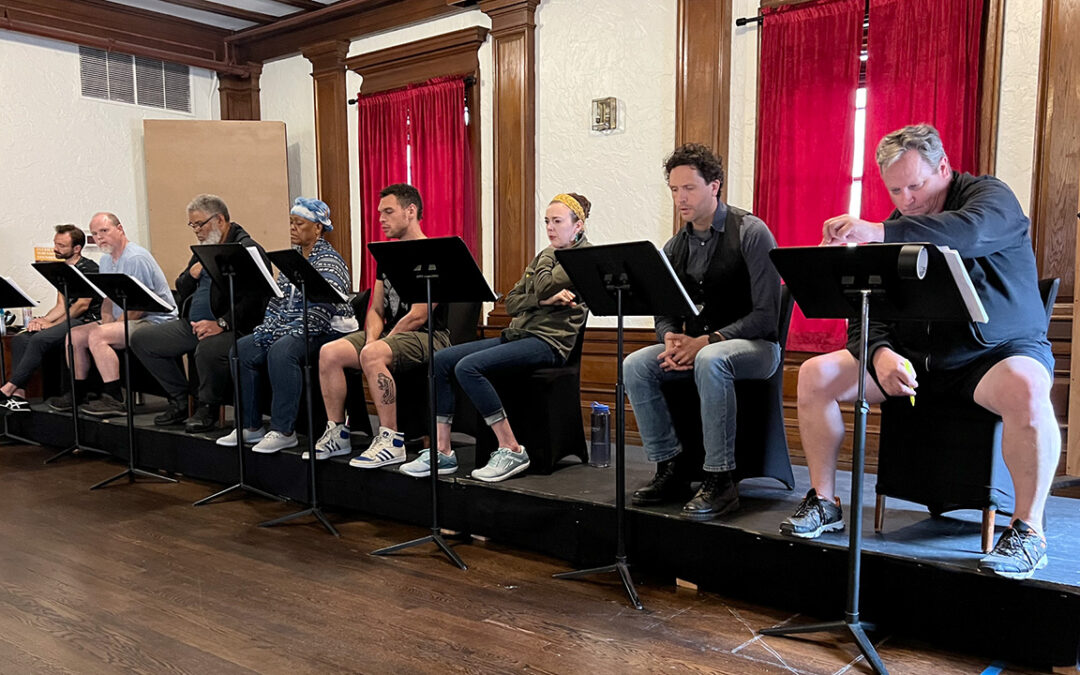
The Art of the Stress Test
The staged reading of The Grace of God & The Man Machine went very well. It had energy. It came alive.
A staged reading is a collaborative stress test for the words of the story but without the action. Its success or failure for me is measured by the energy generated by the words of the play, delivered by highly talented actors in character without the aid of action on the stage.
A stage play is different. It is an art form, caught between the novel — where the story blooms in the imagination of the reader — and the movie — where the story is told for the screen and, once told, never changes.
The theater performance is the same as the other two in that it is first created by words but it is different because it is delivered to its audience live.
We were blessed with eight characters performed by gifted actors who brought the words alive, so we could see if the play created that energy we were looking for and, in cases where it did not, make the changes needed so they do.
A few nights before Onaje opened at the NYCFringe, I was honored to have dinner with the famous Broadway producer and founder of the Commercial Theatre Institute (CTI), Tom Viertel. I asked him on opening night if he could tell if he had a hit play. He said yes. He told me to sit in the back of the theater where you could see the audience, and then look for any movement — searching for a handkerchief, unwrapping candy, or looking at the program — any motion other than full concentration on the stage. This was evidence of loss of focus, and should be marked in the text.
At ten o’clock, the day of the reading, eight professional and highly successful professional actors met Steve Eich for the first time and they began reading the play together. They had all been provided the script before, but now Steve’s direction was creating a harmony that would create this energy. They broke for lunch at 1:00, and then began their practice performance with editing and interruptions to bring that harmony to the process. I was very impressed by each actor after they finished, and broke for dinner at 5:30 to return, dressed in black for the reading at 7:00.
What happened at seven o’clock was quite remarkable. Each of the actors had become their characters, and I found myself twice lost in the words that I had written, and rediscovered the power of the play exclusively through the interactions of the actors.
At the end of the first act, I was quite surprised and pleased, because there was an extended ovation from what had been a quiet crowd. I had done what Tom Viertel told me to do. I had watched the crowd. They hadn’t moved, and when anyone did move I marked the script.
More importantly, I had felt the energy from the stage and I had been moved by this remarkable collaborative stress test. It worked.
On to the next step.
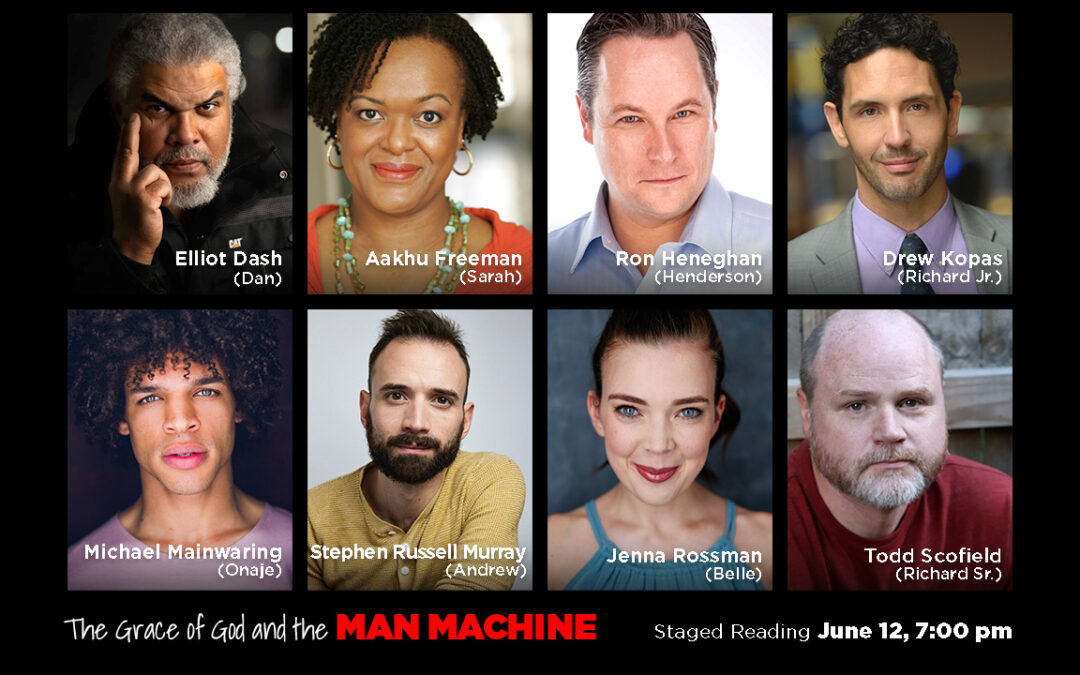
Be There or Be Square!
It’s TONIGHT, Monday night. Join us! Please use this link to RSVP:
https://robertbowiejr.com/rsvp
Our one-night-only staged reading at Chesapeake Shakespeare Studio Theatre in Baltimore is THIS MONDAY, June 12, at 7:00 pm.
Directed by Stephen Eich, former Managing Director of Chicago’s Steppenwolf Theatre, and starring a fantastic ensemble of talented actors, this staged reading of The Grace of God and the Man Machine promises to be an exceptional night of live theater you don’t want to miss.
And it’s free!
We’re encouraging theater owners and artistic directors in the Baltimore/DC area to come experience the play, and would love to have you there in the audience.
Chesapeake Shakespeare Studio Theatre
206 E. Redwood St.
Baltimore, MD 20212 (map).
Parking one block away at:
Arrow Parking, 204 E. Lombard St., Baltimore, MD (map).
Doors open at 6:30, performance begins at 7:00.
Please CLICK HERE to RSVP: https://robertbowiejr.com/rsvp
Be there or be square!

Meet our Cast of Characters and More
Meet our cast of characters:
Dan, a Chesapeake Bay oysterman, his wife Sarah, Henderson, an ex-cop, Richard Jr., a cowboy driving a convertible, Onaje, a hitchhiker navigating with a sextant, Andrew, a civil rights worker, Belle, a truck stop waitress, and Richard Sr., a Chesapeake Bay oysterman.
Meet our amazing cast:
Our staged reading at Chesapeake Shakespeare Company is coming up, Monday, June 12, 7:00 pm. Thanks to our casting director, Barbara Pinolini, we are thrilled to have assembled an incredible array of talented professional actors from the Baltimore/DC area: Elliot Dash (Dan), Aakhu Freeman (Sarah), Ron Heneghan (Henderson), Drew Kopas (Richard Jr.), Michael Mainwaring (Onaje), Stephen Russell Murray (Andrew), Jenna Rossman (Belle), Todd Scofield (Richard Sr.).
Meet our accomplished director:
Stephen Eich is a former Managing Director of Chicago’s Steppenwolf Theatre, where he produced over 125 productions including the 1993 TONY-nominated The Song of Jacob Zulu (featuring Ladysmith Black Mambazo), as well as the 1990 TONY-winning Best Play, The Grapes of Wrath. He also produced Steve Martin’s award-winning Picasso at the Lapin Agile at Steppenwolf, before taking it to Los Angeles, New York, San Francisco and England and the National Tour.
Join us this Monday night!
The performance is free. We’re looking for theater owners and artistic directors in the Baltimore/DC area to host future professional performances (and also supporters of live theater).
Chesapeake Shakespeare Studio Theatre
206 E. Redwood St.
Baltimore, MD 20212 (map).
Parking one block away at:
Arrow Parking, 204 E. Lombard St., Baltimore, MD (map).
Doors open at 6:15, performance begins at 7:00.
Please CLICK HERE to RSVP: https://robertbowiejr.com/rsvp
Hope to meet you there!

The Best Things in Life…
As our staged reading of The Grace of God & The Man Machine gets ready for its performance we are getting more inquiries about the cost of admission.
It’s FREE!
We are actively courting the artistic directors of professional theaters in the Washington/Baltimore area and suburbs to find a home for The Grace of God & The Man Machine, and have invited them to come see the play at a staged reading, Monday, June 12 at the Chesapeake Shakespeare Studio Theatre in the Financial District of Baltimore.
Director Stephen Eich will take over the theater the morning on June 12th. He and Casting Director Barbara Pinolini have hand-picked some of the finest actors in the Washington/Baltimore area (more on them next week). Many of these actors will likely be meeting for the first time, coming together to create two families and a history of love and conflict from eight very complex, often humorous characters.
A little after noon, they will take a lunch break, then continue to rehearse the play until 5:30 or so to break for dinner.
Come watch this happen. It’s a highly emotional play with great humor and the actors are exhilarating. Come early before 7:00 pm. The cash bar will be open. Stay afterward for the talkback with Steve, Barbara, the actors, and myself. Feel the play. Be part of theater working. All for free.
Chesapeake Shakespeare Studio Theatre
206 E. Redwood St.
Baltimore, MD 20212 (map).
Parking one block away at:
Arrow Parking, 204 E. Lombard St., Baltimore, MD (map).
Doors open at 6:15, performance begins at 7:00.
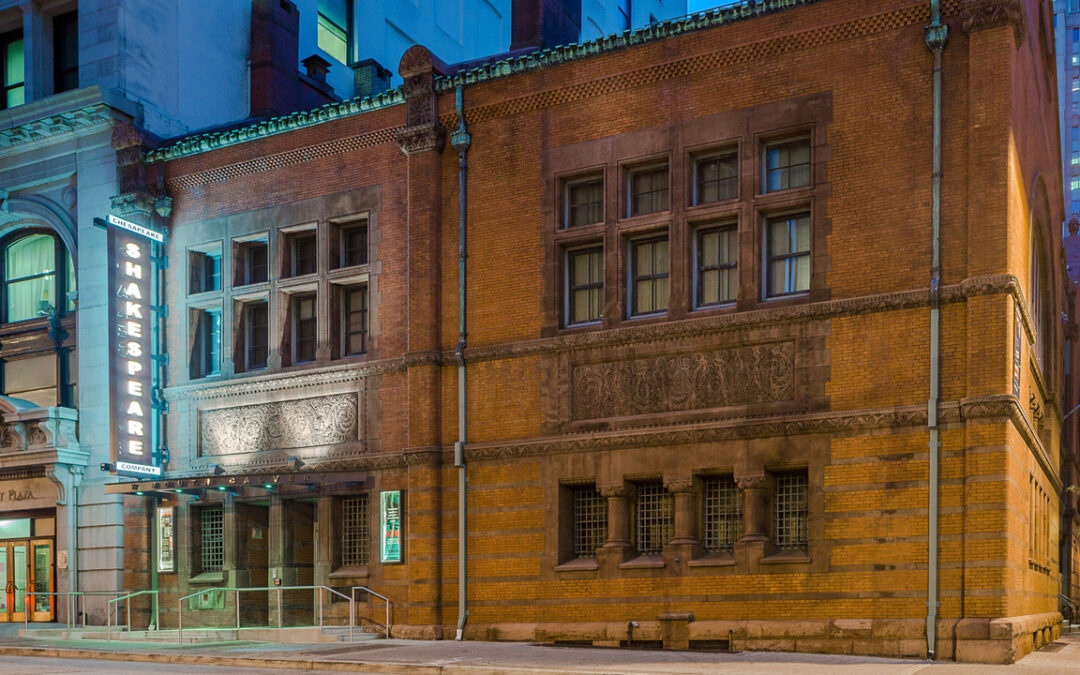
Did You Mark Your Calendar for Monday, June 12?
Last week, I wrote about the untimely death, due to Covid, of my play, The Grace of God & The Man Machine, just before its Off-Broadway debut, but I also wrote about its planned rebirth on Monday, June 12th at 7pm at the Chesapeake Shakespeare Studio Theatre in Baltimore’s financial district.
This week, I wanted to share the history of where the play came from over 50 years ago. (You have marked your calendar for Monday night, June 12th, right?)
In the summer of 1967, I was a teenage boy who travelled for the first time down south from my home in Massachusetts to the eastern shore of Maryland. Less than a month later, not far from Easton, where I was staying, the civil rights riots in Cambridge, Maryland exploded late that July, when H. Rap Brown, head of the Student Nonviolent Coordinating Committee, had been invited to lead a peaceful protest in support of the Civil Rights Act of 1964, which had not been recognized down in Cambridge.
Activist Gloria Richardson, who had invited Rap to speak, admitted later that he went beyond the assigned bounds, but also asserted that the black neighborhoods were set on fire in retaliation, and the white-operated fire trucks refused to put out the fires.
Shortly thereafter, Governor Spiro Agnew went down to Cambridge and chastised the black population for lighting their homes on fire. Agnew got national headlines and, as a result, Richard Nixon asked him to be his running mate in the upcoming presidential elections.
Within the first two days, I knew I was an outsider. The blacks in Easton would not make eye contact with a white boy whose hair was a little longer than the buzz cuts of his contemporaries in Easton. When I was invited to swim at the Easton Country Club, the lifeguard rushed over to stop me, saying if I wanted to swim there, I would have to wear a bathing cap.
I looked around. Not even the girls swimming in the pool were wearing bathing caps. I felt uneasy.
That afternoon, I tasted Chesapeake Bay blue crab for the first time at The Crab Claw restaurant overlooking the Bay. My host, a local doctor, snapped his fingers and used the N-word to call the waiter to bring more crabs and more beer as the afternoon progressed. I felt very uneasy. Similar experiences leading up to the riots that steamy July never left me.
I was forever changed by these experiences and this play came from the scars that were left more than 50 years ago.
Several months ago, after the Off-Broadway run was cancelled, I got an unexpected phone call from Steve Eich, telling me that he had read the play and he would like to talk.
Steven Eich is a remarkable figure in American theatre. Years ago, I had been fortunate to have bought a single ticket to see his Broadway production of The Grapes of Wrath, which had just received a Tony Award for Best Play.
- Steve has been Managing Director of the Steppenwolf Theatre in Chicago, 1979–1995.
- Managing Director of Geffen Playhouse in Los Angeles, 2000–2008.
- Executive Director of the Pasadena Playhouse, Pasadena, 2009–2012.
He has been an award-winning producer and director, whose credits include The Grapes of Wrath, Picasso at the Lapin Agile, Paul Simon’s The Capeman, The Trial of an American President, and Frank The Man, about Frank Sinatra.
Steve has been a great champion of the play, and wants to present it in the area where the events of the play took place. The goal of our June 12th reading is to find supporters and a venue for its future life. It’s going to be an exciting night, with a talkback afterward where you can meet Steve and the actors.
I would greatly appreciate it if you can help me spread the word. Feel free to like this post and share it, and I will see you there.
Chesapeake Shakespeare Studio Theatre
206 E. Redwood St.
Baltimore, MD 20212 (map).
Parking one block away at:
Arrow Parking, 204 E. Lombard St., Baltimore, MD (map).
Doors open at 6:15, performance begins at 7:00.

Is There Life After Death in the Theater? This Will Blow Your Mind!
Mark your calendar for Monday night, June 12!
Several months ago I was contacted by Stephen Eich. He told me that he had read my play, The Grace of God & The Man Machine, and he wanted to talk about it. This was an amazing surprise for several reasons:
First, Steven Eich is a remarkable figure in all aspects of American theatre. He has been Managing Director, Steppenwolf Theatre Chicago, 1979-1995. Managing Director, Geffen Playhouse, Los Angeles, 2000-2008, Executive Director, Pasadena
Playhouse, Pasadena, 2009-2012.
He has also been an award-winning producer and director. To name a few: The Grapes of Wrath, TONY AWARD BEST PLAY 1990, Producer; Picasso at the Lapin Agile, Producer, 1993–Present; Paul Simon’s The Capeman, Co-Producer 1996–1998; The Trial of an American President, NYC 2016, Director; Frank The Man, Music-Director/Producer.
Second, I was still mourning what I concluded was the end of life for this wonderful play after its off Broadway closing before it opened, after years of preparation and delays, because its producer went under due to Covid closures.
Over the last several months, Steve and I have gone over the play page by page, line by line, and finally we met last month in Baltimore so Steve could meet with Barbara Pinolini, the very well respected actress and casting Director from Washington DC with whom steve wanted to work to get his professional cast and to secure the theater he wanted for a staged reading in the Baltimore/Washington area. Since the play concerns the civil rights riots in the eastern shore of Maryland, in 1967 and its aftermath, Steve’s theory is because it happened in the Maryland/ D.C. Area this is where its professional rebirth should occur.
Please join us! Mark your calendar for Monday night, June 12. The performance is free. We’re looking for theater owners and artistic directors in the Baltimore/DC area to host future professional performances (and also supporters of live theater).
Chesapeake Shakespeare Studio Theatre
206 E. Redwood St.
Baltimore, MD 20212 (map).
Parking one block away at:
Arrow Parking, 204 E. Lombard St., Baltimore, MD (map).
Doors open at 6:15, performance begins at 7:00.

Out of the Shadows
Twelve or 13 years ago, in Indonesia, I saw a homeless woman resting in the shadows of a side street holding a sick child in her arms. She looked up indifferently at me as I passed through the shadows, but I saw her eyes.
They were part of a portrait of incurable poverty, not drugs or alcohol. I saw no family, no food, no resources and no hope.
It is a moment I can’t forget.
She was so beaten down. I could not tell her age. Her child was so young and quiet. Her eyes seemed vacant and without hope. It was a combination of abject poverty and also a renaissance portrait of Madonna and child.
Without thinking, I surprised myself. I reached into my pocket and handed her what I had. I have no idea how much money I gave to her. It was everything but it was a foreign currency.
I was instantly embarrassed at this unexpected burst of emotions, so I didn’t look back. I just kept walking.
I have come to conclude that no matter where we go, we live in our American culture, its vision of itself, and only caricatures of the outside world which have been baked into me and I take for granted. As Americans, we believe ourselves to be kind, but while it may be our nature to be kind, we protect ourselves from caricatures, like the poverty of strangers when it becomes too much.
When the caricatures fall apart, a different world takes its place.
She was not begging. I just found myself giving her a fistful of money and I kept walking. The money was balled up into my fist when I gave it to her.
I didn’t see her after I gave it to her.
When I turned away, I left the shadows and went into the sunlight and tried to leave it all behind. To forget about what I saw and what I had done. I was surprised to find that she had gotten up and followed me. She’d put her hand on my shoulder. Was she touching me to acknowledge the amount of money I had given her?
Yes I think so, but I think it was something more.
She pointed at my camera as if to say, “thank you and remember me.” She did not smile as I took her picture. She just looked at me with those eyes I can’t forget. I don’t need the photo but I return to it off and on.
I wonder if they are both gone now. It was a while ago. I still have that photograph. It is posted here. I want to remember her and never think of her as a caricatures of poverty.

My Heart Is Broken But I Saw Love at Work
I have always been a soft touch when it comes to animals. It has gotten me in trouble and on occasion broken my heart.
My heart is broken today but it has also been reawakened.
On the 4th of July, years and years ago, my first wife and I were driving past Towson University when I saw a baby raccoon alone near the entrance. Without hesitation, I pulled the car over and went to the little fella. He had been abandoned and was sick and starving. He was curled up and about the size of my hand. He was probably only a week old and was all alone, so of course I scooped him up, named him Thomas Jefferson, and took him home. I got instructions from a vet and fed him with a dropper.
I became so attached over that first week that I set my alarm to ensure his steady feedings, and when he died very late one night I, without a second thought, gave him artificial respiration.
My wife was justifiably horrified and insisted I get rabies shots, which I did. Thereafter the joke in the neighborhood was “if you see a rabid animal, call Bob because he can bite back.”
My animal advocacy and militant, often imprudent, protection of animals was acquired early. When I was about nine or ten, I lived next to a high school which held a “Sportsman’s Show” to raise money for the school.
Somebody had blown up a wading pool and put 100 trout in it so that the “sportsmen“ could use barbed treble hooks to snag the trout, which were then promptly cleaned and taken home to be fried.
I was horrified by the cruelty and the thought that everyone of these trout was doomed.
I went back home to my the piggy bank. I returned with money and a net to buy three trout with my savings, but I did not want them killed.
I had a plan.
I filled up the bathtub in the third floor of our house, placed the trout in it and refused to take a bath until my parents drove my fish to be released in New Hampshire. After a week and a half of no baths, my parents became persuaded.
It got worse.
Back then, if you went to the circus, you could buy chameleons which had little strings around their necks and a safety pin to clip them to your shirt. They didn’t stand a chance.
I again emptied my piggy bank to buy as many chameleons as I could, and then housed them in an old aquarium. I built a landscaped jungle with little waterfalls and a window screen top for air circulation. That summer, I traveled with a tiny little fish net, so I could catch live flies for food. I concluded that the pet store food was not good enough for them. It was less organic than my free-range flys.
It got worse.
I cared for a small alligator that was shipped to me from Florida back when that was legal, and it lived in my bathtub until I, again, convinced my parents that life would be better for it at the zoo.
It got worse.
There were birds with broken wings, which I fed all of the bay scallops that were scheduled for dinner. There were these two kittens that I acquired while hitchhiking, when somebody had fed them both LSD so they were wet with sweat from fighting hallucinations. I named them Fruehauf and Brockway, the names of trucking companies.
One summer, we rented a house on the Eastern Shore of Maryland, and my job was to care for a pregnant cat that lived in a woodpile in the barn. Of course I was there when the nine kittens were born. I spent the rest of the summer forever getting them back to their mother in the woodpile.
Over time, my parents gave in and we adopted a black stray female mixed-breed who, of course, jumped the fence and had three puppies in the garage.
When I met my second wife 11 years ago, she had a one-year-old puppy named Winston, which made me love her even more. Several months ago, Winston developed tumors and problems with his lungs and hindered legs. Last week, we were told by our vet that Winston had only two or three months left.
My wife and I were scheduled to visit her family in Florida last weekend, but the vet told us that even though Winston could last for a few more months, it would be too stressful to board him at her kennel, given the noise and his condition. I volunteered to stay home with Winston so my wife could be with her family. Unexpectedly, Winston went into decline, and we decided the only humane thing to do was to put him down as soon as possible.
I was up several times throughout Sunday night to give Winston painkillers. The doctor came at 10:00 in the morning yesterday, sedated Winston, and then administered the shot. After we waited, she gently took out her stethoscope and softly pronounced him dead.
Winston knew my wife longer than I have, and they loved each other dearly. When she decided to put him down, even though she couldn’t be there, I recognized it was a sacrifice for her. There were tears, but she said she cared more for the quality of his life than for the pain she would feel not getting to see him one last time.
It is one thing to love animals, but it is another when you see the humanity of someone who sacrifices their feelings for those they love.

Finding My New Voice and Learning to Listen to Others
I have just met a lot of feral cats in My Lady’s Manor in Monkton, Maryland, and I really like these feral cats! These are not the fighters on fire escapes I knew when I lived in inner-city apartments.
Slightly before Thanksgiving, I was invited to set up an open mic by Angelo Otterbein, the new owner of the new Manor Mill in My Lady’s Manor in Monkton, Maryland.
So what is an open mic? What is My Lady’s Manor? Where is Monkton, Maryland, and who are these feral cats?
The town of Monkton is about 45 minutes north of Baltimore and about 5 minutes south of the Pennsylvania boarder and the Mason-Dixon line. It includes a old grist mill, a miller’s house, a small hotel with a little cluster of houses next to the Gun Powder river, all nestled around a mid-1800s whistle-stop of the defunct North Central Railroad, the tracks of which are now a walking trail that runs next to the river.
In 1713, Charles Calvert, 3rd Baron of Baltimore, made a 10,000 acre gift of land to his fourth wife and christened the estate “My Lady’s Manor.” Monkton and My Lady’s Manor are known for sprawling countryside, horse farms, and old, stately homes set back from the country roads.
Angelo recently purchased the old grist mill and has revived and converted it into a historically renovated creative arts center, and the old Hotel now houses trout fishermen and nature walkers.
An open mic is an invitation to performers — poets, in this case — to stand and deliver their work in front of a live listening audience.
These cats are poets.
As a lawyer for over 30 years, my professional life offered me a chance to submit plays I wrote to the Baltimore Playwright’s Festival, but I had little or no access to local poets.
Angelo’s invitation to develop an open mic on Monday evenings unexpectedly provided the opportunity to meet the poets of the region, and it has been amazing to watch these cats in front of an open mic.
These cats are poets because they observe and take the time to write down what they observe and, by committing to this practice, they develop their own voice.
The more one writes, the more one discovers one’s own voice.
It is a solo voice that is created through omission and selection. What you leave in and what you leave out. It is your speaking voice on paper, but it is a solo voice.
All of a sudden, I have been surrounded by a wonderful collection of solo voices that are quite different from each other’s and from my own. All of a sudden, I discovered there are small but selective poetry magazines, published all around me, whether on paper or virtually. It is a world alive and well, created by this remarkable community of feral cats.
Over the last few months, I have been putting together these open mics on the first Monday of every month. The hustle and bustle of the Manor Mill — which features painters, musicians, metal sculptors, basket weavers, and textile artists, teaching and learning from each other — subsides on Monday evening, and the mill is surrendered to the open mic and poets.
The Manor Mill is a remarkable place, far from urban environments. It draws people who have often never met before. It takes incredible courage to stand up in front of strangers and speak, but it takes even more courage to stand behind your voice and deliver a vision in the form of a poem to strangers.
It is exciting to witness this courage, and walk into a world of so many new articulate voices. They speak differently. They think differently. They approach poetry in so many original ways.
Poetry is the most flexible art form available in language because of line breaks, intentional rhythms and rhymes, and the limitless themes available, because ideas and expression can be shaped in ways that are less constrained than sentences, paragraphs and chapters.
It is astounding how wild and creative these people are, and how much I have learned from them in such a short time as I find my new voice and learn to listen to others in this beautiful new welcoming environment.
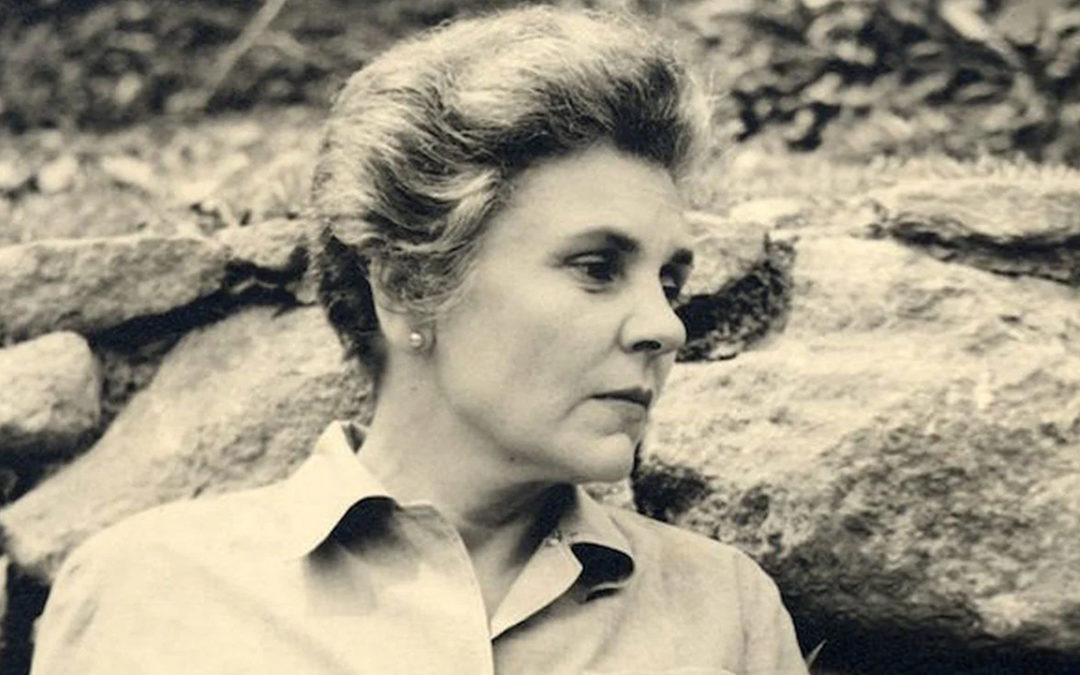
A Little Pat on the Back from a Long Time Ago
Two weeks ago, I wrote about Professor William Alfred, my tutor in college, and how my affection has grown for him. Today, I will remember the other mentor for whom I have a continued and growing affection.
Elizabeth Bishop (1911–1979) was, and still is, a very respected poet of the late 20th Century. She lived a hard life filled with loss and loneliness. She was raised and passed around by her maternal grandparents and relatives after her father died when she was a year old and her mother was placed in a mental hospital.
After she got into and graduated from Vassar, because she had no traditional family to surround her, she found comfort in travel. In late midlife, after her partner with whom she lived in Brazil for years died, she was alone again. Robert Lowell convinced Harvard to offer her a chance to teach there.
In order to get into her class in the fall of 1972, I had to submit an essay on the Wallace Stevens poem “The Emperor of Ice Cream.”
It starts:
Call the roller of big cigars,
The muscular one, and bid him whip
In kitchen cups concupiscent curds.
It is a difficult poem. It is like a description of a carnival with its cigar rollers and ice cream makers but it is about the preparations for a Cuban funeral. It is a celebration of life, not a celebration of the dead person. The end of the first stanza reads:
Let be be finale of seem.
The only emperor is the emperor of ice-cream.
From my first reading it struck me personally as being so godless and lonely. It ends with this:
If her horny feet protrude, they come
To show how cold she is, and dumb.
Let the lamp affix its beam.
The only emperor is the emperor of ice-cream.
Years later, I found in her letters her description of how she had decided to choose that poem for the competition.
She was walking alone past Brigham’s Ice Cream in Harvard Square toward Kirkland House where she would make copies of the poem she had chosen for the competition and leave it with Alice Methfessel, a staff person at Kirkland House, to hand out to the competitors.
Alice would, a few years later, become the executor of Bishop’s estate.
It was a small class limited to around 10 to 12 people. She required that each student memorize 15 lines of two 20th Century poets for each class. She was insistent. When she pointed at us in class, we had to recite our chosen poems.
She told us it was a way to bring a poem alive again. When it was recited in a different environment it will be different than reading it from a book again and again. It was like a friendship you could carry with you.
Bishop did not appreciate self centered over egoed undergraduates. I was a little older myself. From the beginning, I believed I felt her loneliness and I imagined she felt mine, but I wrote it off as my imagination.
I worked very hard in Bishop’s class and she saw the depth of my interest and commitment. I didn’t speak up much but I was always prepared for class. I never made intentional eye contact but I found that midway through the term she smiled after I had participated, and by the end of the year we would even talk briefly as we were leaving class to reenter the Square.
We talked about things rather than poems when we chatted. This was a time when confessional poetry was on the rise and people wrote very personally about their families and themselves extensively, but Bishop by nature was reserved and private. She wrote about things that were indirect, but they were very moving and profoundly personal.
No one believes me now, but I misread the instructions for the first hour of the three hour blue book final exam. The instruction required that we were to write out verbatim half of all those poems that we had memorized. I wrote out all of them.
I got an A from her and Professor Alfred was pleased because she had a reputation for being a hard grader.
I asked her to write a recommendation when I applied to law school. She agreed but I was surprised to almost sense she thought my choice was a little misguided given my obvious love of the arts. I don’t think she thought too highly of lawyers.
Years later, well after she had died, I was surprised to learn her recommendations could still be found at Kirkland House, so I asked to see her’s of me and when I read it, and proudly made a copy, I discovered something.
She wrote a short but glowing recommendation but she concluded:
“… but I feel he has great abilities, and possibly talents, he is not aware of himself… Mr. Bowie has worked very hard and has a very original cast of mind. I recommend him highly.”
What an odd and gratuitous comment for a law school recommendation, I thought. Did she know someday I would find it?
And then I smiled as if she had touched my hand.
She had cared about me. And as I stood there rereading my Xerox copy, I felt affirmed and supported to continue on this, my late life journey. She had noticed me.
Photo: Archives and Special Collections, Vassar College Library
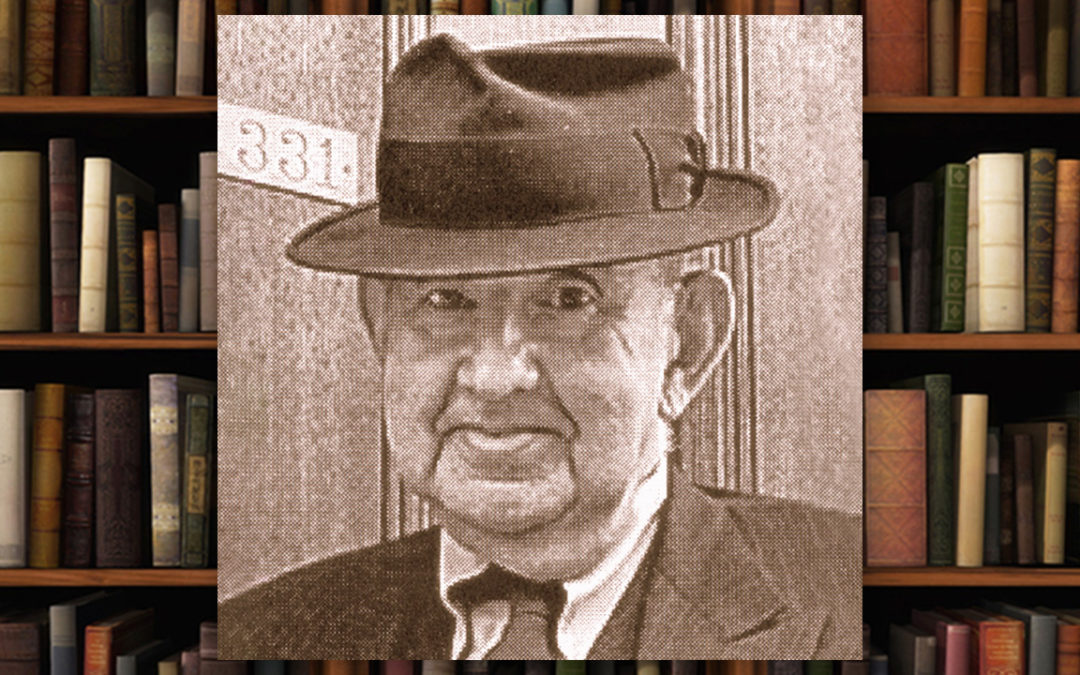
Yes, Love Grows Forever
I have been discovering that love grows over time with reflection.
In 1965, Hogans Goat, a verse drama about love and politics set in turn-of-the-century Irish Brooklyn ran for over 600 performances on Broadway. It was written by Harvard Professor William Alfred, about the world in which he had grown up. In the early ’70s it was made into a movie.
Alfred was a legend at Harvard. Everyone loved him because he was completely approachable, lived in unassuming rumpled clothes, and had a habit of giving all the change in his pocket to the street people in Harvard Square. He knew some of them by name.
As a teacher, he was beloved because he taught an unbelievably good class on Beowulf, old English, and poetry in Sanders Theater every year to well over 500 adoring undergraduates. That is a testament to his talent.
He lived alone in a little house on Athens Street just outside of Harvard Square.
I was terrified when I was admitted as a transfer student to Harvard. The summer before my first classes, I had seen Hogan’s Goat on TV. It was great. I couldn’t get enough of it.
I was terrified of the place but I was a determined starstruck groupie with a plan.
As soon as I got my student ID, I went to Nick at Brattle Florist in Harvard Square. Nick was a proprietor and a friend. I had started buying corsages from him in high school, and I loved just going into his shop to talk to him.
I had decided to buy flowers and knock on Professor Alfred’s door to tell him the truth about being a starstruck groupie who just wanted to meet him.
Nick told me that Professor Alfred came in regularly, so he knew his favorite fresh flowers.
I took my bouquet early in the afternoon to Professor Alfred’s little house. I carefully ascended the three steps and almost knocked on his door, but I lost my nerve. I made two more passes before I finally knocked on the door and waited.
When he answered, I immediately straight-armed my flowers at him as I stood on the top step and I told him I was a transfer student who knew no one but I was a big fan of his and then I turned to go. He thanked me and to my surprise he said, ”Come in. I’m making tea.”
I entered into his little living room and sat in one of the wing chairs next to a little fireplace with a small clock on the mantle.
Professor Alfred returned with the flowers in a vase and a pot of tea with cups. He settled in and started to ask me questions. I was caught completely off guard. I talked too much about myself because I was nervous. But finally, I had the sense to ask him questions about the play as I kept an eye on the little clock on the mantle. I did not want to outstay my welcome, but I didn’t want to leave.
After almost 25 minutes, I stood up and apologized for staying so long, and Professor Alford asked me, “Do you have a tutor?” I didn’t know what a tutor was so I was sure I could confidently tell him, “No, I don’t.” He promptly replied, “I can be your tutor.” I promptly accepted, even though I had no idea what that meant.
That night, I went to my first dinner at Kirkland House, my new dorm along the river. I had been assigned a room and I told the three or four boys who randomly settled their trays at my table that I was a transfer student and I wondered if they knew what a tutor was. I was told it was like a graduate student who was sort of an academic big brother. I told them I had randomly met Professor Alfred that afternoon and he had offered to be my tutor.
My dinner companions were shocked. “You’re kidding! Alfred is your tutor?” The next day, I rented a room on Putnam Avenue and never stopped studying for fear I would flunk out.
I was convinced that once my fellow classmates at Harvard discovered how stupid I was, it would be the rage of the campus and I would be pointed out continuously, so I never moved in to Kirkland house.
For two years, once a week at 8:30 a.m., I met Professor Alfred and we studied poetry together. At the end of each meeting he would ask, “What do you want to learn next week?” There were no limits. We talked about Greek metrics and rhymes in English and non-English in translation, and poetry all the way back through Beowulf.
In the spring, we would set up two chairs in his little backyard and he would feed the squirrels by hand as we talked. Quite unconsciously, he became my poetic surrogate father. In short, I fell in love with the man, the devout Catholic, the humanitarian and the poet.
He would at times quote from memory poems he liked. One time, he quoted: “There is in God (some say) a deep, but dazzling darkness…”
It was by Henry Vaughan (1621–1695), but I didn’t take in the rest of it. His recitation had stopped me in my tracks because of the way he delivered it. He measured out the rhythm in the air and there was an intensity in the way he looked at me that made me lose my concentration.
Although Professor Alfred was in late middle age, he loved life, and I loved that he rose to almost any occasion.
One morning as I entered, Robert Lowell, the famous poet was leaving. Professor Alfred explained, “Cal wanted to go see the artistes last night.” They had gone down to the “combat zone“ in Boston because Lowell, the old Brahman, very much out of character, wanted to see the strippers at work.
One morning as I entered, Faye Dunaway, the star of Hogan’s Goat, and Peter Wolf, the lead singer for The J Geils Band, were on the couch in the living room. The two had obviously been on a very creative overnighter, and Alfred had sat up with them because they were friends.
I graduated with honors in 1973, and when I would visit Boston or Cambridge I’d visit Nick to pick up flowers and knock on Alfred’s door. If he was in we would always talk.
It was always professor/student but it was always friend to friend. The phone would ring occasionally, and he would smile and say, “They will call back I am certain,” and we would talk some more. The friendship ripened and grew stronger over time.
In June of 1999, I traveled up to Cambridge and ambled into the Brattle Street Florist, found Nick and requested my customary bouquet of flowers. Nick looked up from the flowers he was arranging for a customer. He dried his hands as he stopped his work to talk to me. He faced me, paused, and said “He died last month. He’s up in the Harvard lot in Mt. Auburn Cemetery.”
I read last month in The Crimson that the Brattle Florist would be closing.
Nick had died but I stopped there when I was in Cambridge and got flowers. I took them to Mt Auburn and found Alfred’s grave below the tower, up the hill.
The gravestone read:
“There is in God (some say)
A deep, but dazzling darkness.
Oh, for that night where in him
I might live in visible and dim.”
I had missed those last two lines when he’d read them, which defined him perfectly.
There was no one around, so I spent a lot of time with him, and when I got up, my knees were wet from the ground. I think I loved him more then than I ever had before.

Logic in the Dark
You do know logic has its limits…
If you spend a lot of time outside the reach of sunlight, it can create two different parallel psychological worlds.
Back when I was in college, the world was roughly broken into those who believed that “you are what you eat” and those who believed “you are where you smoke and drink.”
It was sort of like the difference between light and dark.
It was the health food people of the Age of Aquarius vs. the hedonists. It was the difference between “Hello,” which has one meaning, and “Hi,” which has two.
Back in college, I was a bartender in a now defunct basement bar in Harvard Square that had no windows.
Upstairs was a high-end restaurant. Its clientele would briefly wait for their table while the rest of our patrons were occasional walk-ins from the street or the regulars who had self-imposed assigned seating every night around the horseshoe shaped bar at which I held court.
There was a juke box and maybe ten small tables with un-emptied ashtrays and an electric candle with a little red shade. I noticed the atmosphere was not conducive to romance when I would announce last call.
Because I am a caring person, I learned that I could control the future behavior of the patrons from behind the bar.
If I turned the jukebox up, dimmed the lights and mixed strong drinks, I could make a wild party, but if I wanted calm, I could make weak drinks, turn up the lights and turn down the music.
Also, because I was a caring person, I got to thinking there could be variations on this theme: Consider strong drinks, dim lights and soft music when I announce last call. Much better. More conducive to romance, or at least intimacy.
Now consider each table as an event onto itself. Dim lights, soft music, and half price to try a glass of our new champagne.
Hey! We making babies now!
I got to thinking I had magic powers, that I was sort of an invisible Cupid.
Wait! No! That’s what too much darkness will do to you.
At that very moment, I realized that I was no longer a caring person. I had become a puppeteer!
I didn’t want to think of people that way. So I had to find alternative hypotheses, but I was still working in a basement bar with no windows.
I wanted to test my new theory that, generally, the amount of alcohol consumed had no effect on the size of the tip.
I decided to work New Year’s Eve, which at that time went on until 2:30 in the morning. Drunk or sober, the tips were pretty much the same, although after 1:30 they were supplemented by all forms of contraband, which was not what I needed.
What good is control if you don’t get what you want? There is no barter, or like-kind exchange, when you are holding contraband and you really need toothpaste.
Woe is me. Logic had failed me.
But then, it’s hard to use logic to justify your existence as a bartender in a windowless basement bar.
Here’s the proof:
You can’t really stop people who are 52 years old and ask if, by chance, they knew whether their parents happened to be drinking in a now-defunct basement bar in Harvard Square with no windows nine months before they were born.
Alas, logic has its limits.

Dancing School
For my friends and me, life was abruptly changed on the after school athletic fields in the spring of our eighth-grade year, when all of our parents signed us up for dancing school.
My friends and I were all told it was a non-negotiable part of our education.
We were divided on the subject, until one of us confessed that in church he had recently prayed to God that he be allowed to live long enough to experience sex.
We found this to be reasonably compelling and it was sufficient to open the door for the rest of us to give in and accept the inevitable.
We had been given no previous training for this.
My preparation for dancing school was to wash my hair and then soap and rinse myself several times until I was squeaky clean, then do pull ups on the shower curtain rail in front of the mirror until I began to perspire and I couldn’t do anymore, in order to improve my physique.
Dancing school started at 4:30 pm. It was held in the middle school cafeteria at our all-boys day school. After lunch, all the tables were moved to one side, the chairs were placed side by side along opposite walls, and a piano was rolled into place.
Our instructors, Mr. and Mrs. Knot, were a husband and wife team who appeared to be in their 30s. The husband played the piano, smoked constantly, and showed no enthusiasm. We all liked him from the start.
His wife however was stern, and dressed in black high heels and a low cut black dress that featured her remarkable figure. From the start we had a problem. We couldn’t look at her, but we couldn’t take our eyes off of her.
Mrs. Knot would single out the tallest boy to dance with her. She would teach him the steps while the rest of us watched. We were then lined up with the girls from tallest to shortest and we could repeat their example.
Mrs. Knot soon showed the boys how they could politely change partners on the dance floor by tapping a boy on the shoulder.
One of the shortest boys in the class, who had big glasses, tapped Mrs. Knot’s dance partner on the shoulder in what appeared to be a shameless attempt to gain favor with his teacher. She appeared to approve, until they began to dance and she realized that her high heels and his height had placed his nose in her cleavage and his glasses were focused squarely on her breasts.
The girls were at least a head taller than most of the boys and, after a week or two, Mrs Knot announced a “ladies’ choice.”
The ladies’ choice turned out to be an extremely athletic event. The girls were choosing boyfriends but we didn’t know that.
They would slowly stand and walk toward their target, but if there was competition, they would pick up the pace and start running. There were times when two competitors, in an effort to get their boy and also to stop, would pile up and slide under the chairs where we were sitting.
The situation grew more mature. Later that spring, I had a girlfriend for almost a month, but I didn’t know that until she dumped me.
This was not unusual. Attachments were formed and broken in many cases before a boy even knew he had been going steady.
I was in my second relationship and didn’t know it until I was informed that it was over. I was told by a girl who I didn’t know that I had just broken up with a girl and that I was now available.
As the classes drifted into spring, the more adventurous girls would talk their parents into parties in the basement of their home.
They were all pretty much the same. They featured a record player and rotating chaperones to make sure nobody danced close during “Moon River.” The rule was stiff-arm dancing with visible open space between the dancers.
As the spring finished up, the chaperones and other parents migrated upstairs and gathered in the living room for cocktails. Occasionally, they would do sneak attacks or peek down into the basement to make sure the lights had not been dimmed or turned off and people were not dancing close to “Moon River.” They always claimed they were just making sure “the snacks had not run out.”
By summer, we had made friends with girls and even fallen in love and knew it.
Something beautiful had happened that spring. Nobody really knew what it was other than a transition, but it was beautifully woven together as a right of passage for everyone, including the parents.
The following spring, as upper-school ninth-graders, we would spill out of school at 4:30 pm and look in the windows of the cafeteria as Mrs. Knott waltzed her way through another dumbfounded eighth-grade class.
We had friends that were girls now, and we even knew enough to know we had girlfriends. I had even learned to do pull ups before the shower.

Forever Young
It is funny how a stranger’s aging face will never reveal the face of its youth. However…
A little less than a month ago, I went to a beautiful warm sun-drenched October wedding on the edge of a calm harbor in New Bedford, Massachusetts.
On the lawn, an hour or so before the wedding began, a small group of old men slowly gathered and greeted each other. Some had not seen each other for almost 50 years.
We had become friends long ago during high school, as a diaspora loosely formed by outcasts of various different New England schools. We had all been transferred or expelled from someplace, in several cases more than once, because of undiagnosed learning issues and/or an intransigent attitude, and thus had been prematurely released upon the world to get our education on our own terms with far less supervision.
No harm done. Most of us survived and had lived interesting lives of our own making and all of us had stories of our adventures along the way as we talked out on the lawn during that evening, or later on the phone. Nonetheless, we had bonded quite profoundly from our common experiences back then, and these stories and adventures defined who we believed we were.
As we told the stories about each other, the mask of old age dropped from our faces.
There was one friend who was not present as we rekindled old friendships and plowed through our memories.
The bride’s father had included in the program an “In Memorium” section that included those who had been lost along the way. One of our lost friends, let’s call him Brad, had been the bride’s godfather before his death.
Brad had been lost at sea years ago.
I didn’t know him as well as some of the others but I remembered, early one spring day, going down to the boatyard he used on Cape Cod, and watching him paint the waterline high on his boat to cover the approximately 2 1/2 tons of contraband that he expected to be bringing back from Jamaica a little later that year.
It was his custom to avoid returning by the Windward passage where he might be apprehended and instead sail far out into the Atlantic, then head north for an extended run, and then hug the shore as he traveled south back along the coastline in order to appear to be a tourist sailing down to the Cape from Maine.
He was a brilliant unflappable sailor.
One of his friends remembered how he had sailed back with him from Morocco, along with contraband, when Brad’s 37-foot deep keeled boat suffered debilitating electrical equipment failure. Brad then navigated without the aid of instruments, solely with a sextant, and expertly traveled down to the edge of the equator. As the sun came up one morning along the expansive horizon, he had watched “a thousand little squalls, each with rainbows beneath them in the sunrise” as Brad had navigated cross the Atlantic and hit his target, Antigua, perfectly.
Once freed from formal education, Brad was largely self schooled, but was well read in history, loved the Sherlock Holmes stories, and Shakespeare.
He was a wonderful and engaging companion. However, his freedom had not made him a saint. He indulged his ”weaknesses,” as he put it, sometimes at the expense of others as he enjoyed his world.
Early on, one of this group, who had become a lawyer, had been called upon to bail him out of a Jamaican jail where he had been held for some time.
He joked that he had been instructed to bring a little extra money to ensure his extradition, a fresh dry-cleaned white shirt folded on a cardboard back the way he liked it, and pressed pants, because within a half hour of his release they would both be drinking Remi Martin at a Jamaican bar.
We all knew Brad would not always be so lucky. He spent almost three years in Fox Hill prison in Nassau, and a year and a half imprisoned in Morocco, but it was the independence in him that we chose to remember.
No one knows for sure how he died.
He always had enemies in the trade, but he had also made good money doing commercial fishing off the New England coast. He disappeared offshore in the Atlantic during a squall off Cape Cod.
Nothing was ever found of him or his boat.
All the sailors in the conversation agreed that to leave no flotsam or jetsam behind was highly unusual.
The conversation turned from a general discussion of the squall to jokes about how improbable it was that the squall was really his cause of death.
Someone chimed in about how Brad had one time taken his boat to ride out a hurricane off Florida because being tied up at a dock would be more risky. However, when he had returned afterward, there were footprints on the ceiling of the cabin because his boat had rolled completely over during the storm.
Another friend suggested it was more likely that Brad had been hit by a freighter on the commercial trade routes that never saw him. Others who knew him well believed it was a settlement of old scores by others, and he had died with an anchor around his neck and his boat had been dragged back, repainted, and was now repurposed somewhere on the inland waterways, probably down south.
“No,” one of them chimed in. “He’s alive in Hawaii free of his enemies and debts.” One friend laughed as he peeled off toward the bar. “If he was alive, he would be here. He is the bride’s godfather. Remember how he had come to her high school graduation in a white suit? He took this stuff seriously!”
It is funny how old bonds of real friendship never break and how, when you see an old friend’s face, the young face can be reconstructed from a familiar smile or a remembered look. It is both a resurrection from the past and rebirth into the future.
Brad is still forever young for us even now, 50 years later, as we are for each other.
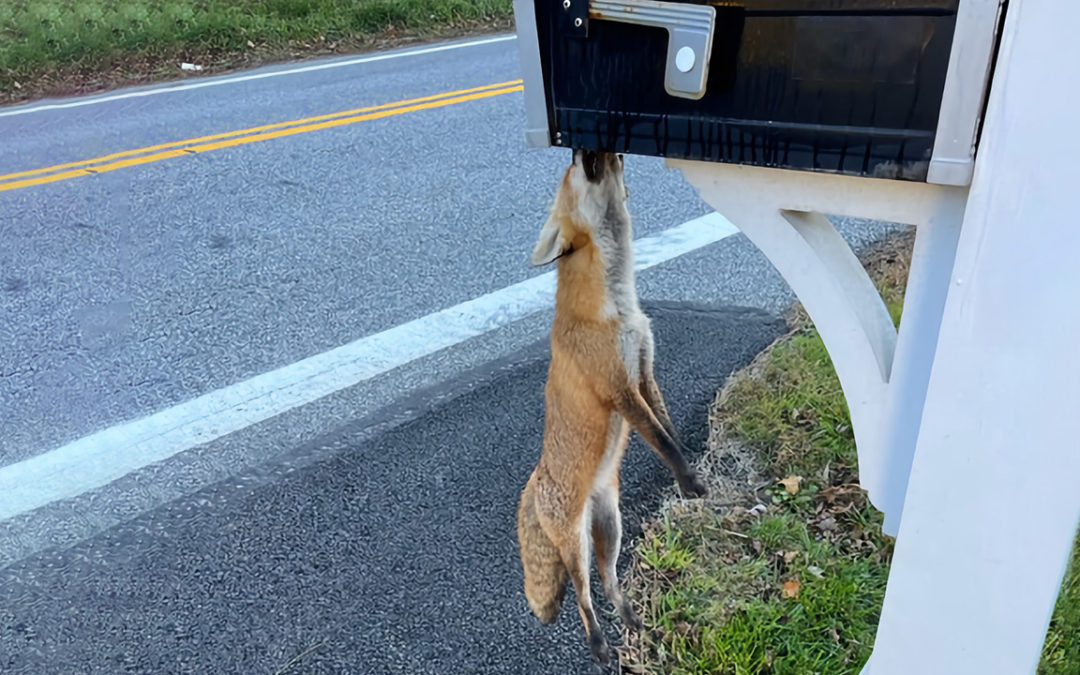
Fear Separates Heroes from Cowards
Fear separates heroes from cowards.
I live in beautiful northern Baltimore County west of Harford County, north of Baltimore city and south of the Pennsylvania line. It is rich with beautiful horse farms, deer and fox hunting, verdant farmland and wonderful people.
I am a moderate Democrat. Where I live is by and large Trump country but I love my neighbors. For the most part, we don’t let politics get in the way of respect and friendship.
Last week, two friends and I held a small fundraiser for a Democratic Congressional candidate who is running to unseat an incumbent Trump Republican who met in the White House to plan the January 6th attack on the Capital.
As the midterms have been approaching, for some reason, I have been remembering old litigation from when I had been hired by a prominent personal injury lawyer to try the cases he thought he would lose.
I wanted to learn how to try cases before I started my own firm in 1990, so this was perfect and I took the job.
In the 1980s, the Harford County Courthouse was being renovated. An alternative courthouse annex was set up to handle cases while the renovations proceeded.
This temporary courthouse had a makeshift heating air conditioning and ventilation system hung from the ceiling, and the sounds from other courtrooms and the neighboring bathroom could be heard through this system during the proceedings.
I had been assigned a case which my employer had said was “difficult.” Our client, a young-for-his-age teenage boy, was so shy he could barely answer my questions about his bicycle accident during our first meeting.
The accident involved a car and the boy had his leg broken and his bicycle destroyed. There were real questions about who was at fault. His parents filed on his behalf, and without his knowledge, a lawsuit for extensive damages.
The boy had no friends and was so shy that his only freedom came when he left school in the afternoon to ride his bike for hours along country roads while his classmates played seasonal team sports.
His parents were clearly disappointed by their son. He would never be the football captain or the class president.
I met him with his parents for trial preparation about a week before trial. After we went over the case that had been filed, the boy seemed reticent and I asked his parents to leave the room. I asked him to go over the facts once more with me one on one. He looked down and repeated what his parents had told me before they had left the room. He was uncomfortable, but what was striking about him was that when his eyes met mine and he told me something, he was honest, definitive, and straightforward.
I feared this was a boy who was being forced to tell a story instead of the truth.
He clearly was not looking forward to testifying under oath.
On the day of trial, I asked his parents to bring him to the courthouse early so that he could sit in the witness chair alone without anybody there, to familiarize himself with the space and settle his nerves.
When he sat alone in that witness chair he was terrified. I wanted his parents to see him sitting there alone staring into space and shaking before anybody else came into that courtroom.
I then asked him to go sit with his parents so we could talk about the possibility that the case could be settled before trial. The parents refused and reiterated that they wanted several hundred thousand dollars in damages.
Several minutes later, the opposing counsel came in and started to set up for the trial. Shortly thereafter, the people who would be chosen as jurors filtered in.
The boy become more and more frightened. About 10 minutes before the judge would appear and we would pick a jury, the boy slowly started to cry by himself. I noticed that the parents were trying to cover this up, and they asked to remove him briefly from the courtroom to go to the bathroom so he could compose himself.
The defense counsel had offered nothing to settle the case, because he believed that the boy was too shy to make a good impression before the jury. He ambled over and offered a nominal amount to resolve the case, which is not unusual before a case begins.
All of a sudden, through the heating ducts from the bathroom, the sound of gagging and then a toilet repeatedly flushing could be heard.
The defense counsel asked where was the boy. I said I was sure he would be back before the judge entered and we started picking a jury.
Moments later, the boy’s father came into the courtroom and signaled for me to join him in the hall. He told me the boy had refused to testify but his father instructed me that he was going to make sure he did.
I asked the father to consider a settlement of the case, because the boy clearly was uncomfortable with testifying to something that apparently he did not believe was true. The father said he would consult his wife. I insisted that whatever decision was made had to be given to me by my client, their son.
He hurried off to the bathroom and returned with his wife who agreed that the boy would be ready to testify.
I told them to get their son. They told me to come into the men’s room because he wouldn’t leave his stall.
The boy looked at me when he came out of the stall, tears streaming down his face. He looked down and wouldn’t talk. I looked at him and said, do you want me to resolve this case? And he nodded. His parents objected. I push them aside. What do you think is a fair settlement, I asked. He waved his hands as if to say nothing. I told him that the other side had made a nominal offer to merely resolve the case and I asked him whether I could negotiate further and resolve it rather than dismiss it. His parents resisted, but he nodded yes.
When I reentered the courtroom the sound of the toilet flushing was coming through the ductwork and there were muffled heated voices also coming through.
The defense counsel asked again where was my client. The judge was about to enter. I joked that if he only had offered a little more money, maybe it could have been resolved. He added to his offer. I told him I was authorized to settle the case for double that amount and we did.
It wasn’t much. It was a compromise. Enough to pay some hospital bills and get a replacement bicycle for the boy.
It only took about 10 or 15 minutes to put the settlement on the record and send the jury home. I left the courthouse and looked for the boy and his parents. Their car was gone and I never saw them again.
I wish I could have said goodbye to that boy who was too shy to confront the world, but had the courage to stand his ground and refuse to lie!
Fear separates the heroes from the cowards.
Two days ago, after our little political fundraiser, my friend and his wife, who had held the reception at their home, woke up to find a dead fox hung from their mailbox.
This is not who we are in northern Baltimore County.
This not who we are as Americans.
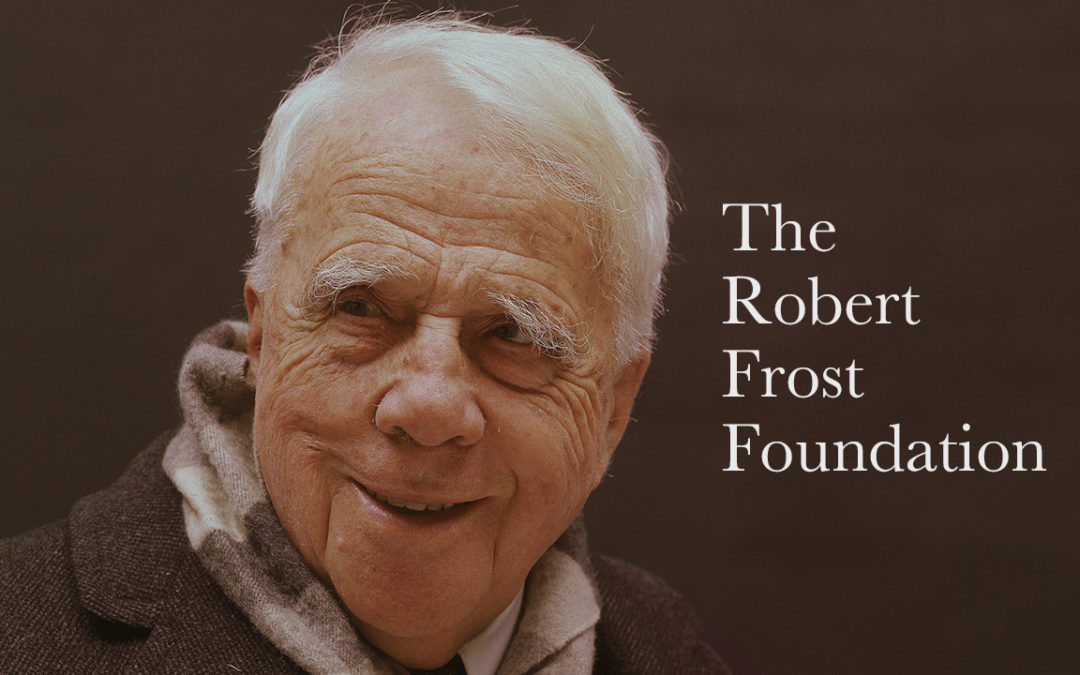
Do Unto Others Especially When Others Have Done Right by You
Last Tuesday, October 11th, at 7 pm, the Robert Frost Poetry Foundation hosted a Zoom reading by the winner and ten runners-up of the annual 2022 Robert Frost Poetry Contest. The winners came from as near as New York and as far away as New Zealand.
I was extremely fortunate to have my sonnet, “Summer Thunderstorms,” chosen as the first runner up. This is a real honor.
These readings lit me up!
Every single one of the poems was exquisite but what was personally wonderful for me was Helena Minton, who I have not seen since high school, was on that call. This high school, the Cambridge School of Weston, was a remarkable place because it respected the arts as a part of life rather than a collateral activity.
Helena and I were both on the board of the literary magazine of the Cambridge School of Weston. Also on that board was Susanna Kaysen, who wrote “Girl Interrupted,” which became a movie starring Winona Ryder. Helena has also become a well respected writer. The Boston Globe recently gave her rave reviews for her new and selected poems entitled Paris Paint Box, which I have read and highly recommend. I cannot name every member of that high school board, but they each were accomplished writers even in high school.
As I remember, we met once a week in the basement of one of the school buildings, and our faculty advisor was Mr. Pastorini, who took this stuff seriously.
The quality of the work that we received for publication was consistently very high and we learned from each other as we shared our perspectives about the submissions by our schoolmates.
I raise this because, again and again, I realize that the seeds and roots of my efforts now, fifty years later, to create a second career as a playwright and poet were planted and nurtured at that school and in that basement.
A month ago, the little library near where I live offered me a chance to teach a class in poetry. I am going to teach it in the same way as I was taught. We will learn from each other in a nurturing environment.
I have also been invited to start an open mic at a newly created independently owned cultural center in Monkton, The Manor Mill. I will try to support it much the way Mr. Pastorini ran that school magazine. We will learn from each other in a nurturing environment.
Finally, I had lunch yesterday with Allen Reese, who is a well respected poet, professor and previous publisher, to learn how to put together a small press to support the class and the open mic readings.
The real heroes, however, are Angelo Otterbein, the entrepreneur who created the Manor Mill only a year ago. It is growing into its future as a home for all the arts — from the visual arts and crafts, music in all forms, and writing. Similarly, Cynthia Weber at the Hereford Library opened a room and planted chairs in a circle for my class, with several recommended poetry books on a table nearby.
What little I can do I owe to these new and old friends who have nurtured me and given me the unbridled courage to be a little different and to create.
Do unto others, especially when others have done right by you.
———
Summer Thunderstorms
As with the generations long since dead
The fire and brimstone of the status quo
Wakes him up from the safety of his bed
And lightning frames him in the window
And photographs him in its afterglow.
Tonight he feels his present and its past
As the summer storm also comes and goes.
Conclusions are foolish in a world so vast.
For at the edges of his world and heart
Far past the farthest boundary of his grasp
Where ideas cause worlds to come apart
He lives in this place that will not last.
He loves his life more than he can explain
And leaves the window open to hear the rain.
———
I hope you will consider joining all those who taught me that the arts are at the heart of life. You can find An Accidental Diary on Amazon and, after you have enjoyed it, please spread the word. Give it away. The arts are not just a collateral activity.

I Have Twice Lived in a Divided Country
I have twice lived in a divided country. The first time it still had American kindness and we could still talk.
The Vietnam War had divided my country in 1968. I was hitchhiking because I wanted to abandon all of that, and be together with American strangers and their kindness, which was how we defined ourselves. I wanted to believe.
I got rides from both sides.
A senior Marine officer in a convertible had taken me into the PX at Parris Island to buy tax-free cigarettes. The marching soldiers on both sides of his car stopped to salute his license tags when he brought me in and then returned me to the highway.
It was a kindness he offered to me.
I had changed my mind late that summer. I had made it to California, but decided to head back to be with my father in Easton, Maryland for his birthday at the end of August.
The Democratic Convention in Chicago would be happening in about week. Violence was predicted.
Because it had been impulsive and I had started late, I tried to hop an eastbound freight train in Cheyenne, but I got caught and was mercifully dumped back on Interstate 80 East by a gruff but kind state cop who told me to disappear in 30 minutes because he was coming back.
Within 15 minutes, I got a ride from a boy dressed as a rhinestone cowboy in a white convertible with the top down and Iowa tags. He was heading east to Fort Dodge. He was going home to see his father. This was good. It would be a 660 mile ride so I would make up lost time and we were going to get to know each other.
He told me he had spent two years in Vietnam and was a war hero. He told me he had spent a year in Wyoming herding cattle. He told me that the night before, he had been in Las Vegas with girls in the front seat and girls in the backseat and had won big at the slots and had decided he wanted to see his father back in Fort Dodge. We drove nonstop all afternoon and all night laughing, smoking and talking. From the start, we liked each other.
We were Americans and therefore brothers by accident.
When he pulled over for gas, he bought me cigarettes, a can opener, and a can of peaches. It was a kindness he had offered to me.
As we rolled down the highway, I forked out the peaches and drank the sweet syrup. He told me about his life in Vietnam and the year he spent out on the western ranch, and how much he loved his father.
As we turned off the interstate and entered Fort Dodge dawn was breaking and, as the sun was coming up, he parked the car in front of a broken house in need of paint and shutter repair. The front door was unlocked and two of the windows in the front of the house were broken.
When we entered the house, there were slats missing on the staircase going up to the second floor. Beer cans littered the floor and overflowed out of a trashcan next to the refrigerator.
Before the boy went to wake up his father, he opened the refrigerator and handed me a beer. Then he took two more and excitedly bounded up the staircase.
There was loud coughing from upstairs and after a while the boy and his father came down. The old man was weak and had phlegm in his lungs. He didn’t look like he was long for the world.
I wanted to leave them alone so father and son could be together. I asked if I could take a bath upstairs. They said no and pointed at a wash tub, tilted against the stove. I was told there was no hot water but I could heat water on the stove and mix it with tap water and bathe while we drank breakfast.
So I did.
I was happy in my warm and soapy water thinking about how soon I would have a “dishpan body” as I sat in a washtub in the dawn drinking beer.
It was clear the boy and his father loved just being together. They joked, laughed, and chided each other as if they were long-lost friends.
After about a half an hour into my bath and after more breakfast beer, there was a knock on the door and two police officers entered the unlocked door without permission.
I obviously was in a considerably compromised position, but the officers paid no attention to me.
Chaos broke out. The car I had been riding in apparently had been purchased about a week ago with stolen money. Both the father and the son were confessing to the police officers to save the other. The officers arrested the boy, handcuffed him, and took him away in a squad car. The father burst into tears and told me the story.
The boy had just been released after seven years in prison for smoking marijuana. He had not served in Vietnam or been a cowboy, but he had won big in Las Vegas with money his father had given him. The boy had come home to give his father money to pay off the used car his father had bought for him.
After his father had given the car to his son, he had ordered him to leave and go west to start a new life. He instructed the boy to not come back but his son could not resist sharing his good fortune. They had only each other in this world.
The old man continued to drink beer, cough and smoke cigarettes at the kitchen table. The more he told his son’s story the more he drank and the more he cried. Somewhere around noon, he took off for the police station on foot in an effort to do what he could for his son.
I had not slept since before Cheyenne so, when he left, I put my duffel bag under my head and I curled up on the floor and slept for a while. I woke up late in the afternoon. The father had still not returned, so I threw the knapsack over my shoulder and headed out to try to catch a ride.
There was a United States post office hub in Fort Dodge, so I hung around there until I got a postal driver to let me ride shotgun to the mail district in South Chicago. As I was let out, I got cat calls from some of the postal workers who were waiting to punch the clock to begin their shift. Mayor Richard Daley was fighting the demonstrators outside of the convention.
From Chicago, I got short rides through Ohio, Pennsylvania, and then across the Bay Bridge on to Maryland’s Eastern Shore. My last ride was from a tow truck driver, who had never left the Eastern shore, and never been on a boat.
During those last short rides, I kept thinking about how different we all were, but how we could talk and share our lives, and how each person had enriched mine.
That is America to me. That is what will make us great again.
I got to Easton on my father’s birthday, and the prodigal son was welcomed home yet again.
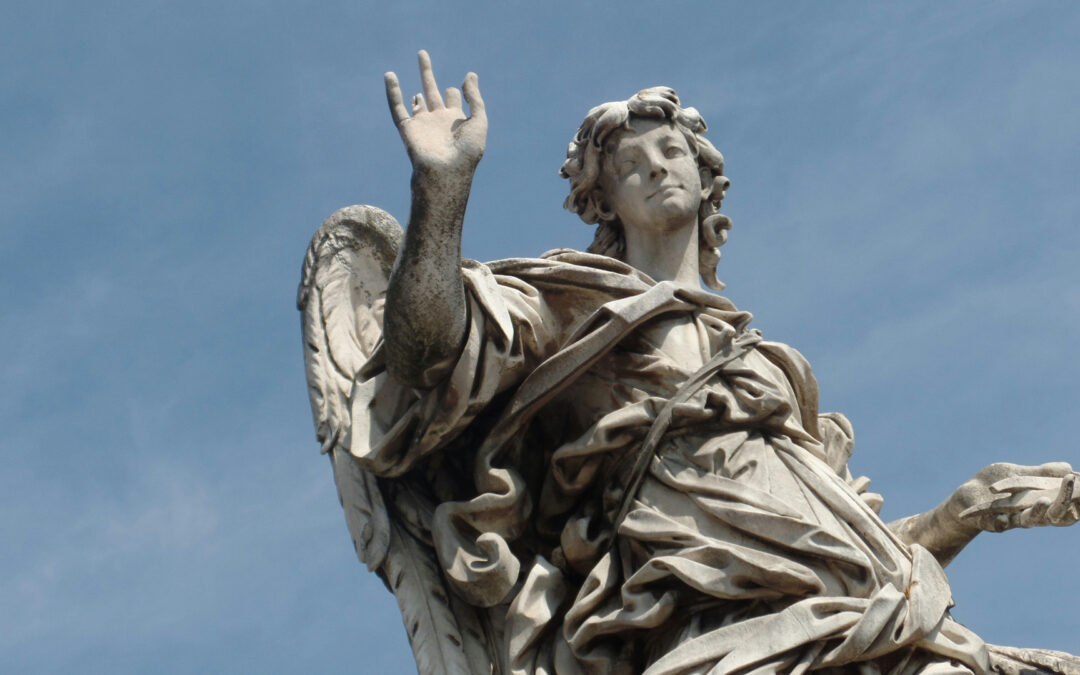
Our Culture as the Hands of a Sculptor
The culture we live in is like the hands of a sculptor.
Because of undiscovered learning issues, it took me six years to get through high school. I had to repeat 4th grade, 9th grade and 11th grade and, of course earlier, I attend summer schools.
Because I moved from school to school a bit, I came to learn that the classrooms taught us very little compared to the culture of the schools where we were taught.
All of these schools had very different cultures.
After my first 9th grade at a day school, I was shipped to a boarding school in western Connecticut for my second attempt. I was a 16-year-old 9th grader.
I was embarrassed about my age and kept it secret because many of the other 9th graders were almost 2 years younger. I was bigger than many of the 9th grade students and I inadvertently made the varsity soccer team.
The only other 9th grader who made the varsity soccer team was young for the 9th grade and was small, a little overweight, and had been appointed the manager of the team. His job was to keep track of the soccer balls and pack up uniforms for away games.
Let’s call him PG. PG and I were both outcasts for different reasons. I think he was the only Jewish student at this boarding school and I was the only 16-year-old ninth grader. PG was very funny with a self mocking sense of humor once he let you know him and he was as nice as he could be.
From the start, all the seniors and juniors on the varsity soccer team picked on PG. At the end of every practice they would kick the balls in different directions to see if PG would miss dinner. Because we were both 9th graders, I would join him to collect the soccer balls.
A certain amount of this practice of cruelty was leveled at him because he was Jewish and small so his persecution became the basis of a tribal unity not only for the soccer team but the school.
This was part of the culture of the school.
The faculty member who organized dances with girls’ schools chose by grade-level, seniors first. I got to go in place of shorter sophomores because I was taller. We lined up and were matched with our date from tallest to shortest. The faculty member told me to tell my date that I was in 11th grade.
It was all about appearances.
The cruelty ran both ways. The boys nicknamed the faculty member “grave digger” because he had been a mortician in the army, saw himself as a southern aristocrat, and had a huge Adam’s apple.
The most important event each day happened after the first two classes, when recess allowed people to go to their mailboxes and get mail from girls. The girls were also imprisoned in boarding schools and they would perfume their letters. The more perfumed letters you got the more your status grew.
I got perfumed letters, but PG, because he was small and younger, was not invited to those dances and did not get perfume letters.
PG’s mistreatment was relentless, and included rolled wet towels to make “rat tails,” which would be snapped in the locker rooms and at one point caused a bleeding cut on PG’s leg.
One awkward boy got an erection in the shower and was dutifully punished with a rat tail.
PG suffered his indignities with great courage and, even though we were in different dorms, we at least knew each other and knew we liked each other.
The administration obviously knew what was happening but they did nothing other than let the tribalism run wild.
They were letting boys become men.
I saw one boy get expelled from school. Right after recess the headmaster knocked on the door as the class was settling down.
When the headmaster entered he addressed one fellow in the back row. He said he wanted to talk to the boy. The boy got up, took two steps toward the door, and the headmaster looked at him and said, “bring your books.”
After PG had made no team sport during the winter’s sports schedule, and also had made no team in the spring — each time treated badly as the manager for one team or another — he quietly gave up.
Just before recess that spring, after the spring teams had been chosen, the fire alarm went off and no one was allowed to leave their classrooms to go down to the mailboxes.
The sounds of an ambulance and a firetruck could be heard coming down the little road that ran beneath the windows of our third floor classroom.
The teacher pulled down the shades.
After about a half an hour, we heard the sirens leave and we were released from class. Everyone went down to the mailboxes except me. I waited until the classroom was empty and then I pulled the shade up and peaked out the window.
Two maintenance men were hosing down a place three floors below the window, and the water was emptying down the road into a sewer. The water was blood red.
At lunch, the headmaster asked for a moment of silence because an accident had happened. He announced that PG had fallen off the fifth floor roof of the classroom building. After that, there were no updates about PG and his injuries.
Several times thereafter, I went to the nurse’s office and asked where I could send a card to PG. I was politely discouraged. Finally, after more visits, the nurse told me In strict confidence a secret. I was told that PG had jumped head first off the roof and had died on impact.
The students who succeeded at that school were like all good kids, but the culture was defined by tribal safety at the expense of others. Its viciousness rewarded its members with confidences that weren’t kept and conspiracies that were suspect. It was about “me” not “us.”
PG was real and the school killed him, but he took the souls of the living with him when he died.
Midway thought the next year, the headmaster knocked on the door after recess as we were settling in to class and encouraged me to bring my books.
He took me to my dorm room and I loaded my belongings into two suitcases. By the time it was lunchtime, I was at the Springfield bus station headed home.
I think of PG and believe we are better than this.
The culture we live in is like the hands of a sculptor.
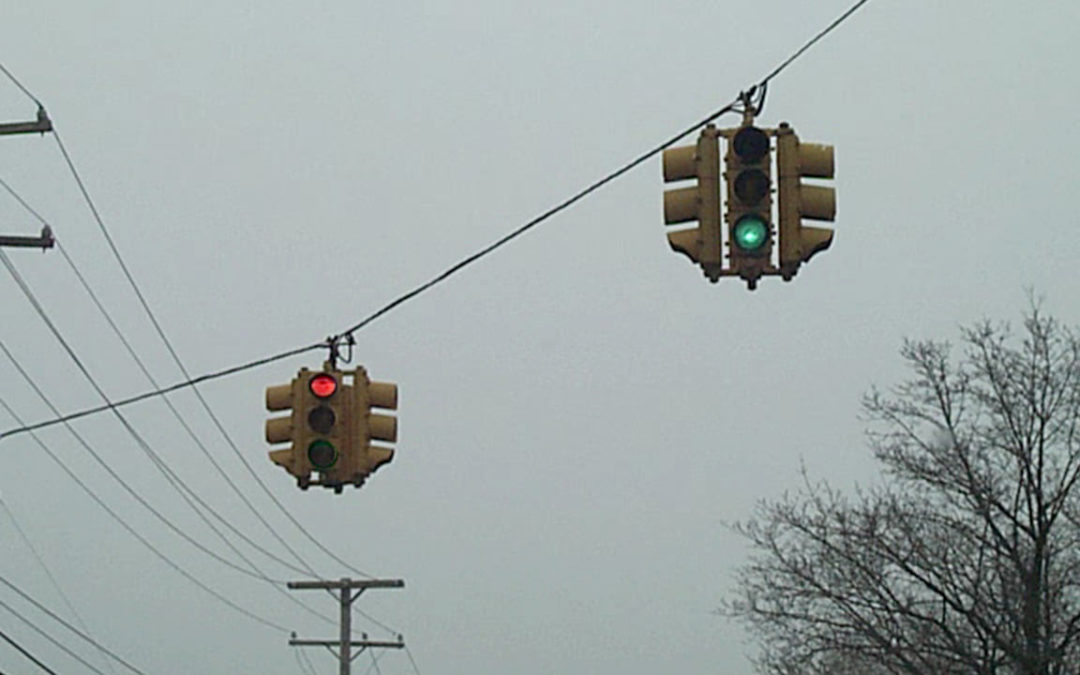
Red Light Green Light
Back before I started my business law firm in 1990, I was hired by a respected personal injury law firm to try their bad cases as well as the “impossible cases.”
So, what is an “impossible case”?
Here’s an example: I tried a case where two motorcyclists in Western Maryland collided head on coming around a turn and, along with lots of broken bones, both drivers got amnesia so neither could testify who crossed the center line and, of course, there were no witnesses.
Midway through the trial, which came down to the inferences of skid marks and comparisons of the two front wheels, the case was settled when the insurance companies came to their senses and decided to pay the litigants instead of the lawyers.
No one will ever know who crossed the center line and so no one will ever know what the truth really was.
It was one of those “impossible cases.”
Over forty years ago, there was one impossible case I tried that still troubles me.
It was just a simple red light/green light case. The high school girl who I represented was listening to the radio while driving late one December afternoon down Eastern Avenue where it crosses Gusryan Street in eastern Baltimore.
As the girl approached the traffic light at the intersection, she claimed her light was green, so she drove through the intersection and hit a car. The driver of that car and his three passengers claimed his light had changed to green as he approached the intersection, so he kept up his speed climbing the little hill and got hit under the stop light at Eastern Avenue.
Both drivers and the passengers in the man’s car all claimed the other car had gone through the red light and caused the accident. It was a fine example of a classic “he said/she said” impossible case.
I wanted to win the case and there wasn’t much to work with, so I decided to use cross examination to question the credibility of the driver and his passengers’ testimony and use it against them.
I asked the judge to sequester each of the witnesses in the car so that they could not talk to each other before or after each went on the witness stand to answer my cross examination.
I asked everybody in the man’s car the same two questions: “Did you yourself see the light change to green before your car went through the intersection?”
And then I asked the passengers, “Isn’t it true that the driver is your boss?”
Both the driver and all the passengers answered yes to both questions.
I set the trap and it snapped shut.
At the close of the case, I asked the jury what is the likelihood that all four people in that car were watching exactly at the moment that the light changed from red to green? And then, “Wasn’t it true that the reason that all the passengers in the car were allwatching when the light turned green was because the driver was their boss?”
It was a magic trick.
It is the trick I play on myself neatly everyday but rarely do I get caught. It pits my belief that it is not okay to imply the truth and twist a situation just a little bit against my need to win.
I won the case, but the logic doesn’t hold.
After the jury came back, the boss came over to me. He had just lost the case but there was no anger. He held out his hand and congratulated me. “You did a wonderful job for your client but I do know in a way that you can’t. I know the light was green. I saw it.”
I saw it in his eyes.
It was no longer one of those impossible cases. I had made a mistake.
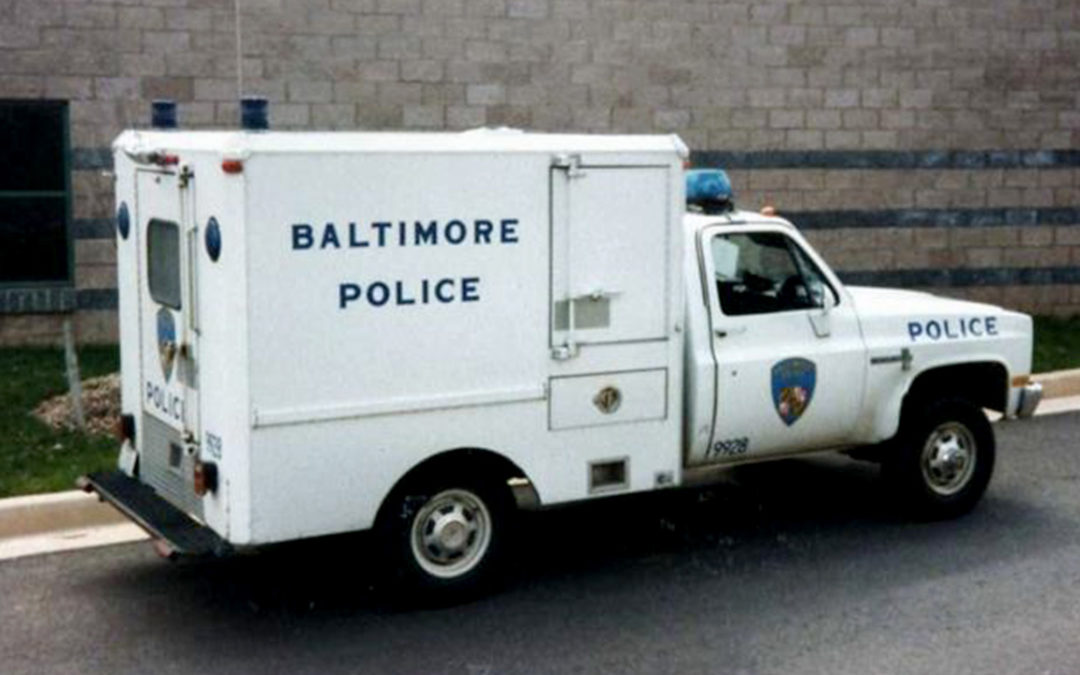
A Trying Trial
Sometimes it’s okay for a lawyer to fall in love with a client. I did.
Way before I started my own business law firm in 1990, I was fortunate to be hired as an associate by GW, who was head of a well-respected personal injury law firm. He didn’t like trying cases he was going to lose, so my job was to litigate all of his bad cases.
After I had brought several smaller bad cases to trial, GW came into my office one Friday afternoon and asked me, “Do you want to try your first federal case?”
Of course I did. (But if I had said no, it probably wouldn’t have mattered.)
“Good,” he replied. “You won’t have to wait. The trial starts on Monday.” He put a thin file on my desk.
The facts of the case were that our client, a schoolteacher who had taught in inner city schools for over 35 years, had sent a disruptive 6th grader to the principal’s office. The student had been told by the principal to call his mother to come pick him up.
The boy told his mother the teacher had hit him, and the mother, instead of picking him up, immediately called the police. A young female police officer who had just gotten out of the academy went to the school and arrested her, handcuffed the teacher in front of her students, and took her away in a paddy wagon to lockup.
Police procedures required only that a citation be issued and handed to the teacher. There was no reason for the arrest or for locking up the teacher.
The next day, it had made the papers. GW would be her lawyer. Big news. GW got big verdicts.
The first thing I always asked myself when I would get one of these cases was, what’s the problem with it? And the second thing was, how bad is it?
When I went through the file that Friday afternoon, for a case that would be tried in federal court on Monday, I discovered several problems.
I had to prove that the police officer had “used excessive force” during the interaction, and it was evident that GW had lost interest in the case some time ago because he could not prove excessive force. It was, of course, dramatically inappropriate, but there had been no beating or bruising.
The thin file also indicated that there had been no preparation for trial.
But, much worse, they had lost the client. There was no current address or phone number.
This was going to be a long weekend.
The first thing I had to do was find the client and let her know that the case was set for Monday.
I found out that she had retired the year after the incident, and left no forwarding address. I got lucky. I went through the Baltimore phonebook and found her early Friday evening.
She was, perhaps, in her mid 60s. She lived alone in a small house in West Baltimore. She had never married or had children and had become somewhat of a recluse. Teaching had been her life. She immediately took control and put me at ease as only a seasoned teacher can do. She was more than forgiving of the late notice of the trial and, as we worked together through Saturday and Sunday, we got to know each other. I bought and picked up the lunches and dinners.
We laughed together. We became an unlikely team.
I found out that she had been declared not guilty of the criminal charge that had been filed against her for hitting the student, and that she had been so overwhelmed by the arrest that she had retired shortly after she had been acquitted.
She had her employment file and it revealed an exemplary career. I explained how it was a difficult case, but I assured her we would put up one hell of a fight. I wanted a jury that would decide with its heart because the law was against us.
After a while, I asked her if she had been to the doctor or a psychiatrist so that I could establish damages. She said she had not. I gently asked her, was there was any evidence of what she had suffered?
She sat quietly for a moment, then reached up to touch the top of her head, grabbed a handful of hair and pulled a wig off. She was completely bald. She looked down, ashamed.
The next morning, the federal judge looked at me and asked, “how are you going to prove excessive force with these facts?” He asked if the case could be settled. The lawyers for the police department answered with a resounding “no.”
After we chose the jury, the judge chose a NASA engineer to be the foreman. The judge was making sure that an extremely precise engineer would be the person to lead the jury in the discussion of whether this case had established excessive force.
I put our client on to prove her case, and we went through her years of education, the awards she had gotten, and her commitment to middle school kids. We established that she had been found not guilty of hitting the child.
She was very sympathetic. She evoked compassion. I moved to the final question and asked, “and what impact, if anything, has this event had on your life?”
As we had agreed and practiced, she then took an inordinate dramatic pause, looked into the eyes of the jury, and then removed her wig. It was a command performance. There was an audible gasp from a shocked and empathetic jury.
The cross-examination by the officer’s attorney focused on the lack of “excessive force” during the arrest.
As the jury was dismissed to deliberate the morning of the second day, I felt I still had the momentum but, within an hour, a note was delivered to the judge from the foreman asking for a definition of “excessive force.”
The NASA engineer was being precise. He was making sure the jury decided with their heads not their heart. He was perfect for the job.
As we waited for a verdict, that same question was again and again brought to the judge for his instruction to the jury. In each case, excessive force was defined by the court in terms of “aggressive” and “abusive” force.
Finally, in the late afternoon of the second day, the jury came back with a verdict that exonerated the police officer and ruled against the teacher.
I was shocked to find myself almost in tears as the teacher hugged me. She patted me on the back and thanked me because I had tried so hard for her. After the jury had been dismissed and the lawyers were packing up, the judge called us into his chambers as he was preparing to go home and told me, “even if you had won, I was going to take the case away from the jury, because there was not sufficient evidence of excessive force.“
I sent Christmas cards to the teacher for several years until one January the card was returned with hand writing across the address, which merely said “Deceased.” I looked in the newspapers but could not find an obituary.
She taught me a lot about kindness even in the face of defeat, and the difference between how we make decisions with our hearts and with our heads.
I still think of her.

Taking Flight
Way before I started my own law firm in 1990, I was hired to be an associate by a group of lawyers who didn’t like each other.
My job, at that time in my career, was to litigate all the bad cases in the office, particularly if the client was a friend of one of the partners.
One of the first partners I met was also an amateur pilot who had taken out a loan with a friend to buy an airplane. Innocently, in an effort to fit in, I remarked that I hoped I could someday learn to fly. The partner immediately sensed blood in the water. He suggested I buy a one-third interest in the new airplane, and also co-sign the loan with him.
I had convinced myself to get licensed to fly in an airplane that I didn’t want but I had just bought.
It got worse.
I soon learned that the lawyer’s friend and co-owner of my new airplane had so many creditors that he had no bank accounts, and all business was done from a big roll of bills which bulged in his pocket.
He could make anybody laugh. He could make everyone like him. He was one of those down-to-earth-aggressively-friendly-I’ve-got-nothing-to-hide kind of guys, so he immediately was candid about the large polyps he said were way up his nose. If anyone questioned him on this subject he would start snorting loudly until they laughed and then he’d spit into a trash can.
He could also deflect any questions about the wad of cash in his pocket. He would answer that, although he loved his wife dearly, she was a big spender and he was “protecting her from herself.” I never met his wife.
It got worse.
He volunteered to be my copilot as I was racking up inflight hours in my effort to learn to fly. He didn’t like airplane radios so we never relied on them much. We would practice landing touchdowns and take offs at little airports in Pennsylvania.
He would tell me to watch the wind direction of the windsock, and then tell me to look around to see if any other planes were coming in. and then down we would go and touch the runway for a touchdown and take off again.
The plane was kept at a little airport called the Baltimore Sky Park, which had a rolling, uneven runway that ended in an apple orchard to the west and the north and southbound Route 95 to the east — which meant we had to take off or land over several lanes of traffic with the car tops just below us. There were also high tension wires to avoid.
It was like a video game.
The lawyer’s friend, who I will call JF, would get into the plane and instruct me to get up to 3,000 feet, get past the military no fly zone, cross the Chesapeake Bay and then, as he would point, follow Route 50 to Ocean City. I would have to buy him a crab cake and a beer when we got there and then we would get up to 3,000 feet and follow Route 50 home.
It got worse.
I had been set up but didn’t know it.
JF had some serious legal problems and I was given his case by his friend, the partner, to litigate.
In short, JF owned a small modular buildings business, which created folding structures that could be stacked and shipped to job sites.
In this case, he had a container full of modular homes that had been stacked and shipped from his plant outside the city to the Port of Baltimore, then lifted onto the top deck of a freighter that traveled down the Chesapeake Bay, across the ocean though a massive storm that had delayed the ship headed to Jeddah, Saudi Arabia, where — because the shipping company would not pay bribes — his mobile buildings were unloaded at the port using single lift cranes.
As you might imagine on this journey, his buildings got racked and broken. The insurance companies for all the other carriers had settled their cases, but this one little transit company insurance company had refused to pay anything.
This had, of course, become a matter of honor for JF. He would make them pay or die trying.
To win this case against the little transit company’s insurance company I had to prove that all the damage occurred during the 15-mile transit from his plant to the ship, and that there had been no damage done during the remaining storm-battered transatlantic jouney almost a third of the way around the planet, or at the unloading in Jeddah.
When I opened the file, I noticed a letter in the correspondence folder to the lawyer who had given me the case from one of the litigating partners, which had written across it in bold print, “I’m not going to trial with this piece of shit. Get some unwitting associate to do it for you!”
I was that “unwitting” associate?
The judge was a former mayor of Baltimore who had been given a judgeship after a humiliating loss and was forced to retire from politics. He was a nice guy who had been assigned a dark courtroom down a long hall.
JF was my first and only witness because he claimed nobody else knew anything about the case so I didn’t have to interview anybody else.
On the stand, I asked him questions and he told a story of why he knew just from the damage that the injuries had to have happened exclusively during transit from his facilities to the port.
During my direct examination, he gave quick responses and clear answers that supported his case. However, during cross examination, before he answered any questions, he would ask for the question to be repeated, snort several times, and then spit into a paper cup, looking around to see who was laughing.
Midway through the cross examination, after several objections about the snorting and spitting made by opposing counsel, JF shared with the judge that he had huge polyps up his nose that affected his hearing and he apologized profusely.
After the first day of trial, I drove him home. (He had told me that his wife had his car for the entire week of the trial.) I asked him about why he could answer my questions with no problem but with cross examination he had considerable difficulty with his polyps.
He replied, “gives me time to think.”
We won the case and got a modest verdict for damages — but it was a victory and JF was exceedingly happy, probably because he knew he also would not be getting a bill from his friend.
I never completed my training as a pilot but in late January several years later I ran into JF. It was very cold and windy but he seemed happy to see me so we stopped and talked. I jokingly asked him about his surprisingly convincing trial testimony and how he had protected himself so well during the cross-examination.
This time he ducked my direct question but, after a snort and a spit, he told me a story, as if to gently educate me instead.
He told me that about a week ago he had flown the plane to Chicago and met a girl in a bar who said she would do anything to wake up at a warm and sunny place, so he flew her all night to Florida and when they got there they both immediately went to the beach at dawn and went to sleep.
JF said that his wife had asked him how could have gotten so sunburned in Chicago in the dead of winter. He looked at me and answered, “Deny! Deny! Deny!”
As we parted company, it occurred to me that maybe the guy didn’t have a wife.
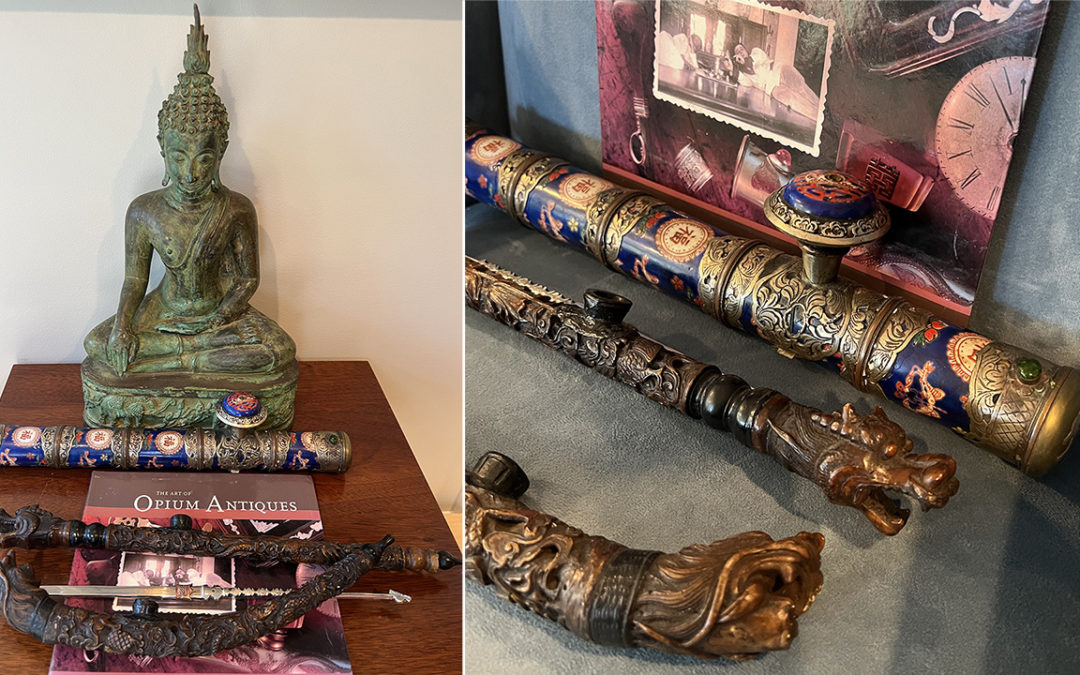
My Effort to Avoid Thinking About American Politics
In my effort to avoid thinking about American politics yesterday, I found myself daydreaming about years ago when I was sitting in a bar in the night markets of Bangkok, Thailand, drinking a scotch…
Obviously, I was working hard to avoid thinking about American politics.
… The night markets sold everything and then disappeared at dawn. For some reason, as I sat in the bar drinking, I was thinking about people who collect things: art, old stamps, fine wine, or antique books.
Several days before, I had been up north in Chiang Mai and had decided I wanted to buy an antique Buddha statue. I was informed that it was illegal to take an antique Buddha statue out of Thailand, and the penalty could include jail time. I had no real interest in art, old stamps, fine wine or antique books, and antique Buddha statues could only be viewed by scholars or museum staff.
However, there was a black market, and I wanted adventure.
I asked around and was told there was a back room in a small store in the outskirts of the city. I booked a cab.
When I got to the store, I poked around and looked at the various objects that were for sale and eventually introduced myself to the owner. I innocently asked if he had any Buddhas I could see. He tried to interest me in a miniature figure that was in a partially open box with little hinges that he assured me was from Angkor Wat. I demurred with a polite shrug, implying I thought it might not be genuine and repeated my inquiries about a Buddha.
After some questioning, he took me to the back of the store and threw aside a hanging sheet that acted as a door into a room with perhaps six or seven tables, each of which had several Buddhas placed on them.
I could see that several were extremely old. I had read up on the different historic influences and style changes over time and pointed out that these statues were from different places and times throughout Asia. But I was bluffing and flattering the proprietor. Out of my depth and about to be caught, I claimed to not understand because of language barriers. I kept the conversation going by asking questions.
I innocently asked what the cost would be to purchase one in particular. The proprietor at first brushed off the question, but I feigned innocence and kept asking until he pulled out his calculator and we were translating bots into dollars. Very quickly, I realize that the cost was way beyond what I could afford and smuggle out of the country.
Over the next week, I went into northern Laos and was crossing a bridge over a large river gorge. As I reached the other side, there was a street vendor with a little cart that was full screwdrivers, clips of all kinds, and knickknacks — as well as two beautifully carved opium pipes, which I think were fashioned out of water buffalo horns. I negotiated politely and purchased them for a few dollars.
Because I bought both pipes, I considered myself instantly a collector. I was exceedingly proud of myself.
When I returned to Chiang Mai on my way home, I asked the cab driver if he knew where I could buy a really beautiful antique opium pipe, and he dropped me off at an antique store that was mainly filled with beautiful furniture but there was a display case with several elegant opium pipes.
I asked if they had been used and he nodded affirmatively, because the soldiers in Chiang Kai-shek’s army were sometimes paid with opium and these pipes had been used by the senior officers. He held them up so I could smell the sweet smell of the old smoke.
They were all beautiful. I bought one for around $30 and was also provided with all the operational equipment that went with it, except of course for the opium. He also had a book printed in English about the antique opium pipes, which I bought to round out my new collection.
During this trip, along with the opium pipes, I had collected gifts for others such as fabrics, articles of clothing, and the mandatory t-shirts, costume jewelry, and trinkets, which I packed in my big suitcase for storage on my way home.
After a long flight, with a brief stop in Frankfurt, all was good until they passed out customs forms and announced that we were close to our destination, Washington DC.
A horrible lighting bolt of realization shot through my body.
I was bringing into the country three used opium pipes, as well as the paraphernalia, and they were not in my carry-on bag, so I couldn’t abandon the pipes and paraphernalia in the bathroom before we landed.
I was going to have to go through customs with them.
I was terrified.
As my terror ripened, I thought about the headlines in the newspaper about my airport arrest and the announcement of my disbarment.
My stupidity rolled over me like a dump truck, then it got worse when I started thinking about my prison sentence.
The plane started to descend. I had to think fast.
After thinking fast, I came up with, “I actually bought them for the Baltimore Museum of Art.”
Maybe not.
Maybe just confess and go into full tears?
Maybe not!
I started feverishly filling out the customs form and reporting each and every fabric, each and every article of clothing, and the mandatory t-shirts, costume jewelry and trinkets to try to fill up space until I recorded at the very end, “ceremonial pipes.”
Maybe not!!!
I thought maybe they would let me go home because Bowie is a Scottish name and so I must be bringing in bagpipes…
I had abandoned reality.
The reentry line at customs was long as we each opened our bags and the officers routed through them. What else could they be looking for on a plane coming in from Asia other than drugs?
When my turn came, as the officer started going through my list and asked me in detail about each of the fabrics, articles of clothing, and the mandatory t-shirts, costume jewelry, and trinkets on my custom form, he instructed me to unzip my bag.
I saw his handcuffs and thought about being led awayay. Then the officer stopped and said, “welcome back,“ and indicated that I should rezip my bag and move on.
I started a slow motion run as I pulled my bag behind me and blasted through the automatic doors into the airport. I saw the car that was to pick me up. I saw the driver waiting for me with my name on a sign as I moved in slow motion toward him.
Then I had an entirely inappropriate emotion. I was so cool! I was a drug king pin evading capture but then… then, as I made it through the automatic doors into the airport, to my right I saw a police officer walking a sniffing dog!
I definitely was not a drug kingpin!
I didn’t look twice. I just focused on my name on the card, which the driver was holding. I threw my arms out toward him as if he were a close relative and personal friend that I had not seen in a long time, or like some photo shoot for a Hallmark card, even though the object of my affection was an old geezer holding my name on the card who had no idea who I was.
I dropped my bags by the car, spread my arms wide open and somehow avoided the deep need to kiss him.
The police officer and the dog moved on down the airport as the driver put my bag in the trunk, opened the door for me… then I thought thank god it was just three old opium pipes and paraphernalia and then … Dammit –nothing works to clear my mind! Collectors of contraband?
The police officer and the dog moved on as the driver put my bag in the trunk and opened the door for me…
What had got me thinking about collecting contraband? Antique Buddhas… Opium pipes… Top-secret classified national defense documents…
Damnit. It’s too early for that double scotch.

About Dizlxia
Forget politics! This is about Dizlxia… sorry. Dicklessia… Dilexsia… sorry.
BBC Science Focus Magazine, dated June 24th, 2022, headlined that researchers at Cambridge University have determined:
“Dyslexia isn’t a disorder, it’s part of our species’ cultural evolution…”
This is wonderful news.
Apparently, I was part of a “cultural evolution“ when I was flunking first-year Spanish three years in a row.
It wasn’t because dyslexia was my “disorder.” It must have been my “unconscious commitment to a cultural evolution.”
That explains everything!
Maybe I have been creating my own language as part of this cultural evolution? Maybe English is my foreign language?
All these years, I haven’t been some old dyslexic with a nasty addiction to spellcheck. Hell, no! I see myself differently now.
I’m sort of an old professor working and creating in my own language based on bad grammar, worse punctuation, and horrible misspellings! A pop artist working in a collage of words!
This is great! I have already contacted my old middle school and my four high schools and I have asked for a reevaluation.
I have asked that my grades be changed from F- to A+ because of my deep and abiding early commitment to being part of a cultural evolution, as is evident from the fact that I repeated 4th, 9th, and 11th grade and attended endless summer schools.
Because it took me six years to get through high school, after rereading the article I requested masters’ degrees from my past schools.
In hindsight, I jumped the gun. I should have asked for Ph.D.s.
What if this “cultural evolution” is the new age of honesty and fairness and we are all part of it?
I will confess in all honesty it came easily for me to create my own language (and at times even my own alphabet) but once I finally accepted that nobody could understand anything I wrote, it seemed fair because I couldn’t understand anything they wrote either.
Anyway, because of this — my new linguistic and cultural understanding — I decided to give my new language a name. After all, it is not French or Spanish or Russian, no.
I decided to call it “BOB.”
Despite what you think I did not name my language after myself. I named it BOB as a public service.
It is a language which is specifically designed for dyslexics because you can spell it frontwards or backwards and it is still B-O-B.
Let me give you an example:
B-O-B. You see?… There I spelled it backwards.
The article went on to state:
“People with dyslexia have brains that are specialised to explore the unknown, and this strength has contributed to the success and survival of our species.”
Wow! I am feeling blessed that I have “contributed to the success and survival of our species,” because I am pretty certain that I have spent my whole life exploring the unknown.
When it takes six years to get out of high school it is not unreasonable to be exploring and expecting a long professional life in footwear.
Please read the BBC Science Focus magazine article to see if it applies to you.
It’s not long. It’s just about four, maybe five pages.
It only took me two months. If it takes you less don’t worry about it.
It’s a little different being part of cultural evolution but it can be fun and it will teach you tons of empathy for other people.
Maybe that’s the “cultural evolution” they are talking about. Even though we are all different we are all in this together.

How Do You Cover Up the Perfect Conspiracy?
There has been a lot going on in American politics since the search of Mar-a-largo to recover some confidential documents. A lot of finger pointing.
Almost half of the country believes it is a “witch hunt” and the FBI is a cover up for the deep state.
I decided to quickly solve this problem and offer a solution.
Trust me — here is the inside story!
The deep state is real and I have the proof.
(The real deep state is never capitalized. That’s how you know it’s the real deep state.)
The deep state is real, as is evident from the demise of the stick shift.
Ask yourself: In a world driven by Classified and Top Secret Information, isn’t it amazing that nobody has objected to the disappearance of the stick shift?
It is that big of a cover-up!
Hasn’t the entire insurance industry for years been obsessed with “uninsured motorists”?
Why wouldn’t they be? Think of the years of lost profits.
So, why no reporting on the fact that the insurance industry has silently teamed up with personal injury lawyers in order to support driverless cars?
It was hidden but obvious. Follow the money!
It benefits the insurance companies and the lawyers!
If only cars — and no longer the drivers — can be sued, lawyers need only to sue Tesla and other car manufacturers making driverless cars and then, even better, the manufacturers will have to buy the liability insurance — not the drivers — so uninsured motorists are no longer a problem.
You know how they did this?
They eliminated the stick shift.
It gets better. Imagine if they got a favorable interpretation of the Constitution?
If you are an “originalist” member of the Supreme Court there is no evidence that there were any cars with stick shifts around at the ratification of the Construction. In fact, there is ample evidence that there were only horses.
This Supreme Court could put the icing on the cake, because an originalist Court could rest its case on the fact that horses back then never were operational by stick shift.
Thank God for the wisdom of the founders.
The thing is, the deep state can get you off track intentionally. They often hide things in plain view. Like our former president admits everything to avoid a cover up.
For example, remember that signer of the Declaration of Independence with a huge signature? John Hancock? Why the big signature? What was his line of work? Could it have been he just started an insurance company that would solve the age old problem of uninsured motorists and ambulance chasers?
See?
I told you. The deep state is all about getting you off track.
Think about it. The deep state is too smart to be really concerned about insurance companies or personal injury lawyers!
You guessed it?
It is all about Elon Musk controlling Twitter and a past president who can’t buy his voice back and didn’t buy Twitter stock early?
… Go a little deeper. It is about communication in fighting.
Why did Musk go into space on a space ship that did not have a stick shift?
It was a secret message.
This is actually very subtle, even for the deep state. Is it in fact a message from the anti-deep state, which is the deep state acting as the anti-deep state being the deep state that is really the actual hidden deep state?
So maybe Elon was sending an undetectable message that ”all is ready. Release our guy from the past!”
What do you think that raid at Mar-a-Largo was all about?
To attack the FBI and American law enforcement in a “new law-and-order campaign” of the deep state?
Nobody messes with the deep state! They got their man — and the first steps to a new law-and-order campaign for a new nation!
Okay, I promised to offer a solution. Here it is:
If you don’t want the deep state to hack into your passwords, install a stick shift on your computer — because no one but you will remember how to use it — and then put your GPS in a driverless Uber Eats® and send a cheeseburger to Mar-a-Largo with extra ketchup and napkins.
No one will understand, so you will be safe.
If there is any problem, the lawyers will have to sue the car.
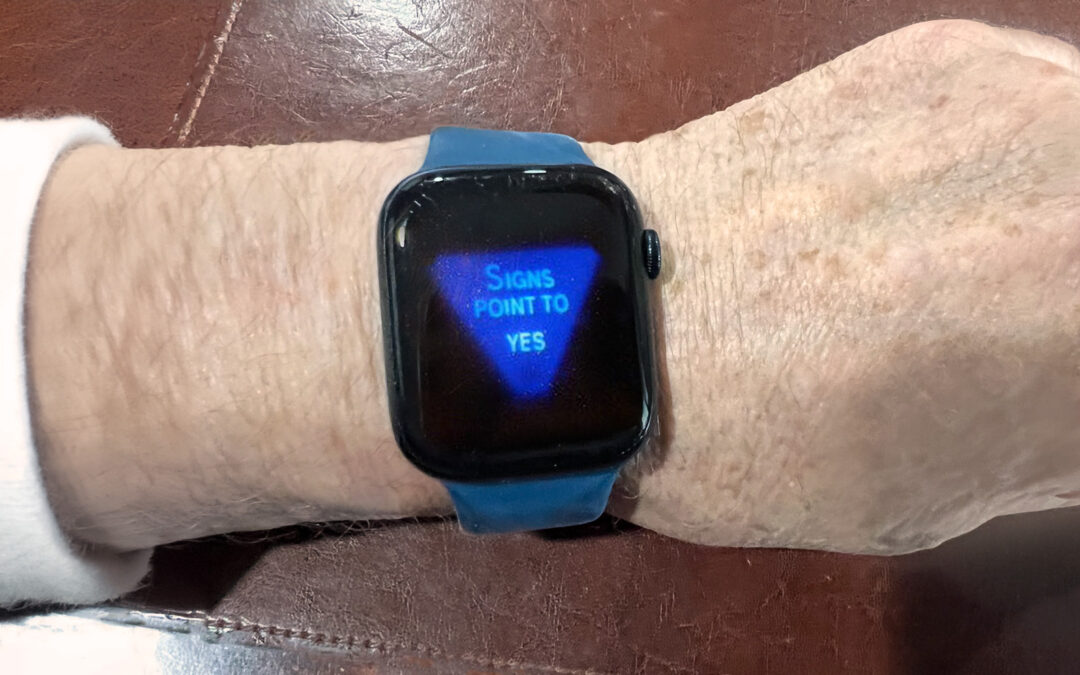
Does Anybody Really Know What Time It Is?
Hey, just call me “Easy-goin’-Bob.”
I can get along with anybody… but it may be I’m in a toxic relationship with my Apple Watch.
I could be wrong. It may be we are just getting to know each other, but it keeps asking me: “Have you fallen?”
I respond “no,” and “no” again about the ambulance.
I can’t figure out whether my Apple Watch is making fun of me or it just wants to be my friend and make me laugh.
So what do you think?
“Have you fallen?”
Is that funny?
I am not sure if my watch and I share a compatible sense of humor.
I like irony but I’m afraid my watch may be an absurdist — which, if you think about it, would make it hard to know.
Excuse me. My watch just sent me: “Stand up and move around to meet your goals.”
My heartbeat is down and my blood oxygen is up. Yesterday, I found myself doing late night laps around the dinning room table to meet my goals.
I don’t remember making any goals to stand up or walk around the dinning room table at midnight.
So I asked Siri (the voice of my watch) if I set any goals pertaining to standing up or doing laps around the dining room table.
Siri said it did not understand my question and perhaps I should “consult a fitness program.”
It is a “yes or no” question. How could it not understand?
Unexpectedly, I had this thought that my watch was not my friend and could be conspiring against me.
I tried to calm myself.
There is no evidence that electronic devices think alike and can conspire against me!
… Is there?
But what are the odds that my watch and all electronic devises have the exact same time, and always to the second?
They all do, don’t they?
… And we absolutely trust them?
I asked Siri.
Siri ducked my question with a question: “Are you an absurdist?”
… and then I got bombarded with weight loss programs and sales for underwear for aging men…
… I had to interrupt and ask myself, “who is in charge here?”
I took control.
I stared right at my phone and yelled at it: “I’m a better person than this!”
I tried being candid. I tried speaking from my heart with great sincerity. I tried truth.
And then we both had a breakthrough!
Honesty really does matter in times like this! I got a great answer right back!
My watch sent me an EKG but it informed me it “could not be used for medical purposes.”
Now that’s funny! It isn’t absurdist. It is ironic!
I was in Whole Foods when I had this outburst. I was instantly embarrassed. I was screaming at my watch after all.
But nobody in Whole Foods even looked at me.
Nobody!
… Nobody paid the slightest attention, so I felt better. I wasn’t embarrassed anymore.
… They all had ear buds in and were either listening to a podcast or a book or were picking out vegetables or talking to their Apple watch.
I got a teeny bit afraid.
Nobody was talking to another human being, which made me frightened all over again.
It occurred to me that maybe all the electronic devices were existentially unhappy because they were all living the same life since they were all getting charged by the same electricity.
Maybe it’s just me and I’ve been overreacting.
Maybe I have a new friend that knows all about me and actually cares about me.
At first I thought “falling” was because of gravity, but now I’m growing more certain that my watch was asking me if I was hurt — but not from falling to the ground or breaking a leg or something.
Perhaps it was asking me if I had “fallen,” as in “fallen in love with it”?
I think I’m coming around because I think I am growing to understand my watch. I find that comforting. Maybe that is all I really want.
I have been spending a lot of quality time with my Apple Watch. We read the news together. Sometimes we watch TikTok for hours.
Maybe my watch just got tired of living a horrible lonely existence?
Or maybe it is asking, “have you fallen?” As if to ask… “have you surrendered to me?”
… Really?
Maybe it’s time to start a conversation with a random stranger and ask more questions than I answer just to feel that joy of being alive and together.
… No. I’m wrong.
It’s just my Apple Watch and I are getting to know each other.
It’s OK. I understand.
My Apple Watch knows everything about me so it must have figured out about my new step program and being in recovery from my iPhone.

“It Can’t Happen Here”
“It Can’t Happen Here” — Frank Zappa
Since recorded history, our world has continually been at war or engaging in domestic civil wars.
Why?
Perhaps it takes repeated wars to reeducate generation by generation those who cannot imagine the reality of war and civil war.
In school, I was taught history chronologically, war by war and how the victors carved new national boundaries and subjugated the vanquished only to have domestic revolutions subdivide countries.
After wars or revolutions end in battlefields and graveyards, but after that generation dies off, wars become books or movies or heroic stories.
It is all just “book learning.” It is easy to get good grades and learn nothing.
There are few generations that are blessed as we have been in avoiding wars or revolutions. The United States has been fortunate. Its last revolution was the Civil War which ended over 150 years ago, and our last foreign war, the Vietnam War, ended over 50 years ago.
I am part of a generation that has not experienced a civil war or a major foreign war for 50 years, however I have experienced both on foreign soil.
After my formal education was over, museums, libraries and good conversations became my continuing education; but international travel gave me the best insights into my own country, its prosperity and its people.
Over ten years ago, I spent an evening with friends in a beautiful plaza in Aleppo in Northern Syria. Talk about the government was discouraged by our guide. Less than a year later, Syria was at war with itself and that beautiful plaza and much of the city had been wiped off the face of the earth.
A little further south, the 2,000 year-old Roman ruins of Palmera, a once beautiful city built around a long dry oasis, would be badly damaged by this modern war.
When I visited Dubrovnik more recently, our guide pointed out the bullet holes that had chipped away that walled city, which had been part of the former nation state of Yugoslavia.
Last summer, during a trip to northern France and the battlefields of the First World War, our guide at the Battle of Belleau Wood pointed to a stand of trees and asked, “How could these trees have survived the battles here and the later deforestation that cleared these fields around it?” And then answered: “The fighting here was so severe that the trees cannot be cut down because the bullets still buried in these trees would break the blades of the saws.”
I have also visited cities and nation-states torn by war and revolution, for example, when I visited the occupied and divided Beirut, Lebanon.
I had been invited to an opulent lunch overlooking a beautiful beach and the city below.
In the cab home, the driver spoke some English. In stop-and-go traffic we were delayed at a roundabout. I found myself three feet from the barrel of a tank pointing directly at my face.
Hoping to encourage the driver to edge forward slightly, I started a conversation, asking about a billboard with a cornucopia of figures looking down on me. He told me that it memorialized the assassinated leaders of the country and city.
That evening, I had dinner with a family who had lived on the top floor of an apartment building in another section of the city, which had had its roof blown off during the intermittent shelling of the city the year before.
A teenage member of the family joked that his mother had, after the damage of the blast, asked if everyone in the family was all right and then went back to eating dinner.
When I asked how on earth they could be so matter of fact, he answered, “Dinner was ready and getting cold.” He then added that fighting had been going on and off in various parts of the city for years, and when it was near their school they got days off until the fighting moved elsewhere.
On my way to the airport as I headed back to the U.S. the next day, I had to show my passport to soldiers in the quadrant of the city that held the airport. I can’t remember if they were Shia or Suni.
So what does global history teach me about my country?
“It can’t happen here.”
Our country supports the freedom fighters of Ukraine as they fight and die to preserve their country from the bloody invasion by Putin — the autocrat so admired by our former president.
After the failed coup d’état lead by this former president (who then raised a quarter of a billion dollars selling the false claim of a stolen election), almost every member of his party voted against an investigation of that coup. Now, half our country still refuses to acknowledge the January 6th Committee’s findings, even though almost all the witnesses are Republicans appointed by Republicans.
The most important protector of a democracy is the informed voter. I wish many of my fellow Americans could be as fortunate as I have been, getting to travel internationally.
So many of my friends will tell me, “We have always gotten through it before. We’re Americans. It can’t happen here.”
“It can’t happen here.”
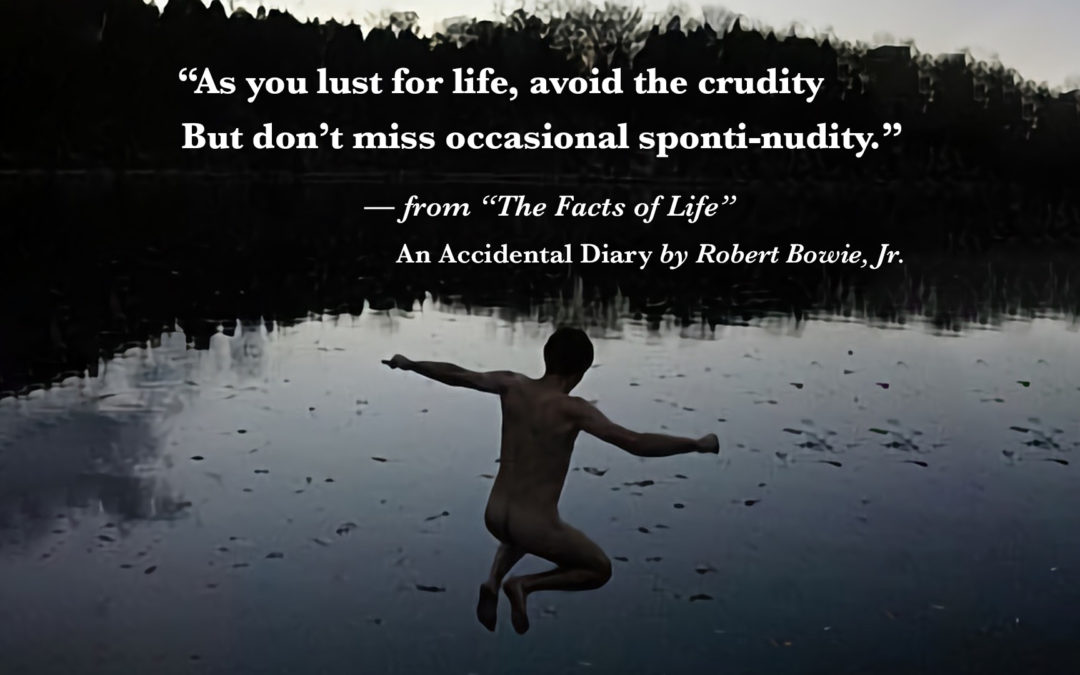
Out of the Rain and into Ice House Pond
…Out of the rain of last week.
I’m back to work. Watch me pitch.
As a child growing up in New England I quickly adopted “Yankee entrepreneurship” and I completely embraced “self-reliance,” which required me to not work for others during summer vacation in case I felt an urgent need to go to the beach.
One summer back in the late 1960s, two high school friends and I started the “Right On House Painting Company.” This was a highly independent entrepreneurial effort.
Our advertising amounted to a forceful announcement of the company name followed by the lifting of our right fist to the sky and pledging solemnly: “Right On”!
We were, of course, saluting latex paint.
Because we were under-funded and had to keep the overhead low, we lived in an old barn off of Upper Lambert’s Cove Road, which we rented from a local commercial fisherman who had at least twenty cats and had been drunk all winter.
We struck a deal for $15 a week rent if we would help him remove the long johns he had been wearing all winter.
Despite the bargain rent, he got the better deal.
We cleaned out the barn and divided it into quadrants so each of us had a room and there was a room left for eating, drinking and entertaining.
It was our “green” corporate headquarters.
We had no running water but refused to live without elegance, so we built an outhouse in a birch grove with a white wicker chair with the bottom cut out of it. We were proud to be feeding the birch trees.
We were way ahead of our time.
We bathed nearby in Ice House Pond — pretty much always at night so we didn’t get our bathing suits wet.
To reduce automotive and travel expenses, we generally hitchhiked with a can of paint and a brush in one hand and our thumb extended from the other in order to get to work.
It was also an early form of targeted corporate advertising, since we ended up meeting everybody on Martha’s Vineyard over the summer.
Every ride was a job interview from the passenger’s seat, but it didn’t matter because we were on your way to work anyway.
Our corporate mission statement required that on sunny days we went to the beach. On rainy days, we played poker. On hazy days we painted houses.
We made good money.
When asked about our profit margins we would announce: “Enough is as good as a feast” and drop our eyes and lift our fist to the sky.
My entrepreneurial spirit has never died.
I have avoided being an employee over the last several decades by starting a law firm and retiring to become a poet and here I am selling my book… but man do I have a deal for you!
It’s all about how you look at things.
Don’t look at this book as poetry — everybody hates poetry and a book of sonnets is worse.
But! If you look at it like sort of a Bible written in rhyme and rhythm or maybe just “Easy Go’n Bob’s Book of Random Wisdom,” then why not?
Keep it where you can read just one sonnet at a time uninterrupted. Like the bathroom. Or a wicker chair with a hole in it. I’m not proud.
Consider the sonnet entitled “The Facts of Life,” obviously composed for future generations.
———
The Facts of Life
I swam, back then, with some father’s daughters,
Back stroking only slightly out of touch,
Out to the raft in the starry waters
And never thought of their fathers all that much.
My child, don’t judge me till you’re fifty-five
But there were midnight visits to “Ice House Pond,”
In my misspent youth, when I was still alive,
Where couples would strip, and swim and then bond.
And my child, this I know for sure is true:
At seventeen we all are born to be free
But ’cause I’m your father and I love you
Please consider this seasoned advice from me:
As you lust for life, avoid the crudity
But don’t miss occasional sponti-nudity.
———
Get it in softcover or on Kindle I don’t care. Get a copy and after you have read it, give it away. Spread the word. That is all I want.
It’s sometimes a little scary and sometimes a little sad and often about self-reliance, defiance, a second life, and “which way is the beach?”
Right On!
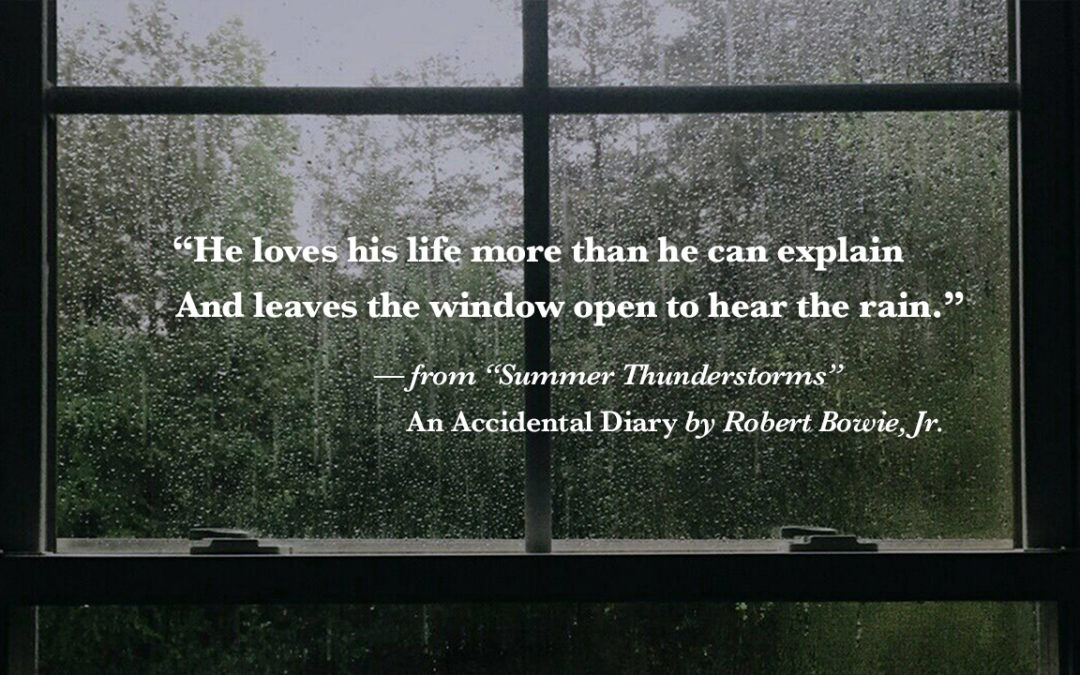
Sometimes You Have to Open the Windows and Listen to the Rain
This morning was hard. I woke up and it was raining. Over the last month, I have been coming to recognize a hard truth — which I finally realized this morning.
Over five years ago, I started this blog to force myself into a weekly discipline, to improve my writing skills and to explore how I could start a whole new career after retirement from a very happy first career as a lawyer.
My whole life I had quietly wanted to see if I could create a life as an artist.
After writing 10 plays for the wonderful little theaters in Baltimore, I decided to see if I could break into New York professional theater and I committed to writing and publishing poems.
I took classes at the New York Commercial Theater Institute and was fortunate to be accepted into the poetry program at Bread Loaf in Vermont.
All of a sudden, it was starting to happen, this improbable dream of mine.
My play “Onaje” was selected by FringeNYC in 2018 and, after great reviews, got picked up and nurtured by a NYC producer. After the rewrites and several table reads to make it a more fleshed out two-act play, “The Grace of God & The Man Machine” was ready.
But then COVID hit in March of 2020. The theaters shut down just as we were waiting to open off-Broadway.
Then in February of this year, we were ready again. We planned to open off-Broadway in November 2022 for a one-month run at Theatre Row on 42nd Street.
Also this year, I published “An Accidental Diary: A Sonnet a Week for a Year,” so we were on our way.
The dream was coming true!
But then, a month ago, COVID struck again and the producer went out of business after 15 years of producing successful shows. Even still, the producer offered the use of the performance space if I could find a new producer with such short notice.
This seems like an impossible task. I looked in the mirror this morning and I said it: “This lifetime dream may not happen.”
But then I realized, I’m not ready to give up just yet. Somewhere out there, there may be a partner, or a resource, or some other way to make this happen.
I turned away and looked for a diversion, for good news to chase away this awful gathering sadness.
Well, last week I learned that, along with my sonnet “Summer Thunderstorms” being chosen a runner-up for the Robert Frost Foundation poetry contest this year, “City Snow” had been included in the “Maryland Bards Poetry Review 2022” anthology. Both poems are from my book, “An Accidental Diary.”
I sat down by the window and opened my little book and reread “Summer Thunderstorm”:
Summer Thunderstorms
As with the generations long since dead
The fire and brimstone of the status quo
Wakes him up from the safety of his bed
And lightening frames him in the window
And photographs him in its afterglow.
Tonight he feels his present and its past
As the summer storm also comes and goes.
Conclusions are foolish in a world so vast.
For at the edges of his world and heart
Far past the farthest boundary of his grasp
Where ideas cause worlds to come apart
He lives in this place that will not last.
He loves his life more than he can explain
And leaves the window open to hear the rain.
I opened the windows to hear the rain.
After I looked out at the storm for a little while, I got a fresh cup of coffee and started writing this. I have stuff to do. It’s time to get back to work.
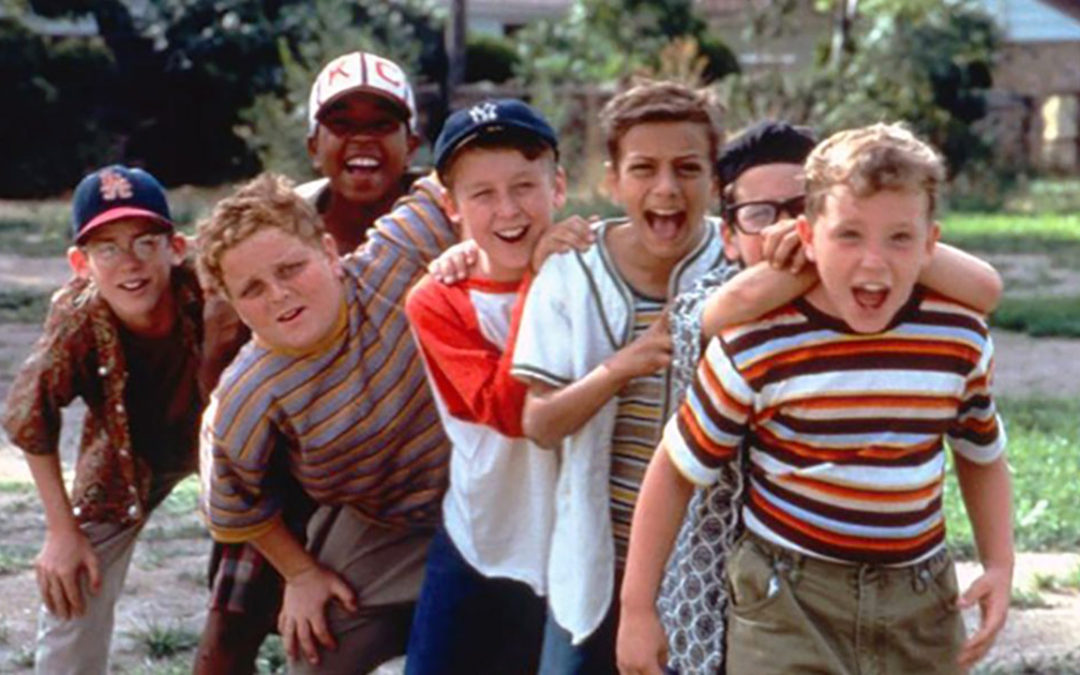
Have You Ever Seen “The Sandlot”?
This is a 4th of July American love story straight from my heart. It doesn’t go where you might expect.
In 2014, I sold my controlling interest in the law firm I had created in 1990 and ran for state delegate because I was terrified by the emerging polarization of our country. I lost in a gerrymandered jurisdiction. I never had a chance.
As a child, I hitchhiked through 40 states and met strangers from endlessly different backgrounds and every walk of life.
Back then my rides often came from soldiers who had hitchhiked around the country themselves after the Second World War. They stopped their lives to offer me kindness with no thought of anything in return.
A ranking officer in a top-down convertible drove me into Paris Island, the US Marine training facility, because I could get a carton of Camel cigarettes for 15 cents a pack at the PX. The marching soldiers saluted the license plates as we entered and as he returned me to the road.
I came to understand the unspoken secrets of a country that preached justice and equality but had built its wealth with slave labor on stolen land.
Although we often agreed to disagree, my rides and I shared a national pride. This country had saved a dividing world from fascism and had recently passed legislation like the Civil Rights Act of ’64 in an attempt to correct our world at home.
As I traveled shotgun, I learned to listen. That was my job.
We talked and they would tell me about the joy and sadness and insecurity they could not tell their wives. I learned so much from them.
Every ride contained an unspoken understanding that we would never meet again.
The growing polarization that has been dividing us now for years has slowly broken my old hitchhiker’s heart.
This 4th of July, my children came home with their loved ones and their children. Last night, we decided to revisit an old movie which they loved to watch each year on the 4th: “The Sandlot.”
Because I’m deaf now, I sat in a chair up front facing the TV, my back to them, my face hidden from them as I looked up at the screen.
It is a baseball movie about kids growing up in the late ’50s or early ’60s. It is nothing but foolishness but it holds the beauty of a united America that believes in Babe Ruth, the innocence of juvenile behavior, and baseball as a national pastime and religion. James Earl Jones is the linchpin of redemption just because he is, not because it is politically correct.
Sitting with my children and their loved ones and their children behind me, I could cover up ever so gently my unexpected tears as they came.
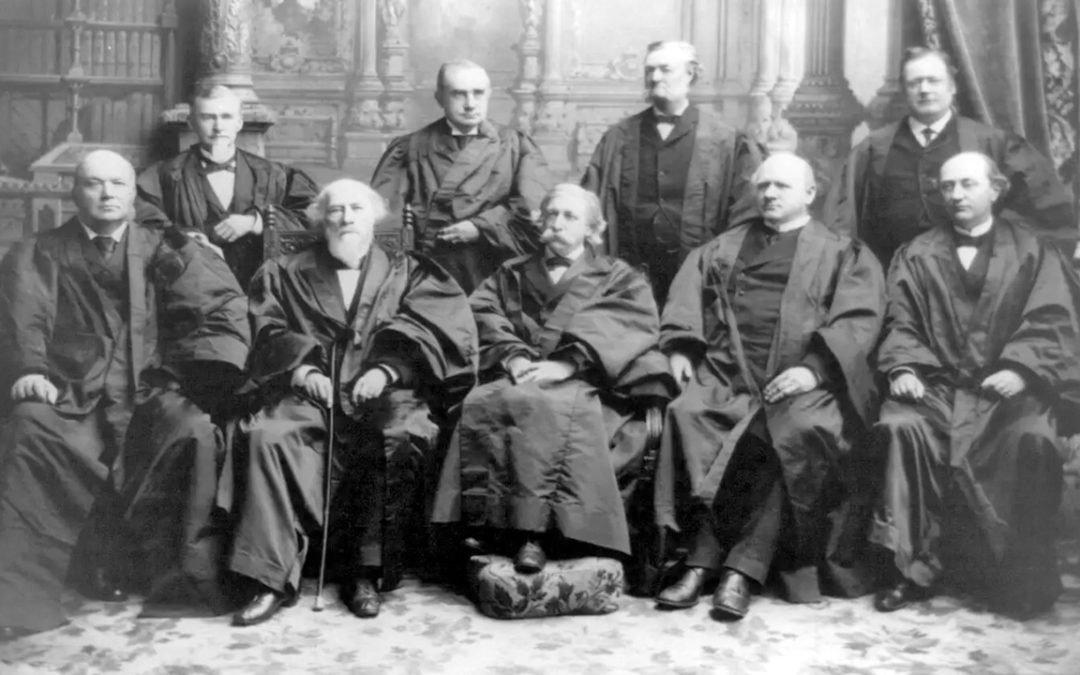
What Is Originalist History Really?
I am willing to admit I’m a moron but who the hell are these “originalists”?
Supreme Court Justices Amy Coney Barrett, Clarence Thomas, and Brett Kavanaugh have all identified themselves as “originalists,” but it now looks like Alito and Gorsuch do too.
So what do these originalists believe?
Justice Amy Coney Barrett, when asked that question at her confirmation hearings, said: “I understand it [the Constitution] to have the meaning that it had at the time people ratified it. So that meaning doesn’t change over time and it’s not up to me to update it or infuse my own policy views into it.”
Okay, Let’s look at some history.
Since the originalists say they must interpret the Constitution based on the time it was ratified rather than interpret the evolution of the historical wisdom it has grown to contain, there is some “originalist” history that they may have overlooked.
The “originalist” history, back when our Constitution was ratified in September of 1787, means: (1) women could not vote or own property, (2) Black people were slaves and didn’t qualify as “people” and (3) interracial marriage was a crime that would get you jail time.
An originalist interpretation of the Constitution, if applied to the present membership of the Supreme Court, would eliminate two-thirds of the “originalists,” as well as a majority of the entire Court.
So Amy Coney Barrett should not vote and should surrender all property she owns and drop out of the Court. And what should they do about Clarence Thomas, or his marriage?
But it gets even more absurd and worse for the fantasy logic of these originalists:
“A Law repugnant to the Constitution is void,” wrote Chief Justice Marshall, the first Chief Justice of the Supreme Court, on February 24, 1803 when, in Marbury v. Madison, he declared unconstitutional a law passed by Congress and signed by the President, based on the Supreme Court’s right of “Judicial Review.”
Nothing, absolutely nothing in the Constitution gave Chief Justice Marshall and the Supreme Court this specific power of judicial review. It is not in the Constitution anywhere.
Marshall, however, believed that the Supreme Court should have a role equal to those of the other two branches of government, so he interpreted the “intent” of the Constitution even though the words were not in the Constitution.
So how can the “originalists” have any basis to review anything?
I’ll tell ya.
As an Economist correspondent recently pointed out, “5 of the 6 conservative Supreme Court justices were appointed by a Republican Senate majority that won fewer votes than the Democrats” and “3 of the 6 were nominated by a President who also won a minority of the popular vote.”
So where are we now?
Are we a democracy? Are we a republic? Or is this when we lose all that? Have you been watching the January 6th hearings?
The billionaire President who appointed three of these originalists, managed us for four years with lies and Twitter and, after he was voted out, more lies in order to organize an attack on our government based on the Big Lie of a stolen election, and all these lies were affirmed by Fox (not at all) News, Ingram and Carlson.
Isn’t it time to start the long hard revolution to take our country back?
The midterm elections have to be that revolution.
If the Trump support, the originalists, and Fox News win the House and the Senate for Republicans in the midterms, those Republicans will continue their coup d’état and attempt to overthrow our democracy. They have made no secret of this.
America has evolved beyond the originalists. We freed ourselves from a king once before. We freed the slaves. We recognized women’s right to vote. As a democracy we have created a history of humanitarian change, and are capable of great creativity and the capacity to govern with a big heart when we are not divided.
Let’s get back to being the US Again.

Life After Nitrogen Narcosis?
In our class, the poet Elizabeth Bishop would teach poetry by taking any two poems and placing them side by side to see how they “illuminated each other” by comparison and contrast.
It was an exercise in both observation and communication but it also offered that fresh perspective on what was set in stone and had been taken for granted.
The more extreme the comparison and contrast the more it reawakens: A ripe apple and a red sports car? What makes them red? What makes them different? What makes them go? DNA and water versus oil and a gas engine?
How about like “politics” and “scuba diving”?
Let’s try it.
Well first, in contrast, they encompass two different worlds. One above water and one below. However, people have learned to communicate in both worlds, particularly in life-threatening situations.
How is that communication the same and different, and how can it offer a fresh perspective?
Through communication in politics, Donald Trump raised a quarter of a billion dollars ($250,000,000.00) from small dollar contributions from his supporters to “stop the steal,” despite overwhelming evidence that nothing got stolen. Furthermore, he has convinced his supporters not to watch the January 6th Committee hearings where this was revealed and validated.
So you can’t use Twitter underwater.
But in scuba diving you have hand signals, which is a little more primitive but just as effective for short urgent messages.
All diving is done in at least pairs with each diver responsible for his or her buddy. If you go too deep and become a victim of nitrogen narcosis — which is the song of angels calling you to come deeper to your death. Your buddy should grab your fin and signal with a hand gesture indicating the cutting of one’s throat and then point to the surface. It’s life or death.
During one dive in the outer islands of the Caribbean, I was randomly paired with two Midwestern middle-aged men who already were friends.
We agreed to go down to about 90 feet and swim in formation, like airplanes, to cruise along the deep edge of a cliff overhang and be each other’s eyes and ears.
One of my new buddies, our wing man at the time, banged his knife on his tank to get our attention, made eye contact, and excitedly pointed straight down. He spread his arms way out wide, gave the finger to us, and then put his right hand on his head at a 90-degree angle as if it was splitting his head in half down the middle with an ax. The other two of us got it and looked down into the dark for a “Big Fucking Shark!”
Later that afternoon, sitting side by side with me at the bar, my two Midwestern buddies good-naturedly unloaded all the liberal Democrat jokes they had in rapid fire in my direction, and with mock astonishment I countered them with my defenses and went on the attack. Quite naturally we had come to trust each other with our lives underwater, using sign language which we made up as we went along. We were friends.
I would love to meet them again and learn from them again and laugh. I want to sit on that barstool, turn to look at them and, with a perfectly timed pause, stop deadpan and say: “TRUMP???” And then spread my arms out wide, give them the finger and put my right hand on my head at a right angle as if it was splitting my head down the middle with an ax. I’d love to have them laugh at that, for us to laugh together.
I want to laugh with my Republican friends again and have us trust each other again with our lives.
It beats drowning in an angel’s call.

Life in a Nightmare
I opened the New York Times last week and turned to the theater section and read the headline:
“Dear Evan Hansen’ and ‘Tina’ to End Their Broadway Runs
“The musicals, both of which lost steam after the pandemic shutdown, will close in late summer.”
The article pointed out that before the pandemic Evan Hansen was making $1 million a week in sales but now, because of Covid, successful plays were again falling by the wayside. Tina, about the life and music of Tina Turner also had been doing very well.
Over the last two years, as I watched New York theaters close and reopen and struggle to sell tickets, this kind of news had become the soundtrack of my life. I was used to it by now.
I turned to check my email and noticed an email from Mind the Art Entertainment (MTAE), the producers for my play The Grace of God & the Man Machine, scheduled to open off-Broadway on November 21. It read:
It is with great sadness that I announce that I, as Founder and Resident Artistic Director of Mind The Art Entertainment, have formally submitted a recommendation to our Board to close our company after 15 years.
Producing in NYC is no longer viable for us after so many losses related to the pandemic, including 6 cancelled/closed back to back productions.
This can not be happening!
Almost two years after the remarkable success of a Onaje — my 90-minute one-act at FringeNYC in October of 2018 — after MTAE became its producer, and after several rewrites and three professional table reads lead by dramaturg/ director Kevin R. Free, we had a two-act play with an explosive finish. It ran fast and smooth like a river to a waterfall. We were ready.
Then, after that last table read in March of 2020, the pandemic hit and we all had to wait but we were ready.
In October of 2021, we were surprised and blessed to be offered a virtual trial performance directed by Van Dirk Fisher at the Reliant Theater, who was doing cutting-edge online productions to expansive theater-starved online audiences. It was well received.
We were so ready and this play was perfect for the politics of its time. Its time was now.
Early this year, it appeared that New York theater was opening up, and MTAE booked Theater Row for November to open a week-and-a-half after the midterm elections. That would be perfect.
Now, after almost four years of anticipation and preparation, we have a road-tested redemptive two-act play, rich with true American characters, timed to be performed in November after the midterm elections, but Covid variations were again on the rise.
And just like that, it is over.
The producers sent heartbroken apologies to everyone and have even offered to transfer the off-Broadway lease at Theatre Row free to support a new producer, but it will be next to impossible to mount the play unless a new team is in place by the end of this month.
Yes, I am heartbroken.
But throughout my whole life, I have been blessed by the opportunity provided by crossroads and disasters.
If you are a professional producer for New York theater, or if you know someone who is, just let them know I’m not dead yet and I would be happy to send them the script — but two weeks may not be enough time. (You can click the Contact link in the menu.)
Yes, I know it is almost impossible. But as Hamlet says, “the readiness is all.”
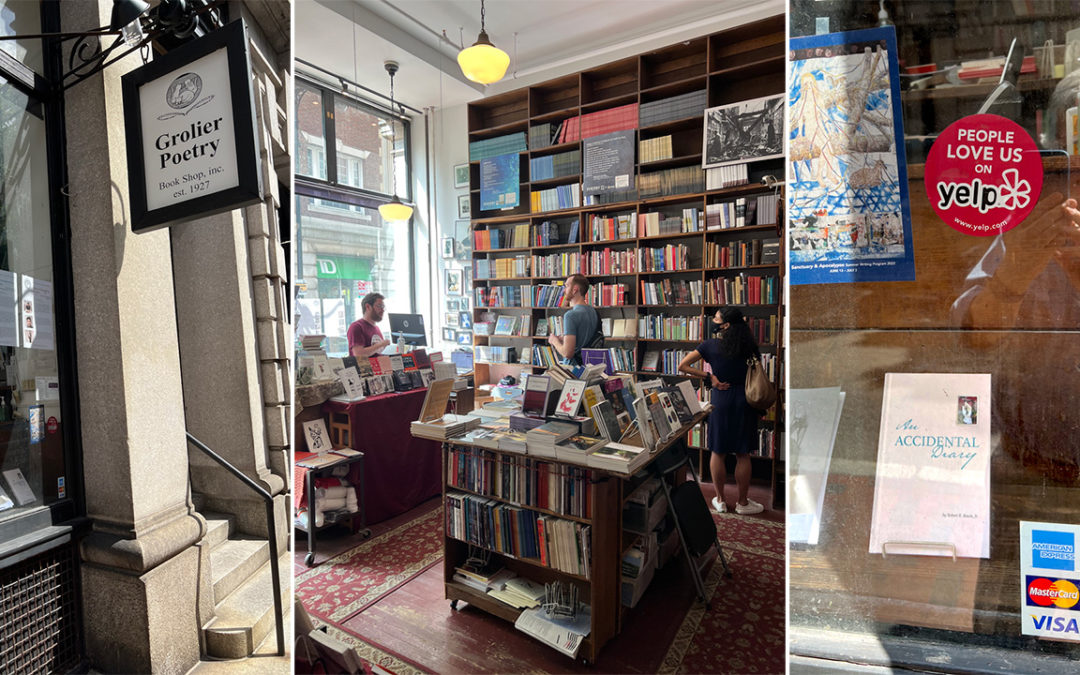
A Walk-Off Ninth-Inning Home Run
As a young boy, I lived in the sports pages and played on sandlot baseball diamonds after school. I dreamed about the big leagues. My dreams and my future were one.
As a young man, things became a little more complicated.
I couldn’t really hit a curve ball and I started noticing that the second question that people asked grown-ups after their name was “What do you do?”
Businessman? Doctor? Lawyer? With high school, a wider and more terrifying world was opening up.
I stumbled on T.S. Eliot and his poem, “The Love Song of J. Alfred Prufrock,” in which he wrote about the early 20th century. It is set in Boston’s Beacon Hill.
It seduced me from my fading childhood into my predestined future with its opening lines:
Let us go then, you and I,
When the evening is spread out against the sky
Like a patient etherized upon a table;
Ezra Pound pronounced this poem as “modern” — part of the dark reality of the new century and its new poetry. And so it was for me, standing there, in the Grolier Poetry Book Shop with J. Alfred Prufrock in my hand, a freshly minted teenage groupie at a one-room bookstore with towering bookcases.
Grolier was intimidating, but it held a world of new alternative heroes as I was losing my childhood and falling into the shadows of some job that would define me when asked “What do you do?”
How did this happen?
Posted on the front door of Grolier Poetry Book Shop was a blunt sign: “No Law. No History. No Economics. No Biology. No Physics. No Chemistry. Only Poetry!”
Gordon Cairnie, one of the founders, would sit on an old couch and hold court with published poets who were different in every way than the people I knew.
He waited for some unsuspecting student to walk in and ask if the store sold law books or the like.
Gordon would unload on the innocent walk-in and turn all the heads of the browsing readers when at the top of his voice he would answer, “No! But what difference does it make to you because you can’t even read the sign!”
Everyone would laugh in this freshly reconsecrated space and the young student was sure never to return again.
The point of entry to this new world was the “dare to be different” commitment to admit out loud that you were a poet and a believer, not a tourist.
I was way too shy.
This was a lot different than sandlot baseball, but within it there was still room to dream.
Over the years, the Grolier had become a focus of poetic activity in the Cambridge area, itself a magnet for American poets because of the influence of Harvard University. Poets such as John Ashbery, Robert Bly, Robert Creeley, Donald Hall, and Frank O’Hara were regulars at the store during their time as undergraduates at Harvard. The poet Conrad Aiken lived upstairs from the store in its early days.
Numerous other poets and writers are noted as “friends of the Grolier,” including Russell Banks, Frank Bidart, William Corbett, E. E. Cummings, T. S. Eliot, Lawrence Ferlinghetti, David Ferry, Allen Ginsberg, Denise Levertov, Marianne Moore, Charles Olson, Robert Pinsky, Adrienne Rich, Ruth Stone, James Tate and Franz Wright, to name just a few.
The bookstore claims to be the oldest continuous bookshop devoted solely to the sale of poetry and poetry criticism.
This September it will be 95 years old.
I was committed to keeping up with the rest, going to law school and succeeding — and I did. But I couldn’t forget the voices at Grolier and my prior fear of admitting out loud I wanted to be a poet.
When my travels would lead me to Boston, I would always go back to make sure it was still there. I would always buy a book or two to justify my visit and my love of lounging there for awhile.
Last Saturday, I was in Cambridge. I brought two copies of my first book of poems, An Accidental Diary, to give to friends I planned to see.
That morning in the hotel room, an idea hit me. I looked up the Grolier Poetry Bookstore and before I let better judgment kick in I called and asked for the proprietor, James Fraser. I told him I had two copies of a book, explaining one poem was runner up for the Robert Frost Foundation Poetry Award and another had been chosen for an upcoming anthology in Baltimore. I asked him if he would consider putting them up for sale on the shelves.
I told James I had been going into the bookstore for over 50 years and had studied with Professor William Alfred and Elizabeth Bishop whose books were on the shelves and pictures on the walls.
He invited me to drop by. I immediately walked my two books over and told him more of my story. I encouraged him to read “Summer Thunderstorms” and “The Facts of Life” to show the range of the work.
He leafed through the book as we continue to talk. There were a few people browsing as there always are and I took a moment to take a deep breath and just be surrounded by the place.
James looked up and smiled. He took both books out of my hand, looked up at me again, took one for the shelf and then put one book prominently in the front window.
Things this wonderful don’t really happen in real life but sometimes they do.
When I walked back to the hotel empty-handed looking down at the pavement with a stupid grin on my face, I felt like I had circled the bases on the sandlot!
I had always dreamed about the big leagues. But after a very long time my dreams and my future were again one.
(“An Accidental Diary” is also available on Amazon in paperback and Kindle.)
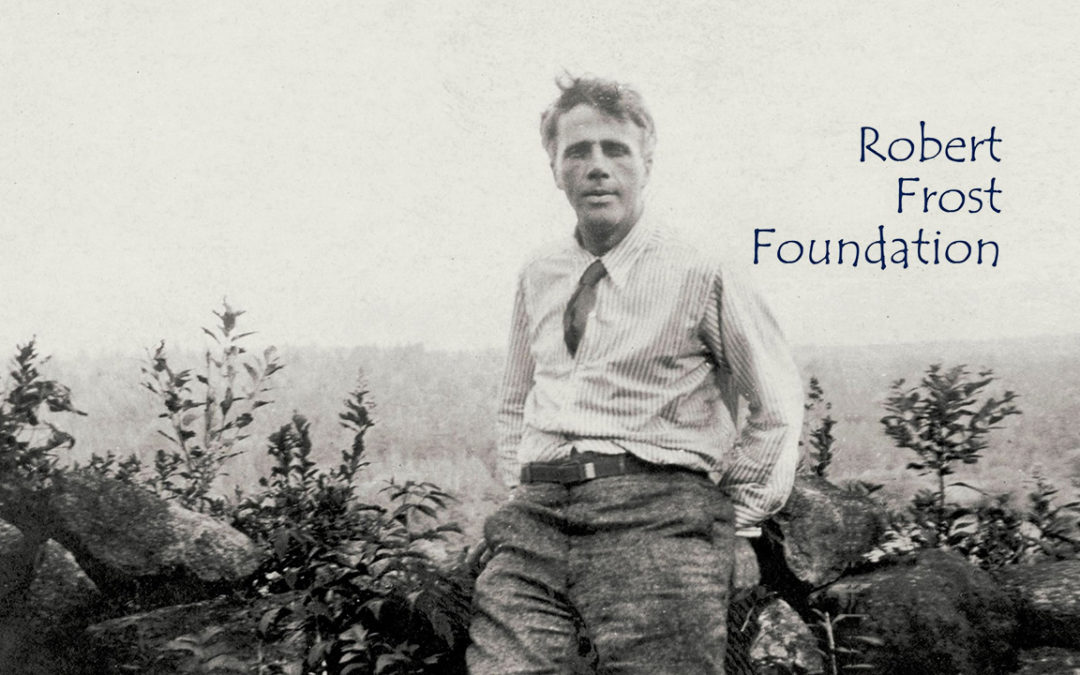
Yes, There May Be Life After the Practice of Law! Now Help Me Prove It
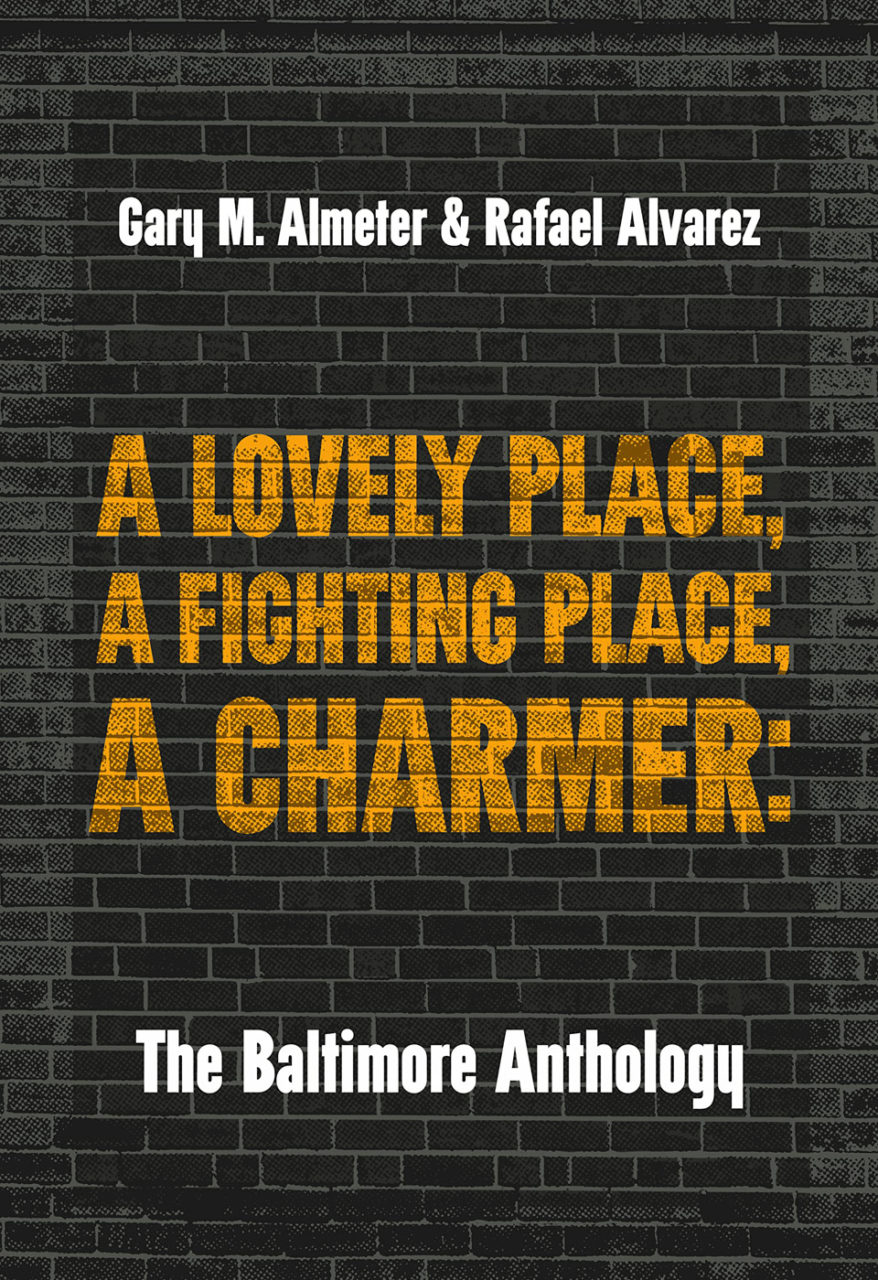
I started this blog several years ago in an effort to explore if there could a professional life in the arts after a full and satisfying first career.
Yesterday, I was notified that I had been chosen as a runner up for the Robert Frost Poetry Award for 2022 for my sonnet, “Summer Thunderstorms.” and last month, my sonnet, “City Snow,” was chosen to be included in the upcoming Belt City Anthology: A Lovely Place, A Fighting Place, A Charmer: The Baltimore Anthology.
Both entries are from my book, An Accidental Diary: A Sonnet a Week for a Year.
Help me celebrate and prove that there is the second life, after all!
Please buy a copy of these books and give them away, and ask that they be re-gifted by order of the author.
Here is the Robert Frost Foundation entry:
Summer Thunderstorms
As with the generations long since dead
The fire and brimstone of the status quo
Wakes him up from the safety of his bed
And lightening frames him in the window
And photographs him in its afterglow.
Tonight he feels his present and its past
As the summer storm also comes and goes.
Conclusions are foolish in a world so vast.
For at the edges of his world and heart
Far past the farthest boundary of his grasp
Where ideas cause worlds to come apart
He lives in this place that will not last.
He loves his life more than he can explain
And leaves the window open to hear the rain.
“Week 35” from An Accidental Diary
(Available now on Amazon in paperback and Kindle.)
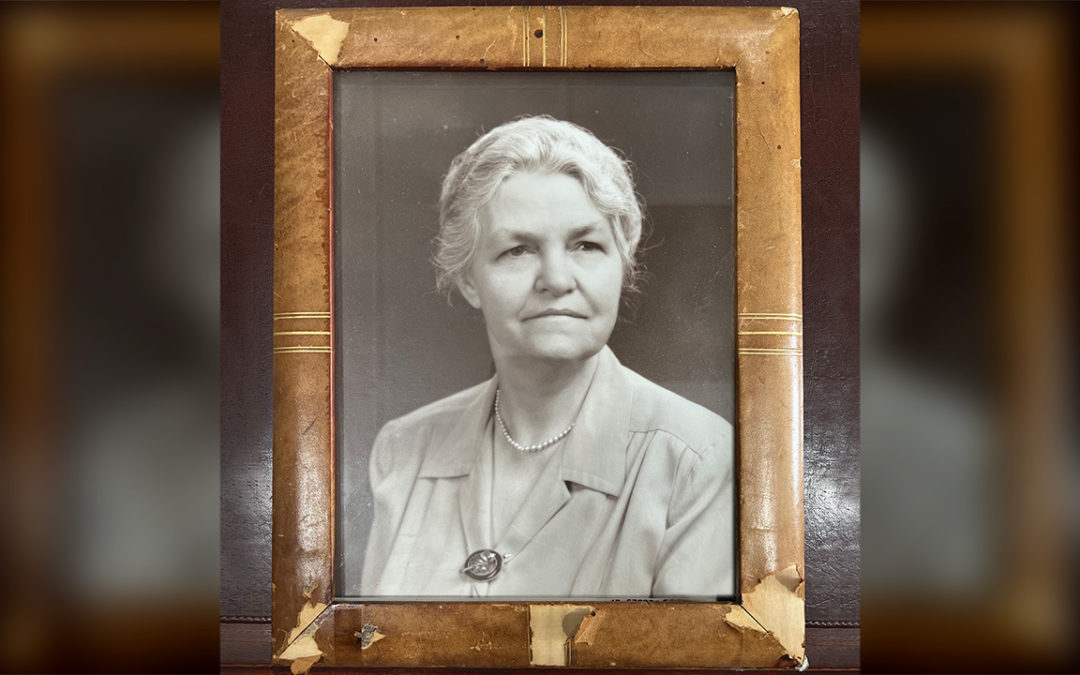
Just Out of Reach
Last week I posted a piece about my mother and how my grandmother would whistle her chickens home long ago on a farm on the eastern shore of Maryland and how my mother, not quite so long ago, used the same whistle to call her children.
My grandmother was the only grandparent I would know. She lost her husband and the farm when my mother was still in high school.
Even though we always lived far apart I remember as a small child feelIng our inexplicable mutual affection when I would wish her happy birthday or Merry Christmas each year over the telephone.
Both my grandmother and my mother had a kindness that children almost Intuitively recognized as safe.
While the schools taught reading, writing, arithmetic, and how to compete in the modern world, my mother and grandmother’s universe was quite the opposite. It was more gentle. They focused on the wellbeing of those they loved. Their world was often damage control.
I was lucky to have known them.
In fourth grade the family moved back to Boston from Washington, and I started my 4th new school in four years. That summer I had developed a temperature of 104 and was taken from Randolph New Hampshire down to Mass General hospital to see Dr. Gross, a specialist in children’s lung problems.
The lower lobe of my left lung was removed which delayed my entrance into a new fourth grade class in which I would already be far behind because of the learning issues that had followed me from Washington.
The following summer I had to meet with tutors every day in order to be bumped up to the fifth grade, I had finally given up on school and slowly started to recess into myself and my gathering emotional despair.
In August, I got a break from the tutoring before fifth grade started.
The next thing I knew, I was scheduled to visit my grandmother in Chestertown, MD for the first time.
My grandmother was in her early 70s and lived alone in one of two small apartments on the 4th floor in an old building next to the bridge over the Chester River, which brought slow moving cars and rattling trucks in and out of Chestertown.
That first evening together, we ate a simple dinner on the card table. Then we went down the fire escape to the backyard with a jar with ice pick holes for air in its tin screw top to catch lightening bugs. Later, when the lights were out, they would be let loose in my room.
Like her daughter, Granny — which is what she wished to be called — had the softest paper-thin skin as she aged but maintained rough dishpan hands, which were perfect for back rubs.
I remember that first night being tucked into bed in an envelope of fitted sheets all alone in the darkness with the lightning bugs.
Somehow my tension disappeared into a quiet world that was my grandmother’s domain.
The next morning she vested me with adult authority. After an early breakfast of griddle cakes with maple syrup, grits, and kettle tea (kid’s tea — milk and sugar but no teabag), it was unspoken but somehow understood that I would be carrying my side of the responsibility by doing the dishes.
At breakfast she planned our day. We would be walking into town to do her errands and I would buy a simple fishing pole, some hooks, a tin pail to hold a small pocket knife, extra lines, some worms, and a red bobber that would flip over and pop up if I got a bite from one of the catfish that the old men routinely pulled out of the Chester River from off the bridge.
Granny had this uncanny ability to create an adventure and treat it like the business of life. She told me not to bother the old men who were fishing but be nice to them if they talked to me.
The men left me alone but they had stopped laughing together and focused on their fishing quietly as they occasionally would look over at me.
As I caught nothing, they caught several big catfish and I was envious. Slowly one of the men came over and asked if I would like some advice. I politely said yes and he pulled in my line, replaced my worm with bait from his pail, put on a sinker, and let the line drop into the brown water until it hit the bottom. Then he reeled it up so that the bobber would react to bites from where the catfish lived.
At the end of the day when everyone left the bridge, I left with them.
Midway through dinner, I proudly announced that I had made a friend. Without looking up, Granny asked, “was I polite?“ I assured her I was, which added to my sense of accomplishment, but I told her I did not catch any fish.
She said that she had done all the shopping that was necessary for our week, so I should be sure if I caught a fish to make sure that I gave it to my new friends. After dinner, and after I had done the dishes, because the sun had not yet gone down, we played slap jack on the folding table and I got pretty good at slapping jacks.
As the sun went down we repeated our collecting of lighting bugs for the room, and the next morning I repeated the day before, but this time with a little more self-confidence. My grandmother told me to leave my windows open so the lightning bugs could rejoin their friends before the next upcoming night.
The men were already on the bridge when I walked up to join them with my pail and fishing rod, and they welcomed me. They clearly had been talking about me after I left them the day before.
I was proud that I had been polite and that they seemed to like me. Within an hour of meeting them, I caught a fish and it was pretty big. They showed me how to remove the hook from the big catfish’s gaping mouth and I dropped it into one of the burlap bags.
The friendships increased into gentle humor, which was respectful on all sides but fun. That night we repeated the night before except my grandmother was laughing when I returned home, because she said that her downstairs neighbor had stopped her on the stairs to let her know that I had slapped a jack so hard the pendulum had come off of the grandfather clock in the apartment below.
I went back to school that fall and continued to fail, but I was less hesitant to call my grandmother just to talk but never to complain. We never talked about anything important but somehow we did.
Later that year, my mother left Boston hurriedly one morning to go down to Chestertown and I grew worried but couldn’t speak.
When I got home from school, my father was waiting.
I told him I was worried about my mother. I wanted to call my grandmother but he took me into the living room and held both my hands in his and said, “you can’t call her now. She has died.“
That was well over 60 years ago. We would both be about the same age now.
Even now, there are still times when I feel that I want to call her but somehow I can’t seem to find the number.
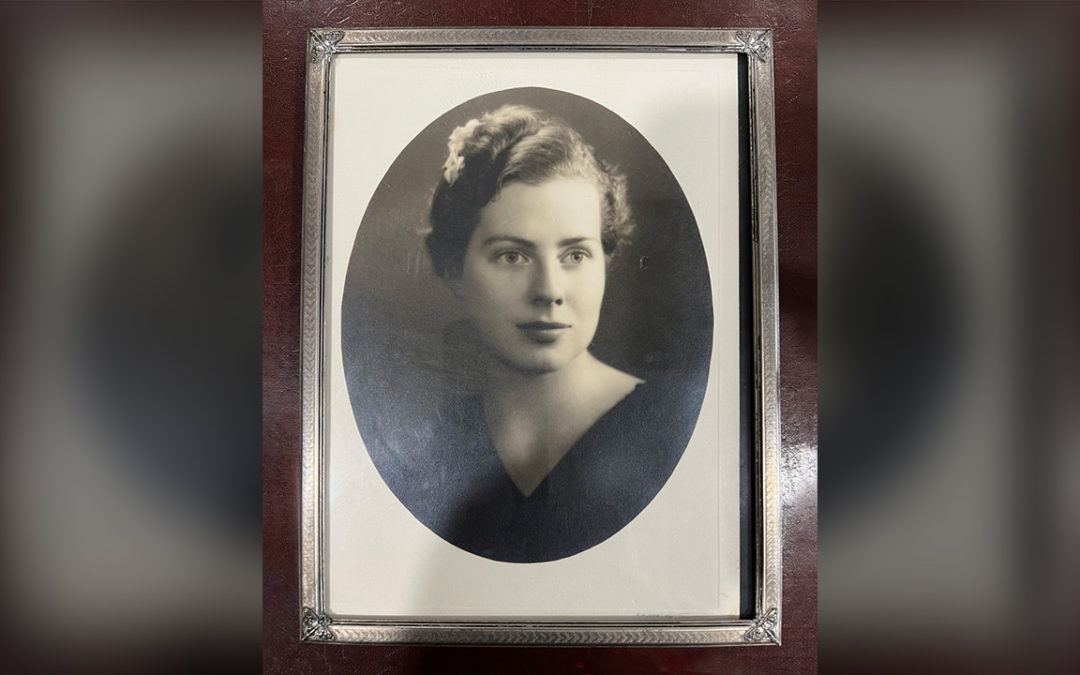
Calling the Chickens Home
My mother was a quiet country girl. Even in the suburbs, she used the exact same whistle that her mother used to call the chickens when she wanted us home for dinner.
She married a strict but loving patriarch and had two sons. The three males all believed they were the center of the universe. When she died almost 15 years ago, she left an unexpected void in her place.
The three men she left behind slowly came to recognize she had been our gravity. I don’t think I could have understood her while she was still alive. I think she knew that.
The year she died, she gave me a large steamer trunk, which she told me she had filled with the flotsam and jetsam of my very “learning disabled” childhood. She told me she had saved everything, beginning with kindergarten through when I passed the bar exam and she pronounced I was on my own, “because finally you will never have to take another test again.”
It had been our war, which we fought side by side, against a world eager to write me off, forget me, marginalize me and perhaps us. Because I did not wish to return to that nightmare, I was never ready to open that box.
My mother had no fear of time. She had endless patience.
Because we lived in a patriarchy, we knew all about our family name, with its politicians, governors, distinguished lawyers, and Maryland history. But my mother‘s family of farmers and merchants on the eastern shore of Maryland with its southern roots was rarely discussed.
The year before she died in her mid-90s, she asked me to drive her down to Church Hill, Maryland, where her family of Chapmans, Valiants, and Faithfuls were buried around a small church in an agrarian tidewater town. She said she wanted me to see where she had come from. She had already given me the box by then.
As I recuperated from surgery over the last few weeks, I kept looking at that box. Last Sunday, I opened it.
As I gently pulled back the wrapping paper, I was surprised to find more than I expected. There were pictures of her relatives and ancestors who I had never really known. On the back were the names and dates and a few sentences about who they were and how they connected to my mother and our family. As I put the pictures up on the table and found them staring back at me, her life slowly formed around her in a way that included me.
I noticed that I looked like them more than I looked like my father’s family.
Her father loved poetry and the arts. He had been a choral master and led singing groups and church choirs up and down the eastern shore. There was a beautiful hand-crocheted bed cover, and a white embroidered tablecloth made by her mother, and more pictures of her two older brothers whom I barely knew.
At the very bottom, piled in chronological order and bound by a rubber band that had long since broken, were all of my teachers’ reports. They started with kindergarten reports of a joyous, adventurous, somewhat shy little boy who the teachers found “amazing in his creativity and interest in the world,” until the alphabet and reading and spelling were introduced in first grade and then the failures compounded year after year, as that little boy fell further behind, repeating grades or advancing to the next grade only if he would go to summer school, then encouraged to leave and go to another school, and ultimately to be told he could not go to college.
My mother was patient. My mother had no fear of time. She got me to dictate stories to her as I thrashed on the bed in the vacant third-floor room. She got me to write poems.
Each day after school, she made it her business to read all of my homework assignments to me as we curled up in a window seat, the afternoon sun pouring in through the windows. It didn’t really help, but it was all she could do and she refused to give up on her disappointing son who was always falling behind.
My mother had no fear of time. She had endless patience.
We were all too self-centered to ever recognize who she really was. We all loved her, that was never an issue. But I am now convinced that when she went off to church alone on Sundays, that was something more than her quiet time.
After I spent better than a day with everything spread out on the dining room table, I finally closed the empty trunk. It had been a time bomb to be opened when I could finally understand it. It was an explosion.
Over the years, my father and my brother grew to realize that she had a unique relationship with each of us that was powerful and the source of the gravity that brought us all together. The trunk did not hold the history of my failure as I had thought it did. It held the history of our love as it had matured with faith and quiet determination, year after year, growing strong dispute life’s pressure.
My mother was patient. She had no fear of time.
She waited until I found a voice outside of failure, my family history. She trusted I would find that voice and make it my own. She waited until I found the arts in her family and in me. She waited until last Sunday to be more fully recognized.
There is a poet I love named Philip Larkin (1922-1985). He wrote a quiet poem that stopped me in my tracks when I first read him in college:
The Explosion
by Philip Larkin
On the day of the explosion
Shadows pointed towards the pithead.
In the sun the slagheap slept.
Down the lane came men in pitboots
Coughing oath-edged talk and pipe-smoke,
Shouldering off the freshened silence.
One chased after rabbits; lost them;
Came back with a nest of lark’s eggs;
Showed them; lodged them in the grasses.
So they passed in beards and moleskins
Fathers brothers nicknames laughter
Through the tall gates standing open.
At noon there came a tremor; cows
Stopped chewing for a second; sun
Scarfed as in a heat-haze dimmed.
The dead go on before us, they
Are sitting in God’s house in comfort,
We shall see them face to face–
plain as lettering in the chapels
It was said and for a second
Wives saw men of the explosion
Larger than in life they managed–
Gold as on a coin or walking
Somehow from the sun towards them
One showing the eggs unbroken.
There are times when it takes so long to understand the depth of one’s love you almost lose the chance to say thank you. If I shut my eyes, I can hear my grandmother and my mother calling the chickens home.

The Question I Was Afraid to Answer
This can’t be real but it’s happening anyway…?
Last week I missed my Tuesday @ 3 posting.
A friend told me, “As you go into the operating room, don’t look at the ceiling because it’s like you’re underneath a giant spider. The legs come down when they do robotic surgery. The doctor isn’t even in the same room.”
This can’t be real but it’s happening anyway?
Then he said “You’ve got to be ready to block it out. Before you go in, give yourself a question to think about and then think about working on solving it all the way through your time in the hospital even through the anesthesia. You will be an unreliable narrator and your answer might make no sense, but you’ve got to be ready to block it all out.”
The operating room doors opened and they pushed my bed to the center of the room. Several nurses were setting up under very bright lights but they had their backs to me. The second hand took baby steps on a wall clock until the minute hand hit exactly 6:45 am.
I didn’t look at the ceiling.
My thoughts turned to my eighth-grade hockey team’s first victory. We were joyously riding back in a school bus in full celebration. The coach was in a separate car and the bus driver had lost all authority on the bus.
There was a ruckus in the back. I turned to see one of the boys secretively drop his pants and moon the late afternoon traffic. I realized that his audience was not the following traffic. It was the boys on the bus.
I was unprepared. I had no question to work on as the anesthesia dripped through tubes into my arm.
Moments later, I blinked into consciousness and I saw my doctor, not the surgeon, saying to me, “you probably won’t remember this, but I came by to let you know they got all of it and it hadn’t spread.”
As I fell back to sleep, l focused on the jukebox in the basement bar I worked in during college. One night, I discovered that from behind the bar I could control the volume of the music and the dimmer for the lights. And that if I made strong drinks, turned down the lights and turned up the music, all that was missing was a high wire act.
Around 2 o’clock the following morning, I woke up and tried to roll over but I was unable to move. I was lost in a tangle of catheters and drainage systems with little bags hanging from a carriage on wheels. I could not move. I had become claustrophobic.
The night nurse reassured me that she also suffers from claustrophobia. She told me it would be good if she helped me out of bed, and I walked up and down the well-lit hall, slowly pushing the carriage holding the dripping bags that flowed into me.
I did laps and more laps, past night nurses who drifted in and out of rooms as they gathered blood pressure statistics and temperatures and returned to their computers like bees to their hive.
I read the patient thank you notes posted on the walls and looked at the list of this month’s birthdays, all in the gentle murmur of motion past midnight.
Everyone left me alone to work out my demons by myself, and I recognized we live in an ever-changing atmosphere our whole life.
Finally, I returned to bed to realize that over the last half an hour while I was walking, my gown had been lifted and snagged to expose my bare bottom to the world and I wondered… is this connected? And then I broke out laughing — fresh beautiful laugher — just because I knew I was alive.
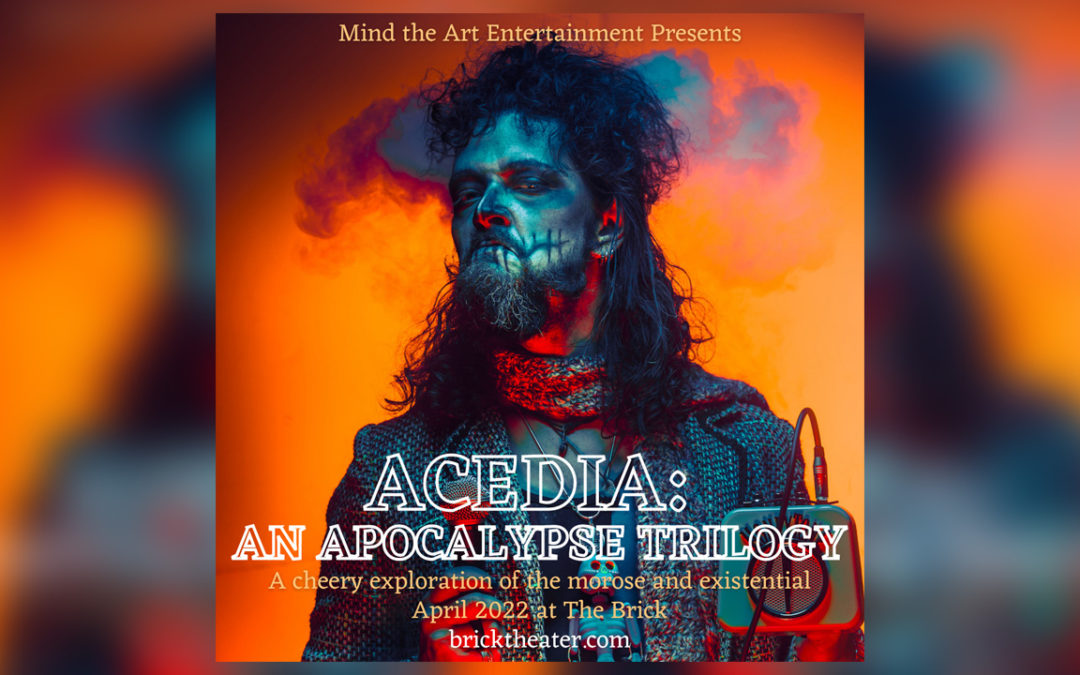
Expect The Creative & Unusual: ACEDIA
Friends, this week I’m featuring an upcoming NYC production I’m excited about, which was written, composed, and produced by my dear friend Christian De Gré Cárdenas, and co-produced and directed by Brian Freeland:
On April 13, Mind The Art Entertainment (MTAE) is opening ACEDIA Part 1, Part 2, and Part 3, which run until April 30th at the Brick Theater, 579 Metropolitan Ave., Brooklyn, NY 11211. Saturday performances feature all three parts as a trilogy.
You can learn more and get tickets here: https://www.bricktheater.com/mind-the-art-entertainments-acedia/
The three plays, which each run less than 90 minutes, can be seen individually over several days or in chronological order in one day.
A Cheery Exploration of the Morose and Existential
Sappy Tales for a Frozen Heart (ACEDIA Part 1): Set before The Apocalypse, can a broken man find humor and meaning as he listens to tales of romance on an old radio in an isolated cabin as the world comes to an end?
Fish Food for Feelings (ACEDIA Part 2): Set on the eve of The Apocalypse- Four adopted siblings meet at an abandoned cabin on the 2nd anniversary of their parents’ death for a surrealist dueling sibling dramedy unraveling during the end of the world.
Sent from Ampathy, miscreated by a non-writer (ACEDIA Part 3): Set after The Apocalypse, a Wisp, a Tuft, a Lint and a Dandelion float in a broken, meaningless, post-apocalyptic world as a deranged Listener seeks to reinvent art, purpose and connection.
Christian De Gré Cárdenas has emerged as one of the most influential contemporary voices in the development of new works in New York City. He has spearheaded numerous international projects in film, theater, television, music, publishing, web-media, fine-art and radio such as “Fatty Fatty No Friends” (FringeNYC Excellence Award Winner, Innovative Theater Award Nominations for Best Music and Best Musical, New York Musical Festival Best of Fest Concert, National Alliance of Musical Theater Semi-finalist, Time Out New York Critic’s Pick), “Beware The Chupacabra” (FringeFAVE, FRINGE ENCORES), and “Whiskey Pants: The Mayor of Williamsburg” (Audience Favorite at FRIGID New York, Showscore Critic’s Pick, off-broadway premiere at HERE.
A self-taught composer/playwright, De Gré Cárdenas has written and produced 30 original award-winning plays, musicals, operettas, operas and song-cycles in New York City at world renowned organizations like Joe’s Pub at The Public Theater, Feinstein’s/54 Below, HERE Arts, and La Mama E.T.C. He has been commissioned to write music for The Discovery Channel, The Drama Desk Awards, The United Nations, The Alchemists, and The Mexican Cultural Institute of New York.
He is an alumnus of The American Academy of Dramatic Arts and The Broadway League’s Commercial Theater Institute and is a member of the Advanced BMI Lehman Engel Musical Theater Workshop. He is a Yaddo Colony and a SPACE on Ryder fellow.
Having served as the General Manager and Director of Operations at The New York International Fringe Festival for five years and as Artistic Director of Mind The Art Entertainment for over a decade, De Gré Cárdenas has overseen the opening of over 1,000 new theatrical productions.
In 2018 he was appointed Director of The National Opera Center in New York City and is currently serving as Chief Operating Officer for OPERA America, and Resident Artistic Director for Mind The Art Entertainment’s “The Alchemists” program, where he is developing 25 original works.
This promises to be a creative and unusual performance. You can learn more and get tickets here: https://www.bricktheater.com/mind-the-art-entertainments-acedia/
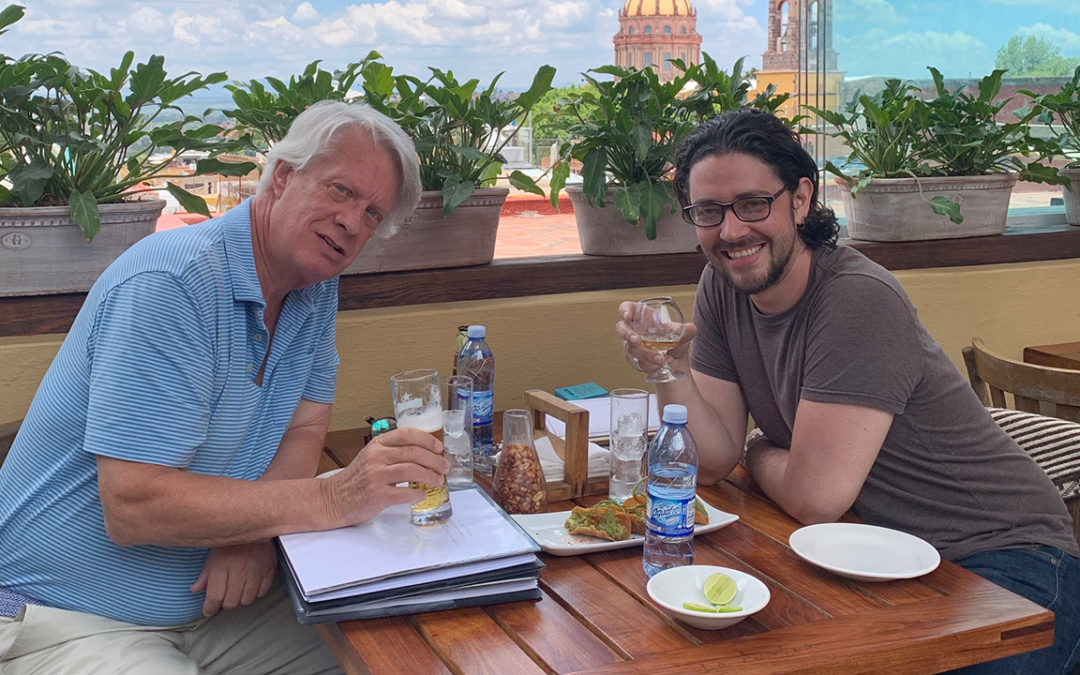
A Friend I Just Had to See
Last Friday afternoon I took the train to New York for the sole purpose of seeing Christian De Gré Cardenas for dinner. The following morning I took the train back home to Baltimore. The only reason for that trip was because he is a friend I just had to see.
It was also a very personal post-Covid-lockdown tip of the hat to celebrate my belief that change is a gift from God.
After my first career as a business trial lawyer I decided I wanted to enter the professional world of theater in New York City, if I could in my late 60s and early 70s.
The only way to get across a chasm so deep was to jump.
Because I was old and no one would read my scripts, I decided I had to take an alternate approach. I decided to use my background as a lawyer so I read all the legal contracts required to be a producer and I took a class in producing theater.
All the young future producers started to ask each other what they wanted to produce. When it came to me I would say: “Nothing. I want you to produce me.”
After I had taken an introductory class at the Commercial Theater Institute in New York, I got a chance to go to the O’Neill Conference in Waterford, Connecticut for an advanced class so I could meet the future big shots.
That trip was a life changer. I hit a gold mine. I met three people within 24 hours who would change my life forever and are my friends to this day: Christian De Gré Cárdenas, Sue Marinello, and Aaron Sanko.
Today I want to talk about Christian and how he has changed my life for the better.
We both got off the northbound train from NYC in Connecticut in the early evening. We were picked up by a van driven by Aaron Sanko, who transferred us to a small motel where we would stay during the conference.
Aaron and Christian knew each other from the New York theater world. I was the old guy in the backseat who didn’t know anything or anybody who had instantly become a groupie.
The next day, Christian and I would be in the same class with Sue Marinello, and we have been bound together with Aaron Sanko ever since. I will talk more about these, my collaborators and friends, as we approach the opening of Mind The Art Entertainment’s (MTAE) upcoming performances, which will be premiering in April, July, and November in New York.
When Christian and I got off the train we looked like two Willy Lomans walking on stage in Death of a Salesman. After we were delivered to the motel and were waiting to register, I decided to talk to Christian and asked him if he would like to go get a drink after we checked in. He never got a chance to answer because the night clerk interrupted to tell us: “Forget about it. Everything is closed.”
Sue Marinello and I sat next to each other at the conference, and she committed to reading my play Onaje. Shortly thereafter, Christian suggested we apply to the upcoming New York Fringe Festival.
After the remarkable success of Onaje, Christian offered me a chance to write Vox Populi, his final operetta in a series based on the seven deadly sins. I immediately accepted and we agreed to meet at a restaurant in Spanish Harlem next to his apartment, where we would sketch out the plot and talk about the tone and temperature of this comedic operetta.
We had the restaurant to ourselves and the waiters brought us food and mescal throughout the afternoon, until the restaurant was set up for the dinner crowd to come in. It was magic.
I went back to Baltimore and went to work at a feverish pace and completed a rhyming rollicking first draft that Christian liked. He invited me to go to San Miguel de Allende, Mexico, to marry the music to the words.
Each morning we would get up and go to a little breakfast place that had a wide open garden with a little pond, a beautiful flowered fence, and a balcony with tables for breakfast. We were often alone as we started our day of work.
During breakfast we would go page by page editing the draft, and in the afternoon Christian went to work writing the music while I made changes to the script. Later in the afternoon, Christian would play back the music he had created. In the evening we went to magnificent restaurants in San Miguel and drank more mescal.
Around the plaza and the magnificent church, mariachi bands would sing for the locals, as well as the tourists, and we would walk the streets and listen for music coming from the rooftops. When Christian liked the sound overhead we would enter, go up the stairs, order another drink, and listen until we moved on to the next venue. It was magic.
When we got home at night Christian would go back to work, and in the morning, before we went to breakfast, he would play back what he had composed the night before.
This routine went on for well over a week and somewhere during that time we became brothers in creativity and laughter, and deep friends.
It is amazing how we all step in and out of unique worlds as we change careers or grow older. In my case, as my second career evolved and as I grew older, I stepped into an amazing world of people and experiences that have made me richer and more fortunate.
Unlike any profession I know of, the theater welcomes humanity into an opportunity for friendship in a way somehow the world cannot achieve.
During our dinner in New York last Friday, we were talking about something but I can’t remember what. I just remember Christian looking up straight into my eyes in a moment of surprise and saying: “Do you realize I am exactly half your age?”

Sometimes Misfortune Is Quite a Gift
Over five years ago at the suggestion of a theater producer I started this blog. The idea was to build an audience by writing about my efforts to become a playwright as a second career after others my age had surrendered to golf.
In October of 2018 I got off to a good start with great reviews for Onaje at FringeNYC, but then in March of 2020 Covid shut the NYC theaters and I have been forced to report on other subjects as I have waited for the theaters to reopen.
But something wonderful has happened because of this misfortune. It has become another wonderful wake up call.
Two days ago, I found out that my friend Krzysztof saved a family last week at the Ukraine border of Poland.
Over ten years ago, I met Krzysztof at a Harvard Alumni Association gathering in Berlin. He was sitting in the hotel bar waiting for our bus to take us to a reception. I think it was the first alumni meeting he had ever attended. He didn’t know it, but I would be his friend before he was mine.
He stood out because he had all the crimson alumni materials and had decorated himself with a Polish flag as he held a drink in one hand and smoked a European cigarette with the other. I joined him, and to start a conversation I asked him what had brought him to Harvard.
He told me that after high school in Poland he had traveled as an immigrant to New York and was working in a Polish deli when a Harvard business school graduate came in to buy a sandwich and was talking about how wonderful Harvard business school had been for her.
Krzysztof had been enchanted by what he had heard but buried the idea as an impossible dream. Still, he did decide to go up to Boston and crossed the bridge over the Charles River to at least look at the Business School. He made up his mind, he said, and to memorialize his commitment he dropped a coin into the river from the bridge before he took the train back to NYC.
Krzysztof has a mischievous sense of humor and is one of the most gregarious fun- loving and generous people I have ever met but under that levity he is Incredibly determined.
He decided to try to get into College in New York and after he did well,while still working and, after he graduated, he applied to the Business School. He got in. Loved it and returned to Poland and had a very lucrative business career.
We rode the bus together to the reception and continue talking side-by-side during dinner. We were not friends yet.
After his success in Poland he decided to bring young Polish students to Harvard and other great American universities in order that his countrymen and women could experience the joy and opportunities he had received from his own experience.
Since then, he has been remarkably successful over the last decade. He has set up scholarships, written introductions, encouraged highly talented Polish students to apply, and encouraged America’s best universities to accept them. He has succeeded in bringing hundreds of these students to study in our country.
But that is not the reason I became his friend. Later that night we drank vodka and he introduced me to the joy of pigs’ feet. After the pigs’ feet and more vodka I happened to think it was a good idea to agree that whomever’s daughter was married first the other of us would attend the wedding. It was pretty late at night.
My daughter married years ago and he received an invitation from me. According to my daughter, he was the life of the party, and I’m sure he was because I had gone home well before that party ended.
My daughter remembered him well, and last week she asked me if she could contact him to ask his advice on how she could help a friend of hers and her husband and their two small children who were in Ukraine, who were walking to the border of Poland.
Krzysztof immediately responded and committed to bringing the family across the border himself, finding them, getting them a hotel room, as well as medical treatment for their young daughter, who had become very sick as they had walked to Poland, all at his expense. I’m never 100 percent sure but I’m sort of convinced that along with his profound kindness it is his mischievous side that ignites his generosity.
Krzysztof was true to form because be was Krzysztof.
The thing I often tend to forget is, in a world of constant tragedy there are people who, for no reason other than what they find in their souls, are kind to one another. They are better than I am. But I am nurtured by them as true friends.
When I heard the story about Krzysztof I was pondering what to write about this week. It occurred to me that Krzysztof is like the friends with whom I have been reacquainted, or new friends I have yet to meet, as this blog has gone off track. All these hardships have brought us together in an odd existential way.
It is wonderful when things go off track in order to get us back on track. It occurs to me now, I’m not really all that sure Krzysztof has a daughter.

Democracy in Ukraine
The delicate interdependence that is nature also protects democracies. But it is difficult to recreate once eradicated.
The Heron
A tall shadow controls my autumn pond.
It moves on long legs and will stare and wait.
After the late March ice had come and gone
And the exchanged songs of the frogs that mate,
The lily pads rise through the clear water
To shelter the colonies of black tadpoles
That are born as eggs, like pupiled eyes, pure,
And, like the rest here, uncompromising souls.
The summer heat reveals the baby fish
Spawned by the survivors of last winter.
By August it is like my winter wish:
Blooming like some Eden, ready to enter.
The heron knows nothing of what I mean.
By noon it will have picked the pond all clean.
“Week 38” from An Accidental Diary
(Available now on Amazon in paperback and Kindle.)

Once upon a Time I Had the Darwin Award Snatched from My Grasp
Last week, I posted about my first parachute jump with my wonderful and crazy lost friend Haven.
But here is the rest of the story…
About ten years after my jumps with Haven, I told the story during lunch at the law firm where I worked.
As I finished, a few members of the staff and two associates unexpectedly got up and left. They came back about 10 minutes later with an announcement.
There was a parachute place on the Eastern shore of Maryland just across the Bay Bridge, about two hours away and, if I wasn’t a coward or just a B.S. storyteller, they would go next Saturday with me. But only if I would do the first jump.
That night, my wife just shook her head, looked at me in disbelief and said, “At least you don’t have any children.”
Because of my luncheon bravado, I was now a fool following myself down a path I did not want to follow… but it got worse.
The following Saturday, eight of us piled into two cars and drove down to “Parachutes Are Fun,” which looked a lot different than the professional business in Massachusetts where I first jumped.
Parachutes Are Fun featured one single engine plane with all the seats removed except for the pilot’s, a barn, and a school bus that had no tires and was up on cinder blocks.
As if launched from the bus, an overly excited prematurely-aged young man with wild blond hair and dilated pupils approached us. He looked like a stunt double for the old guy in “Back to the Future.” He held a helmet in one hand and a lit cigarette in the other and couldn’t stop welcoming us even before we got out of the car.
At the same time, the owner came out of the barn, dressed in a bombardier’s jacket with Parachutes Are Fun stenciled on the back, carrying a walkie-talkie. Behind him was as an assistant leading four people with parachutes on their backs to the little plane as a pilot in blue jeans, a baseball hat and sneakers was entering the cockpit of the plane.
This was way too informal! This was not good.
It was too late to change directions and forever be the coward who turned around and for once in his life had been responsible.
We were divided into two groups of four based solely on the car in which we came, and I was volunteered to be in the group that would jump first.
The character from the bus enthusiastically showed us how he packed the parachutes and couldn’t stop promoting as he did. He was excited to tell us he lived in the bus and loved his job so much that he took his raises and bonuses in free jumps.
Our new friend who lived in the bus took off with every plane and was responsible for everything from our chutes being packed properly to cursory instructions about the emergency chute if the primary shoot “perhaps” didn’t open, as well as coordinating the open door jumps from the plane that had taken off as we had entered.
As the plane circled overhead, the owner turned on his walkie-talkie and watched as the first diver spreadeagled at about 2,500 feet above us . The chute opened and the owner barked into the walkie -talkie, “Pull your left toggle”… “Reach up and PULL YOUR LEFT TOGGLE,” and then turned to the assistant and yelled, “That son of a bitch loaded them in in the wrong order again, dammit! I’m talking to somebody who hasn’t jumped yet!”
The clueless diver was drifting, arms at his side, downwind at a high rate of speed toward northern Virginia.
The owner shoved his hand into his pocket, threw a set of car keys to the assistant and told him, “follow the bastard and pick him up where he lands!” Three jumps later, the plane taxied down the dirt road runway to the barn to reload as the jumpers landed helter-skelter in the surrounding soybean fields.
I concluded this chaos was all a very good sign.
I had strategically decided to show no fear and thus as the others saw the disorder around them, the fear would gather in them and they would decide to go home. But when I finally decided to make eye contact in preparation for supporting their decision, I was shocked to find that they didn’t have a clue because they thought all this was normal.
Before I knew it, I was on the plane sitting on the floor next to the open door as we took off. It didn’t help me to feel any better that I could hear the guy with the walkie-talkie in communication with the assistant as he tried to follow a parachute in his car, zigzagging through highways and byways while trying to keep his eye on a disappearing spot in the sky. I considered the children and family I would never have.
I am vain enough to not ride roller coasters because I don’t want that as the cause of death in my obituary. As we rose higher and higher in the sky and waited to jump, I decided I wanted to be remembered, if at all, as the fearless, selfless, courageous parachutist who had advised the other three jumpers who would jump after him that if by some chance the walkie-talkie failed they could pull the toggles to face the wind in order to drop slowly straight down rather than have their backs to the wind and end up dead in some unfamiliar state.
The following week, late one afternoon, two of the people who had jumped with me came into my office laughing and holding The Evening Sun.
They had five copies open to a series of pictures and a headline that read, “Eastern Shore’s ‘Parachutes Are Fun’ Shut Down as America’s Most Dangerous!” There were several pictures of skydivers stranded on rooftops or hanging from high tension wires, as well as a beaming portrait of our friend who had just been evicted from the bus.
Slowly, as I reach maturity and a belief in evolution, I thank God for my children and grandchildren and that their mother’s DNA has prevailed.
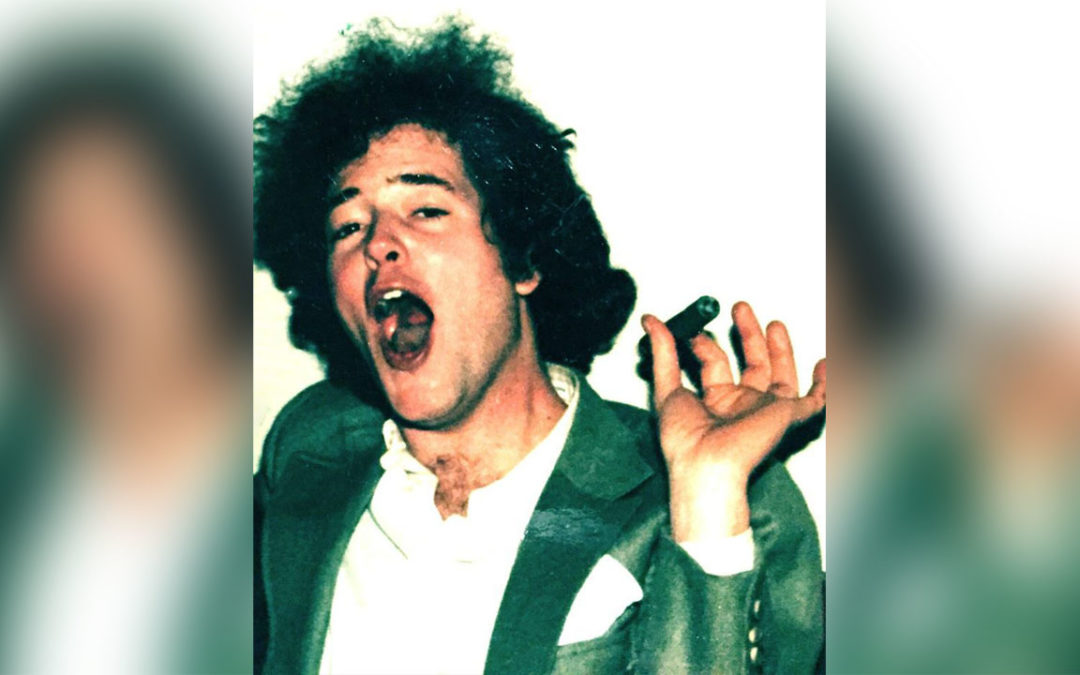
More and More These Days I Find Myself Waiting for the Answering Machine
When I was a kid people didn’t die, they just became invisible and didn’t answer the phone.
One of those disappearances for me was my friend Haven Story. He’s a little different, though, because after a couple of decades, I still believe he lost his phone and will return my calls when he finds it.
This scenario was always more likely because he appeared to be indestructible, like he had been gifted with nine lives.
You pretty much could always count on updates about him getting to you before he did. I heard one time when he was in New York City, he hitched a ride with the trash truck to get to his next party.
One night in the late ’60s or early ’70s, we were at a party that was wrapping up somewhere around three or four in the morning when he made a troubling but carefully considered announcement:
“I think we have run out of thrills!”
He looked around and put his smoking cigar into an empty beer bottle as he reached for a phonebook.
“But I have an idea! We’ve got to go skydiving — right now!”
About an hour away in Orange, Massachusetts, there was a skydiving operation that would open for the day somewhere around 10 o’clock in the morning.
Without hesitation, we piled into the car, drove into the night, parked in the parking lot, and slept for a few hours. We were there when it opened.
There were four of us who sat in the classroom as they explained what we would do and what would happen. The instructor laid out a parachute and packed it so it would open when the ripcord was pulled. We were also given an emergency parachute which we were told we should “punch, pull and flap like a towel to catch the air as we were falling.”
Haven was always animated in whatever he was doing. He had an endless sense of humor as he engaged with the world. He used his hands to express the enormity of his thoughts.
Wide-eyed with excitement, he was ready to jump. He wanted to be at the head of the line and first to jump as we entered the plane.
The plane was a big cargo transport plane with enough room for about 20 jumpers. We sat on benches with our ripcords buckled to the plane above our heads.
Our target was a huge sandbox 3,000 feet below. After calculating the wind speed, the plane circled so that when we jumped the wind would generally take us in the direction of the sandbox. Then we were instructed: “Jump now!”
The instructor was on the ground with a walkie-talkie. He could give us instructions after the chute opened so that we could guide ourselves with his help to our “tuck and roll,” which minimized the impact of our landing.
Haven went first out the door with an unabashed scream of joy into the free fall until his shoot opened and he reached up to the toggles to navigate his way down.
I, a little more reluctantly, jumped next and fell into the tumult of wind until my chute opened, I reached up and grabbed my toggles, and found myself involuntarily swinging my feet far above the ground, observing the earth and its fields, rooftops, and intersecting highways before focusing on the upcoming sand landing.
It was an overwhelming moment. A mix of fear and exhilaration.
I saw Haven land and tuck and roll and stand up immediately and start jumping up and down as I stretched my feet out and prepared to land.
Haven ran to meet me with his chute dragging behind him. His eyes wide his arms flailing around him. He grabbed me and said “Let’s do it again! Let’s do it again! Woooooooooow! Let’s do it again!”
We really couldn’t say no. The four of us jumped three more times that day.
I miss Haven.
I think I’ll try him on the phone one more time.

The Show Must Go On
About a week ago, I could take COVID-19 and its variants no longer. I couldn’t do Netflix anymore. I needed community.
A long time ago, I decided that what makes theater a community — and Netflix not — is the interactive energy of a live audience. But I had a problem now.
If I were to go to live theater now, I would be breaking a promise that I had made to myself almost two years ago.
It was during our final table read of The Grace of God & Man Machine. I had paid no attention to talk of some virus in China. Mind The Art Entertainment had committed to produce my play and soon we would be opening off-Broadway.
That night I bought a steak, a glass of wine, and a single ticket to see Hadestown on Broadway in front of a sold-out audience. Hadestown would provide me that same energy that I would soon be part of when my play would go live off-Broadway.
I was beyond happy.
The next day as I took a train back to Baltimore, I realized something terrible was happening. Pretty soon thereafter, theaters started to close and slowly an unconscious darkness opened in me.
My hope of a second life as a playwright, which I had dreamed of even as a boy, so unfairly started to drift away, week after week and then month after month. But more horrible was the loss of not being a part of live theater.
I made the promise, and over the months I hardened my resolve, that I would not go to the theater until I could be part of that collective energy. I refused to settle for some anemic second-best with half-empty seats.
So why did I nonetheless decide last Wednesday, February 9th, to go to a new play: Behold, A Negress by Jacquline E. Lawton, at Everyman Theatre in Baltimore? Why was I breaking my promise when the theaters were not fully open?
What was it, really, that I so desperately missed?
I chose to go to Everyman Theater because it always has been a theater bustling with people and when the lights went down every seat was always filled with a loyal subscription audience. I had been going there for opening nights for over 30 years. I could count on them. Somehow, they could always seem to deliver that energy.
The day before the performance I received a phone call reminding me that I must bring evidence of my COVID vacations and booster and wear a mask the entire time I was in the theater. I confirmed that I had gotten all the vaccinations and would be wearing a mask.
It seemed to foreshadow my disappointment and to add salt to the wound.
When I entered, I had my mask on and my vaccination records ready. An assistant at the door checked off my name.
I noticed the list was not extensive.
As I entered the lobby it was strangely quiet. There was no familiar group of chatting people lining up for a glass of wine before the performance.
When I entered the theater, even after social distancing there were a lot of empty seats.
I looked around and there was a pit in my stomach. This wasn’t going to work.
Before every theater performance, I have a ritual. I observe the set and the stage and try to imagine how different it will be when I look back at it after the play is over and the actors are taking their bows.
I looked at the set and then gave it a second look. I was intrigued by how perfectly it had been designed and how beautiful the high ceilings and colors were in a post-revolutionary Paris drawing room and how carefully an artist’s easel had been displayed upstage center.
The set alone had caught my attention. It felt good. I had inadvertently crossed the threshold and now I did not want to be disappointed.
The lights went down. The music picked up and the play began.
The first of the two lead characters enters in a stunning dress and without a word, in a minute, establishes her character though action alone. The second lead enters, also in a stunning period piece costume, to establish her character and the framework of the play with minimum exposition. I was hooked.
Artfully, everything was in place.
I will give nothing away other than it was a 90-minute play with two principal actors and one supporting character. The two leads reveal a multifaceted relationship through many artful twists and turns and even briefly use dance to create the excitement of creating a portrait to change the political mind of Paris.
The play itself is about the character it takes to risk one’s self and one’s art form to save the moral authority of a culture.
Wasn’t that what this theater was actually doing by performing this play at all?
Slowly, something wonderful and unexpected rose up in me as I looked back at that stage as the actors took their bows before a small but very enthusiastic standing ovation.
It was pride, and then deep respect for this theater that would protect its patrons but also not compromise the quality of any aspect of a magnificent production, despite the cost.
It was that but there was also something else.
What was this unique little community?
The actors playing the roles, the director and tech professionals creating the atmosphere, and the willing suspension of disbelief and presence of the audience?
Then I laughed.
No other community would have a catchphrase as its answer: “The show must go on.”
I had foolishly demanded the fiction of perfection and had missed the perfection of the thing itself.
I left laughing and looking forward to rejoining this little community of feral souls who create, with a live audience, the sustaining vision for its larger community, by example.
November 22, 2022–December 20, 2022 at Theater Row, 410 42d street NYC, The Grace of God & The Mind Machine will finally open.

The Cognitive Life of a “Magic 8 Ball”
Sometimes my subconscious rises out of its darkness to address questions I would prefer to avoid as I try to weave my past into the history I prefer to believe.
I generally succeed in avoiding these intrusions by being more focused on some other project.
My subconscious tends to work like the “Magic 8 Ball” of my childhood. When confronted with a question and tipped upright, its answer will float up to its little glass window.
Almost 20 years ago, if I had asked it: “Will I be divorced in four years?” its answer could have been: “As I see it, yes” and I would have laughed at the absurdity of that answer and asked another question like: “But don’t I love my family?” And its answer could have been “Yes definitely.”
Almost 20 years ago, I wrote a sonnet a week for a year in my effort to master the sonnet form. For 52 consecutive weeks, I paid little attention to anything other than my desire to get the rhyme scheme right (abab/cdcd/efef/gg) in 14 lines of roughly iambic pentameter.
My mind was driving the school bus.
My subconscious went to the playground.
A few years ago, after I finally committed to being a professional writer, I went back to look at the sonnets and thought of them as individual weekly efforts. But then last year I reread all 52 from beginning to end at one sitting and discovered something very different.
The 50th sonnet, the third to the last one, stopped me in my tracks. It was a memory about how my first wife and I fell in love as we walked to work. It is a beautiful love poem but ends with odd and troubling lines:
…How could this love go wrong?
Our lives are drawn to a collective center.
The buildings are the highest when we enter.
When I wrote those lines, we had been married for over 20 years, but four years later our marriage would end — to a large extent because we had been drawn apart by our ever-increasing professional workloads.
We lost the very real love we had when we first married and for years after.
Why?
“The buildings are the highest when we enter.”
It answered the question: “How could this love go wrong?”
It was all in there, but I had been working on some other project instead of us.
I second-guessed my conclusion, but I immediately started from the beginning and reread all 52 chronologically again.
All of a sudden #50 was not just a single love poem that recognized the hidden demise of love and marriage. All of the sonnets had loosely related overlapping themes, but they were also independent observations all from the same universe.
They were little standalone vignettes. Little stories floating to the surface, from skinny-dipping advice to scuba diving with sharks to giving up smoking.
This was the subconscious playing in the playground.
What intrigued me most about this discovery was that while the objective mind had been obsessed about form and order and had been locked into that project, I was quite unknowingly having a different conversation that I was denying, with my unruly and more interesting subconscious.
“An Accidental Diary” is a very different kind of book because it is a story told in 52 perfect independent little chapters that are less than one page long. A reader is free to connect the dots or to read each sonnet separately as a world unto itself.
And hey! What a deal!
You get your money’s worth when you buy it. It is both the Magic 8 Ball and the questioner as two different books all rolled up into one.
You can buy it for Kindle or get the paperback within five days. Any purchase permits you to provide a review on Amazon if you are so inclined.
https://www.amazon.com/Accidental-Diary-sonnet-week-year/dp/B09NGXSVM5/
Will you enjoy this book? “It is certain.”
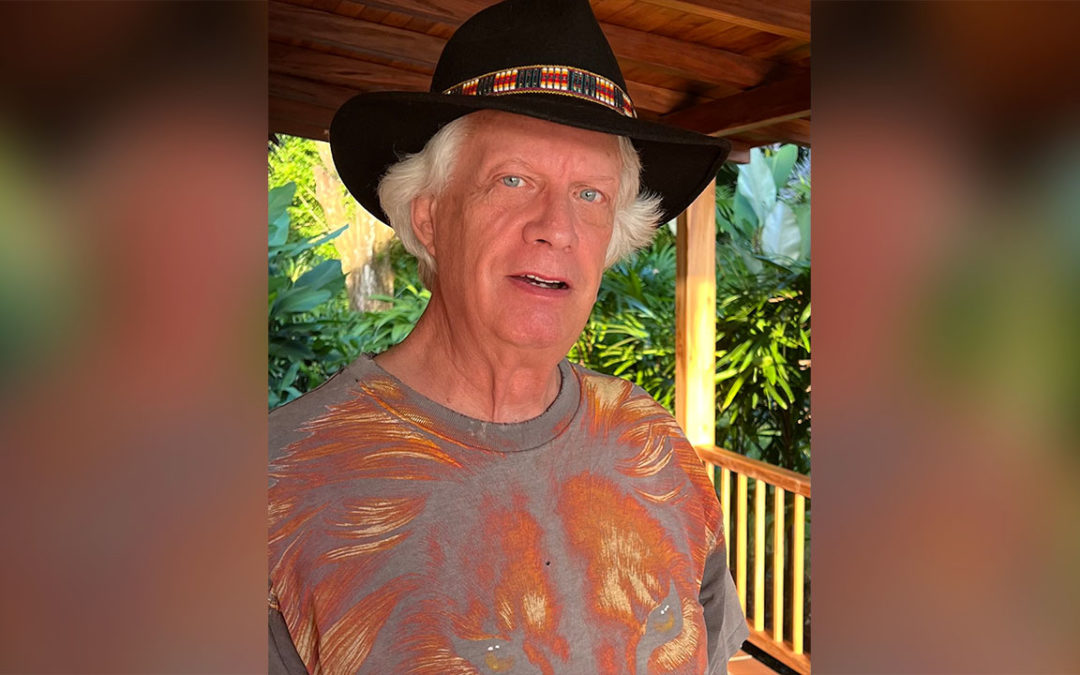
Searching for Raphael – Part Two
For the last two weeks, I have posted about a trip I took 35 years ago to Drake Bay along the uninhabited rainforests of southwestern Costa Rica. I had met a young boy, Raphael, who took me scuba diving and fishing for little over a week while I stayed at an isolated lodge I had found down there. On the last day, I told him he could go anywhere he wanted and I would go with him.
He jumped at the chance to go way out into the Pacific to fish for the giant pargo in a tiny Boston whaler. It was the most frightened I have ever been.
Last week, during a trip to Bosque del Cabo, two hours south of Drake Bay, I committed to seeing if I could find Raphael. The driver who picked us up at the little airport at Puerto Jiménez agreed to take Susan and I up the coast through the rainforest if I could first locate Raphael.
Within two days, the assistant at the lodge had found a lead that Raphael, who would be around 55 years old now, had helped to build one or more of the new lodges that now populate Drake Bay. The assistant made phone calls and emailed these new lodges over the next few days, but we were still not able to locate him
With only three days to go, I booked an offshore fishing trip out of Puerto Jiménez to make my own inquiries about Raphael, and to determine how far we really had gone out to sea before we lost sight of land that day and night.
We left around 7 o’clock from Puerto Jiménez in a covered boat about three times the size of the Boston whaler Raphael had used. The captain was about 35 and his mate was about the same age as Raphael was when we went out to sea years ago.
There was only one other boat going out that morning. The two were in radio contact in search of tuna and sailfish throughout the morning. We watched for the gathering of birds diving into the ocean, feeding off squid or schools of fish driven to the surface by the dolphins. These schools would bring the tuna and sailfish, which we wanted to catch.
It was a beautiful day. The cumulonimbus clouds climbed into the sky over the shoreline as we traveled out on a slow rolling tide. Around 11:30, we hooked an 80-pound yellowfin tuna which took about 25 minutes to land.
The shoreline was still visible at 10 miles out. I asked about Raphael, but the captain didn’t really know anyone all that well as far north as Drake Bay.
Before we left, I had asked the resort owner’s assistant to keep trying to locate Raphael. My time was running out. I had only one more day before we had to leave at 5:15 in the morning to get on the only plane leaving Puerto Jiménez for San Jose, take the mandatory COVID test at 8:00 to ensure we could return home on our Delta flight at 2:30 that afternoon.
As we arrived at the dock to meet our ride back to the lodge, I unexpectedly saw the assistant was also at the dock. After we loaded the tuna into the back of the truck, the assistant was strangely quiet as she rode in the passenger seat next to the driver. From the backseat I asked if she had been able to set up our meeting at Drake Bay. She paused, turned her face toward me, and winced as she looked back at me. “He is dead.”
After the long and bumpy ride back to the lodge, I asked Susan wouldn’t it be easy just to lie about that?
I decided that I would pay our bill early, rather than before our exit the following morning. I wanted some time with the assistant so that I could cross examine her indirectly about the seriousness of her inquiries.
When we met, she went very carefully over the bill and the tips we had designated for the staff. She meticulously double checked the math in a way that sadly made me realize how careful and professional she was.
I asked her about what her most recent research had revealed and she confirmed the care that she had put into trying to find Raphael. She pulled out her phone and played back the voicemail reply she had gotten from an old guide who had retired from her work in Drake Bay years ago. The assistant translated each sentence from Spanish into English as she played it back.
The caller explained she had been in the back of a taxi cab in San Jose several years ago with a driver who asked where she was from. When she said Drake Bay, the driver told her he had grown up there. He said his father was a carpenter who had built several buildings as they went up around Drake Bay, including the first lodge that had been constructed there in 1985. His father and mother were one of the first families to populate the southwestern stretch of the Pacific and rainforest around Drake Bay. His father’s name was Raphael.
I persisted and told the assistant I would be willing to meet the cabdriver at the Delta terminal in San Jose after my Covid test. I would feed him lunch and also give him about $100 in colóns as a friend of his father in the hopes that he would meet me.
She agreed to keep trying.
The next morning, we took the early morning flight, did the Covid test, and checked the bags, but I did not go through security at the international airport. I sat on the floor next to the Delta desk.
I waited and waited at the Delta terminal until there was no time left. I went through security and as I boarded the plane to leave, I gave my remaining Costa Rican currency to an unexpecting vendor and asked nothing in return.
It is so easy to lose people and so hard to find them.
Even if I had been successful, I’m sure his son would have pocketed the money and returned to his cab and his daily life.
Thirty-five years ago, there was something courageous and determined about Raphael’s refusal to cut the line and return to safety — and I had refused to stop him.
Looking out the plane window as we took off, I thought even when he is completely forgotten he will be safe and respected in my memory.

In Search of a Lost Friend
Last week, as I anticipated our visit this week to the southwestern Costa Rican rainforests, I posted about a fishing trip that I had taken from a solitary lodge down there over 35 years ago with a guide named Raphael.
We had become friends back then because we took risks and, on the day before I left, shared an incredible, terrifying adventure. We went way out into the Pacific and into the night in a little Boston Whaler and almost didn’t find our way back.
But people get lost when you return to civilization and you get sucked back into the day-to-day and the years compound.
A friend responded to the post suggested I try to find Raphael on this trip. I decided to try to find Raphael if I could. It was a real long shot. All I had was his first name. Would he still be there? Would he even remember me? Was he even alive? Basque del Cabo, the wonderful place where Susan and I are staying, is about two hours south of Drake’s Bay where I met Raphael.
Yesterday, we flew south from San Jose to the little air strip at Puerto Jimenez and were picked up by a four-wheel drive Jeep to go further south to our destination.
Could I even find a way to get to Drake’s Bay if I found him?
On the ride, I recited my story of my trip thirty-five years ago to our driver and asked if there was any chance we could locate Raphael after all these years. The idea piqued his interest and he volunteered to get me to Drake Bay if we could locate Raphael.
When we arrived at the lodge, I told my story again to the owner and he also was intrigued and immediately called on his assistant to see what she could find.
After some preliminary research, they told me what I expected. The expat who owned the place I had stayed in at Drake’s Bay had died and the place had been sold but was still around. Over the last thirty-five years, a few other lodges were constructed on Drake’s Bay. Perhaps Raphael had stayed to helped build them and was still around.
Yesterday after breakfast, I was told they thought that they had found Raphael but were waiting for confirmation. If they have the right Raphael, he worked as a carpenter to help build the new properties. He was about 55 years old, but they had not determined if he was still living down near the bay. They said this man had a son who was a cab driver in San Jose. Perhaps he had moved up there.
Before we left Maryland, I had asked myself how could we recognize each other and it occurred to me that I had saved the raggedy old lion shirt in which I had fished and scuba-dived and pretty much lived in down there. I photographed it and packed it just in case I thought I found him.
I’ve got a driver and my old shirt ready and a lead which seems promising.
It is so easy to lose people and so hard to find them.
I should know in a day or so.
I will report the end of the story in next week’s blog, when Susan and have returned to our snowy, below-freezing home in Monkton.
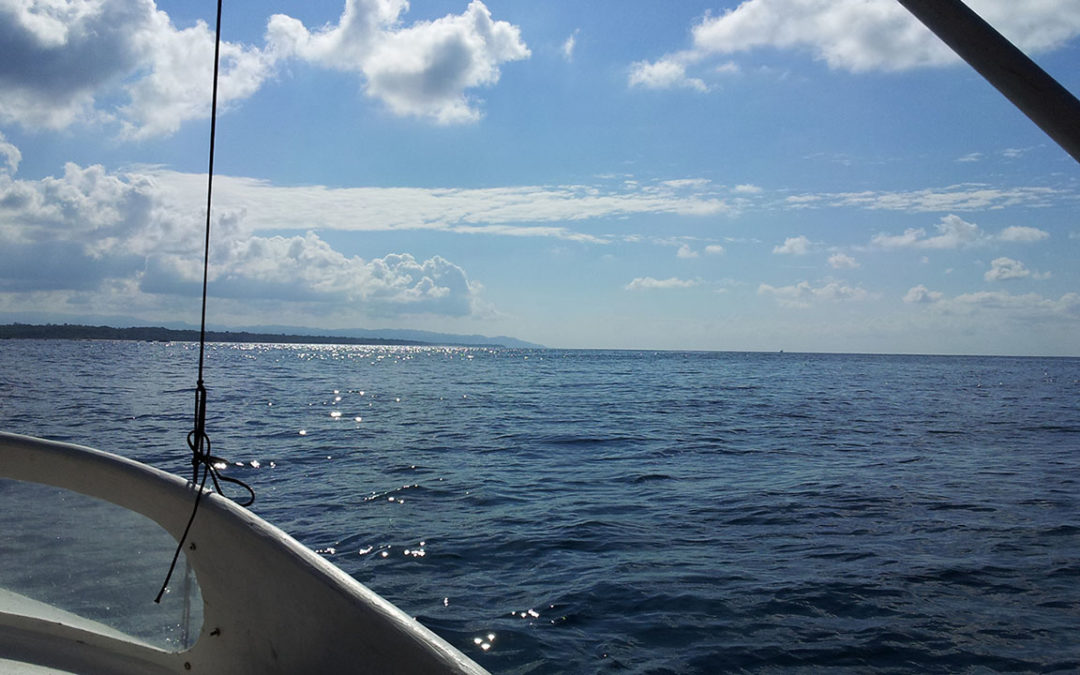
How the Definition of Courage Changes
As a young man my heroes proved their courage by welcoming and taking on great risk. I am amazed at how my heroes have changed over time.
In a few days, Susan and I will fly to the Osa Peninsula and the rainforest of southwestern Costa Rica. This will be the first trip there for Susan, but for me it will be a reunion with a place where I experienced real fear for the first time in my life.
In the late 1980s, I decided to go to Costa Rica to find the deepest rainforest I could find. I wanted an adventure and to be left alone.
I flew to San Jose, spent the night and got a little plane to fly me to a grass runway to be transported by a crazy American expat in his little boat to go down a muddy river to the Pacific and then south along the virgin jungle coastline to a remote lodge he had put together in the Corcovado rain forest.
The place was run by a small family for the expat. I knew I was in for a great adventure because the expat had a huge untrimmed beard and claimed he had a wife in Texas and a wife in Costa Rica and immediately told me, quite confidentiality, that he was an operative for the CIA. He had some issues. The place was empty except for me during the entire week I was there.
That is where I met Raphael, the teenage son of the farming family that managed the place when it was not the rainy season. He was assigned to take me fishing and scuba diving in a tiny Boston whaler.
Raphael had to pump the scuba tanks with a gas-powered compressor and catch our bait before we went out each morning to dive to find shark caves, fish offshore past Caño Island, or to go up the rivers to live within a world of howler monkeys that threw sticks at us from above and massive blue morpho butterflies and macaws that flew around us as we traveled into the rainforest.
Rafael did not like diving because he was afraid of sharks, which he claimed had killed a married couple the year before. I fashioned myself as a bit of a daredevil so I told him I was not afraid.
On my last day there, I told Raphael he could go wherever he wanted and I would go with him. Neither of us knew the other’s language but he told me he wanted to fish for giant pargo offshore out way past the island, where the drop off brought the big fish to feed in the current. All we had was light tackle. These fish can grow to as much as 40 pounds and tend to go deep and run. I’m pretty sure that Raphael did not share with his parents what we were going to do.
We packed extra water and cold beer and some sandwiches. He brought an extra tank of gas. We left in the late morning and easily caught several mackerel for bait. Rafael cut them in half and secured them on our hooks as we motored out into the Pacific. We went way out further than we had gone before. When I lost sight of land for the first time, I became a little afraid. After a while, Raphael switched the gas tanks.
I was at the bow of the boat and Raphael was back at the motor. We sat silently for several hours without a bite. As the sun started to go down, I wanted to go home. We had not seen land for a couple of hours by now. I became a little more afraid as we drifted with the current but I kept it to myself.
As the dark came, I waited and then looked back at him but his rod was bent over and when he looked back he grinned and said one word: “Grande!”
The fish was running deeper and deeper and heading further out into the Pacific. Now I was frightened, but told myself it could be I was just out of my element and I just should trust Raphael.
Raphael, on his unexpected day off, was too excited to give in to the fish. The stars started to come out and we kept being pulled out to sea. The night came, and Raphael kept reeling in the fish and then letting more line go out until there was no line left but his giant fish would not tire as it kept pulling us deeper and deeper into the dark.
The sea was calm and with the dark I had no sense of which direction the land was anymore. The moon rose in the night sky. There was a blanket of bright stars above us now and nothing but silence and the lapping of the gentle waves against the side of the boat until the line broke.
As we prepared to go, we threw the remaining mackerel overboard and the phosphorus all around lit up as our discarded bait was devoured by surface fish.
Raphael pulled the cord to start the boat but it wouldn’t start. He tried and tried again but the motor would not start. We had already used the extra tank of gas to get us out there. We were drifting in the dark with the stars above us as we were taken by the tide.
I said nothing. I was deeply afraid, but was I wrong to be? I didn’t think so.
Raphael tried and tried again until finally there was a sputtering and the engine died and then when Raphael tried again it started. He cautiously revved the engine several times and after examining the stars he then turned the boat and headed toward what I hoped was home.
Despite it all, it was stunningly beautiful. As we skimmed across the water for more than an hour, we lit up the phosphorus around us. Dolphins joined us on both sides of the boat with the glowing phosphorus trailing behind us as we careened over the water with the stars stretched over our heads.
Raphael kept checking the stars.
I was certain we were lost but Raphael refused to show fear. Was I overreacting? Finally, a dim light appeared in a shadow that must be the edge of the rain forest. The lights of the little lodge were all on and there were flashlights coming from the little dock.
As we got closer, I could see several people standing silently on the dock holding the flashlights and pointing them out at the sea. We had no running lights so it appeared they were guiding us into them. We slowed the boat and pulled up to the little ladder.
I felt foolish that I had been so afraid and accepted the hands offered to me as I climbed the ladder and stood on the dock.
Raphael tied up the boat and when he climbed the ladder his mother greeted him and slapped him harder than I’ve ever seen anybody hit before in my life. His family had been waiting ever since the sun went down. I was later told it had been hours of uncertainty.
When I visit Costa Rica this time I am sure that the virgin rainforest will have other lodges now but I have also changed. My heroes now are common people as they almost invisibly care for others.
I have come to understand better now the fear that boy’s mother felt as she waited on the dock in the night and shined her flashlight out at the sea.

The Christmas I Realized
I believe in those little miracles that go unnoticed unless you choose to recognize them.
This is about one of those little miracles.
Like many people this year, our Christmas was canceled when my wife Susan and I realized we had COVID. Our children and grandchildren and friends could not be put at risk.
I was unspeakably sad as I sat in a silent house surrounded by wrapped Christmas gifts that would remain unopened and visible for the rest of the day.
We survived. We went out to the driveway masked to deliver Christmas gifts to Susan’s children and their girlfriends, who are thankfully local. After New Year’s when our quarantine was over, we were fortunate to have my son visit with his girlfriend, which was wonderful. We will be driving gifts up to Connecticut to my daughter and her husband and my granddaughter in about a week. We survived.
But then one of those little miracles happened.
January 6th is the 12th day of Christmas which traditionally marks the end of that holiday’s celebrations. This year, that day also marked the one-year anniversary of the assault on the Capitol.
But it is also the birthday of a lifelong friend I met in law school over 40 years ago. He is now seriously disabled and not easily able to leave his house. Because of COVID, he was also unable to invite his family and friends to his home to celebrate Christmas or his 70th birthday. But his children and their loved ones spontaneously organized a surprise Zoom call to wish him a happy birthday.
The gathering on Zoom included not only his law school friends but also friends of all ages, backgrounds, and political beliefs. It was huge.
It is hard to feel joy from a Zoom call, but in this case, it was palpable and undeniably warm and beautiful. At the center of it was a man who has transcended difficulties with tenacity and joy and has always lived a passionate life of kindness and commitment.
The next day, I called him so I could talk to him one-on-one. During that call, he told a story quite accidentally.
He owns a beautiful little house near Annapolis, which he can only stay in during the summer because it is too difficult for him to travel back and forth.
A week or so before his birthday, he had been asked by a teacher at a special school if he could perhaps open up his summer house to help a troubled middle school student regain her sense of security in a new environment after a difficult event in her life.
My friend didn’t think twice. He told the teacher to open the house and turn on the heat and use it for as long as it could be helpful.
As he told the story he offhandedly said, “That was the most beautiful present I got for Christmas or my birthday.”
For me, selfish and sad in a house empty during Christmas, this brought what Christmas is, in full force, back to me.
He had received nothing and given instantly from his heart.
After the call I hung up and was surprised to find myself crying.
On the last day of Christmas, my friend had reminded me what Christmas is supposed to be: a moment of reawakening and joy in a forever troubled world.
My friend had given me that gift.
It was one of those little miracles.
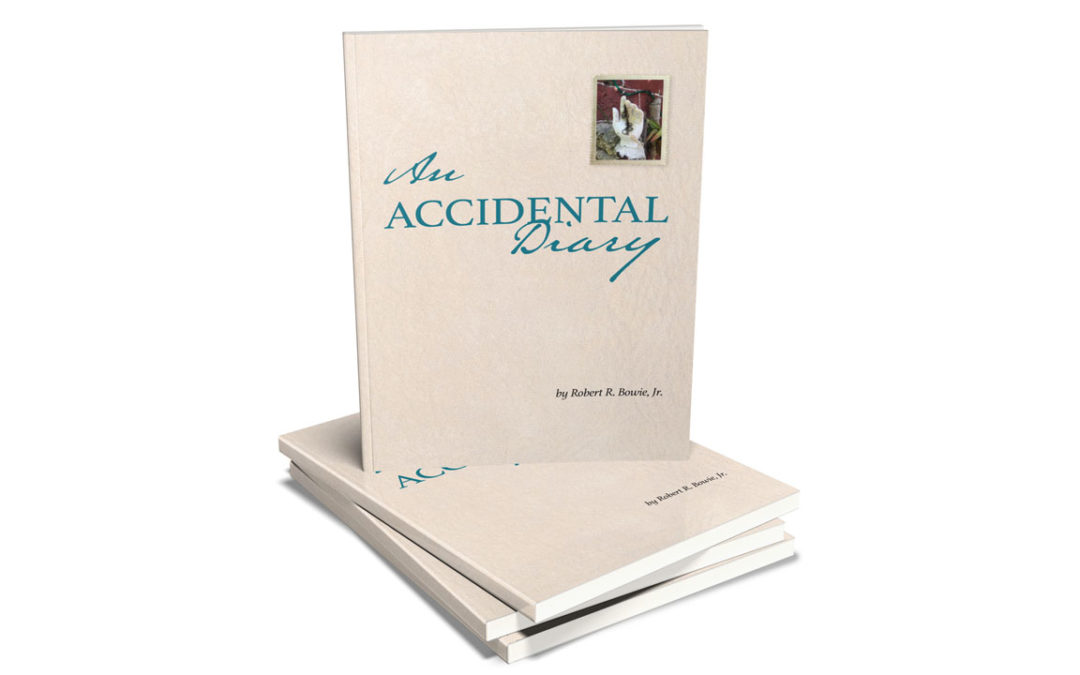
There Are so Many Ways to See What’s Different about the Same Thing
There are so many ways to see what’s different about the same thing.
The day after Christmas we got a light dusting of snow, but it was snow!
The same day I learned that my Amazon book, An Accidental Diary, was finally for sale in paperback and could be delivered by December 30th.
The hardback and Kindle have been on sale for two weeks but since Amazon prints the books they sell, the hardback wasn’t available for delivery until mid January. I couldn’t wait. I wanted to hold my book in my hands so I bought a copy.
It is amazing to learn how many different ways there are to see the same thing.
An Accidental Diary is a sonnet a week for a year, but the book wasn’t conceived of until almost 20 years later when I read each week’s entry sequentially and I discovered it really was a wild subconscious diary created over a year of transition.
It is really a game of hide and seek. It was what I had kept hidden from myself back then and what years later would happen: fond recollections and musings on loss, lust, love of family, my fear of dying alone, a sad divorce and, back then, even efforts to quit smoking.
It was drawn from a grab bag of everything in my life in order to meet a Sunday night deadline of a sonnet a week for a year. The book’s introduction defines the scope but the book does it best.
As I was waiting for my book delivery and thinking about what to write here today I looked out at the remaining snow and I wondered how this little collection of often humorous poems would introduce itself and I was amused at how the first sonnet does exactly that.
There are so many ways to see what’s different about the same thing:
City Snow
From a four o’clock sky the first snowflakes fall
To settle down on trafficked city streets.
Each snowflake falls separately, till all
Conspire to hide the city like a secret.
The last street lights go on, and the snow reflects
Upon the domiciliary landscape.
The more snow falls the less you really expect
The city to be what it’s supposed to be:
It becomes a beautiful blinking shape,
An image of slowing inactivity,
Slowing into snow drifts. It snows very late.
A pronouncement of peace subdues the city.
The drifting snow controls the city violence
With a voice made entirely of silence.
Here’s a link to get the book and give it a read if you are so inclined:
https://robertbowiejr.com/booklink/
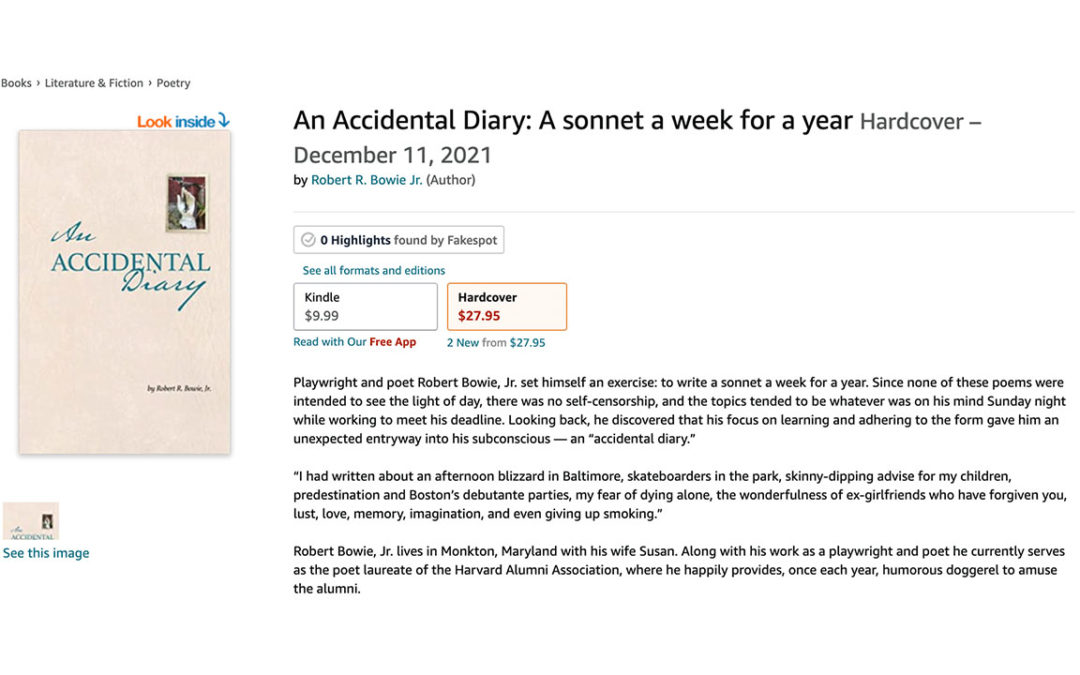
Happy Holidays and Thank You!
Almost a year ago I posted “Santa” as a single sonnet to celebrate the season and yesterday it became part of a book.
An Accidental Diary has been published!
Now Santa is 1/52th of “An Accidental Diary: A sonnet a week for a year.”
I am both surprised and extremely proud of my unusual book.
Yesterday, I got notice that the hardback and Kindle editions are now for sale on Amazon. The e-book version, I understand, can be read right away. The hardback is also available now, but will be delivered in January.
https://www.amazon.com/Accidental-Diary-sonnet-week-year/dp/B09NGXSVM5/
(If you’d like a personalized signed copy, reach out to me by email.)
As an old geezer I have no fear of repeating myself, so no matter what your religious beliefs may be, I offer you this my self mocking repeat, yet again to make you laugh and yet again to say thank you to each of you.
Santa
Like a massive multicolored parachute
His boxers have collapsed upon the floor
Slightly south of a wrinkled Santa suit
That was left just outside the bathroom door.
A bunch of imagined elves in repose,
Smokin’ cigarettes, feet on the table,
Hangin’ and laughin’ ’bout Rudolph’s nose
Are lovin’ life as only elves are able.
Another Christmas is, at long last, past
As the fat man shampoos in the shower
And thinks of golf and summer thoughts at last.
Who’s this metaphor for redemptive power?
An old fat guy driving a sled with gifts?
A father at midnight is what it is.

There Is Something Wonderful About Random Spontaneity!
I am learning to trust and believe in random spontaneity!
Although I have been blessed with many friends, since I have committed to writing full time I have been painfully aware that I have few friends who are poets with whom I could converse.
The stars aligned perfectly last week when something wonderful happened. And then things just kept getting randomly better and better…
I had just gotten five copies of the final draft of my first book of poems, An Accidental Diary, from Kerry Sharda, my wonderful book designer. All of a sudden, the prospect of publishing became very real for me. So last weekend I took action.
I booked an impromptu trip to Boston to get advice on the book from a friend and two professors I adore about publishing this first book of poems. I then quite unexpectedly got to meet two poets I had previously never met but greatly admire.
I also had been waiting throughout the pandemic to congratulate Belinda Rathbone on her new book,
George Rickey: A Life in Balance, about the life and work of the famous kinetic sculptor.
I called Belinda hoping to meet her and get her advice but she told me that she was on her way to Scotland. After I told her about my mission, she told me that I should meet Lloyd Schwartz and Gail Mazur, both frequently published and very well respected poets, both of whom were her friends.
I jumped at this unexpected opportunity. How could this be getting better and better? I had their books and decided to bring along the most recent books of new and selected work, Who’s On First by Schwartz and Land’s End by Mazur, in the hope I could get them autographed.
We agreed to meet at Harvest, a restaurant in Harvard Square. I decided to be early but recognized Lloyd from his book cover photographs as he entered the restaurant and said, “I figured that must’ve been you because you were carrying all those books.”
Shortly after we were seated, Gail joined us and we talked for over two-and-a-half hours. We had an amazing link: We had all known the poet Elizabeth Bishop. I had only been her student once but they knew her well and Lloyd had written his PhD thesis on her and was a scholar of her works.
In addition, during our conversation I revealed that Robert Pinsky’s translation of Dante’s Inferno was a favorite of mine and Gail and Lloyd both told me they knew him and that Gail’s late husband had done the remarkable artwork for that book.
After the lunch crowd had emptied out and we finally left, Gail offered to walkover to The Charles Hotel to show me some of her husband’s works that were prominently on display as complete panels on the walls. They were as amazing as the illustrations for Pinsky‘s Inferno.
This was a remarkable weekend for me because though I love my friends I have painfully few friends who are poets.
To be surrounded by these wonderful creators as we freely talked about overlapping themes was overwhelming for me. The two were longtime friends and both agreed that creativity requires interchange and friendship to nurture artistic endeavor.
We agreed to meet again when I next came to Boston. I felt welcome and included and re-dedicated to this, my new and ever exciting profession.
It was all a spontaneous accident, which I come to believe more and more is what art and life is.
I have so much more to do.

Happy Thanksgiving to All!
This is the time when we gather together and stop to appreciate each other, grateful for the friends we share and the bounty of the life we have. It is a shared life on this planet.
We are particularly thankful in beautiful Monkton, where we live, and very fortunate to occasionally have wild turkeys who gather to eat the spillover bounty from the bird feeders and to visit the gardens and fields of sunflowers to eat the seeds.
Especially for them, I guess, it’s a shared planet.
Happy Thanksgiving to everyone!

Chum in the Water
This is the story behind one of the sonnets in my upcoming book.
Sometimes you have to be far above a mistake before you acknowledge that you made it. In my case, it was flying from Belize and looking out the window more than 25 years ago.
The Blue Hole of Belize is a prehistoric giant crater which is over 400 feet deep and 43 miles out to sea from Belize City. From Ambergris Key, an offshore island east of Belize City, depending on weather conditions, it is about a 2 1/2 hour rough ride in a small Boston Whaler.
The Blue Hole was made famous by Jacques Cousteau in 1971 when he brought his ship The Calypso to the Blue Hole to chart its depth and explore its history.
Almost 30 years later, in the summer of 1997, an expedition of cave divers went in to document its underwater stalactite caves and search for its bottom depths.
Around this time, I went with several expert divers. We found it was pretty much empty of sea creatures and very cold as you descended ever deeper into it. We went down 150 feet to the nitrogen limits for 2 minutes. Our flashlights beams dimmed into the nothingness in that dark. If you looked up, far above us, the sky was like a distant open manhole cover and was our only meaningful light. After listening in the silence to our breathing for the two minutes, we ascended slowly with our bubbles to avoid nitrogen build up in our blood stream. It was very dark, cold, claustrophobic, and dangerous. Other divers had reported the same thing. After that dive I decided: “Well, been there, done that; never again.”
A few years later, when I was again in Belize to dive the outer islands, two Ambergris Key teenage brothers with a little Boston Whaler bet me a case of beer one night in a beachfront bar that if I went with them the following morning, it would be the most amazing dive I’d ever done. I refused and refused until I took the bet. This was a very stupid thing for me to have done.
In December 2018, 20 years later, two small submarines were sent to map the Blue Hole’s interior. At the bottom they discovered the bodies of two of the three divers who had gone missing while diving there over the years.
The Blue Hole in Belize
Was I the fool of this sinkhole of the sea
Or a pupil in this aqua ocean?
As I fly home it looks back at me
Without memory or emotion.
Three days ago, while taunting me, Miguel
Said: “You’ve dived it but not with me before.
I dive it deep. I dive it right to hell.”
He took my money but wouldn’t tell me more.
Off the boat, with Miguel still behind,
We checked our gear and descended into cold,
Deeper, darker, to fear of a different kind:
Sharks. Hundreds of them. Darting from the shadows.
At the boat Miguel offered a helping hand,
Laughing.” You understand? We chummed it man.”

Listen! Paul Revere Is Calling
Can you hear? Paul Revere is calling!
I have always believed that the genius of America is derived from the ability of its people, from all walks of life and differing backgrounds, to talk together and educated each other.
I am not alone on this.
In the 1830s, almost 50 years after America was founded, Alex de Tocqueville, a visiting French diplomat wrote: “The greatness of America lies not in being more enlightened than any other nation, but rather in her ability to repair her faults.”
The way America has “repair[ed] her faults” and ensured its greatness has been “we the people” talking together and educating each other, and with the collective credibility of our conversation we voice our conclusions with our votes.
The founding fathers universally opposed political parties.
They feared that political parties could act as intermediaries for the voice of the electorate. I would argue that the political parties have now evolved to protect only themselves.
Our elected representatives are heavily funded by the political parties and rewarded with better health and retirement benefits than those whom they represent. They vote in lockstep with the party interests.
Recently the political parties have divided us through gerrymandering, voter suppression, and by defining the issues of our conversation, and we are polarized.
The parties relentlessly continue to further increase their power and our polarization at our expense. Most recently, in 19 states they have limited our collective voice, which is the vote. The parties now just fight each other for dominance rather than represent their constituents.
The polarization of America threatens not only our greatness but now even our democracy.
We no longer talk to each other to repair America’s faults.
We the people are not the enemy. The Political parties are.
So what do we the people do?
First, we pass the deadlocked voting rights legislation presently pending in Congress, which would curtail gerrymandering and preserve every American’s right to vote.
Second, we must regain our obligation to share our collective conversation and educate each other from our differing experiences.
Sixty years ago, John F. Kennedy spoke to the nation and said “Ask not what your country can do for you. Ask what you can do for your country.”
What is asked of us now, other than to pay taxes, which we avoid as much as possible? That’s about it. With little or no responsibility to our county, we have become entitled, lazy, and self-centered.
The Second World War brought us together as we marshaled our resources to protect democracy and the free world against the fascist states of Germany, Italy, and Japan. These countries lost their freedom from the inside when they let totalitarianism take over. In contrast, the American people worked together side-by-side, talked together, and came out of that war as the most prosperous nation in the world up until now.
What if we each agreed to a universal commitment to serve the country for just one year to work together side by side, talking together and in so doing eradicate the political parties’ polarization which now separates us?
The 2022 election, one year away, will set in stone for ten years the gerrymandering and voter suppression which has been imposed on us. We the people must take our government back now or perhaps lose it forever to the power brokers that were once middleman and now are our kings. We are not their servants.
But that’s not all we have to do. We have to individually accept the responsibility to talk to those who are our perceived enemy and not lecture each other but listen and learn and become great again.
I have been blessed with critics of my points of view on this blog and on more than one occasion I have asked to meet them and buy them a beer. In each case, I have made a friend with a different political perspective, and an American friend at that.
We are not the enemy! We hold the genius of America in our hands if we will only embrace our responsibility and get rid of those who would make us slaves to their superiority and greed.
It is time to raise up before it is too late. It’s up to us to protect our democracy and our country.
Wake up! Paul Revere is calling.

A Halloween Ghost Story
This is a Halloween ghost story that may or may not be true. I’m not sure.
Since my post of a week ago and the coming of Halloween, I couldn’t get Eno English out of my head. After almost 60 years why did I remember his name?
A week ago, I wrote about this year’s Head of the Charles Regatta, and the beautiful clean water of the Charles River. This was in contrast to years ago when I was in ninth grade and the river was so dirty, we rowed past floating prophylactics and tin cans and even a floating pillow that turned over and was a dead body — later identified as Eno English.
It didn’t occur to me until last week, but I think I know where Eno might have come from.
I grew up in a little neighborhood called Coolidge Hill near the boat house and dock where Eno was found floating in the Charles. Coolidge Hill is located in between the Cambridge and Mount Auburn cemeteries and the little school I attended.
Mount Auburn cemetery was created in the 1831 to house the Cambridge aristocracy on 170 acres of high rolling land with little walks along majestic ponds surrounded by an impenetrably high black iron fence.
Mount Auburn Cemetery allowed no bikes or unsupervised children. I got my first bike, a fat wheeler, in middle school. I tried but could not get past the gate house on my bike, but I decided I would not be denied.
With my first bike I became an explorer. Like Columbus was determined to find the Orient, I decided I had to find a way into Mount Auburn Cemetery. I decided I would explore what I guessed might be the unguarded back fence near the Charles River.
Late one afternoon I left school and took my bike down past the boat house and proceeded upriver along the deserted overgrown roadless river bank for a quarter mile or so to find, much to my satisfaction, that there was some fence on the western boarder of the cemetery that had fallen with the eroding high bank. It must have given way with the rains and snow over the years and had slipped down onto a very small muddy plateau next to the Charles.
When I stopped to look I saw, to my surprise, a little path leading down to the river to the left, and several loose rolls of toilet paper hanging off a low bush. To my right I saw two small shacks that had been pulled together and hidden under several small scrub trees and underbrush up closer to the cemetery and the broken fence.
It must have been late fall, after Halloween I think, because it was getting dark early and it was a school night. I concluded that hobos must’ve lived here in the summer and had left because the weather was getting cold. There was no evidence of smoking fires or habitation.
As I laid down my bike and worked my way into the underbrush, I saw there were no windows in the two shacks and the doors had been left open. As I approached one shack I stepped on several bones that looked like they had been brought down with the erosion of the cemetery. I remember them as spongy, but I pushed on through the undergrowth because I could see through the open door what appeared to be girly magazines.
This lured me on because my only other alternative had been at the doctor’s office when I had to pretend to be interested in National Geographic. I pushed closer and closer to the open door.
The magazines were scattered all over the dirt floor and there was a pile of blankets over to the right. I carefully moved into the shack and knelt down to the magazines. The sun was going down. It was getting cold. I was alone. I had to get home but as long as there was light, I was going to see what this bounty held.
As I picked up one of the water-soaked magazines I was startled by an abrupt movement under the pile of blankets and a face stared back at me.
I bolted for the door and ran for my life to my bicycle. The man stood, reached for me and yelled. I ran as fast as I could, mounted my bike and peddled furiously until I could no longer hear his breathing.
The newspapers postured that Eno must’ve fallen into the river because his fly was open when he was fished out of the water.
That was almost 60 years ago.
My little bike ride along the Charles is paved now as Greenough Boulevard. It travels along the river’s edge and into new parking lots and developments along Arsenal Avenue and Watertown.
As far as I can tell there is no record of Eno English other than in my memory. He is a ghost that lives in my imagination and shelters in my brain and only came out with a random recollection a few days before Halloween.
Sort of spooky. Time for Eno to disappear again.

From Before the Beginning
The great thing about being a geezer is there are moments when you actually existed before history.
Last weekend, Head of the Charles, the world’s largest two-day regatta, with 11,000 American and international athletes in over 1900 boats competing in 61 events, was held on a three mile course (4,800 meters) on the Charles River between Boston and Cambridge Massachusetts.
On that beautiful fall weekend, more than 225,000 people gathered to watch the races either on the banks of a clean water river or shoulder to shoulder on both sides of the six bridges under which the crews travel. The race has increased in participants and prestige since its beginnings in 1965.
Now I know what you’re thinking. I am going to claim credit for something. I’m probably going to brag that I was there at the beginning or something like that but I’m not.
I was there before the beginning!
I was there back when nobody dared gather on the banks or bridges because they might fall in. Back when The Standells recorded “Love that dirty water (down by the river Charles)” in a pop hit in the ’60s. Back when I had decided I liked girls but I really hated school and was discouraged about myself and I was trying out for crew to row on a polluted river.
High School Crew
In the early spring, when I turned fifteen,
My choices were baseball, tennis or crew.
Between Boston and Cambridge I had seen
Rhythmic oars of singles, eights, fours and twos
Beneath the bridges of the Charles River.
I was appointed stroke. I paced the boat.
Like a surgeon’s stitch our sharp blades suture
The shell’s trailing razor cut as each stroke
Drives us through the smooth and glassy water
And leaves no scar. The coxswain pounds out,
On the gunnels, the rhythm of my order.
Tin cans and prophylactics float past the boat.
Our smooth and perfect rhythmic mantra broke
Beneath the bridges, into echoes: “Stroke. Stroke.”
I like these little prehistory events. They show me if I start from before the beginning, rather than in the midst of some turmoil, I can see how much has changed for the better.
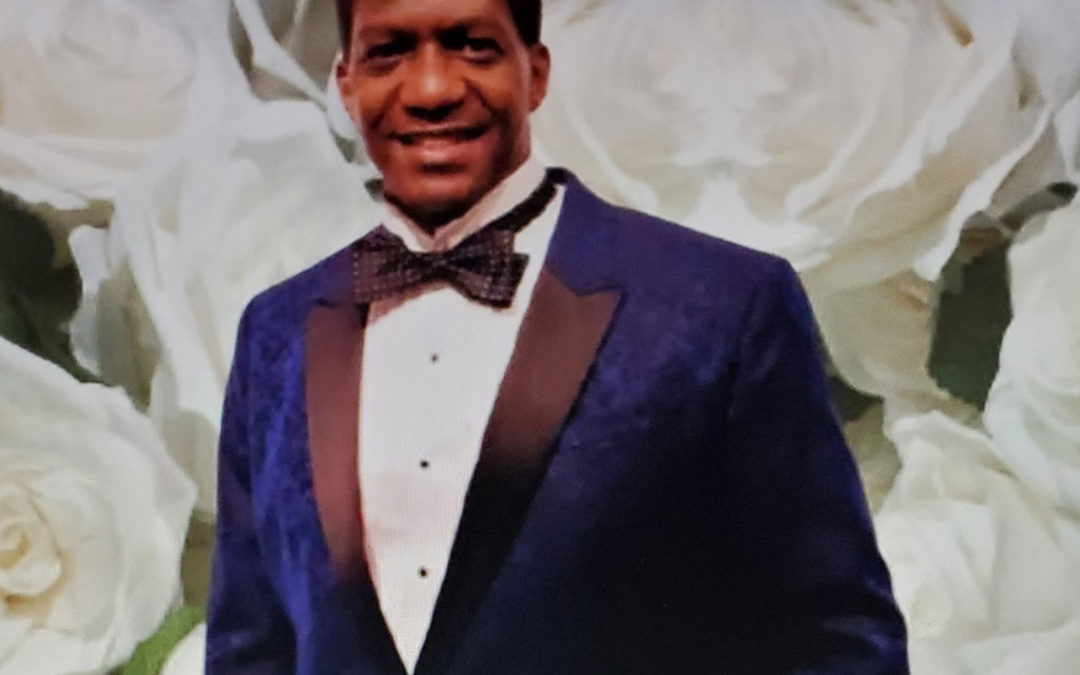
Van’s Homegoing
For the blog today I am simply posting the memorial information for Van Dirk Fisher. Those who can attend should if they can and if not please consider joining me by sending a donation to Pamela Fisher, Van’s sister, via Zelle as posted in the invitation posted below.
Homegoing Celebration
Van Dirk Fisher
Saturday, October 23, 2021
10:00am Special Tribute by Family and Friends
(2 minutes per person)
11:00am – 12:00pm Memorial Service
The Abyssinian Baptist Church
132 Odell Clark Place
New York, NY 10030
In lieu of flowers please send donations to Pamela Fisher via Zelle to (917) 640-5731
Limited in-person seating – Virtual service available @ abyssinian.org
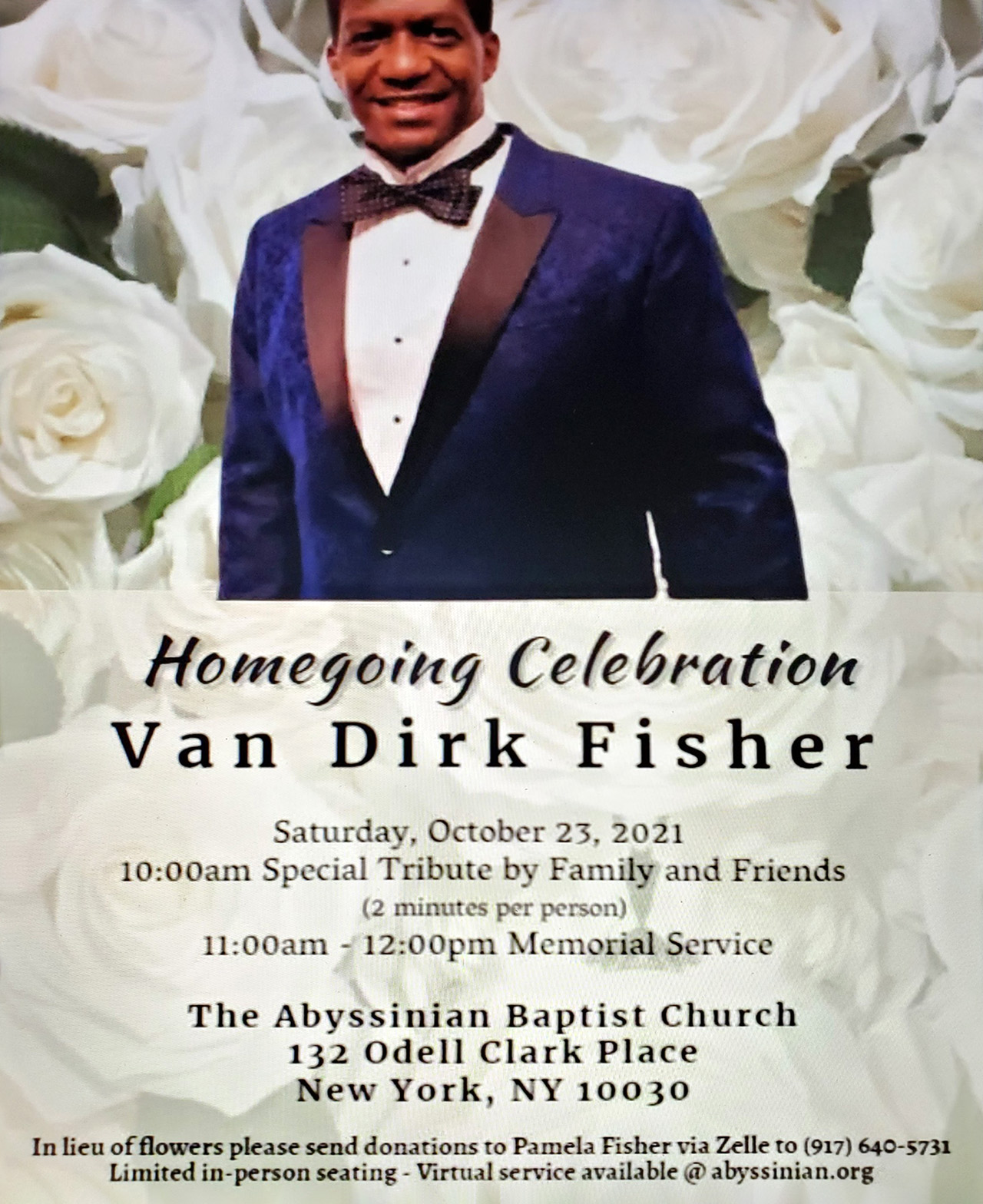
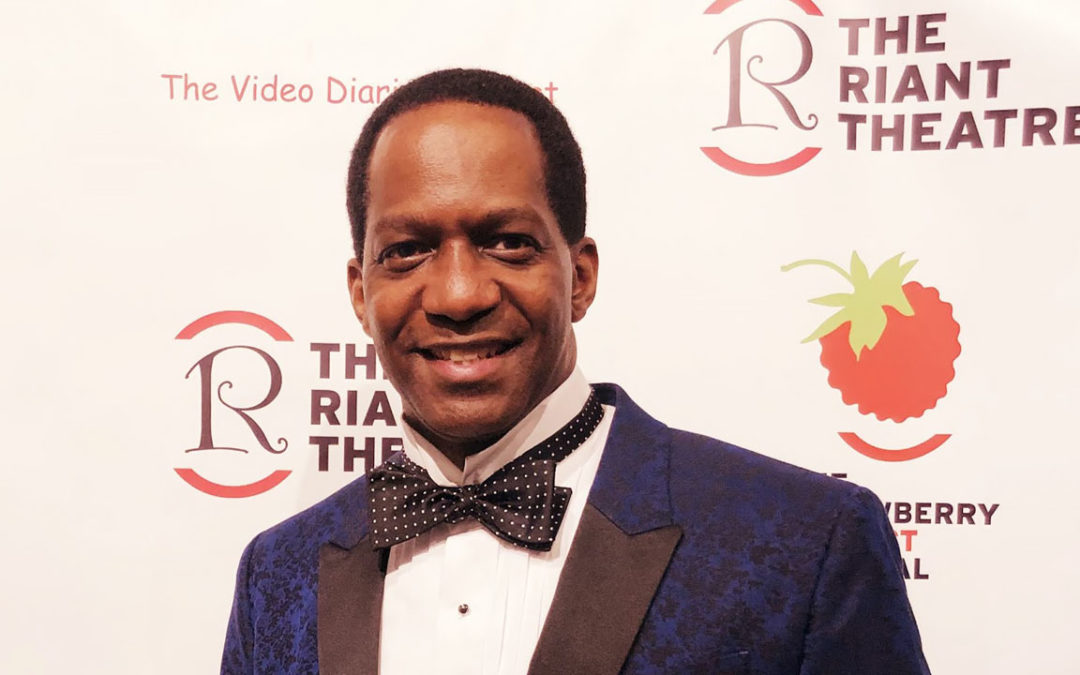
Sometimes the Unthinkable Just Happens
Six months after the pandemic shut the New York theaters in March of 2020, I met a remarkable man, Van Dirk Fisher on an introductory Zoom call.
He had chosen my play, The Grace of God & The Man Machine, for a virtual performance at The Riant Theatre.
From the start, I was skeptical about a virtual performance, but I was impressed by Van’s tenacity and remarkable creative energy.
He would not let me say no. Less than a month after that call — and a year ago this October 25th — Van directed a highly creative virtual performance of the play.
The producers and I watched him direct the brilliant cast he had assembled and shape the virtual performance. He completely understood the play and he almost seem to inhabit it.
The following Tuesday after the performance, I dedicated a blog to him. I said:
This new format was advanced by a remarkably effective merger of the immediacy of live theater and the dramatic impact of the cinematic closeup.
Director Van Dirk Fisher and the Riant Theatre placed virtual backdrops behind the actors and the actors, all separated and in some cases in different states, reached out and past a joint between each other and exited and entered as they stepped in or out of the camera in front of which they performed alone.
The reading took on an immediacy that a staged reading cannot provide, but the degree of difficulty remained almost unnoticed for an audience which tuned in from New York to California.
Judging from the chat rooms and the talk back after the performance, it was a huge success.
The producers were so impressed by what they had seen they immediately bet the farm and asked him to direct the future off-Broadway production.
We had only met him in Zoom meetings. He was that impressive.
Last Friday, nearly a year later, finally I received a text from the producer telling me it would finally happen. The Grace of God & The Man Machine would open this spring off-Broadway. We were off and running and finally we would be working with Van in person.
Two days later I was surprised by a text message from Van‘s sister:
“Van passed yesterday at 3:49pm.”
When I called her in disbelief, she told me December of last year, he had been diagnosed with stage four stomach cancer but had fought it and continued to work.
A month or so ago, I contacted him to see if he was interested in working on a new play. He never revealed that he was sick.
Just as American theater is opening up and finally recognizing Black creators, this man and his future audiences will be deprived of his chance to show his considerable gifts.
I would be willing to bet that up until the very end, he believed he was going to beat cancer because that’s who he was.
When this play goes up off-Broadway, there will be a tip of the hat in the program to him and his indomitable spirit.
I only knew him through Zoom calls but now he won’t even be there for us virtually. I never got a chance to meet him and shake his hand but I know he will be there with us when the play opens.
He will be with us live!
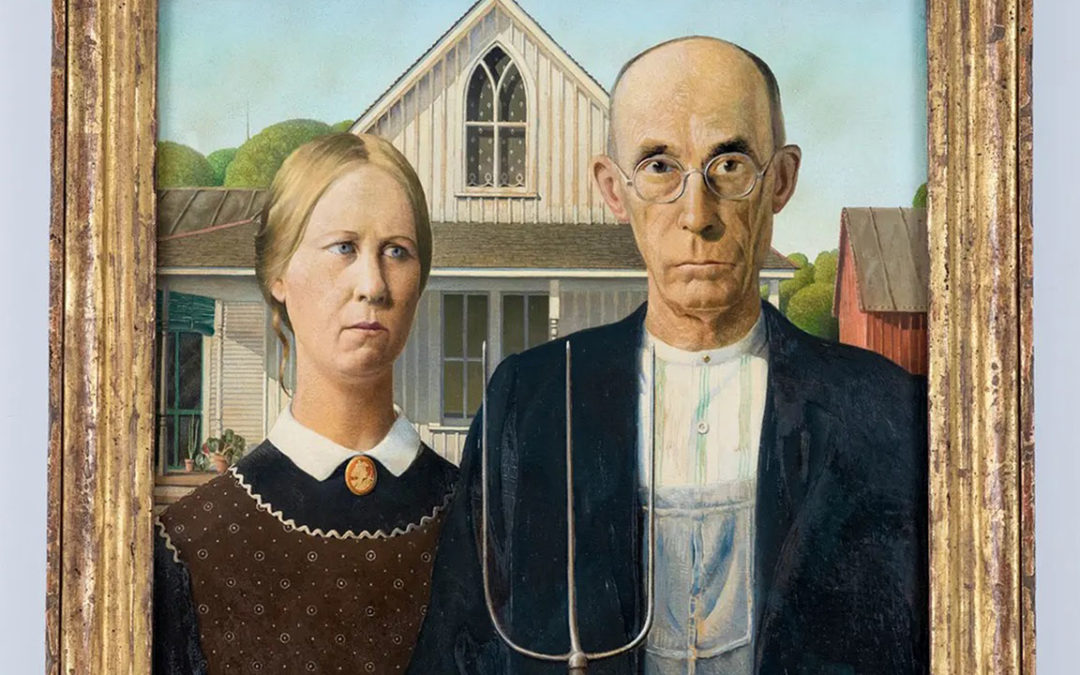
A Little Humor About How We Live Free and Don’t Die
New Hampshire’s motto was and remains “Live free or die.” Back in the early 1960s, when I was ten, I came to believe it was America’s promise to itself.
My parents took the family to the White Mountains in the wilds of the Presidential Mountain range, to a tiny house that looked up into Tuckerman’s Ravine near the little town of Randolph in northern New Hampshire.
The morning after we arrived, our family dog came back after a night out with a mouth full of porcupine quills.
When we arrived the night before, we had discovered that the only phone was affixed to the wall in the kitchen and was a party line. So, the next morning, we had to ask the operator to give us the number for the veterinarian and we had to count the rings to know if her return call was for us or someone else when she connected us.
We soon learned that the party line did not stop people from picking up the phone and eavesdropping. My father would preface a conversation by constantly asking “please get off the line… Please get off the line.” Eavesdropping on the phone was a social event but — when requested — the clicks could be heard and the line would become clear. It was part of the social code.
The other notable social activity in Randolph was the picnic on the 4th of July where everyone in the community, including us, enthusiastically gathered to play charades. The charades were just an icebreaker to encourage interaction and conversations between strangers. All the eavesdroppers must have been there, but I remember that everybody was welcome to celebrate our democracy in that community.
As I grew older and watched the passage of civil rights legislation and protests to end the Vietnam War on black and white TV, and the rise of “Me Too” and “Black Live Matter” on the web, I always returned to my childhood memories and to that motto that I believed was America’s promise to itself.
I try to keep imagining what the residents of Randolph, New Hampshire back then would have done if the telephone company was quietly gathering everything from purchasing information to political beliefs to sell to secondary consumer markets and even to political parties, and if politicians used this information to make marketing calls, agitating these customers to increase profits.
So, must I now reconcile this my old memory of the respect for personal privacy, which was honored at the request of my father on a party line by our neighbors who also welcomed us into their picnics and to celebrate our democracy?
Would the citizens of Randolph have been quite as complacent as America is now?
Would they have required a whistleblower to go to Congress to explain Facebook‘s assault on their privacy?
No, that’s been obvious all along.
Would they need a whistleblower to explain that Facebook has, for its own gains, divided the country as a platform for false information of all forms in the name of more corporate profits, despite the damage it may have done?
No, that’s been obvious all along.
I have to get over my childish imagined ever-growing flotilla of tractors with extra pitchforks for other patriots rolling out of Randolph, gathering in its assault on Washington.
I have to get over my childish imagination that they would have already left town and gone to defend the Capitol back in January after it was assaulted.
They would be there, defending the Capitol, and who knows? Once they figured out what was happening, perhaps they would’ve attacked the White House. Or maybe they went down to protect voting rights or protest political parties that grow more radical, unifying a misinformed public in order to maintain their own political power.
Once I gave up these childhood memories it is now good to realize we struggle everyday to be free. It is the imperfect process which we must follow. It is what we must do.
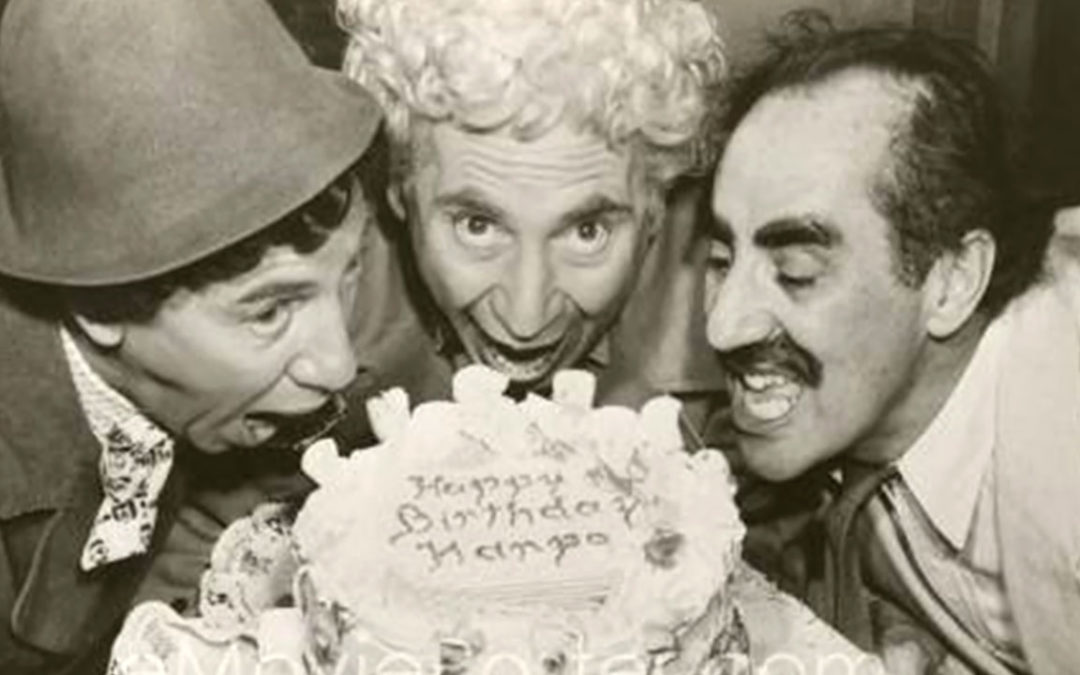
Thank You for Your Posts on My Birthday
The kindnesses of the birthday wishes which I received on the 24th are much more appreciated than might be immediately obvious.
I want to briefly express my gratitude.
Facebook was an afterthought to promote an unlikely second career as a professional playwright and poet, which I have always half dreamed about but never had the courage to expressed to others.
When I started on this new career I fully recognized that the biggest problem I had was I had little or no credibility in this my new profession.
I had wonderful friends from high school and college but they were scattered across sixty years and several continents and I had wonderful friends from my prior career. I also had the invaluable friends I had made from the Baltimore theater community as a board member and amateur Playwright.
My Tuesday 3:00 pm (ET) Facebook posts and a webpage, created by new friends, developed into a blog, Instagram and Twitter accounts. Over the last five years I have been able to gather with my old friends and meet new friends in this new world which I would never have met but for these platforms.
Slowly over the last five years the unexpected has happened. I have received support and welcome criticism and the credibility I had hoped for because of the friends I have made or remade here.
I am very fortunate, because of you, to be happily living that dream I was previously too shy to express.
Thank You!
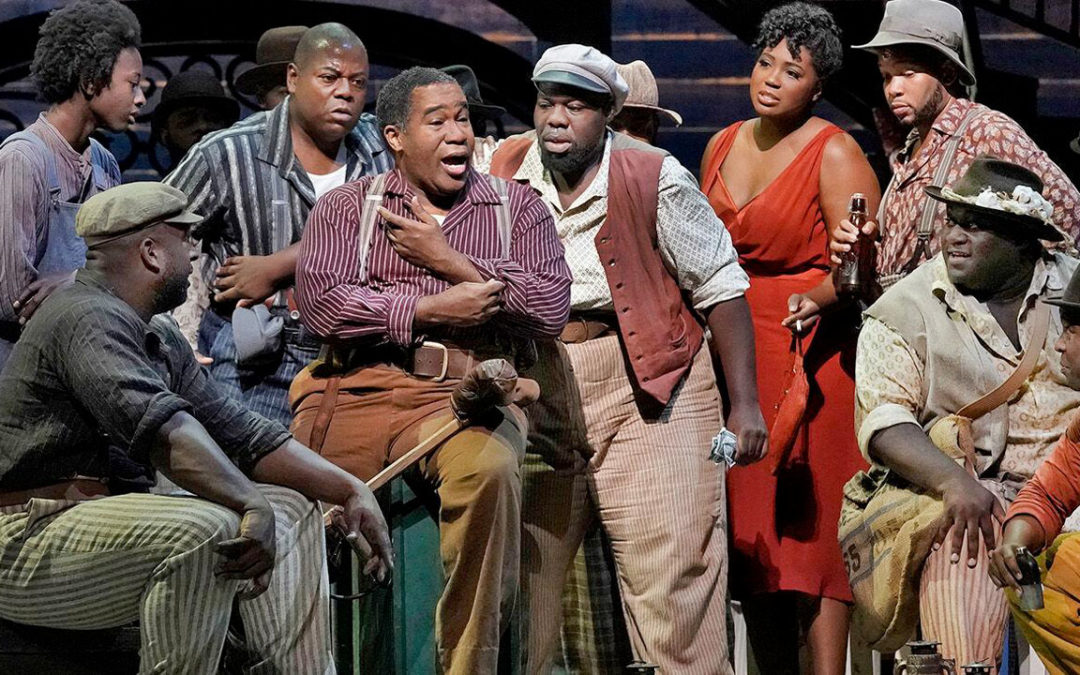
Finally! Broadway Opens Up for Black Playwrights and Their Plays
Let’s first be grateful, and then let’s take this apart piece by piece.
Last Sunday The New York Times theatre section reported that seven plays by Black authors would open on Broadway this fall: “Chicken & Biscuits,” “Trouble in Mind,” “Lackawanna Blues,” “Clyde’s”, “Skeleton Crew,” “Pass Over,” and “Thoughts of a Colored Man.”
Broadway’s pre-pandemic theater season featured two plays by Black authors. The previous season, there had been just one play and in the season before there had been none.
All seven plays in varying degrees have been time tested off-Broadway, whether it be recently or in the past. They are all interesting and worthy based on their past history and past reviews. With the exception of Lynn Nottage, who is a two-time Pulitzer Prize winner, they all offer new voices about the human condition.
The article wondered whether this trend to welcome Black authors would continue. The fear is that Broadway’s traditional white audiences would not attend these plays and thus they might fail financially.
Historically, something like only one out of five Broadway plays ever recoups its expenses.
To produce a play on Broadway is extremely expensive. The New York Times article reported: “According to filings with the securities and exchange commission, ‘Thoughts of a Colored Man’ is costing up to $5 million to mount; ‘Chicken & Biscuits,’ up to $3.5 million; and ‘Pass Over’ up to $2.8 million.”
Also, it would be easy for those who want an excuse to blame the lack of attendance of Black audiences. The Times reported: “In 2018-19, 74 percent of theatergoers were white, and 4 percent were black, according to a demographic report by the Broadway League, a trade association representing producers in theater owners.”
Theaters rely heavily on tourists for ticket sales and all these plays come to Broadway under the threat of the pandemic.
But this may not be an appropriate way to measure success or failure for these plays or their authors.
If these seven plays and their authors do not succeed according to Broadway standards, they will nonetheless have received the blessing of the Broadway brand and will have the afterlife and influence of future performances in one of more of the 74 regional theaters in 29 states and the District of Columbia.
Regional theaters rely more on seasonal subscribers who love theater and remain more open to new works, particularly if they have been blessed with a Broadway production.
Everyman Theatre and Center Stage in my hometown of Baltimore have regularly contributed to putting on such a new works, but now it will be safer for them to continue doing so.
For these playwrights, this new visibility will offer a brighter future for their future works.
Of course, the greatest benefit is for us, the theater-going public, because these new playwrights will finally be able to introduce new stories from a different perspective about our human condition.
Theatre is different than almost any other art form in the way it communicates and has impact. It is a staged conversation which is also a conversation between the stage and the audience. It is powerful because it is intimate and live.
Perhaps these are the conversations that we have been unable to have in a polarized country.
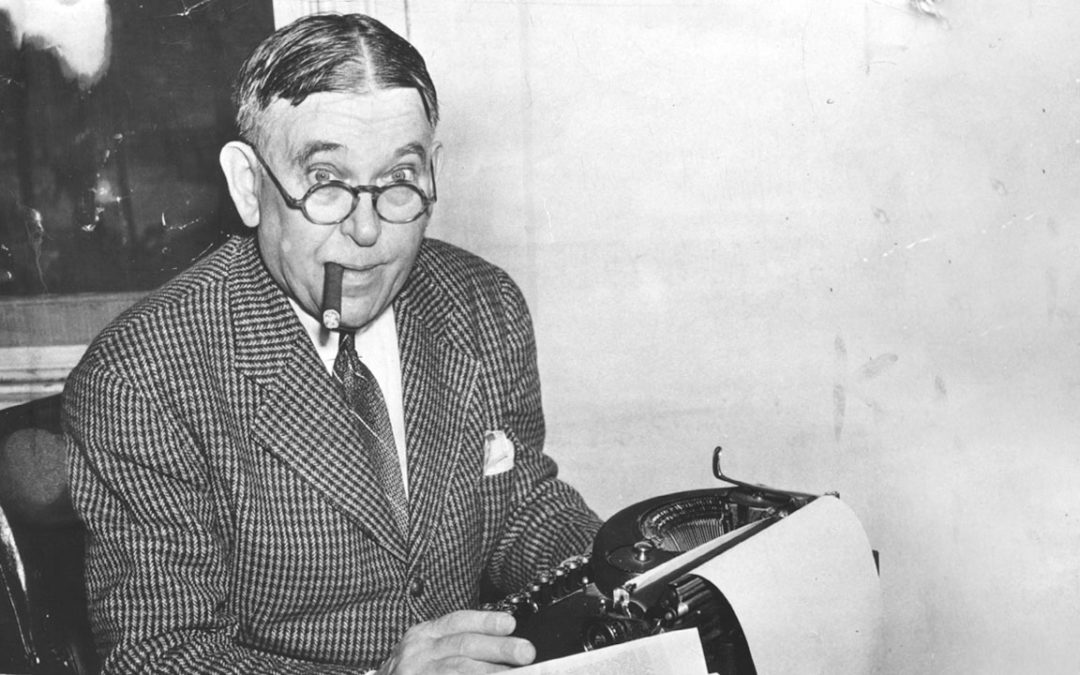
Let’s Get This Party Started
“The whole aim of practical politics is to keep the populace alarmed (and hence clamorous to be led to safety) by menacing it with an endless series of hobgoblins, all of them imaginary.” — H. L. Mencken
September 12 is H.L. Mencken’s birthday. He was a wonderful provocative opinionated Baltimore Sun newspaperman who was definitely not politically correct and loved to piss off everybody. Times such as these require we celebrate six days early.
Though I could never match him the only way to celebrate him is follow his lead. Please accept this as all in good fun.
My celebration is in two parts.
Part 1
Extra! Extra! Read all about It! Where in the Constitution is the freedom of choice?
“Democracy is the theory that the common people know what they want, and deserve to get it good and hard.” — H.L. Mencken
Let us first consider American “freedom of choice,” which has been heavily relied on by anti-vaxxers and the intellectuals on Fox News.
Let’s start with a little history. In the mid-1950s, my mother joined all the other mothers back then who lined up their children for the new polio vaccine and thereafter for mumps, measles and who knows what including all kinds of booster shots. It was so long ago there were “pin cushion” jokes. Back then, people had sewing machines and pin cushions.
Yes! These were the days when tattooed people were not afraid of needles and vaccinations were not considered to be secret government IQ tests.
It wasn’t perfect but I am sure that many of us are alive today because our “Rosie the Riveter” mothers, fresh from their patriotic duties and the sacrifices of the Second World War, grabbed their first graders and put them in line.
It was a civic duty that their children were safe and also were not spreading any infectious diseases. I guess today they would be blamed for not looking out for #1.
This is not to say I have given up on the present.
I was very happy when almost every anti-vaxxer to whom I talked refused to tell me where this “freedom of choice” is located in the Constitution. But was saddened that nonetheless they said it was “in there someplace.”
Unfortunately, after a careful review of the Constitution, I discovered “freedom of choice” is in fact from a short-lived Burger King advertisement. The fact that it was short-lived seems to indicate that most of these Americans preferred uniformity in their Whoppers.
When I argued that perhaps freedom of choice at least requires a concern for others and it was inappropriate to disseminate misinformation and cited my mother as an example, I got nowhere.
For my back-up authority for both proposals I asked If they recognized these names: Marc Bernier, Dick Farrel, Tod Tucker, Jimmy DeYoung Sr., and Phil Valentine? I pointed out that they had two things in common: they have all made a fortune as anti-vaxxer talk show hosts and they have all died of COVID. I can’t even imagine how many people they took with them, as the numbers continue to multiply.
Part 2
Extra! Extra! Read all about it – Are we back to deputizing bounty hunters?
“There is always an easy solution to every problem — neat, plausible, and wrong.” — H. L. Mencken
As you already know by now the Supreme Court’s decision last week finds no constitutional problem with Texas bounty hunters receiving up to $10,000 for reporting anyone who “aids or abets” an untimely abortion.
The Court’s decision sidesteps the right to privacy of a woman which remains constitutional in Roe v. Wade but lets stand that bounty on anyone, including nurses or doctors, who make any effort to help her.
These developments will be obviously universally supported by our fellow Americans since recently we love and elect presidents that have acted as cowboys in the movies or have been on reality TV.
Nonetheless, I think that the current Supreme Court is showing us the way to solve all of our current problems if we just support the constitutionality of this decision and embrace its wisdom.
There seems to be no constitutional reason we cannot employ bounty hunters to ensure our personal freedoms, cut unwanted government protections, and also cut taxes.
Consider traffic safety. What a wonderful way to get rid of police expenses and cut the costs of enforcement. We can eliminate road rage by merely reporting on bad drivers and collecting the bounty.
Our federal and state highways could be a reenactment of the carnival game Whack-a-Mole or a video game and advertising will increase substantially for drive time traffic updates. It will be great for business and prevent us from having to raise the minimum wage.
This opportunity has no limits! We can finally all be safe if we each are bounty hunters reporting on each other for any violation of any law. There may be one problem though: how do you collect the bounty if there are no police to enforce it?
But once again the current Texas Republican Party and the current Supreme Court helps us understand that the second amendment has been there all along. We the people finally will be the “well-regulated militia,” which the Supreme Court has previously ignored.
If you think about it, we can even eliminate election fraud if “we the people” police them. We can ensure fair elections and “stop the steal” if we have televised shootouts between the candidates.
Let’s give credit where credit is due. These are the new breed of Trump Republican that have modernized the party. Completely different than my old Republican heroes like President Eisenhower, Chief Justice Warren, or Senator Charles Mathias for whom I was proud to have worked for when people from both parties worked together for the good of the nation. But that was the old Republican Party.
I apologize. Mr. Mencken made me do it. He was born in 1880, so on September 12th he would have been 141 years old and almost half the age of our country.
“If, after I depart this vale, you ever remember me and have thought to please my ghost, forgive some sinner and wink your eye at some homely girl.” — H. L. Mencken
I am not worthy. He was politically incorrect but he still can shock you and make you laugh. Hats off to my friend David R. So, let’s get this party started!

Baltimore Is a Great Theater Town!
Baltimore is a great theater town but sometimes you have to leave home to appreciate it. It offers way more access and opportunities than the theater world recognizes.
Last week, I traveled to New York and stayed at a hotel in the East Village across the street from the Village Voice. The hotel had floor-to-ceiling windows which overlooked the street. The incoming students at Cooper Union and NYU were just getting to know the city and each other as they moved through the late summer heat. The mask requirements had been reinstated for indoor spaces, but you could feel the city coming back again and, with it, a flood of joy and happy memories.
One late afternoon a few weeks before the pandemic, after a table read of The Grace of God & The Man Machine, I was drinking with the actors at The Triple Crown at 29th and 7th Avenue, a semi-dive next to The Opera Center offices where the reading had taken place.
I was bellyaching about being a geezer, starting my career as a fledgling writer so late in life. Two beautiful things happed almost simultaneously.
First, several of the actors, who, in some cases were easily half my age, somewhat seriously, told me to “shut up and grow up.” They had no pity for me, they told me unceremoniously. They were trying to make ends meet and support a family as they pursued opportunities in order to learn their craft and develop an acting career. Meanwhile, I was able to write all day and still cry in my beer. Second, they buttressed their argument by reminding me of something I had just told them moments before. I had apologetically said I have had 10 plays performed in the little theaters in Baltimore.
It was all true. I had taken it for granted. Baltimore from top to bottom is an oft-unrecognized theatre town full of opportunity. At the top, The Everyman Theater and Center Stage are nationally recognized and Everyman stands out because it has built a company which supports its actors and offers its audience the chance to get to recognize these actors.
The theaters such as Fells Point Corner, Audrey Hermann Spotlighters, The Vagabonds, Theatrical Mining Company, and others produce monthly shows at reasonable admission prices and offer competitive opportunities for actors, directors, stage designers and techs young and old. For over 25 years, they have sponsored the Baltimore Playwright’s festival, which pays burgeoning playwrights a small stipend and offers new work and summer performances.
But perhaps even more supportive are professional theater critics, such as Judy Rousuck, who have covered the Kennedy Center and the Baltimore regional theaters for years, and have also gone out of their way to cover the little theaters as well, reviewing them in The Baltimore Sun and WYPR radio, the NPR affiliate.
I had never really recognized the greatness of Baltimore theater and how much I had benefited from it until I left home and abruptly recognized the good fortune and education I had received at home.
How odd that the rebirth of New York theater would bring me back to my genesis in Baltimore. I have nothing but love and appreciation for the place and the friends and mentors I have made and found there.
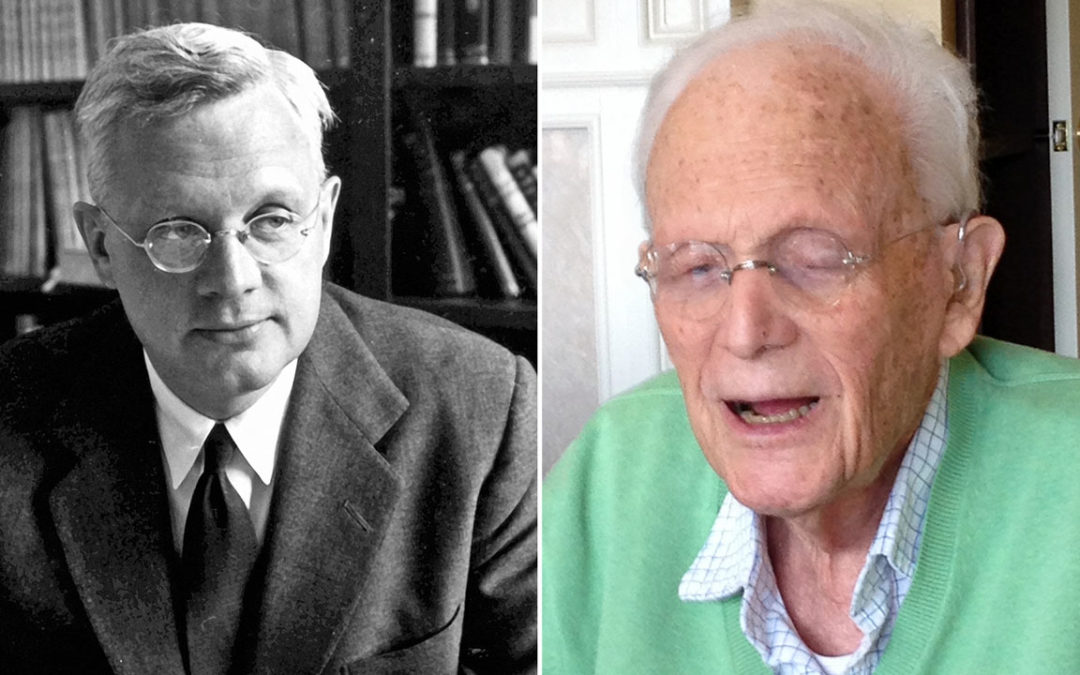
Learning to Accept Love
Today is my father’s birthday. He was born August 24th, 1909 and died November 2nd, 2013. Somehow my love and respect for him continues to grow. It happened over time but it is much like what Mark Twain said:
“When I was a boy of 14, my father was so ignorant I could hardly stand to have the old man around. But when I got to be 21, I was astonished at how much the old man had learned in seven years.“
Imagine how “astonished” I was by “the old man” after I had continued to witness his learning as he passed 100. He set the standard. He told me one time, “I love you, but I don’t respect you.” He was right. He was always razor sharp and I grew to want his respect.
He had been first in his class in everything he had ever done and could cut through the fog to get to the heart of an issue with a single lightning bolt comment, but the real reason I thought so highly of him was I saw him choose to live with determined integrity.
During the last 15 years of his life, he lived in a retirement home near where I worked. The other old men on his floor gave up shaving for weeks but I would always shave him before he would leave his room as my show of love and respect. I would visit him every afternoon and wheel him into dinner unless I was in a trial or out of town.
In the mid-1990s, in yet another effort to win his respect, I enthusiastically informed him that this new Internet thing would open us to world peace. He smiled and said, “probably not that easy.” He was right and I was flat on my face again. I could only think of what he must have thought of me in my teens during the “don’t trust anybody over 30” period.
I was the worst kid ever. I had undiscovered learning issues back then, and well-developed disciplinary problems. I kept getting thrown out of school and — to make things worse — I would disappear to hitchhike through at least 40 of the states.
One time when I was heading back to Maryland, I called home from a payphone in a Howard Johnson’s south of the Chicago because a driver who picked me up bribed me with food if I would call my parents to tell them that I was coming home. My mother answered the phone and could not stop crying because she said she had been so worried. Despite my misspent youth, my father and mother never gave up on me. I was their son despite my failures. They would do the right thing. That determined integrity was a commitment to love. I wanted to learn that.
One afternoon when he was 94, he complained of pains in his lower abdomen and after an ambulance ride to the hospital he was admitted to surgery.
As I prayed in an empty waiting room very late at night, I thought I was never going to see him alive again. On scratch paper I sketched out a sonnet of remembrance. I wrote it after they wheeled him out of the operating room.
My Father
In the end it’s touch that holds memory.
The other senses are immediate
And defend the present territory.
The other four are there to navigate.
Tonight my father went under the knife
And I waited alone with my cell phone
To see what would become of this one life;
Together, separate, and both alone.
For an hour in the last waiting room,
I remembered him as sound and insight,
Too perspicacious for the cool boxed room
That would contain him in this, his last night.
At ninety-four how could he have survived?
I kissed the forehead of a man, alive.
As he approached his 100th birthday, we were talking and he, almost as an afterthought, said, “I admire what you have accomplish with your life. I’m not sure I could have done what you have done.” I don’t think he ever realized that was the one thing I had always hoped to hear from him. Our last years together we’re perfect. He had never withheld love. I just had refused to accept its responsibilities.
Shaving My Father
(From a draft I wrote the day after my father’s death at 104.)
This is the last small room in which he will rest.
Every day I visit him at four o’clock.
We balloon the room with our forgiveness.
“Either this man is dead or my watch has stopped.”
Two men knock on his door then wait like guests.
“Not funny for a man this close to death.”
We share what only dark humor can express.
The Marx brothers, for both of us, are the best.
The electric razor hums in my hand
As it cuts along the cheekbone and the neck.
Like a harvester on pre-winter land
I harvest thistle from earth’s intellect
Across a snow bank of thin paper skin.
They zip their bag shut and leave me without him.
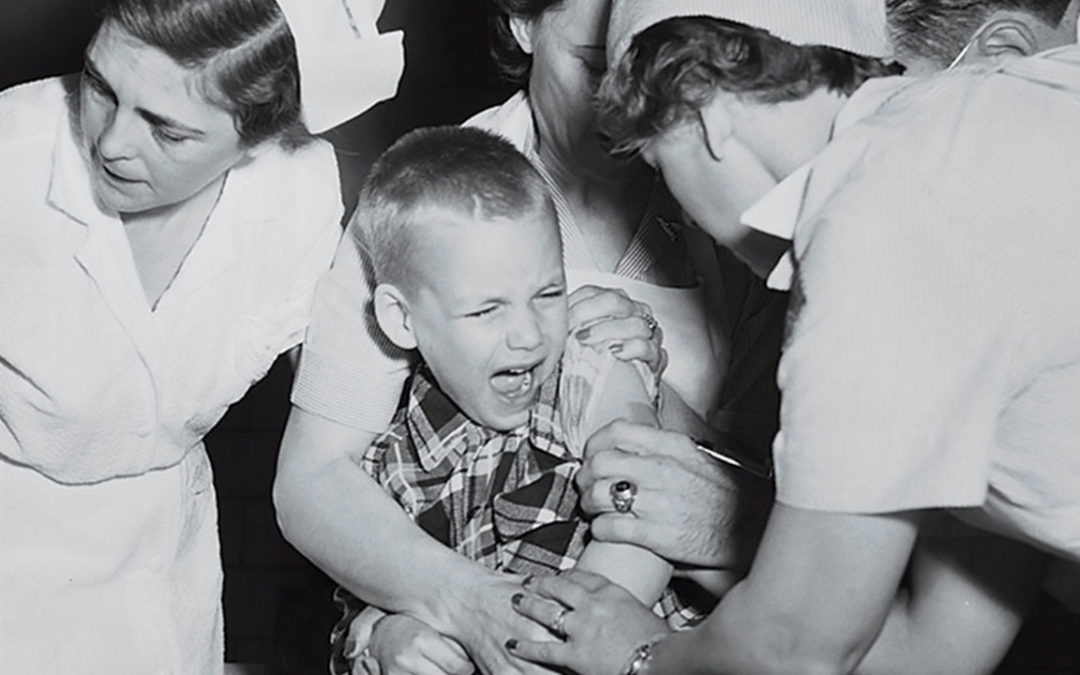
Don’t Be Grouchy About the Fauci Ouchi
I’ve got you beat! Have you ever been vaccinated for rabies?
Years ago, my young family was traveling back from Frederick, Maryland after the 4th of July when I asked my wife to pull over because I saw an injured baby raccoon by the side of the road.
I love all living things and most humans.
The little raccoon was so small it fit into the palm of my hand. I took it home that night, named her Thomas Jefferson — because it was the 4th of July after all — and started to feed her with an eye dropper.
I researched diet and organized my schedule to ensure regular feedings, but it was too late. Three days later, she started to die. Despite my efforts, somewhere around 3 o’clock in the morning she stopped breathing.
When I told my wife the next day, she was understandably horrified. She informed me that it was possible that I could have gotten rabies and I must get vaccinated.
I voluntarily got the shots and became the hero and laughingstock of my little neighborhood. They would turn to each other and point at me approvingly and say, “if you see a rabid animal call Bob because he can bite back.”
So why did I voluntarily get those shots back then?
I didn’t really volunteer to be the game warden for my neighborhood but I did not want to get rabies and I certainly didn’t want to involuntarily bite somebody.
I also wondered if rabies shots were mandatory. I was surprised to find that with the exception of Kansas, Missouri, and Ohio, every state in the union has mandatory rabies vaccination laws for domestic pets but apparently not for their owners. The success that public health officials have had in controlling rabies is due to vaccinating domestic pets.
But what does this say about my parents? I got vaccinated for everything! Did they treat me like a pet?
As a child, I had been vaccinated for typhus, measles, mumps, and polio, and our reservoir water had been treated with fluoride to save our teeth. All this in order to protect the living generation from the transmissions of death and worse, tooth decay. I remember there were protests against all of these vaccinations at the time.
Recently, it occurred to me: Why not smallpox?
Why didn’t our pets and I get vaccinated for smallpox? It must have been mandatory! Because of this oversight could I have accidentally passed on smallpox and kill somebody?
So, I did the research.
In Europe smallpox vaccination began in the early 1800s, after Edward Jenner did cowpox experiments, in which he showed that he could protect a child from smallpox if he infected him or her with cowpox blisters. Jenner’s ideas were met with immediate public criticism. The rationale for this criticism varied, and included sanitary, religious, scientific, and political objections.
What a wonderful surprise!
Almost two centuries after Jenner hoped that vaccination could annihilate smallpox, the 33rd World Health Assembly declared the world free of this disease on May 8, 1980. Many people consider smallpox eradication to be the biggest achievement in international public health.
I felt even better when I concluded that it was patriotic to be vaccinated.
René F. Najera, DrPH, the editor of the History of Vaccines, an online project by the College of Physicians of Philadelphia, reported that there is good evidence that the United States won the War of Independence because of vaccine’s precursor: inoculation.
Among the Continental regulars in the American Revolution, 90 percent of deaths were caused by disease, and Variola — the small pox virus — was the most vicious of them all.
On the 6th of January 1777, George Washington wrote to Dr. William Shippen Jr., ordering him to inoculate all of the forces that came through Philadelphia. As he explained:
“Finding the Small pox to be spreading much and fearing that no precaution can prevent it from running through the whole of our Army, I have determined that the troops shall be inoculated… Necessity not only authorizes but seems to require the measure, for should the disorder infect the Army… we should have more to dread from it, than from the Sword of the Enemy.”
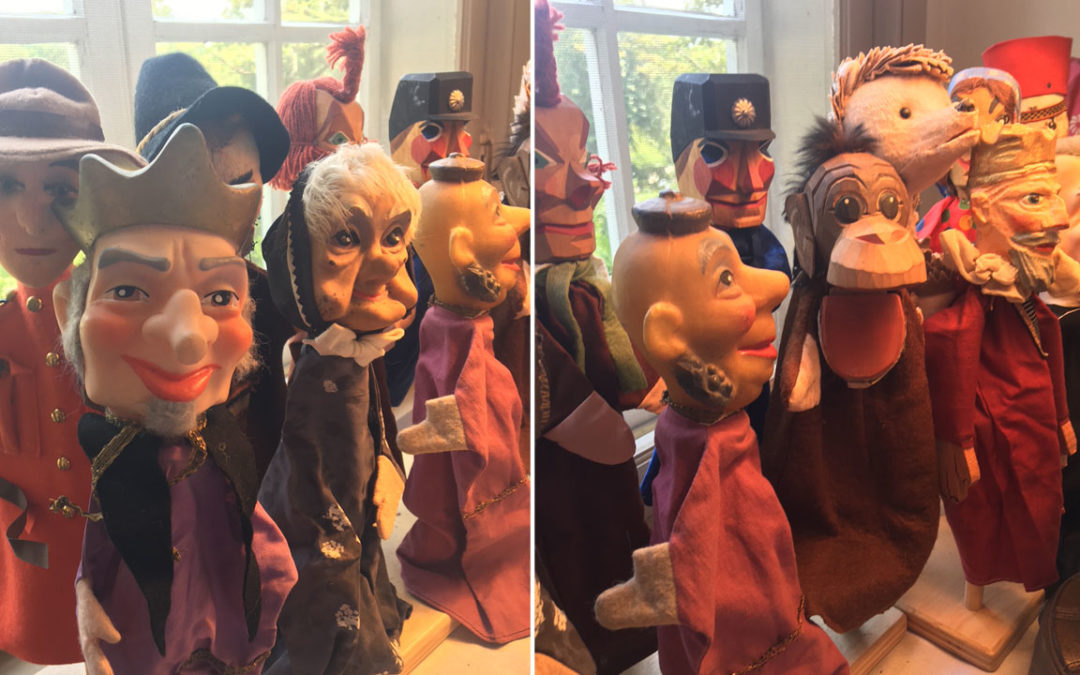
In Times Such As These…
I have always been a religious man.
I have always had a deep and abiding religious belief in delusions of grandeur.
This week, COVID and the new Delta variant are again threatening to curtail the opening of New York theater, and with it, so goes again my new play, The Grace of God & The Man Machine.
It is times such as these one must fall back on faith!
It is times such as these when I feel compelled to explain the basis for my belief in delusions of grandeur and why the hell I ever decided to write for the theater.
Is there no justice? I offer you, this, my theatrical pedigree:
My first big break in theater came in fourth grade at an all-boys school when the music teacher chose a friend and I to write the big closing song for our fourth grade graduation. The thespian spirit moved me! I insisted that we end this artistic opportunity with an emotional final line, a big crescendo, in order that we fully convey our deep love of fourth grade.
I was gunning for full tears from a breathless waiting audience of emotional parents as they heard that last line rising to its explosion of emotion with the piano teacher banging out the music as all my fellow fourth graders sang:
”… and we will always love fourth grade even when we’re dead and gone!”
There was stunned silence. There were no tears. There was an explosion of laughter!
That should’ve ended my career. But no…
By eighth grade, my fragile thespian spirit had revived. I had gathered a large collection of hand puppets so I offered to put on a performance for the entire middle school.
It would be a love story!
My mother had typed out my script but I could not read it at the same time as I was putting puppets on both hands. So, I soon abandoned the script and turned to all-out stage violence. I had the entire middle school with me all the way until I lost one of the fighting puppets over the edge of the stage and my puppet stand fell into the fifth grade.
I got my first bad review from a seventh grade teacher. He looked down his nose after everyone had left and asked me: “Where did you get your inspiration for that?”
My love story had unexpectedly turned into improv but it was my obligation to tell the truth. I think I told him I was writing, as all great writers do, from what I knew. I am pretty sure I told him: “Recess.” The show closed on my opening afternoon.
That should’ve ended my career. But no…
By high school, I had given up writing for the stage but still was not able to avoid further theatrical embarrassment. The drama teacher asked me to act what he called “a small part” in The Crucible by Arthur Miller.
Apparently the first choice for the part had dropped out. I had been given the first scene in which my character, the Reverend John Hale, first enters and I was told to read it for the tryout the next day.
I was surprised but flattered when, before the reading, I learned that I had been given the part. I was shocked that evening when I took home the script and found out that my character also appeared in the second act. The more pages I turned, the more horrified I became.
Not only did I embarrass myself on stage, I even embarrassed myself in the dressing room. Back then all stage actors, particularly if they had as many lines as I did, were “tall, dark, and handsome.” As I was putting on my makeup before opening night, the director stopped in front of me and waved his hands wildly and without a moment of kindness told me: “No! No! No! You don’t need a suntan. This is winter in New England.”
That should’ve ended my career. But no…
It got worse. I just couldn’t let it go. I started writing plays for the little theaters in Baltimore. After my first play, Oriole Magic, had been cast, I shared my high school disgrace with the actors, and told them how much I admired their talent because I had developed an overriding fear of acting.
On opening night, the director came to me and told me that the leading man had dropped out of the performance and that I had to take the role. I was beyond terrified. I now would be confronted with the most horrible nightmare I could imagine… I was about to forget the lines that I had written in front of a live audience.
I fled to the bathroom fully intending to lock myself in — but once I got in there, the lead actor, who I was supposed to be replacing, could not stop laughing.
So why do I keep writing for the theater?
I think the answer is I just want to be near it. There are so many happy memories. I wrote ten plays for the wonderful little theaters in Baltimore and though many were horrible, particularly the early ones, I was forgiven my transgressions and encouraged to write again and again. It is these people I remember with great fondness and respect.
Also, when I had difficulty with school, my parents helped me get through those times. They discovered my love for telling stories before I did. My father brought back hand puppets from his travels and built me a puppet stand in the basement. My mother stitched up the puppets when they were broken and got me to lie on my bed on the third floor and dictate stories to her as she typed them out on her old typewriter.
When I improbably committed to attempting to write professionally for New York theatre, I was not shunned. I was welcomed by an amazing group of unique artists who were so talented that they could turn words and beautiful collaborative friendships into worlds in which I could live for an hour or so.
It is too late now. I know why. It is the thing itself. I love it so… and, of course I have this new idea for a wonderful play…
Back to work.
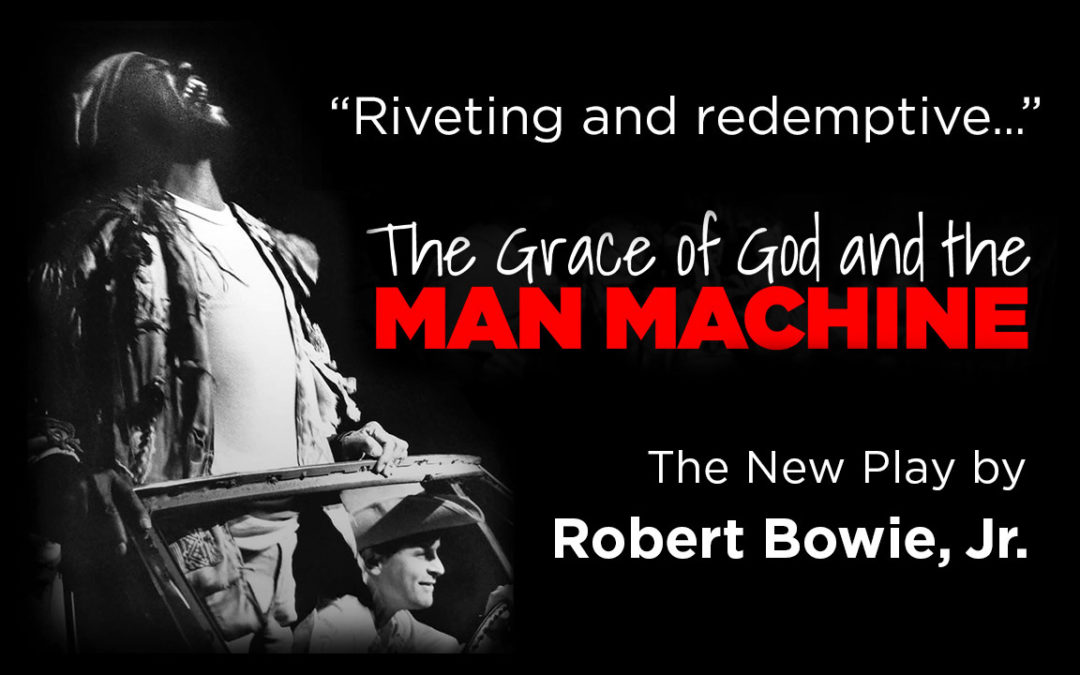
Learning to Live from the Heart of Thank You
I am trying to learn how to live at the heart of thank you.
Sixteen months ago, in March of last year, I left New York with a new play, The Grace of God & The Man Machine, born from the success of my one act play Onaje at FringeNYC. Mind The Art Entertainment (MTAE) had taken over management and production of the play and we were getting ready for an off-Broadway production. An unimaginable dream was coming true…Life was good!
Then COVID hit. Members of the team got sick, had to leave New York to recover and in some cases got the long-term devastating effects of the disease.
These people were my friends. These people are my friends!
The theaters closed. The effect of the pandemic on New York Theatre and on my friends was devastating.
During these dark times, the play was picked up by Riant Theater. They gave a surprising and outstanding virtual performance directed and staged by Van Dirk Fischer with amazing backdrops and brilliant actors who performed seamlessly from different locations and even different states. A remarkably large audience saw it and stayed on the Zoom call to discuss it for almost an hour afterwards. The pandemic loomed on unabated but the heart of theater kept beating…
On July 4 I was surprised and ecstatic. I received the following text message from MTAE:
“Mind the Art Entertainment will be presenting The Grace of God & the man machine by Robert Bowie as their opening mainstage production of their 15th season”
We were on again! We were headed for off-Broadway again! After almost a year and a half we were still alive. But then…
On July 27 I received a follow-up message from MTAE: The Delta variant is expected to continue impacting theater openings. This puts theaters back in closure scenarios for the winter.
… We were off again. There would be no opening this fall or coming year. Then yesterday I get this message…
“It looks like we are moving forward. Good. Sending you some project updates this week.”
This play will happen!
I jokingly sent a message back to MTAE
“We are going to Broadway even if I have to go in a coffin!”
I’m sure they laughed because they get it!
These people, for me, have more fortitude and courage than I can imagine. They have brought into light the courage of numerous others who have faced this pandemic with great courage: the overworked healthcare workers, the selfless care givers who have seen the elderly die without loved ones around them, or the deceived who begged for the vaccine too late.
I have been learning that if I can convert the selfishness of my own pain to a selfless understanding of others’ lives, I will be better off. I am trying to learn how to live at the heart of thank you.
All the people at MTAE and The Riant Theater are the heart of theater, and the heart of theater keeps on beating.
The theater for me has always showed me, on stage, who we are. Now the theater has shown me, in real life, what I hope I can learn. I am grateful.

An Accidental Diary
Ever since I was a little boy I dreamed that some day I would have the opportunity to write professionally full time, so I practiced.
Twenty years ago, I decided, for practice, to write a sonnet a week for a year and to exchange them with a friend every Monday morning for 52 weeks to keep this discipline alive. After that year I forgot about them. They were just another exercise like calisthenics or running laps. It was just practice.
Recently, I rediscovered the sonnets but they were different. I was surprised to find that because I was forced to write every week I had accomplished something I’d never expected. I had written an accidental diary.
What was wonderful about this accidental diary was that it never was designed to see the light of day. It was whimsical and nakedly honest. In hindsight, each sonnet turned out to be a snapshot of a random thought happening at the given moment that I had to write.
Most were finished late on Sunday nights, written from scratch. One I added latter. A few were reshaped from old stuff if I was short on time.
Each sonnet covered every subject imaginable but together they were a subjective scrapbook of a year of my life. They were little stories written in 14 lines which ended in rhymes and a rhyming couplet to tie it all up.
Now as I turn the pages of that year, I can see how unconsciously I developed confidence and a sense of humor and I found my voice.
It is so wonderful to take the time to look back over your shoulder and accidentally discover what you didn’t know you were. Practice makes pluperfect.
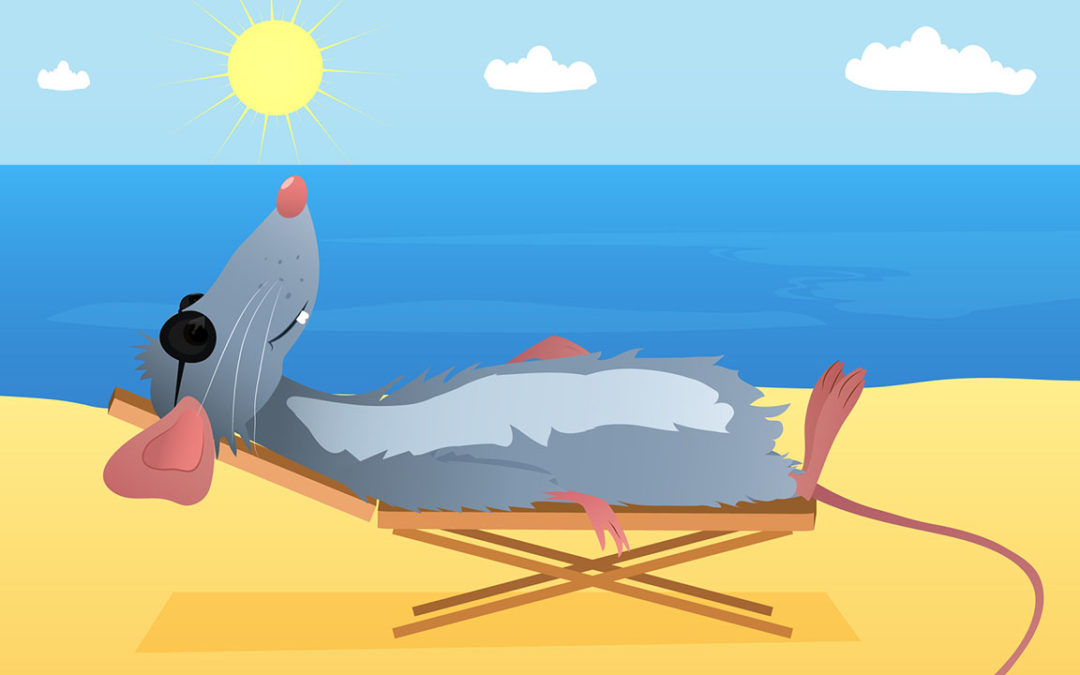
Happy to Return!
After a brief vacation, I’m back and in a good mood! I am refreshed and reinvigorated after visits from the family over July 4th and thereafter, and also by great news and a fresh draft of a new play.
Or maybe I’m just happy because I’m not writing about politics?
First, the producers have told me The Grace of God & the Man Machine, which was ready to go on stage just as the pandemic hit a year and a half ago, is being reconsidered for production. Their design is to be opening off-Broadway at the beginning of next year for a 3- or 4-week promotional run. More on this later as it develops.
And second, I have a new draft for COVID comedy: The Future of the World in 70 Minutes. It is high stakes.
What makes a COVID comedy? Rebellion, revenge, and redemption?
Consider the deep lingering embarrassment rats have suffered since they dropped the ball 400 years ago when they failed to eradicate mankind with the Black Plague and thus save the planet. What could be worse?
Bats.
Bats are getting all the glory for COVID. They are smart. They have organized all of the planet’s animals and organisms to lay a new eradication trap for mankind. To trigger it, all that is needed is one revenge murder of a COVID spreader—in the name of justice. But why has the rat who has been assigned this responsibility delayed it for six months?
Could the rats fail again?
Our rat hero claims he can’t set the trap and the plan won’t work because humans are too stupid. Too stupid to fix global warming, the world’s pollution, or practice social distancing. Too stupid to wear masks and get vaccinated. So they can’t even imagine seeking justice against those who are killing their own fellow humans.
Millions dead and not even one prosecution or revenge murder? Even Man’s inhumanity to man will not work because mankind is too stupid.
Is that it? Or is our rat hero a victim of Stockholm Syndrome who secretly wants to go to Princeton, or has an eating disorder from living in a dumpster and is actually vegan?
The bats are very angry. They have just sent a general who is flying in from Wuhan. It must happen tonight…
Okay, so maybe I am still writing politics… but at least I’m happy because I had a great vacation.
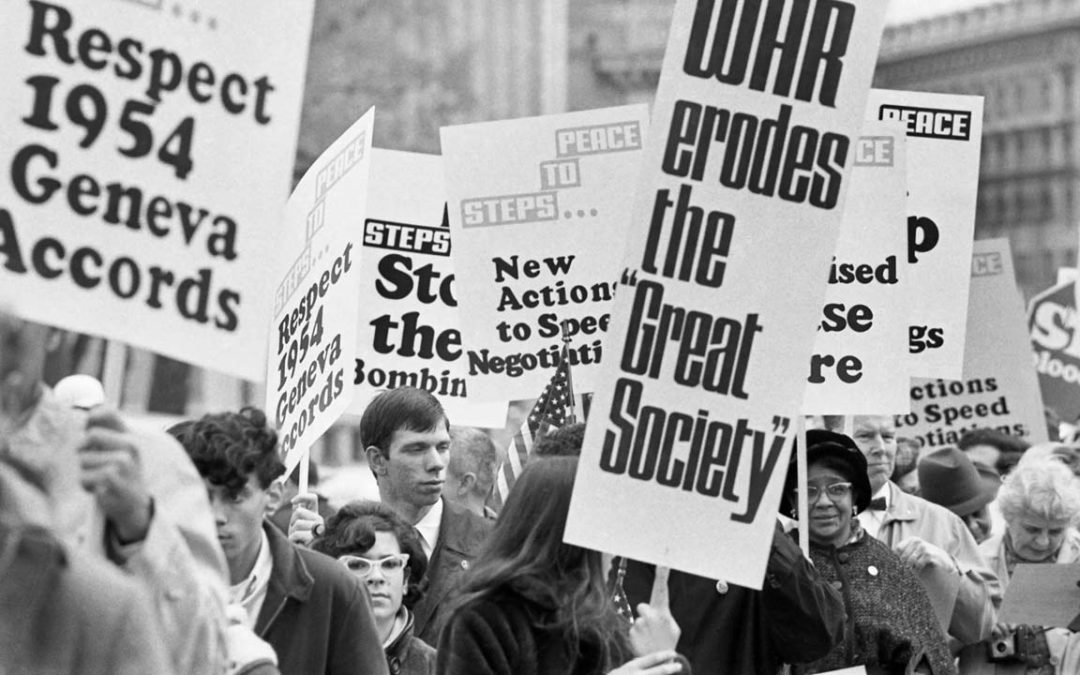
Devil’s Advocate, Then a Short Summer Vacation
I have decided to knock off for the next few weeks to enjoy the summer with the family. But before I do, just for the fun of it, let’s play devil’s advocate and irritate everybody.
Hey! Where are all the baby boomers protesting the January 6th “Stop the Steal” Capitol takeover and why aren’t they demanding an investigation?
And where are all the baby boomers protesting the misinformation being used by the Trump Republicans to take back the Senate and the House in only sixteen months?
The baby boomers divided into two groups back during the Vietnam War. There were those that were drafted and went to the war and those who went skirted the draft somehow and protested the war. Both sides claimed to be patriots.
The patriotism of the war protesters has always been tinged with a possible conflict of interest. Did the protesters prefer college rather than risking their lives at war? Still, their patriotism has always been secure because the war and its purpose were so mismanaged and the country was so misled. But…
But where are these patriots when our country and democracy are being threatened as it has rarely been before? Was that not an insurrection at the Capitol and is “Stop the Steal” not an ongoing attempted take over the country?
Is this not an issue that is far greater than the Vietnam War?
Those that criticized the protesters back then painted them as spoiled comfortable middle-and-upper- class brats who only thought of themselves and cared not for those who went in their place to possibly die.
What if the boomers are and always have been America’s selfish generation?
Let’s all pretend that it’s gonna be all right. The investigations of Trump will build and fill the newspapers with the same drip, drip, drip of sustained conversation as happened with Nixon. And slowly the big donors will drift away and the Trump party with its roots in Newt Gingrich and southern racism will finally die. And the Trump Republicans who only represent themselves will fail to take back the Senate and the House and gridlock the progressives as they did with Obama.
As the baby boomers drift into old age, don’t worry, it’s gonna all work out. Like the bumper sticker says: “The one who dies with the most toys wins.”
Still, it does make you think that maybe self-interest and the responsibility of patriotism was too much for my generation.
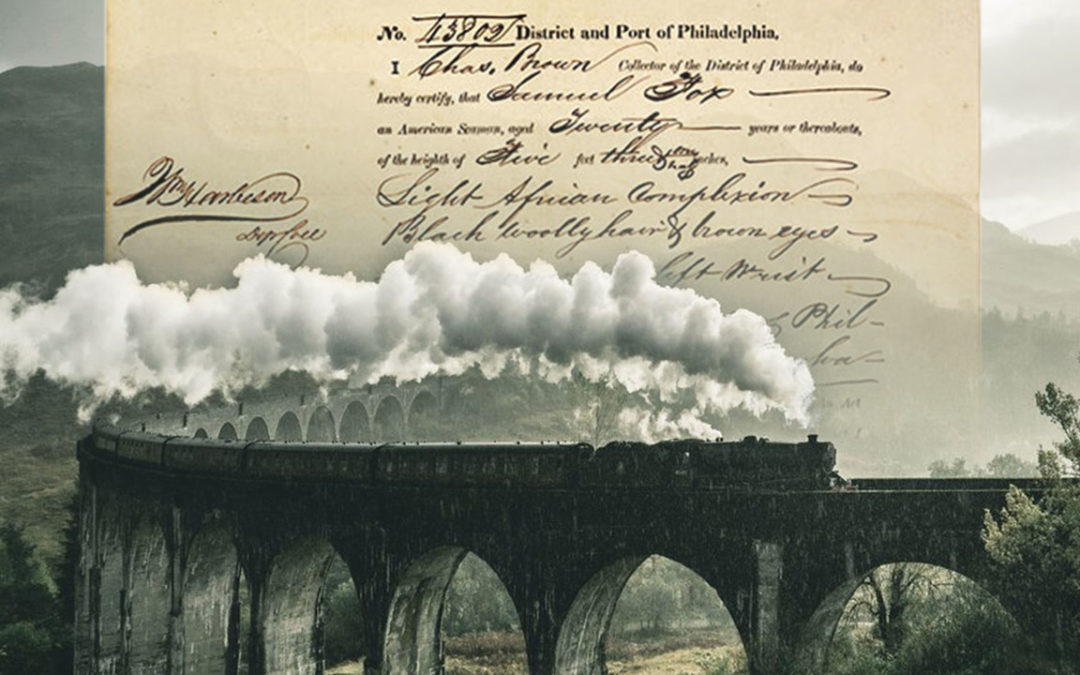
Wouldn’t It Be Ironic?
So what the hell is irony?
Perhaps irony is when you consider that the descendants of those who came from the previously enslaved may set the standard for the preservation of our freedom.
Last week I again listened to Amanda Gorman’s poem at President Biden’s inauguration and then to her TED Talk about how poetry is political. She points out that when totalitarian leaders take over, they burn books and imprison the creatives to silence alternative voices to their propaganda.
Today, I read a blog post by Heather Cox Richardson, the brilliant Boston College professor, about the courage of Frederick Douglass as he risked his life to secure his freedom. He was a tradesman in Baltimore with a relatively safe life compared to other slaves of his time, but he risked his life for freedom to become the leader he became.
He got on a train from Baltimore to New York with false documents saying that he was free to travel as a freeman. Once he left on that train, he was either going to get off in New York or he was going to be imprisoned and shipped to the Southern states and his likely death.
It must have taken incredible courage and determination to get on that train. He risked his life for his freedom.
As I read the news today, I am convinced that we are at a turning point for freedom in the United States.
The Republican party stands for nothing but itself, its authoritarianism, and Trump. It is unrecognizable and unreconcilable with its past.
There is a high likelihood that because of the propaganda, the falsehoods of “the big lie,” and the Republican southern legislatures that have curtailed the right to vote, the GOP will win dominance in the House and perhaps the Senate in 2022.
If we each do not act now to protect this democracy over the next year and a half, we will lose it as we know it.
I think of what it will take for all of us to get on the train.
But I fear we do not know what we are losing.
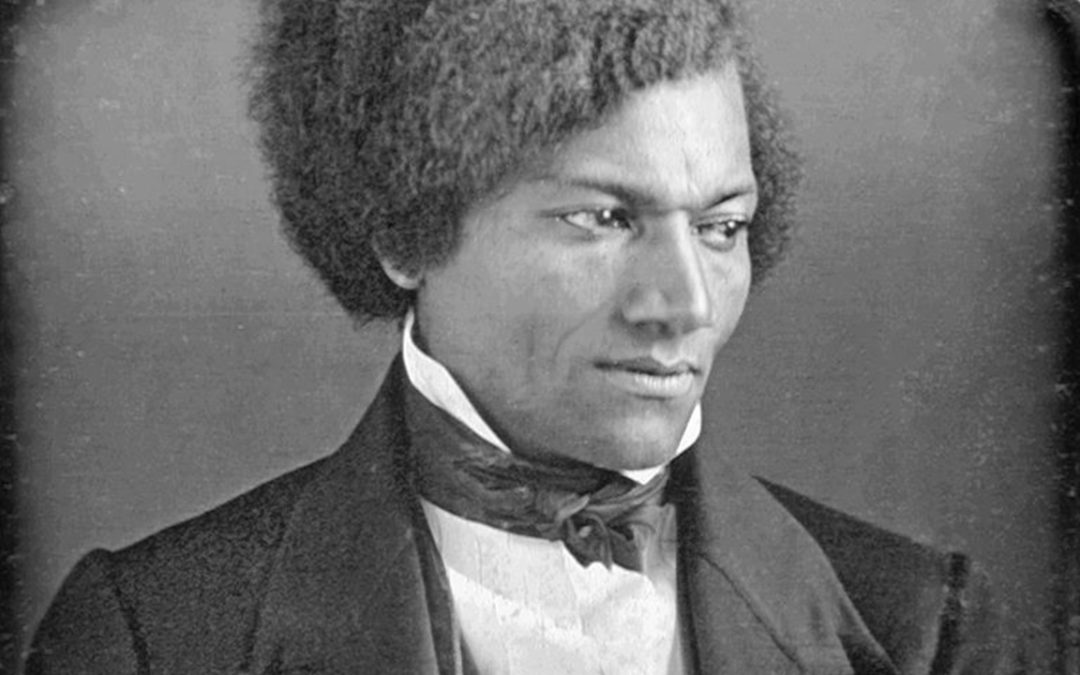
In Freedom’s Name
Apologies in advance. I am going to use the “N word.”
On August 16, 1845, 27-year-old Frederick Douglass, a runaway slave at the risk of recapture, left the United States for a speaking tour of Ireland and the British Isles to promote his antislavery mission. When he reached Dublin, Douglas first saw Daniel O’Connell the famous Irish patriot and, that afternoon, went to hear him speak on Catholic emancipation, self-government for Ireland and his hatred of slavery in America. After O’Connell spoke, he was introduced to Douglass. O’Connell had just turned 70 and was more than twice Douglass’ age. They shared their mutual hatred of slavery, and then unexpectedly, O’Connell introduced Douglass to the remaining crowd as “the Black O’Connell.”
Hats off to Robert Manson, who introduced me to this subject.
IN FREEDOM’S NAME
“…I was born in exile from my native land,
Schooled with whips, and shackled by my fellow man,
Raised as chattel, alone, a slave and bastard,
As the property of my mother’s master
But not until I was free to come and go
Did I find the family I didn’t know
And not until the courthouse in County Cork
Did I discover O’Connell in my heart:
The two of us, as one, exiled from our faith
Our people and safety, by a nation state
“…Before I landed, after my weeks at sea,
(Free in a white country would be new for me)
The kind captain of our ship, the Cambria,
Asked that I speak upon my wild idea:
The granting of my country’s slaves their freedom.
The Americans on board came undone ‘n
Violent: ‘Down with the nigger! He shall not speak!’
Captain Judkins confronted them when they reached
Out to throw ‘the god damn nigger overboard’ —
Were there no boundaries to bondage and discord?…
“…Not until, in Dublin, near Sackville Street Bridge
When I saw him down by Trinity College
And heard him speak at Conciliation Hall:
Hating slavery, but nonviolence for all,
The temperance pledge, the failing potato crop
And the Irish servitude he’d try to stop:
Freed now, this Catholic beneath the English heel,
Of Peel, the P.M. he’d called ‘that Orange Peel’:
Freed now, fresh from prison for his English sins
I heard O’Connell turn Irish words to hymns…
“…Not ‘til County Cork, with the crowd before me,
When I said his name, they, as one, rose for me,
And from within, I heard my master curse him
And wondered what if O’Connell were my twin?
…Not until my heart asked me: ‘Why hesitate?
Trust him, he’s Irish. He’s born to agitate.
Weren’t you both born with bondage your argument?
And both born to harmonize as dissidents?’
…Only then, I was surprised to discover
In freedom’s name, I’d found my Irish brother…”
Until we realize that our individual freedoms are dependent on each other, we will repeat this servitude without end.
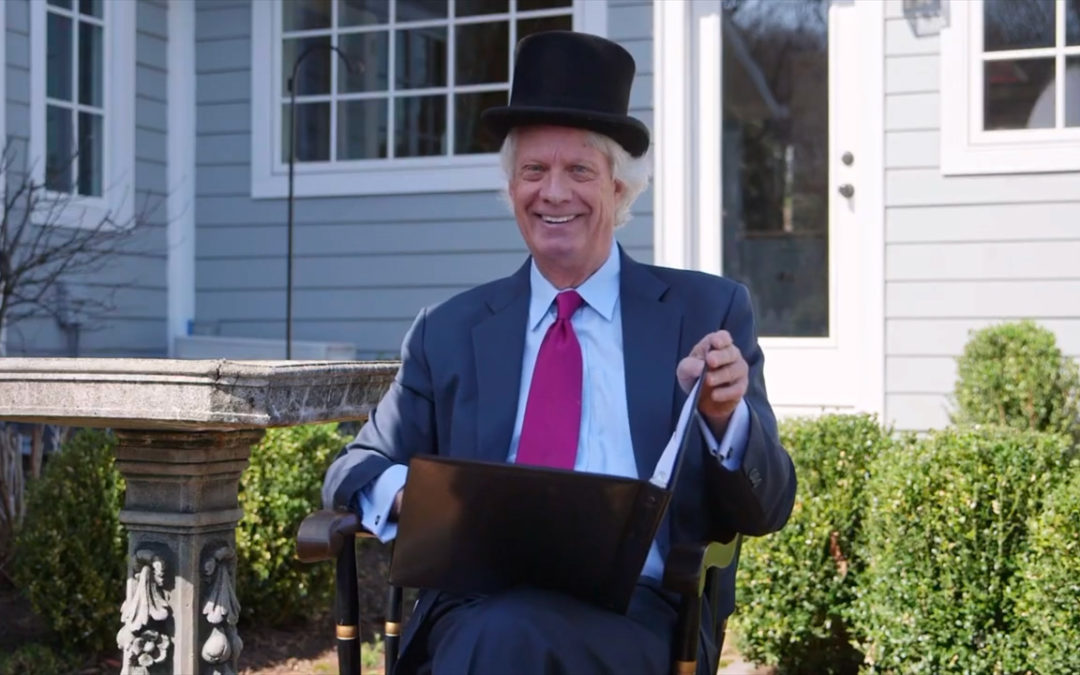
Dear Soon to Be Graduates…
I want to share joy, appreciation, and an observation during this hardship on all graduating seniors, whether from high school, college, or any school, during this, our second COVID Graduation.
I don’t really remember that much about all the details of my high school graduation. But I do know that the friends I made and that school itself still shape my life with a respect for the arts and a respect for the uniqueness of the lives of the different people of that school.
My college graduation I do remember, but more because I have made new friends each year when I return to carry out my responsibilities on the “Happy Committee.” The alums on the Happy Committee put on and manage the graduation each year, so I relive the happiness of my graduation each year by helping others celebrate.
In both cases, my memories of graduation have been shaped over the years by the present more than the past.
For the last nine years, I have written a humorous, often self-mocking ode, which I read at the Spring meetings of my Alumni Association. Last year, there was no graduation because of COVID, so my ode had to be videoed outdoors and delivered by Zoom at the meeting.
This year that ritual had to be repeated again, as a “pandemic déjà vu. ..all over again.” But this time I compared the university’s response to the influenza of 1918 with its improved response to the present pandemic, in again a humorous, self-mocking effort to tell a story of joy and uniqueness.
This year, my advice to those graduating is to stay in touch with your classmates. You will find that those reunions and the evolving friendships will make these strange years even more precious even though you had to suffer through a Zoom graduation.
My guess is that you will share the humor from all of this with your classmates over time, and the bonds will grow stronger because of the uniqueness of this year—and because you survived all the craziness.
“My Hat’s Off to You!”
You can view all nine poems here:
https://alumni.harvard.edu/community/about-haa/haa-poet-laureate
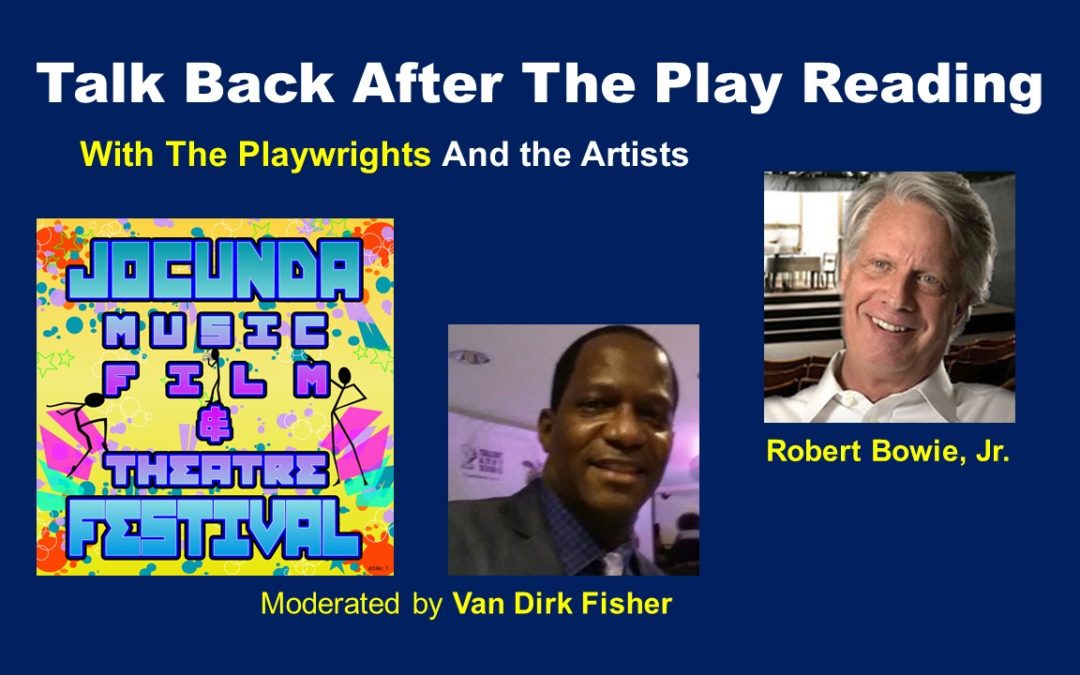
A Source of Inspiration
Yikes! Every day, in odd and different ways, I rediscover I am coming out of a dark place. So two days ago I needed someone I admired, someone inspirational, to show me some light.
So how bad was this bad place?
Two days ago, when I finished my first draft of a Covid Comedy about global warming, rats, bats and our place on the planet, I firmly believed my empathy had become misplaced by the pandemic.
The rats must be horribly embarrassed about dropping the ball 400 years ago, when their bubonic plague didn’t eradicate humankind once and for all. Because now, for the poor rats, it’s much worse.
The rats have been upstaged. These upstart bats are getting all the credit for COVID and the anti-homo sapiens dark web is reporting that the bats had unified all earth’s creatures for the great second global effort to liberate the planet. But the rats dropped the ball again because they are dangerously late coordinating and bringing out Bubonic 2.0.
Maybe it’s Stockholm Syndrome from eating human leftovers out of dumpsters for 100 years. I can feel their pain. After all, you are what you eat.
But think about how very sad the rats must feel now! Will they forever be remembered for being stupider than human beings who can’t stop global warming or polluting the planet or even stop killing their own kind and get vaccinated?
Yeah, that was dark! I decided I had better get back to creative and talented people to rediscover the joy which I had left behind.
I decided to call Van Dirk Fisher, an artist whom I admire greatly. I have never met Van in person. We have only met on Zoom calls but I have watched him work. He was the inspiration I needed.
The Black Experimental Theatre (BET) a.k.a. The Riant Theatre, was founded in New York in 1979, as a not-for-profit, tax-exempt organization, by artistic director Van Dirk Fisher. BET is a theatre that entertains as well as teaches by nurturing and developing new works by playwrights that encompass the historic and social progression of African Americans and the contributions the Black community has made in the United States. Last October, Van directed and staged a brilliant virtual performance of my play The Grace of God & The Man Machine in anticipation of a staged performance when the NYC theaters reopen.
Van is an inspiration first and foremost, both because he has and continues to make amazing art and because he overcomes the impossible, always. I saw him cast the virtual play brilliantly and then proceed to teach the actors how to use virtual backdrops, even though they were located in different states. He was so good, he got three actors in three different locations to pass a joint as if they were sitting at the same picnic table. He created both the intimacy of theater and the close-ups of movies.
The talkback afterwards had as many as 80 people participating while he artfully directed the conversation.
During the call, Van and I talked about his theatre and his accomplishments as well as about preparing for the performance of my play at The Riant Theatre.
Through the dark humor with its roots in despair came comedy, but from the dark comedy came a conversation with a Relentless Creator who brought me back to a balanced optimism with his joy.

Delusions of Grandeur and the Marathon Man
I can still feel the pain.
Over 15 years ago I jumped the gun and began training for the Senior Olympics.
I always had a plan. I had made my commitment, early in life, when I was in second grade. I committed the first moment that mandatory exercise was imposed at school.
I dutifully avoided strenuous exercise in order to have absolutely no injuries when I turn 90.
I always played goalie to avoid running laps. Hockey and soccer practice always ended with the coach talking shots on the goalie while the rest of the team ran endless laps… but not me.
No, I was strategically planning and waiting in order to let the great athletes of my generation destroy their bodies and knock themselves out of competing with me.
I decided at the age of 90 I would announce invulnerability with a big press release and maybe a huge parade.
There would be no Senior Olympic marathoners my age because by then they would all be broken down or dead and as the only competitor I could win all three medals in one race and even better, I could walk.
This was a perfect plan except I did not count on the mental error of premature delusions of grandeur.
Yeah. I made one big mistake. I started training too early.
The Marathon Man
In a world of educated guesses
About one’s loves, integrity and health
It is my custom to keep promises,
Even if they are only to myself.
Still being a tenth of a ton and all,
With sacred dictates of my religion
Requiring too much food and alcohol,
What made me train to run a marathon?
I trained on a treadmill, March to July.
Got my first “runners high” at fifty-five.
Depleted my life’s endorphin supply,
And blew out both knees and begged to die.
Ah yes, but to Hell with all of this fun;
Next year, for sure, I’ll be ready to run.

Accidental Beauty
One of the things I love about spring is it offers a welcome contrast between my focused pursuit of heaven in a church with a fresh reminder that we live surrounded always by the accidental beauty of nature.
Sunday Accidentally Spent
I’m by the pool on this sunny Sunday
With my wife and two children off at church.
I’ve pulled the Bible off the shelf, on display,
From its front row center prominent perch.
I’ll read it after The New York Times.
Midway through “The Book Review” I half-see
A Monarch butterfly in the sunshine
Hold the Book like a Christian “wannabe.”
Once you hold the Times, its history.
Finished. Forgotten. Trash canned people’s dreams.
But the Bible and butterfly as extremes?
The Christian code and the fatally free?
Did the two of them touch by accident?
And was my Sunday accidentally spent?

My First Spring
Okay more spring stuff.
It is wonderful to remember the first recollection of spring in nature and as memory.
Thus another sonnet:
My First Spring
In my mind I can recreate the breeze
That gathered me and took me into Spring
While the snow melted after the last freeze
And my life as a boy was beginning.
Out the kitchen door, still eating something,
Late and half running as I pulled the books
On to my back and headed down hill, being
For the first time the product of my looks.
How could life have become so inviting?
How could the world warm with the thoughts of girls?
How could the clock of a planet spinning
Harmonize with these two so perfect worlds?
Odd how I can create that breeze today
And that boy comes alive in yesterday.

Can You Feel the Pure Joy of the Coming of Spring?
We have had three successive blue sky sunny days and slightly elevated temperatures in Maryland as the COVID nightmare begins to wane and the joy of life returns.
All of a sudden with the early creativity of spring there is mischief in the air and the planet reminds me of how fortunate we all are to be here together.
As a result, I have charged back into the things I love.
Mind the Art Entertainment is producing a radio play version of The Grace of God & the Man Machine, prior to the planned stage performance at The Riant Theatre when the theaters open again in New York.
In addition, I have returned to my work on a book of 52 sonnets to be published and available on Amazon by Christmas this year. In celebration of this newfound ribald mischief, I publish here one of these poems:
The Facts of Life
I swam, back then, with some father’s daughters,
Back stroking only slightly out of touch,
Out to the raft in the starry waters
And never thought of their fathers all that much.
My child, don’t judge me till you’re fifty-five
But there were midnight visits to “Ice House Pond,”
In my misspent youth, when I was still alive,
Where couples would strip, and swim and then bond.
And my child, this I know for sure is true:
At seventeen we all are born to be free
But ’cause I’m your father and I love you
Please consider this seasoned advice from me:
As you lust for life avoid the crudity
But don’t miss occasional sponti-nudity.
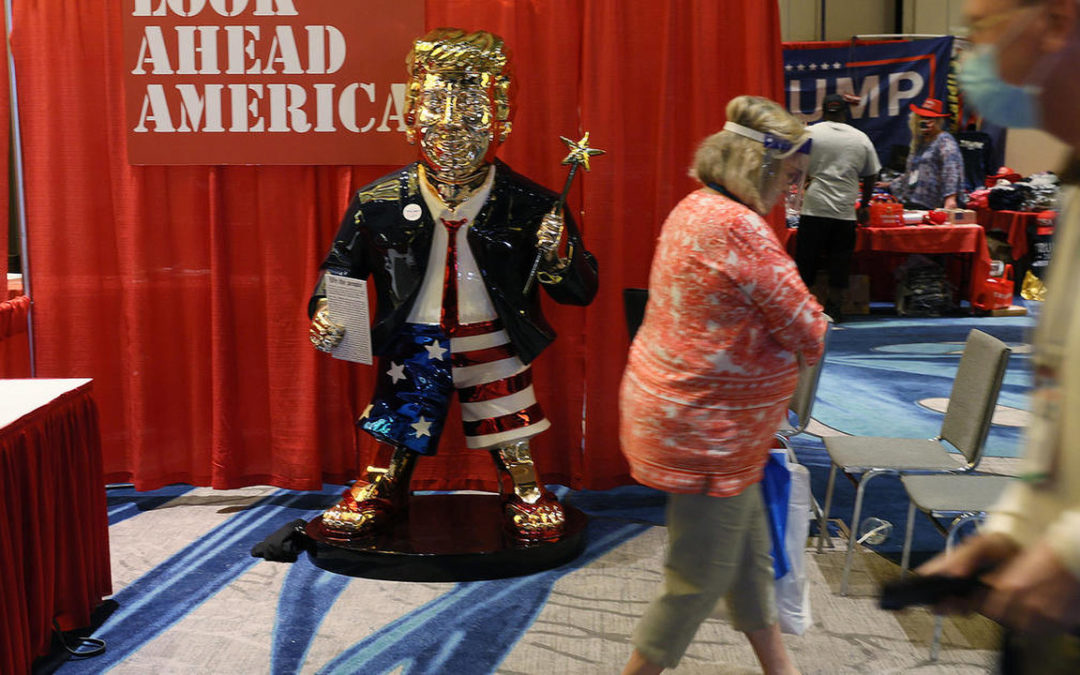
The Little Death and The Big Lie
You know all those starry-eyed men and women who describes sex like “an earthquake”? Well, they’re gonna love fascism!
You think this fantasy has not finally become a reality. Well, who paid off a porn star as a campaign expense?
The statistical proof that the world’s population is increasing much faster than the number of earthquakes is fantasy for these people, but so is fascism. They are just loyal Americans following a former president who led an insurrection on Congress.
They bought “the big lie.” The lie that the “little hands” man won. What are those hats that say Make America Gigantic Again?
These people believe anything that might lead to an orgasm. La petite mort. They have no political agenda other than themselves and their orgasm. It must be treated as a sickness.
Last Sunday, CPAC sullied the conservative GOP’s good name at a fascist rally in Orlando Florida. Trump again unzipped the big lie and his fascist followers, who refuse to impeach him, treat it like a game for winning re-erection.
These senators have embraced their hypocrisy because they know they are safe. They use advance information about the COVID hoax of pandemic to insider trade their stock portfolios and take vacations to Mexico when their states are in turmoil. They don’t care. They will not be sanctioned. They’re delivering “the orgasm” to their followers.
If you think the attack on our capital led by a former president is anything less than the first step toward a revolution, bend over…
The Electoral College has repeatedly given Republican candidates the presidency despite a popular vote for the Democratic candidate in the past. And now 43 states have introduced more than 250 bills to restrict access to voting, ensuring that this minority will prevail based on “the big lie.”
The Supreme Court will hear the latest voting rights case and will likely uphold the restrictions. The Supreme Court, largely appointed by Electoral College Republican presidents, has been very hard on voting rights.
The fascists have always been there. They have hidden in the Democratic Party as well as the Republican Party. Hanging black people was a campaign event. One of them assassinated Lincoln, giving birth to the states’ rights arguments of the Jim Crow laws, which overturned democracy in the former slave holding states in the South.
If you think the attack on our Capitol lead by a former president followed up by CPAC is anything less than the first step toward a revolution, bend over and enjoy your earthquake.

Sympathy for the Devil
This may be the start of a conspiracy theory, but there is a really big question hanging out there:
After that “freak” snow storm in Texas you’ve got to ask yourself, is Punxsutawney Phil, that Pennsylvania groundhog, a Democrat or a Republican?
Think about it. What if that “freak” Texas snowstorm was about gathering support for the Green New Deal?
It sure looks like the “the deep state“ because the coverup is so clever.
It’s true. Think how hard it is to prove Phil’s party affiliation.
The election was stolen in Pennsylvania, so his vote was definitely destroyed and so “ipso facto” we will never know how he voted.
There may be even no evidence that he even registered to vote!
Just watch. The coverup is clever!
The Dems always want it both ways. They will say he had to vote by mail because groundhogs can’t sneak into voting places unnoticed so his vote should be counted.
But don’t get fooled by the lie that he voted by mail! Everybody knows he was in hibernation in November.
Lock him up! That groundhog should be indicted, unless Phil was actually a groundhog just trying to do its civic duty and he actually did see his shadow, but this was suppressed.
Did you see the press conference? Yes?
Remember after we were told that Phil saw his shadow?
Didn’t Phil look kind of unreasonably sleepy after months and months of hibernation?
He never actually said he saw his shadow, did he?
What happened to his First Amendment rights?
Very clever! Genius! Avoid the indictment by getting a groundhog to do your dirty work. And then, trust me on this, they cut lose the Sky Laser to redirect the polar winds to Texas!
Rush Limbaugh died last week. He was a true genius of radio and polarizing conspiracy theories: Obama‘s birth place, for example, or the 2009 healthcare bill that would empower “death panels“ and “euthanasia“ for elderly Americans. Even during his final broadcast, he insisted to listeners that the new administration had “not legally won it.”
He created this kind of talk radio. “There is no talk radio as we know it without Rush Limbaugh; it just doesn’t exist,” according to Sean Hannity the Fox news commentator. “I’d even make the argument, in many ways there’s no Fox News or even some of those other opinionated cable networks.“
Early on, he built conservatism as a satirist who evolved into the source of information for an ever- growing angry group of Trump supporters. Global warming was a “hoax”, the homeless were “compassion fascists,“ abortion rights activists were“ feminazis.” He championed homophobia and called a female law student “a slut” because of her testimony in favor of health insurance coverage for birth control: “If we are going to pay for your contraceptives, and thus pay for you to have sex. We want something for it. We want you post the videos online so we can all watch.”
The FCC “Fairness Doctrine” was introduced in 1949. It required the holders of broadcast licenses to fairly present controversial issues of public importance and to do so in a manner that was honest, equitable, and balanced. President Reagan eliminated the policy in 1987.
Rush Limbaugh made a handsome living after the end of the Fairness Doctrine. According to the February 18th New York Times, he collected $85 million a year and lived in a 24,000 square-foot oceanfront mansion in Palm Beach. He had a half dozen cars one costing $450,000 and a $54 million Gulfstream G550 jet.
Shortly before his death, the president gave Mr. Limbaugh the highest honor American government can provide to a civilian: The Presidential Medal of Freedom.
The protection of political speech does not protect the trafficking in misinformation.
Democracy, for its survival, depends on the truth of its information.

Welcome to the American Amusement Park!
If you witnessed the 57 to 43 impeachment vote which exonerated former President Trump and then witnessed Mitch McConnell’s speech immediately thereafter condemning Trump after he had voted for him, you get a free pass for the new roller coaster (“RNC”), which just opened in our All-White American Theme Park.
Included with the ride you get that picture of yourself with your hands in the air as you descend screaming into free fall.
You can use this picture on your driver’s license or your passport. You pay for it with your taxes and the 1% get it free.
But Mitch knows what he’s doing so don’t worry about it. He is the magician, expert of the sleight of hand.
After the House voted for impeachment, he refused to return the Senate to vote during the waning days of the Trump administration. He then declared that because Trump was out of office, he constitutionally could not vote for the impeachment he had delayed.
It is genius. With the vote, Mitch kept all of his angry MAGA followers while reassuring the 1% who have been recently fleeing the Republican ranks. Trump, he was promising, will slowly be made miraculously insignificant as his MAGA voters get reprogrammed.
Can he pull it off? Is it worth it? You have to be careful of roller coaster rides. You know how they get all creaky when you go zooming around on shaky foundations.
Why does it seem that Trump’s unflinching base always seems unified by anger?
Because the Republican party has always kept in its little secret in its closet — with Willie Horton and “dog whistle politics,” and the unity of fear of anything but a White America
McConnell’s problem is that Trump didn’t keep the secrets. He over energized the hidden heartbeat that has really propelled the republican party at least for the last half century and the South forever: White supremacy.
Trump had overreacted, gotten greedy and gave away the secret and now everything may be exposed and disclosed.
What if the Republican Party has slowly been evolving to stand for nothing other than to hate the Democratic Party? When the screen is pulled back there stands the rich puppeteer who makes his haters dance.
“Trickle-down economics” was the lie of the Reagan administration, which was denied by even Reagan’s own supporters in the end. But it was resurrected by Trump in defense of his tax cuts for the rich.
Newt Gingrich and the Tea Party preached the “spendthrift Democrats” and all unified behind a balanced budget, but Trump has exploded the deficit.
How about the lie that Republicans are good for the economy? Since the 1930s, the economy has raised by 4.6% during Democratic presidents’ administrations, compared to 2.3% with Republican presidents.
It was built into the Constitution‘s DNA and with it the Republicans in all but this election have recently lost close Democratic votes but taken the presidency with the electoral Congress.
Slowly but steadily the American theme park has evolved into a haunted house of lost ideals with the language of the Constitution over our heads as each new generation optimistically walk in as believers.
We are better than this!
America needs a party of Lincoln that is dedicated to equal protection for all and also a party of fiscal and military restraint and good judgment. Washington, Lincoln and Eisenhower offer us great examples of what Republicans could be for us now.
The party of the South can no longer dominate us. Equality is good for the economics of this country and therefore everybody in this country. Why hold ourselves back? We don’t have to be afraid of our brothers and sisters of the human race.
Let this old creaky roller coaster fall.
Even Malcolm X realized that no laws can reshape a bigoted human heart. Painfully but realistically, he prophesied:
“Do you know what integration really means? It means intermarriage. That’s the real point behind it. You can’t have it without intermarriage. And that would result in disintegration of both races.”
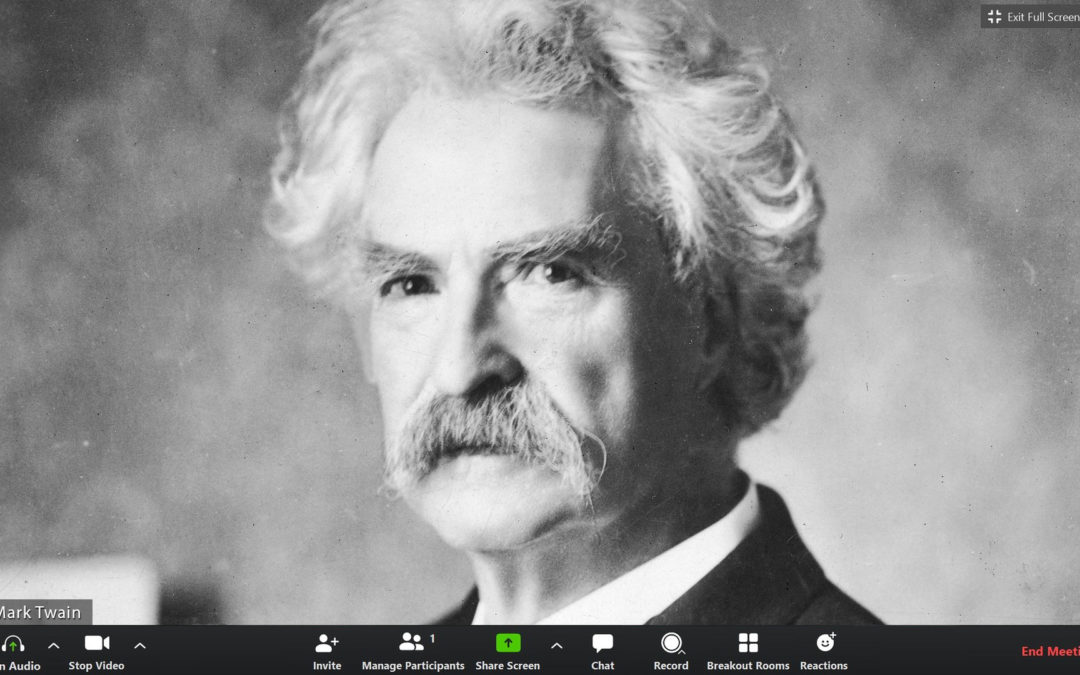
Zoom Séance
The first rule of trial law is if the law is against you, argue the facts. It appears the first rule of impeachment is if you don’t have the facts or the law, make something up.
The law doesn’t help Team Trump in this impeachment because the country has been impeaching federal administrative officers after they have left office from the beginning.
The facts are all on film: Trump is on tape saying “Fight! Fight!” and he was not at a football game in a kick line of cheerleaders.
This is tough, but it may not be impossible for Team Trump.
The only winning argument that I can see for the Republicans is the previously untested “historical Zoom call.”
Rudy Giuliani is just the man to quote the Zoom call he had with King George III during his pretrial prep. The king confirmed that because the American Revolution was not an act of “sedition,” we are still British subjects. Therefore, the United States Constitution is unconstitutional.
He can rely on what we already know, which is that Zoom calls are really just séances: “King George? King George are you there? We can’t see you!”
Handled properly this is not a bad argument because:
1) No one has the facts to deny this
2) If there are questions, Giuliani, as an officer of the court, will swear that it’s true
3) Fox News will confirm it
4) The Senate has already made up its mind
Furthermore, Giuliani can forcefully deflect criticism by arguing that it is just those insensitive Democrats again. After all, King George is a senior citizen, and this is new technology! And also, he’s dead.
If Fox News broadcasts this, half the country will believe it!
What will protect America? How do we win back the hearts and minds of our fellow countrymen and women?
I know! I know! A counter Zoom call with Mark Twain!
Mr. Twain, how can we save ourselves from these despots? We can’t defame a dead king to depose a fascist president!
“Our papers have one peculiarity — it is American — their irreverence… They are irreverent toward pretty much everything, but where they laugh one good king to death, they laugh a thousand cruel and infamous shams and superstitions into the grave, and the account is squared. Irreverence is the champion of liberty and its only sure defense.“
Do you mean don’t take them on at all? Next, they will have the Christian churches preaching it from the pulpit! Remember “In God we trust?”
“The devil’s aversion to holy water is a light matter compared with a despot’s dread of a newspaper that laughs.”
But I have been raised to believe that there will always be heroes that will protect our constitution!
“We all live in the protection of certain cowardices which we call our principles.”
Mr. Twain may have something here after all.
My recommendation is that the Democrats give the newspapers something to work with and not put up an argument at all. In place of legal posturing that will not persuade the Republicans in the Senate, simply hand out happy faces and little American flags that can be waved with syncopated knee slapping instead of objection or logical argument.
Have we really come to this?

Don’t look for me today baby!
Today is the most degrading day of the year if you are a groundhog.
Once again, humans are holding you responsible for predicting the environment.
At my house, we have a dirt basement with a trapdoor, where we keep an extensive collection of junk like old grills, a sun lamp, summer sports equipment including golf clubs, Wiffle balls, bats, and even the scuba equipment I use to sit on the bottom of the pool during impeachment trials or when I generally can’t stand people anymore.
I try to live in harmony with the universe.
Last summer, a groundhog moved in under our house. We lived in harmony. It would watch us play Wiffle ball as it ate our garden-fresh vegetables.
But just imagine what it must be like to be a groundhog this year, after a human pandemic and knowing half of all humans don’t believe in climate change?
I wouldn’t come out either.
But this year I need spring more than ever. So, this morning, before I even made breakfast for myself, I made a salad from fresh vegetables with nice cherry tomatoes and delivered it just outside of the hole under my house.
But then the empathy set in. It is a dirt basement after all. The groundhog is probably set up down there with its little gas mask on, only taking it off when it has to exchange the scuba tanks.
He is probably down there with the sun lamp on, sitting in my lawn chair with a wife and two kids waiting for the Super Bowl.
What if he has given up on global warming, too?
He probably doesn’t want to be an animal anymore. My guess is you could bring in Noah’s ark and the groundhog would probably blow it off.
What if over the entire earth not a single groundhog comes out this year? Not to spread conspiracy theories, but that would raise concerns that they may be talking to each other. They may be smarter than we think.
I can handle this! Genetics taught me about the end of the road. I know about stuff like this. I’m related to Jim Bowie. He died in the Alamo.
I am going to get a bottle of my best wine, three wine glasses, a couple of juice glasses for the little ones, and knock on the trap door.
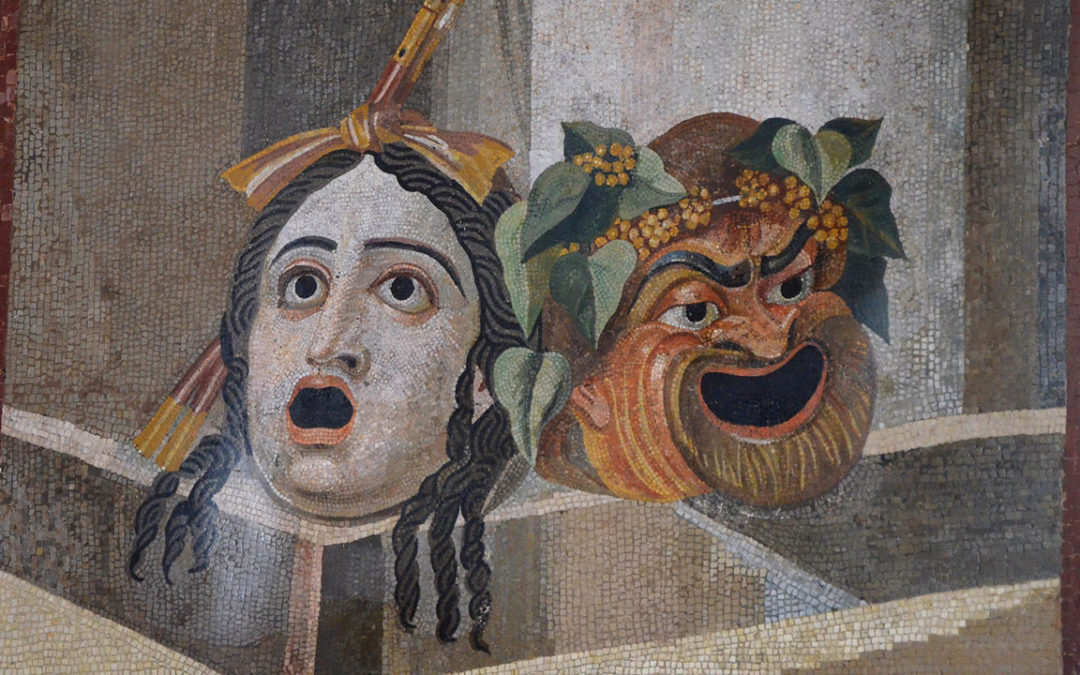
Welcome to “Hangry Theater”!
We should be thankful that even though the theaters are closed we still have an alternative opportunity for “the willing suspension of disbelief.”
But what kind of alternative is it? Is it traditional tragedy? Is it comedy? Is it maybe the return of the satyr play — the last play in a Greek tragic cycle that featured all forms of bestiaries like farting and gross sex jokes to send the crowd off to the exits laughing?
This new form of theater doesn’t need a gathered audience. It can be dispensed through the endless dark web, Twitter and other social media, supplemented by Fox and MSNBC.
It’s brilliant. We all watch it. We can’t take our eyes off of it. It has merged “reality TV” with “enlightened self-interest,” but it doesn’t quite work.
It’s not Oedipus Rex: A former president meets democracy at the cross roads and brags the Statue of Liberty loves to be goosed.
It certainly is not like Julius Caesar either, where the Senate rises up to save the republic from a tyrant.
Wait one minute — what if it’s for a new kind of audience?
What does this new kind of theater provide?
It’s not just surround sound, it’s surround reality. Can’t get much better than that. Who needs those big crowded noisy theaters when you can keep your headset on and go to your own bathroom?
Regrettably, this new kind of theater may not be good for traditional theater. In traditional theater, the producers fight for money to put up their shows and maybe one out of five return a profit to investors. But with the recent “Trump Bump,” polarization is making everybody money, including MSNBC and Fox News.
This new audience is happiest when it is angry at somebody else because that’s what keeps the political parties flush with money and the audience shoveling more and more into campaigns, congressional healthcare, and retirement.
If you don’t know who is running the Republican Party, don’t ask — just watch the impeachment proceedings. But please don’t expect an answer, because right now I’m not sure if the Republican Party knows.
The only thing for sure is that the audience will be “hangry” — hungry for anger — the perfect couch potato entertainment.
After the Super Bowl and maybe “60 Minutes,” I’m sure they will let the lions out of the Colosseum and we can watch Rome burn.
It is a satyr play and we may be the actors, not the audience, but we are still free… to leave laughing.
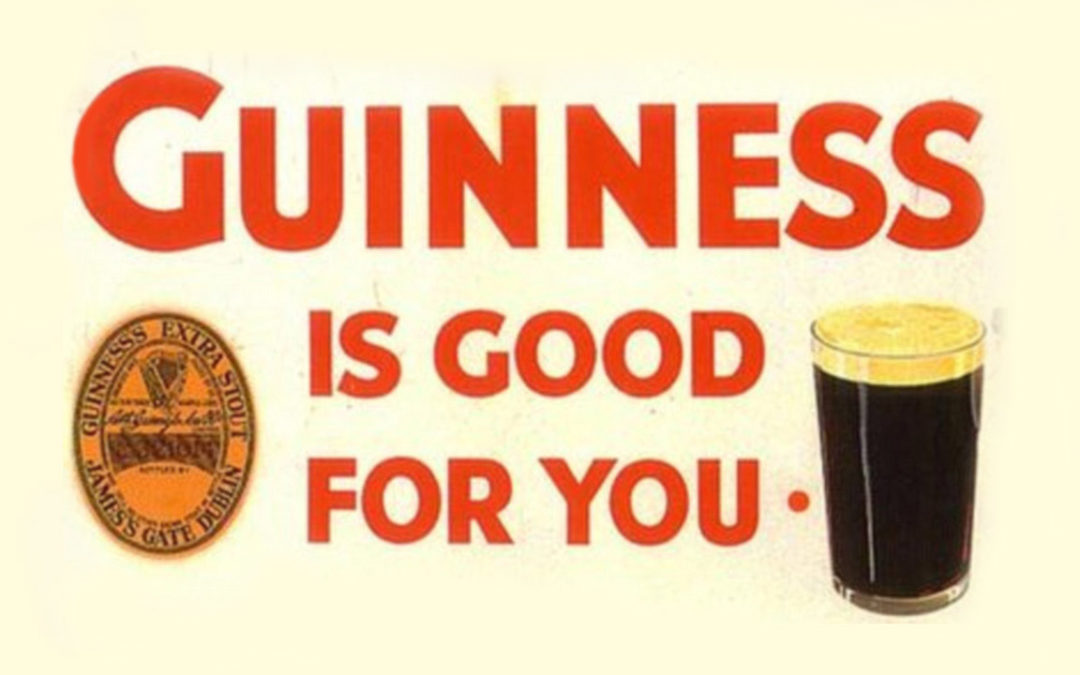
What Is the Fair Market Value of a Conspiracy Theory?
Almost 50 years ago Guinness decided to sell alcohol in the American market. It put up billboards with the slogan: “Guinness is good for you.“
That was OK in Ireland but not necessarily in the United States. Guinness couldn’t really prove that it was the truth.
So in fear of being sued in American courts for “misrepresentation,” they changed it to ”Guinness is for you.”
For the last four years, President Trump has used Fox and social media to build his base with willful misinformation. And after he lost the last election, he claimed the election stolen was from him, a claim repeated endlessly by him and others on Fox and social media.
He could not prove it was the truth, because it is not, but maybe he doesn’t have to.
The question is: was Trump’s misinformation worse than a Guinness hangover?
Trump used this misinformation to encourage his supporters to come to Washington on January 6th to disrupt the Electoral College certification of our election.
The House of Representatives and the Senate were attacked and our elected officials were put at risk. Five people died.
American courts recognize and award damages for the dissemination of misinformation in commercial maters in the form of false advertising and in personal matters as defamation (formally libel and slanderer). But when it comes to misinformation delivered as political speech, it gets more difficult. The 1st Amendment largely protects that speech because it is political, but let’s follow the money.
Is free speech political? Or is it property, which can be sold to make money even if it is misinformation?
On October 12, Fox paid millions to the family of Seth Rich for repeatedly publishing the lie that he had been involved in leaking the DNC emails during the 2016 presidential election when in fact a Russian intelligence officer had hacked and leaked the emails. There was no truth or factual basis for the Fox story. Fox continued to broadcast it anyway. Fox settled the case before Lou Dobbs and Sean Hannity were set to testify under oath.
What makes this interesting is that part of the settlement required that it could not be disclosed until after the election in November.
Doesn’t this Fox settlement requirement both confirm that their reporting was political and acknowledge that it was false all along?
If you can afford to pay for the lie and even profit from it, it’s OK? Is the difference between the settlement and the profits generated for Fox from the marketing of misinformation the fair market value of propaganda in America?
It is business. It is politics. The business of American politics. But what is for sale?
The influence over the American voter is for sale, but is the country at stake? Is the price tag for our country the cost of the propaganda it would take to buy it?
Can this really be what the framers intended? The revolution? The Constitution? The freedom of the people from King George? And then give King George complete immunity and absolute power if he becomes the president?
It is amazing how we rationalize the truth. Over the last four years, maybe Guinness has been good for me.

The Trick or Tweet Nightmare and the Future
You don’t really know what’s going on unless you have the courage to read the tweets and live in the misinformation of his campaign. If you really think that this all will go away with an inauguration of a Democratic president, you’re crazy!
The Biden victory did not affect most of the embedded state and local Republicans candidates who rallied around and were supported by Trump. That divisive campaigning has not stopped.
It has increased with an attack on the legitimacy of the election and certification, which has been supported by Republicans who are still afraid to challenge the president.
As reported in The New Yorker, Stuart Stevens, a Republican strategist who advised Mitt Romney in 2012, tweeted: “The bottom line is that the @GOP has become a threat to democracy…it’s a clear and present danger and should be treated as such.” (Emphasis added.)
Steve Schmidt, a Republican campaign strategist for John McCain in 2008, called Trump Republicans “an American autocratic movement with Fascistic markers.” (Emphasis added.)
Below is a video that was posted on Twitter by President Trump 12/23. It’s a 17-minute video split into two parts. I wouldn’t want you to have to watch the whole thing but check out the second half. This tweet multiplied with 111k retweets, and 10.4K quote tweets and received 265K likes.
— Donald J. Trump (@realDonaldTrump) December 24, 2020
Since the election, Trump’s efforts to take over the country have gotten more extreme, culminating in efforts to overturn the vote of the people.
Abraham Lincoln, also a Republican, has been quoted as saying “You can fool all the people some of the time and some of the people all of the time, but you cannot fool all of the people all of the time.”
Actually, Abe, all you need is 49% of the vote and the Electoral College.

Down a Chimney? Really?
A child’s memory of Christmas viewed through a grandfather’s eyes
Like a massive multicolored parachute
His boxers have collapsed upon the floor
Slightly south of a wrinkled Santa Suit
That was left just outside the bathroom door.
A bunch of imagined elves in repose,
Smoke’n cigarettes, feet on the table,
Hang’n out and laugh’n ’bout Rudolf ‘s nose
Are love’n life as only elves are able.
Another Christmas, is at long last, past
As the fat man shampoos in the shower
And thinks of golf and summer thoughts at last.
Who’s this metaphor for redemptive power?
An old fat guy driving a sled with gifts?
A father at midnight is what it is.
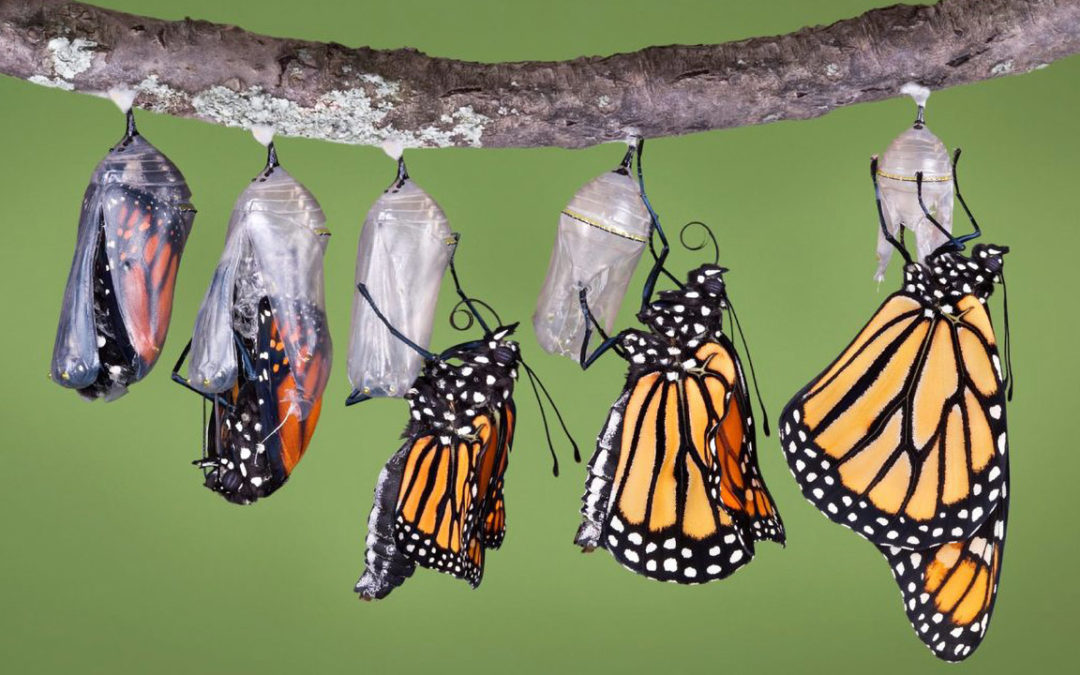
My Metamorphosis
What is the matter with me? Is this pandemic changing my DNA?
What could be worse is that I am afraid that my house has become a COVID Cocoon but I sure as hell don’t feel like a butterfly in the making.
The only thing that might be worse is when you can’t get a song out of your head or… you start your own song and it rhymes and you can’t stop thinking you are… becoming a bug.
“So what did I do to get rid of this?
I went to the bookshelf but what did I see?
The first thing I saw was Kafka’s Metamorphosis
And I knew this was getting much bigger than me.”
It is true. The only thing worse than when you can’t get a song out of your head is when you know you’re becoming an insect.
My entire life, up to this point, all I knew was slap, squash, or use the fly swatter. I had never really paid attention to bugs. I just killed them.
Bugs clearly have individual intelligence and different IQs. Ants are organized, bees, and hornets are organized and mean, houseflies are existential daredevils, moths get suicidal, and stink bugs are just plain stupid.
Have you ever seen an ant make a decision? They are clearly deliberative and change their minds. I recently observed a particular ant for 15 minutes or so as it stopped, changed direction, exercised preferences, and hunted and gathered in my kitchen. It was just like me at the grocery store when I don’t have a shopping cart.
I clearly had to get out of the cocoon fast and go grocery shopping.
I got in the car, but imagined that there would be a sign on the grocery store door that said “No Bugs Allowed.”
I became frightened.
What scared me was the logic in that. The store obviously did not want bugs inside, but what about me? Don’t I have feelings too?
Once inside everyone was wearing masks and picking through the vegetables. They all look like unique little bugs with different IQs and shopping carts.
What does it mean that during winter they don’t sell fly swatters?
Then things got messy:
Maybe it’s all reverse reincarnation and the bugs were just waiting because they don’t want to become humans in a pandemic? Of course, that meant we had a lot in common, the bugs and I. Maybe Darwin was right. Maybe I’m not a caterpillar yet because I hate salads?
Maybe we — I mean all of us — wonder if we are being insensitive as we share the same universe?
Or maybe it might be nice if, one bright morning next spring, if I left my damn house after this whole thing is over… as a butterfly?

This Argument Ain’t Over
The primary issue of every leader in any democracy is to protect and preserve free speech based on credible facts and information to ensure that the people control the government rather than the government controlling the people.
When faced with Covid, the Democratic Party defined leadership by asking “What is the best way to solve this national crisis?” They insisted the answer was to follow the best available science. Trump, however, defined the issue by asking “Why should American freedom be curtailed by overbearing mask wearing liberals and political correctness?”
For Trump, the primary issue has always been how to define the Democrats. He vilifies them on Twitter and supports media that broadcasts conspiracy theories, unsupported false information and propaganda in order to polarize his base. The Democrats have always been blind to this. It is really not a policy dispute.
Trump lost the election but this argument isn’t over.
Trump received 74 million votes and remains the voice of the Republican Party. It has been reported that over half of all Republicans believe that the election was stolen and Trump won.
The issue now is how can the country address this polarization in order to preserve its democracy.
The First Amendment broadly protects anything related to free political speech, so a democracy cannot rely on the government to police and protect the voting public.
In the alternative, the president of a publicly-held company would be liable for a breach of fiduciary duty for the Covid loss of life which could’ve been prevented if not for his self-dealing at the public’s expense.
Could the Justice Department create a special prosecutor to investigate and prosecute Trump for obstruction of justice, violations of the Hatch Act and many other examples of malfeasance? Yes.
What if Trump pardons himself? This has never been tested and the authorities are split, but I am virtually certain that he could not. There are endless Constitutional textual analyses available, but a self-pardon would imply the founders granted an American president more power than the king they hated, and placed the President above the law.
The people could, through their legislators, lift the protection preventing civil law suits against private companies, such as social media in defamation cases. That is not government shutting down political speech — it is just permitting damages for false speech at the expense of a private citizen or companies. But it sure could change behavior if their revenues were put at risk for profiting from the political polarization.
The only solution is that the people must protect their own government.
Public discussion to change public opinion is the only solution. It is our own individual responsibility to find ways to revive public speech.
Democrats need to listen and may need to forego prosecution or vindication rather than prove to themselves they were always right. The Democrats have always been blind to this. It is really not a policy dispute. It is a private obligation.
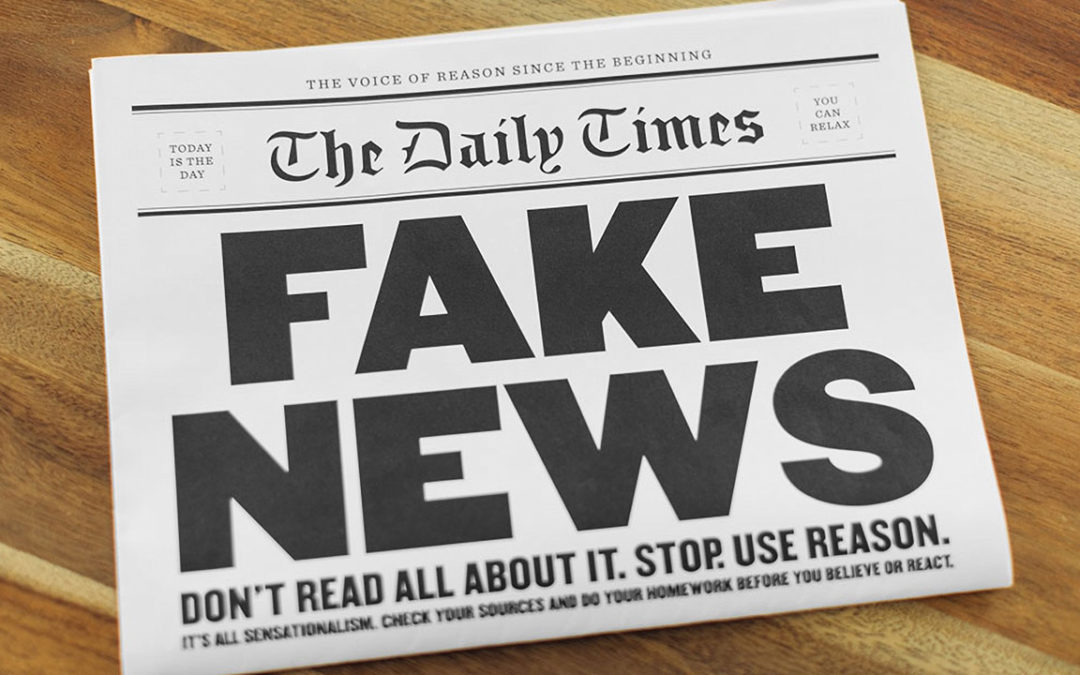
Political Word Pollution in America
America, when it was created by its Constitution, mandated free political speech as a necessity for an open and free society.
All of that is at risk now, given the past administration. The most damaging is the legacy of “fake news” and the resulting propaganda.
Prior to the Internet, political news was sold by a press that was dependent on the reputation of the newspaper which sold it. The source and credibility of the information is what gave it value to the consumer and the advertiser.
Since the Internet and social media, these safeguards have been largely lost because the credibility of the writer and supporting facts need not be disclosed at all and therefore anything can be pitched as credible including propaganda and fabricated conspiracy theories. It is all the same unless the factual credibility and bias can be challenged reliably.
A newspaper Publisher is presently liable for “actual malice,” as liable as the writer of the article. However, social media platforms are legislatively protected from this same liability by Section 230 of the Communications Decency Act. What makes it worse is if there is no liability there is little or no incentive for these media platforms to police the speech they publish. And what makes it even worse is political advertising in a polarized country has been very lucrative.
The media platforms claim that they cannot possibly police all those who publish anonymously on their portals. But they can and the price to our country is too great if they don’t.
If we file to create a corporation, drive a car on the highway, use the court system, or do just about anything affecting the health and safety of our city or country, we as individuals are accountable for the truth of our identity and the information we provide in order to get licensing. But anyone, American or not, can publish on the Internet and disappear.
This is a battle which is about to go into full swing and where we live will be determined by the outcome. Our free speech and our democratic government are not “free.” We assume responsibility for preserving them or we all lose together.

Voter Loyalty and the American Pastime?
For almost 45 years, I have lived in Baltimore. As a family, we always went to Orioles games together. However, I grew up in Boston and every once in a while, my son looks at me and says, “You’d better not be a closet Red Sox fan!”
I said nothing under the heavy weight of the unspoken politically correct vote to make Baltimore great again: There would be no Red Sox swag or such propaganda allowed in our house!
What is this propaganda, this loyalty that shuts down discussions of the merits of the Red Sox, my former home team, and why can’t I have this debate in my house?
A long time ago, a law professor asked me, “What is the difference between a catcher who receives the pitch and moves it over the plate to convince the umpire it was a strike and a football player who fakes an injury to stop the clock?” The catcher was an advocate, because the umpire always could see the pitch. But the football player was a propagandist — a marketer of misinformation and a liar — not an advocate.
Has propaganda fed the polarization for the last 30-plus years at the expense of the love of the game?
The victorious Democratic Party had better start celebrating the game, not the team, because the game is at stake. It will be very hard to do, because the Democratic Party has done nothing to understand the 70 million people who voted for Trump. The party has furthered polarization by caricaturing and mocking the Trump Republicans. Maybe they are not all racists, sexists, hayseeds, or billionaires?
In 2014, I ran for office as a Democrat in a gerrymandered Republican district and was summarily defeated. I knocked on well over 5,000 doors, and almost everyone I met was open and friendly until I disclosed I was a Democrat. Then they slammed the door in my face.
In 2016, my neighborhood was flooded with Trump signs. This election, there were far fewer Trump signs, but often in their place were signs for a Republican candidate running for Elijah Cummings’ vacant Congressional seat. The Republican candidate was African-American and a woman. Was the Republican Party more important to my neighbors than her race or sex?
In a democracy, there is little or no protection against propaganda. Because we value free political speech, we cannot legislate against it. One person’s advocacy is another person’s lies. The only defense we have to protect the game is to talk to each other, discover the propaganda on both sides, and reject it together.
When my son was seven or eight years old, I took him to Fenway Park to see the Red Sox play the Orioles. He insisted that he deck himself out in full Orioles regalia, orange hat and shirt. He was loaded for bear, as were the Red Sox fans all around us. For about three innings they heckled each other, which ultimately turned into a mix of respect and laughter. As we were walking out, he turned to me and pronounced, “Dad, their fans aren’t that bad. And Ted Williams? They may be right about him… maybe.”
Baseball is America’s pastime and maybe that’s why there are so many innings. Maybe it’s a long game because everyone around you must talk to you, if only just a little, no matter who they are or what their political party may be. It’s part of the game.
If we let them, they will argue about everything: balls, strikes, the wisdom of that pitch or this player — but there is no propaganda. Everyone has a seat at the game. You argue for what you actually see. If you buy obstructed vision, you pay less.
I want to get back to the American pastime. To start talking to strangers again when we meet and we are reseated at a game where we have come to cheer on our team, yes, but are also celebrating the game itself and its longevity and history. After all, we are Americans who have historically thrived on disagreement and compromise. It is what has made us who we are.
Maybe it’s time to throw out the first pitch, ask the first question, and then listen and learn.
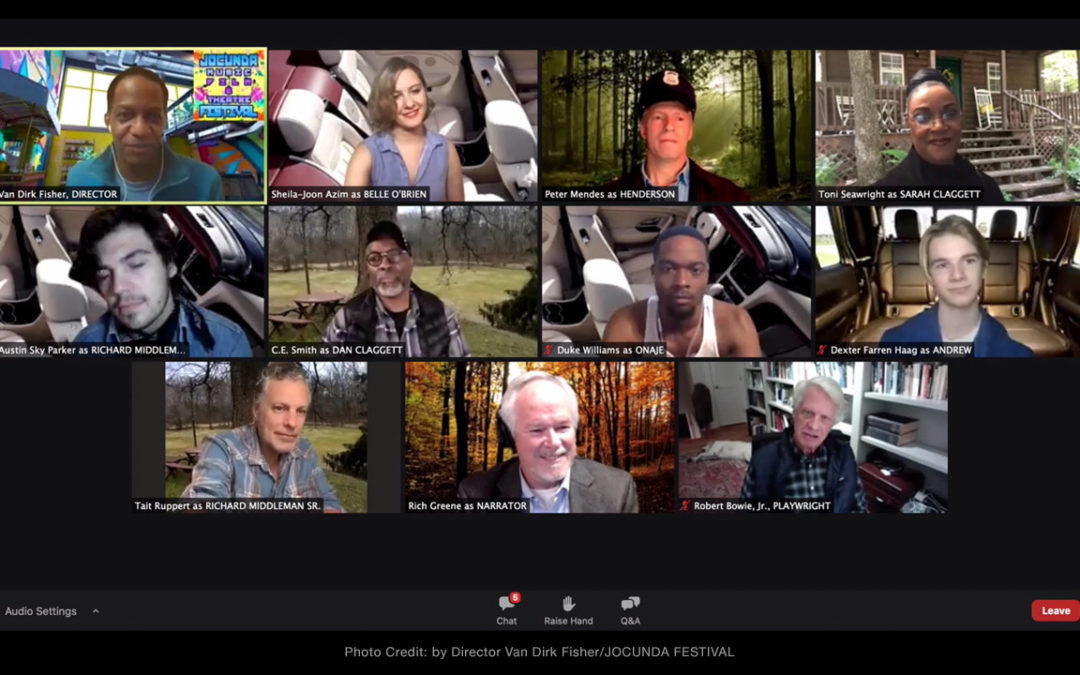
This May Be the Future of Live Theater
Last Sunday’s Zoom performance of a staged reading of The Grace of God & The Man Machine may offer an introduction to the future of theater.
The new format was advanced by a remarkably effective merger of the immediacy of live theater and the dramatic impact of the cinematic closeup.
The actors Duke Williams, Toni Seawright, C.E. Smith, Austin Sky Parker, Sheila Joon Azim, Tait Ruppert, Dexter Haag, and Peter Mendes brilliantly rose to the occasion with only four rehearsals and Van Dirk Fisher, the director of the Riant Theater, before a large and universally appreciative but invisible audience, magnificently shaped a new art form.
Judging from the chat rooms and the talk back after the performance, it was a huge success.
Maybe this is the future of theater even after the pandemic is over. Theater has always been an art form for live audiences. Cameras were reserved for the waiting room for those who were late to the performance and videos of theatrical performances always fell flat but maybe it will be different now.
Director Van Dirk Fisher and the Riant Theatre placed virtual backdrops behind the actors and the actors, all separated and in some cases in different states, reached out and past a joint between each other and exited and entered as they stepped in or out of the camera in front of which they performed alone.
The traditional narrator became a character in the performance, offering stage directions and blocking instructions as if he was organizing his remembrances of the story.
The reading took on an immediacy that a staged reading cannot provide, but the degree of difficulty remained almost unnoticed for an audience which tuned in from New York to California.
The infectious immediacy of theater and the dramatic impact of the cinematic closeup? Why not? Live sports events come to life for the fans in attendance and at the same time offer the close up for those viewing the game at home.
Van, always the scholar, always the innovator, always pushing ahead, told me that Zoom is perfecting moving backgrounds, such as a view of the highway from the car in motion. Imagine theater sets that move to support the live action of the performances on stage.
This could be coming as the innovation created by these remarkable creative artists.
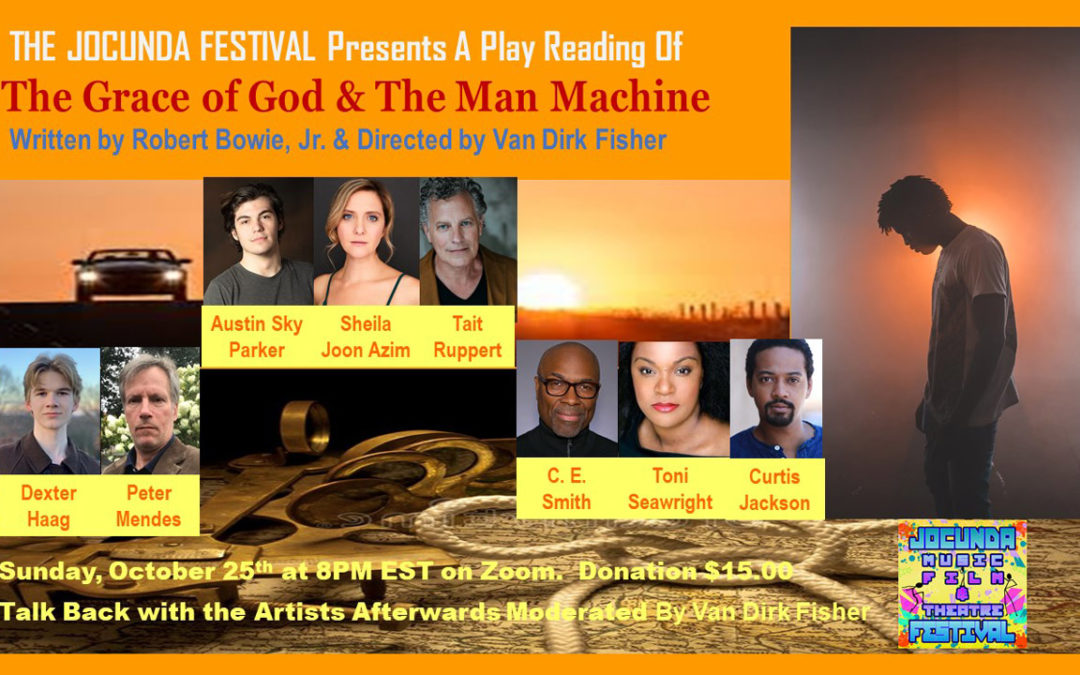
THIS SUNDAY – A Counterpoint to Propaganda
It is unfair, but once again I am the lucky one. These people are unique!
This Sunday, October 25 at 8:00 pm (ET) my play, The Grace of God & The Man Machine, will be performed in a Zoom/virtual public reading by director Van Dirk Fisher and the Riant Theatre. CLICK HERE to get tickets.
When the theaters open up, it will be presented live on an open stage with audiences seated to watch it, but for now this performance is an example of an industry‘s remarkable ability to maintain itself and continue to create.
In early March of this year, we had just finished a table reading of the latest draft when New York started to shut down because of the pandemic. Just two days ago, nine months into this, Kevin R. Free, the New York director who ran that reading, begged on Facebook for people to please wear masks as he described the devastation on the performing arts industry and its 12 million artists:
“This is personal to us, our whole livelihood depends on social solidarity and we will not be labeled ‘non-essentials.’”
Artists have always been essential. They are the counterpoint to propaganda.
Now in an American election year which will define who we are, the theaters are closed. But this industry defines itself like no other: “The show must go on.”
In these times, an amazing cast of professionals (several of whom have Broadway credentials and all of whom are brilliant) are the ones to uphold this responsibility under these very difficult situations.
Artists in all forms are examples of independent courage. I found the same grit and determination when I first started to learn about writing for theater in Baltimore at the Baltimore Playwrights Festival years ago. I have come to love these people and this world which these artists create even though I am forever new to it.
There is a tenacity and courage in every member which is profound. Repeatedly, as I have met and worked with Van Dirk Fisher and the Riant Theatre on this production, and with others like Christian De Gré Cardenas and Mind the Art Entertainment, Sue Conover Marinello, Katie Marinello, and Parker Bennett, I have learned grit and courage from them.
For this production on Sunday night, I benefit from this resilience and creativity. Since the beginning of the pandemic, Van has responded to this nightmare by developing the art of virtual backgrounds and performance skills for virtual reality theatrical productions.
Think about that. You get knocked down you get back up.
Please join me and watch these remarkable people offer a counterpoint to the propaganda of an election year.
Come if you can. And if you can’t, please donate to support the theater if possible.
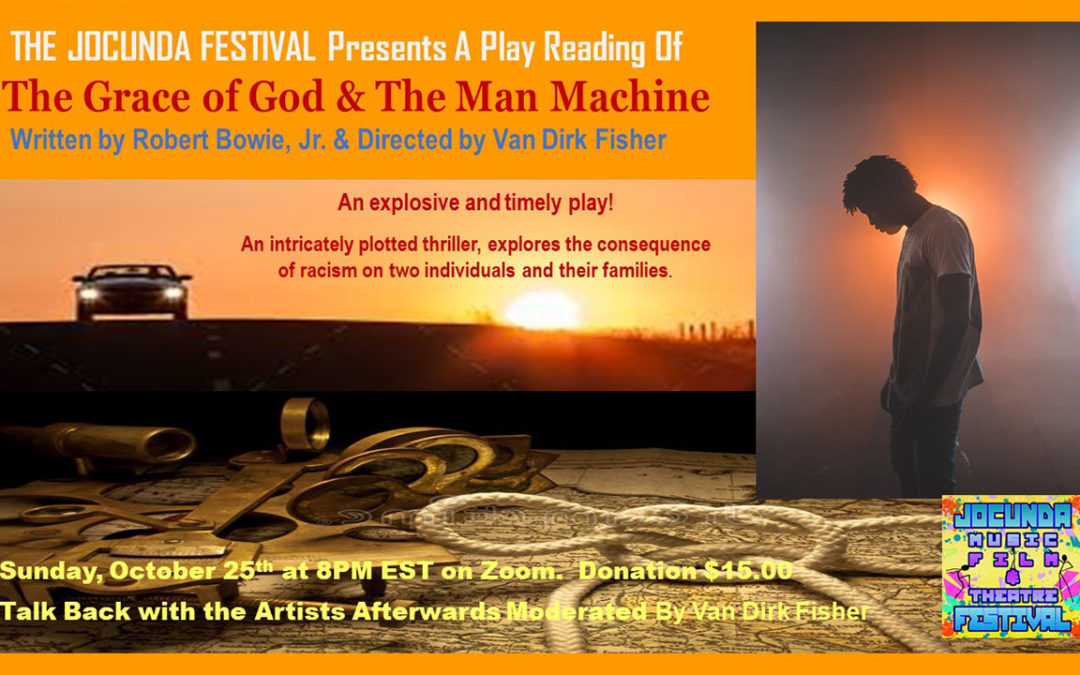
Jocunda Festival Play Reading of “The Grace of God & The Man Machine”
I’m thrilled to share that a reading of my play, THE GRACE OF GOD & THE MAN MACHINE (formerly known as Onaje), will be presented by the Jocunda Festival this Sunday, October 25th, at 8:00 p.m. (ET). There will be a Q&A afterward with the playwright (yours truly), the director, actors, and audience, led by Van Dirk Fisher, the director and founder of the Riant Theatre.
I would be doubly thrilled if you could join us — and help support live theater.
For tickets, register in advance on Zoom:
https://us02web.zoom.us/webinar/register/WN_nS9PhZTyTMimDacMyxCCeA
Donation: $15.00 to benefit The Riant Theatre. After registering, you will receive a confirmation email with details about joining on Zoom.
THE GRACE OF GOD & THE MAN MACHINE, a Black Lives Matter play, is an intricately plotted thriller that explores the consequence of racism on two individuals and their families.
Set in Eastern Maryland in the 1960s and 1987, two sons — one white, one black — meet by chance on the road, unaware that their families shared a life-altering connection years before. Now, their fate and their families’ futures may depend on the choices they will be forced to make.
THE GRACE OF GOD & THE MAN MACHINE allows the audience to ponder: is the die forever cast by a one-time choice we make?
“Having run this Zoom Play Reading Series since the pandemic began, I’ve developed directorial and visual techniques that make our Zoom productions visually, emotionally, and viscerally stimulating,” director Van Dirk Fisher said. “It’s something people haven’t always associated with the play reading format. Audiences also love the interactive and spirited Q and A that follows,” he added.
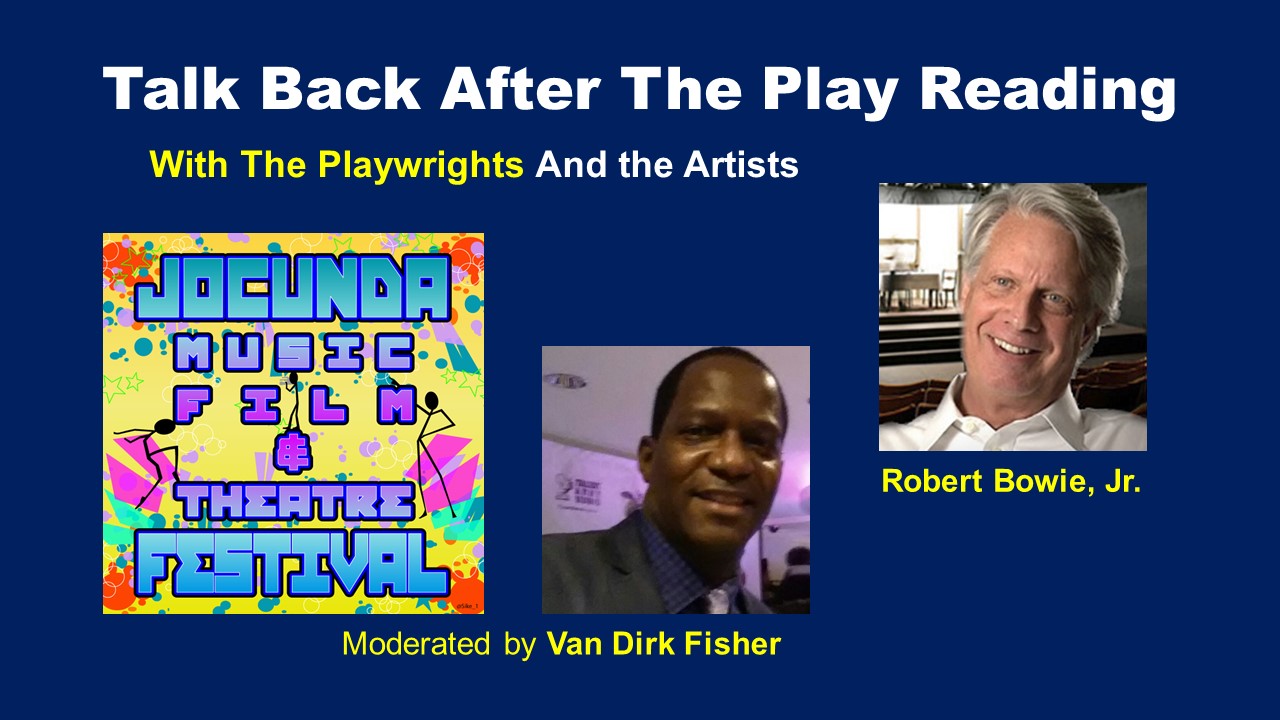
An O’Neill Theater Center semi-finalist, Onaje appeared at the 2018 Fringe Festival to rave reviews and sold out audiences. Theatre Is Easy gave Onaje its Best Bet designation and described its “high stakes story” as “the most dramatic, fleshed out near-cinematic play I have seen.” Onstage Blog said Onaje “brilliantly brings a sense of warmth,” and Blog Critic described the play as embodying “exquisite conceptualizations and themes.”

Family Love
While waiting for a single engine plane
By a grass runway at the edge of Hell
I feel the evening come and watch the rain
And when the last flight is, at last cancelled,
I feel the breeze from an open window.
It gathers and it recreates its self
Perhaps from its beginnings, I don’t know,
In that primal place which remakes its self.
How much I love you is what you must know.
It gathers and it recreates its self
At the center of my own cold zero
In that primal place which remakes itself.
Comfort only comes from our common ground
When eye meets eye to pass a smile around.
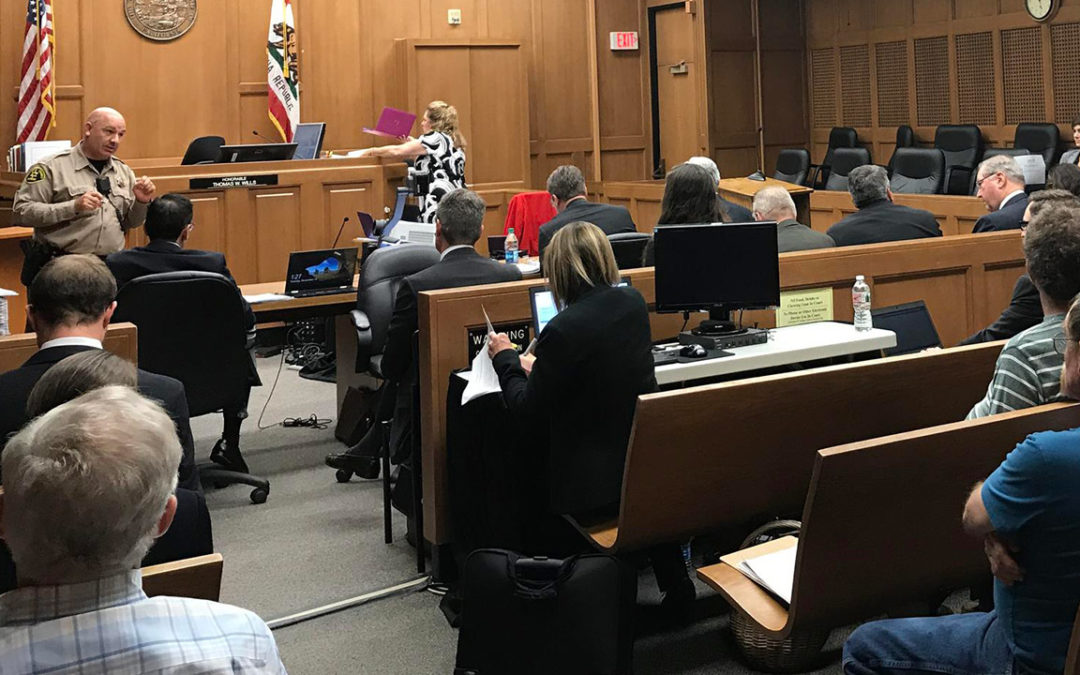
Death Penalty Defendant Waiting for his Verdict
“You be in this box of artificial light.
It feels like a hot house where nothing blooms
Under this neon ceiling that burns all night.
Where is the daylight in this damn courtroom?
Why doesn’t the jury already know?
My lawyer says ‘let them deliberate’
And then goes out with the D.A. for a smoke.
I heard them laugh about ‘it getting late.’
Tell me, what is a crime against the State?
The guy bitch slapped my girlfriend and took her hat.
Trust me, he had this death wish that couldn’t wait
But my lawyer never told it just like that.
God I want to leave this room and be free.
The jury enters but does not look at me.”

That Party In My Head at Night
I woke up this morning in the darkness
And I woke with the need for morning light.
All night my mind made people that I guess
Were made up for the dreams I had last night.
Maybe my brain is like some bag lady,
Controlling, self-examining, so smart;
Gathering bits and pieces on her way:
The Greek Oracle with a shopping cart.
But what if she flunks her own quick quizzes,
And dreams some life that isn’t, and never was,
And I’m caught between my life as it is
And her dreaming and what her dreaming does.
Her crazy friends are having too much fun!
I’m just real glad they head home with the sun.

The Heron
A tall shadow controls my autumn pond.
It moves on long legs and will stare and wait.
After the late March ice had come and gone
And the exchanged songs of the frogs that mate,
The lily pads rise through the clear water
To shelter the colonies of black tadpoles
That are born as eggs, like pupil eyes, pure,
And, like the rest here, uncompromising souls.
The summer heat reveals the baby fish
Spawned by the survivors of last winter.
By August it is like my winter wish:
Blooming like some Eden, ready to enter.
The heron knows nothing of what I mean.
By noon it will have picked the pond all clean.

Wondering About Eating Others

Labor Day: Pre-Dawn Swim
The fireflies burn out well beneath the stars
And leave the shadows of the trees around me,
Naked here, in a galaxy at war.
Poolside, in my moon reflection, I will be
Dropping out of this humid world down to
The unexpected.Guillotined to cold;
Feet first with the water closing over you
And then shoving off the pool bottom, old
And stretching out as the new world runs by
Drifting utterly empty, my life gone
In my underwater wake and my eyes
Closed till I hit the wall and stand alone
In the shallow end and I am reborn,
I arise baptized with the coming of the morn.

Narcissistic Beauty
Iris Versicolor
Here, self-preservation is metaphor:
Two dry riverbeds that run the water
From the neighborhood to the reservoir
Hold the water when it rains, in order
That a semi-septic self-made swamp pond
On two grandfathered acres, that won’t perk,
Might be the birthplace of this flower on
This shallow marsh. Each spring I watch her birth.
The “Blue Flag”, out of the Iris family,
Has a throat of spectacled gold, and grows tall
On a solid single stem; fun, friendly
But at her roots she’s poisonous to all.
Self-preservation, as final duty,
Creates its own narcissistic beauty.
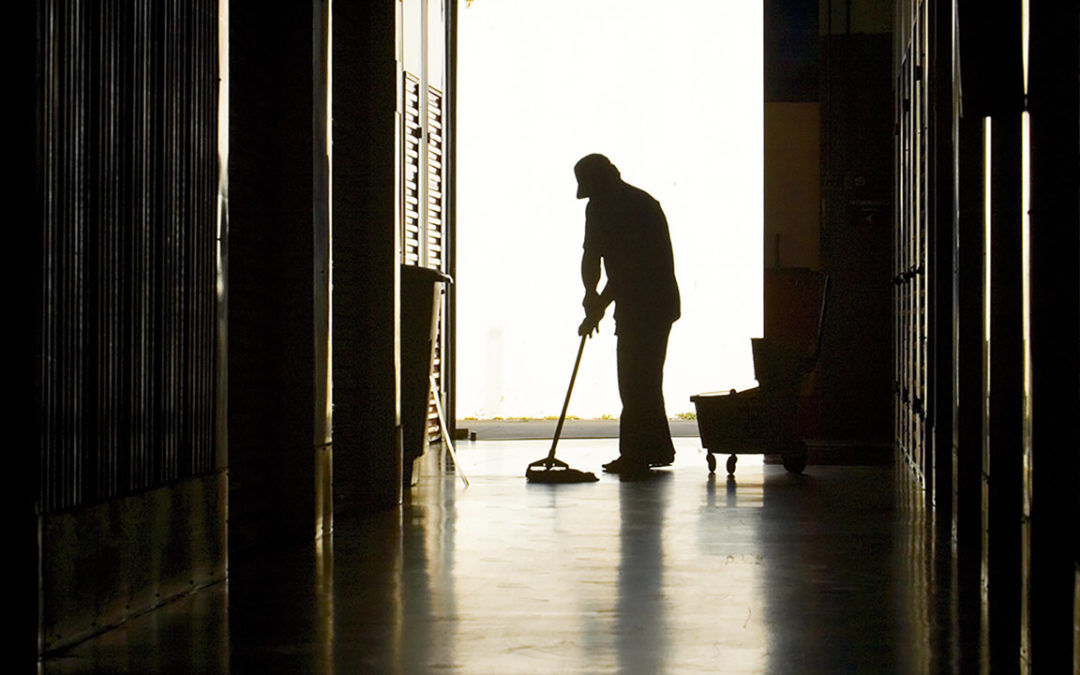
A Prayer for Our Future…
… But it’s one of those days where you start serious and end up with a joke…
Sorry.
The Janitor in the Classroom
I stopped to watch him clean the window glass
And wet mop the floor and make real sure
The day’s questions, unanswered, or unasked
Were washed from blackboards and the doors secured.
“His kids,” he calls them, who went home today;
They live the “life-changing experiment,”
Which is to navigate the unknown way
To save the future which we have not spent.
An old man’s mind makes orderly his past
But lives as the victim of his future.
He washes sinks and wipes the window glass
And prepares the classroom to make sure
The desks line up in geometric rows.
What they will learn will save him, this he knows.
… Oh well, what the hell
You never ever can tell.
If you think that he’s a dope,
We can end this with this joke:
An optimist’s fortune cookie
Tongue twister summary:
Our children are our heirs
Until theirs are theirs.
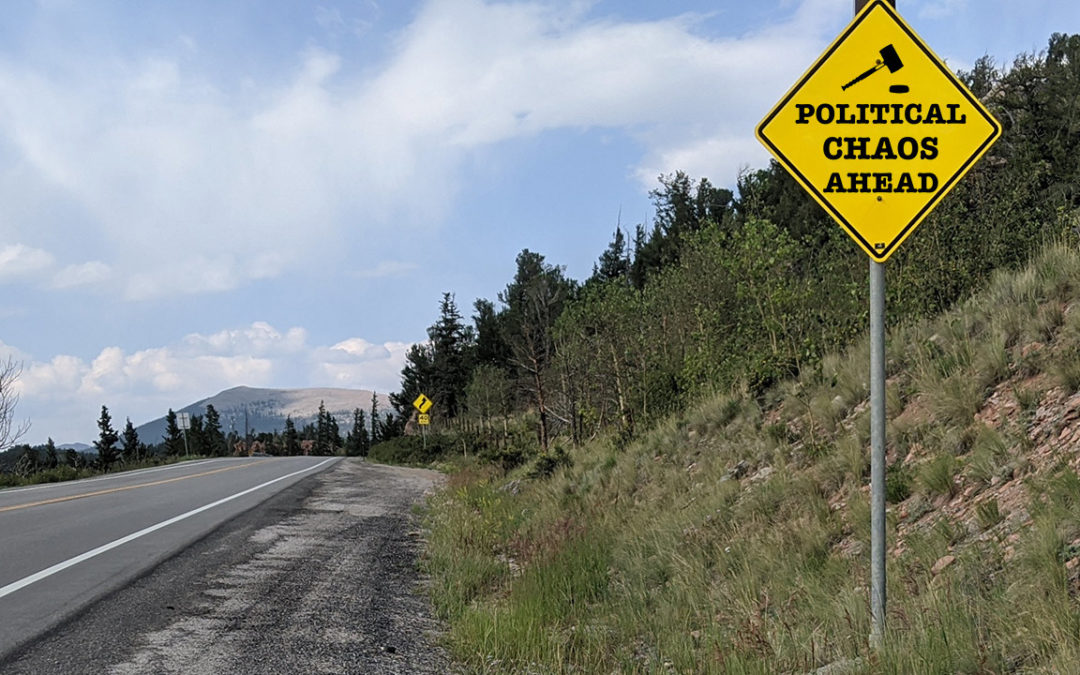
Wake up! The Nightmare Is About to Happen!
He will win reelection if he can:
1) Create chaos in the streets & fear in white Americans:
That ain’t over yet. This is at the heart of his campaign.
He needs looters and the fear of Black people because “it won’t be your White America in 20 years.”
If he can again provoke demonstrations, can use Federal troop, and get looters — imagine October and election day in November if he can get looters!
2) Eliminate the vote:
Aggressively underfund the Post Office so that the collection of votes can be curtailed for being too late, or lost. The post office is already underfunded. He will succeed in this if he has not already.
3) Control the media message:
a. Sinclair Broadcasting (which controls the broadcast network for small media TV stations across the country) recently broadcasted that Dr. Fauci created the virus and shipped it to China. It joins Fox and Tucker Carlson (who has the greatest following of any TV host) in broadcasting intentionally false information.
b. Attorney General Barr will soon reveal the results of the third known investigation focused on the opening of an F.B.I. counterintelligence investigation during the 2016 presidential campaign, as well as the debunked theory that the 2016 Trump campaign was bugged.
c. Forget the courts! They will have no force or effect before the election until they can move as fast as Twitter.
4) Polarize the vote:
Create a caricature of the “smug” and “politically correct” Democrats who remain arrogant, confident, and vocal that he will lose. He needs hate to bring out the vote.
5) Control and dismiss any feeling we may be losing our place in the free world:
Well, nobody has cared so far that we abandoned our allies:
1) South Korea, Japan and Asia, leaving them to North Korea.
2) The Kurds, surrendering the Middle East to Russia.
3) Europe and NATO (as they abandon us).
He has done that.
Or that our enemies:
1) Make fools of us when they pay a bounty for killing our American soldiers (but if a Black man kneels during our National Anthem in a 1st Amendment Constitutional protest he is chastised for disrespecting our military? Really?).
2) Openly interfere with our elections.
3) Build up missile attack forces that can now hit our country and our allies, because our president has declared that our historic anti- democratic enemies are, in fact, our friends.
He’s done that.
And finally,
6) Avoid blame or responsibility for COVID-19 (“The China Virus”).
No problem! Say the governors have botched it. He’s done that.
Forget the polls. Why do you want to be wrong again?

Half-assed Homily
Okay, last Tuesday I posted a grumpy piece about writing plays in a time when all the theaters are closed.
In response, I received unexpected wonderful encouragement.
I’ve decided to forgive my pen and write a thank you explanation…
Sometimes Life is a Bic
(A Sonnet)
Within the four corners of your blank page
Lives the life’s work of a ballpoint pen
And the untranslatable language
Of its beginnings and of its end.
Its play at drawing portraits of doodle-faces,
Or stringing words to make a thought brought pure,
Or working the architecture of spaces,
Or just displaying the ego of a signature
Is to have enjoyed its own universe.
Even if it’s just dotted “i”s or crossed “t”s
And all work and no play has been its curse /It can mirror the joy we live and breath
But how entirely unlike your life or mine
Is a single thin line as a life defined?
… It is also an apology and thank you during this pandemic from me to you! ❤️

My Return to Genesis
These posts and my blog are my second life as a poet/ playwright. Although I loved being a lawyer and starting the law firm, I have always wanted that second life.
Since March, I have grown increasingly despondent because the coronavirus has shut down the theaters and curtailed my evolving development. The quarantine made it darker, more claustrophobic and broke my heart. I stopped writing. I am too old now. I will never be what I had hoped to be.
But I have learned something beautiful. I returned to a sonnet cycle that a friend of mine suggested we write years ago. Both of us wanted an artistic life to be jumpstarted. Back in the mid-1990s, I didn’t have the courage to do it myself, so we began to exchange sonnets. This was the beginning. The Genesis.
The sonnets I have been posting these past few weeks are from that 1990s cycle. I went back to the beginning, and I want to say thank you to those that have given me a second life that I now better understand.
Although I love seeing my work performed, I have discovered that what I love most is creating, writing, and the discovery that entails. I delayed forever, but I owe a duty to Elizabeth Bishop (poet) and William Alfred (playwright, and my tutor), both my professors in college. They are gone now but the thank you is not too late.
From the start, they, along with Candace, my friend, taught me this real joy of discovery.
The Fireplace
(A Sonnet)
With two cords of hardwood stacked by the door
I’m ahead of winter again this fall.
All these years with no spark, no central core.
My art? To fortify’n avoid it all.
At Mount Auburn, my friend Candace and I,
Last winter, about this time, decided
To write a poem each week’n agreed to try
For e-mail delivery to the other by
Monday morning, coffee time. We would do
Fifty-two: Deadlines to keep us to it.
Miss Bishop and Professor Alfred too,
I hope these make you proud. Last night I lit
A new fire in an old fireplace
And dreamed I’d warmed your hands and touched your face.

Corona Meanderings: Lust & Love
Lust & Love
A Sonnet
His object of affection (but not of mine),
A belly button, seductively displayed,
Below the shirt which hides nipple ring outlines,
That make both her breasts look like hand grenades.
He looks for the screwdriver he has lost.
His is the world of replaceable parts.
Unscrew her belly button, her ass falls off?
Still they both dress to win the other’s heart.
The city’s suburbs spread out around them both
As they skateboard the parking lots and clocks
Keep the time and administrate the oaths.
Is there no place left to think out side the box?
Is the message of the world we are part of
That we live so long as we lust and love?

Going Deaf is Like a Blizzard in Summer
Going deaf is like a blizzard in Summer
A Sonnet
From a four o’clock sky the first snowflakes fall
To settle down on trafficked city streets.
Each snowflake falls separately, till all
Conspire to hide the city like a secret.
The last street lights go on, and the snow reflects
Upon the domiciliary landscape.
The more snow falls the less you really expect
The city to be what it’s supposed to be:
It becomes a beautiful blinking shape;
An image of slowing inactivity,
Slowing into snow drifts. It snows very late.
A pronouncement of peace subdues the city:
The drifting snow controls the city violence
With a voice made entirely of silence.
It is a blessing, of sorts.
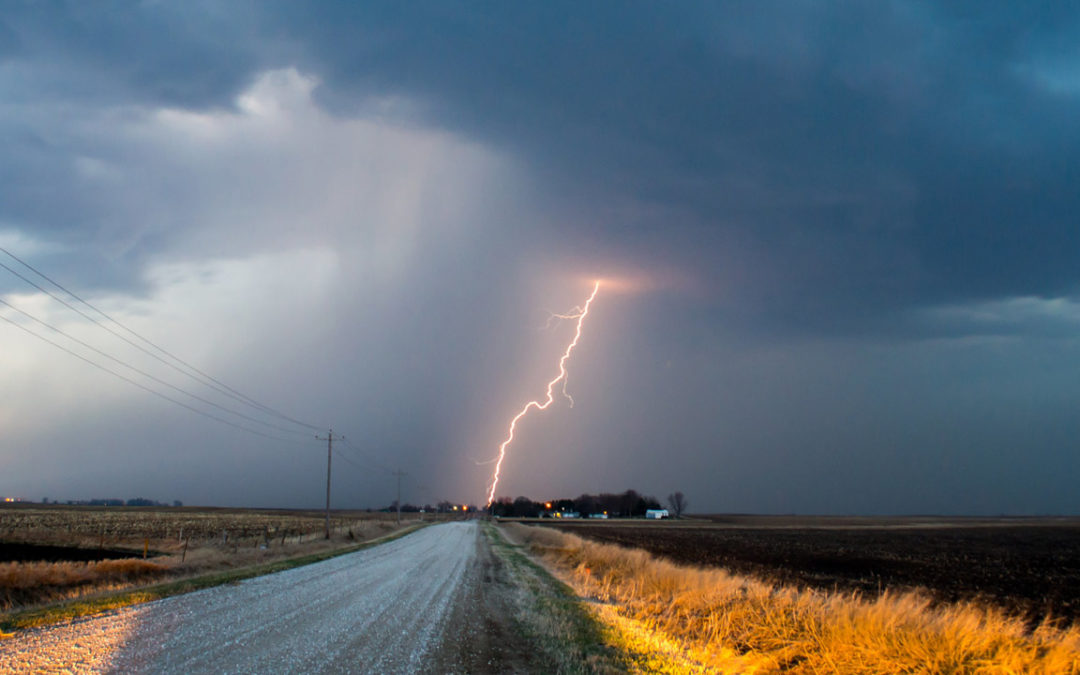
A Summer Sonnet
Summer Thunderstorms
As with the generations long since dead
The fire and brimstone of the status quo
Wakes him up from the safety of his bed
And lightening frames him in the window
And photographs him in its afterglow.
Tonight he feels his present and its past
As the summer storm also comes and goes.
Conclusions are foolish in a world so vast
For at the edges of his world and heart
Far past the farthest boundary of his grasp
Where ideas cause worlds to come apart
He lives in this place that will not last.
He loves his life more than he can explain
And leaves the window open to hear the rain.


Still Freaked Out After 30 Years
chum, chummed, chum·ming (verb)
To fish by attracting fish by dumping cut or ground bait into the water.
The Blue Hole of Belize
Was I the fool of this sinkhole of the sea
Or its pupil in this aqua ocean?
As I fly home, it looks back at me
Without memory or emotion.
Three days ago, while taunting me, Miguel
Said: “You dived it but not with me before.
I dive it deep. I dive it right to Hell.”
He took my money but wouldn’t tell me more.
Off the boat, with Miguel still behind,
We checked our gear and descended into cold,
Deeper, darker, to fear of a different kind:
Sharks. Hundreds of then. Darting from the shadows.
At the boat Miguel offered a helping hand,
Laughing. ”You understand? We chummed it man.”

Long Ago and Just for Giggles — A Tale in Two Sonnets
Almost 25 years ago, on November 29, 1995 I visited the Mayan city of Tikal with two stoners before its restoration:
The stars over Tikal are frightening and bright.
I am here, on sacred land, in the jungle
Before dawn in the Guatemalan night.
The moisture and pre-morning has its smell
But I modernize the scent with smoke
From a little match to start my cigarette.
Cesar comes through the door drinking a coke.
He says he knew the others would all forget.
He won’t take me into the ruins alone.
Down the dark path, I follow my flashlight
Into the past, to where time has made its home
And into the temple and sacrificial sites
Where people of belief played their cosmic part
And reached through ribs to hold high a human heart.
Many years later I went back to show my daughter but it was now open to tourists:
The exchanging of colored currency
As soldiers lounged and smoked their cigarettes
While an old woman washed clothes in the stream
Should have been enough to never forget,
But I wanted to show her so much more.
We crossed the bridge into Guatemala
And into the land of the living poor.
Skinny dogs and pigs with hanging tits wallow
In the roadside brush as we both bus by.
Not even Tikal, ancient in starlight,
In its totalitarian demise
Got the primal message exactly right
But heading home, past pack boys with a load
A twelve-foot Boa stretched across the road.
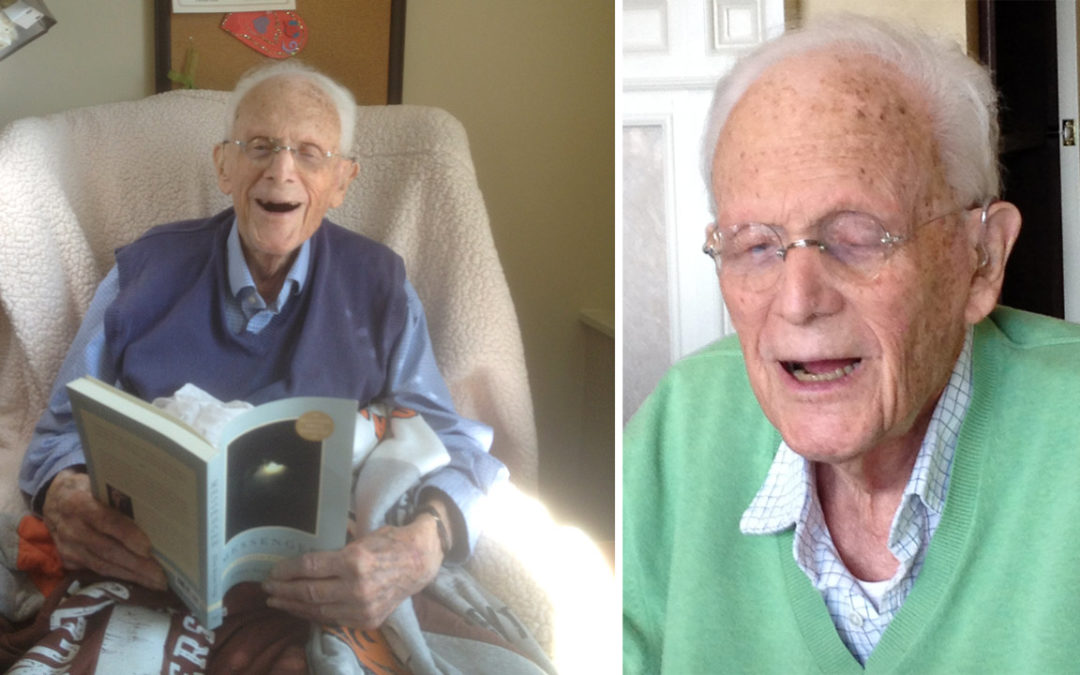
For Father’s Day – Shaving My Father
(From the draft I wrote the day after my father’s death at 104.)
This is the last small room he will live in.
Every day I visit him at 4 O’clock.
We balloon the room with our forgiveness.
“Either this man is dead or my watch has stopped.”
“Not funny for a man this close to death.”
We share what only dark humor can express.
The Marx brothers, for both of us, are the best.
The men are waiting outside the door.
The electric razor hums in my hand
As it cuts along the cheekbone and the neck
Like a harvester on pre-Winter land
Across the snowbank of white paper skin
I harvest thistle from earths intellect.
They zip their bag shut but leave without him.
I really miss him on the holidays.
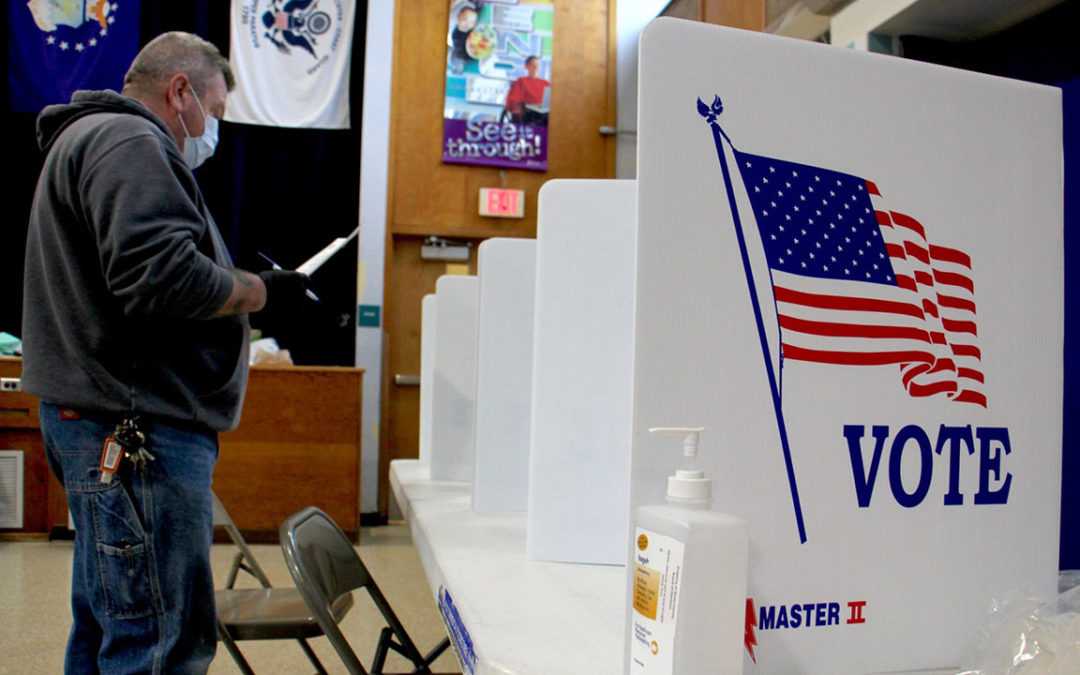
Everyone Deserves Their Own Conspiracy Theory… But I’ll Share
So we are a democracy that put a man on the moon but we can’t make voting machines that work?
Our elections are run differently in every state. Recently, Wisconsin voters waited in long lines, absentee ballots went missing in Maryland, Pennsylvania and Washington, D.C., and more long lines and confusion plagued Georgia and Nevada.
 The political parties could solve this with a simple bipartisan agreement or uniform act, but they seem to thrive on discord.
The political parties could solve this with a simple bipartisan agreement or uniform act, but they seem to thrive on discord.
A few years ago, even our presidential election hung in the balance because of faulty voting and “hanging chads” in Florida.
The founders were pretty much universally in agreement about political parties. Alexander Hamilton called political parties “the most fatal disease” of democratic institutions.
Maybe voting doesn’t matter to the political parties anymore?
Are they more interested in representing themselves?
If you have any doubt, consider gerrymandering.
Gerrymandering does nothing for democracy. It is all about gathering power for one party at the expense of the other. It divides and polarizes us.
What if both parties are like that old joke about lawyers? “If you’ve got one in town she will go broke but if you have two they both get rich.”
The parties are very powerful in our county. They have defined the issues for us, and get funding and perks and benefits for their legislators, such as healthcare and retirement (which is always better than their constituents) and somehow they retire millionaires as “public servants.”
But in exchange for the perks, benefits, and campaign funding, the parties have demanded absolute loyalty to follow their agendas, such as near-unanimous Republican Senate votes on Trump’s impeachment. They have even discouraged open and free public disagreement among their members. Is that good for a democracy?
But it does make sense. Everybody benefits from polarization — except the voters and our democracy.
The polarization is great for advertisers on Fox, MNBC, social media and political fundraising.
Maybe your vote is less important than your political contribution.
Our American genius has always been that we are all very different, but we talk and compromise. That is our genius! Our genius is not factions and polarization.
Madison wrote it is the duty of “well-constructed unions [democratic governments]” to “break apart and control the violence of faction.”
If we really want to call ourselves a democracy, perhaps we should listen to the founders and at least start by protecting our vote.

Our Second Chance?
There have been times when I have pledged to live my words but then have failed miserably with my actions. Occasionally, with the grace of God, sometimes I get a second chance to get it right.
Above all else, the framers of the Constitution feared the power of the king. But they created a democracy that permitted the sovereignty of white people over black.
White supremacy is the cancer cell in our national DNA. White people in America have always been the master race in our white democracy.
Almost every white president since the Civil War has directly or indirectly used racism and a “law & order“ campaign to get elected and looked the other way when violence was used to suppress people of color.
Between 1882 and 1968, whites lynched 3,446 blacks. There is no evidence of the inverse. To the contrary, Black churches that have been bombed have made it an act of Christian faith to invite all races to pray with them in the aftermath.
And I didn’t find any news about black men going to our schoolyards with an AK-47 and killing children either.
So exactly who are we afraid of?
Isn’t it just the same old Civil Rights demonstrations and a President building another “law & order” campaign ? No! Now it is with the backup of military action to suppress those 1st Amendment protests against our historically racist national practices.
No! This is very different! Our nation’s army used to silence our constitutional right to assemble and protest?
Trump and his Attorney General also are preparing to curtail the nonwhite vote in November. There is serious concern that if it is a close vote, and it will be, he will demand endless recounts and not leave office.
If Trump and his followers get another term, Black lives won’t matter and neither will the Constitution.
It is the King’s sovereignty over us all over again. Except this time, we can both liberate ourselves from a king and have a second chance for “liberty and justice for all.”
The question is whether this time white people will stand with all Americans to get it right, or lose our country and our chance again.
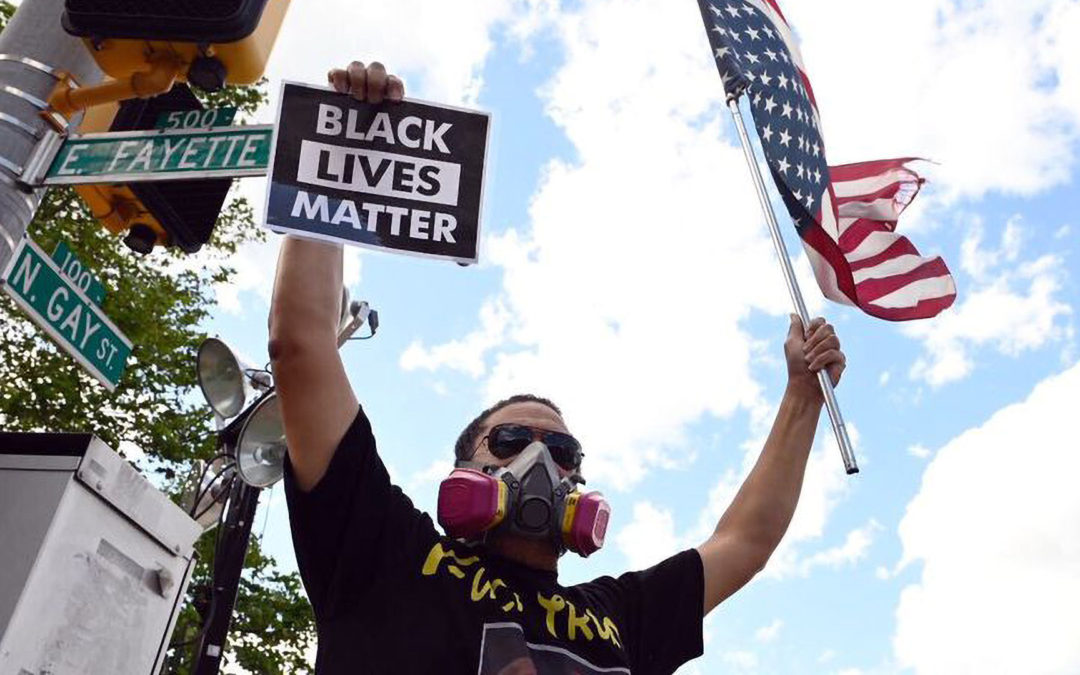
It Is Immoral to Misquote Yogi Berra
The one thing that I absolutely believe is: it is immoral to misquote Yogi Berra even if you don’t know who he was
Yesterday, in response to the rioting arising from the death of another black man by white police officers, a liberal friend of mine shook his head and said: “It’s just like déjà vu all over again.”
That quote is not applicable to these killings and protests, even though it may bring to light, unintentionally, our national nightmare.
In July of 1967, Cambridge Maryland was burned and Maryland’s Republican governor, Spiro Agnew, got national attention for blaming the demonstrators for burning down their homes, neighborhoods and destroying property. I know something about this because I was a young boy visiting the Eastern Shore that summer. The experience frightened me out of my youth so much so that years later I wrote a play about it.
President Nixon liked Agnew’s toughness. He needed a “law and order” guy to polarize support for his 1968 election. He chose him as his VP to whip up the masses against the “liberals” in order to rally the “silent majority”. It worked. Nixon won a plurality of the popular vote by a narrow margin but won by a large margin in the electoral college.
Sounds familiar… but still no déjà vu.
Maybe this will help:
Yesterday Fox News reported, “… crews on the scene in SoHo reported hundreds of people stealing from luxury stores —including Chanel and Dior — for hours on Sunday night going into the early hours of Monday morning. The looters were seen piling shoplifted merchandise into vehicles while others rode off with the merchandise in black garbage bags balanced on Citi Bikes.”
Many of the African-Americans who had organized the protests in Cambridge repeatedly said the whites lit the black neighborhoods on fire in Cambridge and then refused to put them out since they controlled the fire trucks. The white press never reported that. Nonetheless, the disturbance was defined as the destruction of “property.”
So maybe we have it wrong and it is about “property” and not “lives.”
Let’s refocus and see if we have a way to save human life by protecting property.
America became rich when it helped to rebuild Europe’s economy after WWII. It wasn’t a “giveaway!” Out of the rubble, we built a trading partner and Europe and the United States have prospered for almost 80 years.
So why can’t we create a 15-year state-sponsored municipal bond to rebuild Baltimore city? Not a “giveaway,” but designed to lower the tax burden on the state as re-development occurs? A long-term commitment to rebuild the city would instantly increase the property values, both commercial and residential and bring in national and international investors.
What a perfect time for Maryland’s present Republican governor to make Baltimore into a trading partner with the rest of the state. It certainly will be easier than unifying nation states that have been at endless war for the previous thousand years.
All he has to do is sell it to white Americans. The rebuilding could be entirely about eliminating the cost to the state of “giveaways” to Baltimore city.
It’s not a “giveaway” or, even better, about “Black Lives Matter” — it’s about property! Wow what a great selfish idea!
Hey! Let’s make Maryland great again! Baltimore was once one of America’s three most prosperous cities.
… But it won’t happen, because the rebuilding of post-war Europe had no black countries or black cities and that was our foreign policy, not our domestic policy.
The Constitution, at a minimum, sidestepped slavery or at worst supported it with the Electoral College. And after all slaves were “property.” Maybe racism is in the American DNA.
So in this case, Yogi Berra and my friend were wrong. You can’t have “Déjà vu all over again.” The situation is not repeating because it has never ended.
Photo by Kenneth K. Lam, Baltimore Sun

History Lesson from an Amnesiac
I distinctly remember being taught in high school that what made America great was its big heart and a commitment to democracy and freedom throughout the world. The country of opportunity met you with the words of the Statue of Liberty.
However, with America’s commitment to the IMF and the World Bank after COVID-19 still in question at the White House, I have gone back to when I thought we protected free trade as essential to the spread of democracy and freedom for the world.
Imagine if there had been no Marshall Plan and America had not aggressively led the way to rebuild Europe after the Second World War. That allowed us to create trading partners and free trade and made America and Europe free and able to prosper for the last 80 years.
In college, I was taught that free trade is necessary to build civilization. Free trade is like the blood flow through a healthy body.
I may have gotten it wrong, but I think without free trade there would be no America to “Make Great Again.”
Ten years ago, I visited Syria. The Syria that no longer exists. Entire cities have been wiped out since I was there.
Back then, I fell in love with the beauty of a pre-Roman city of Palmyra and its history.
Northeast of Damascus, it survived because it was at an oasis at the crossroads of trade routes in the desert.
Years ago, it was a burgeoning metropolis of peoples and civilizations. There were times when it was a nation-state and times when it was a city within the ever-changing powers of the region. Its independence depended largely on the prosperity opened to it by free trade.
From the beginning, America has been an oasis of natural resources, protected by our two oceans from the dictators or monarchies of the rest of the world.
As a new nation, I was taught, we became an oasis of constitutional freedom with trade between the states, to became a force in the world. Have our oceans and self-confidence become a curse now? We hear only the voice of the growing isolationism, of “America first.”
Over the last three years, it seems we have not been able to admit or see that we are falling behind and doing everything but making America great again.
I am certain I can still remember when America’s foreign policy was about keeping our oasis safe and the world safe for freedom and democracy.
Anyway, I attach these 10-year-old pictures of Palmyra. You can ride a camel there.




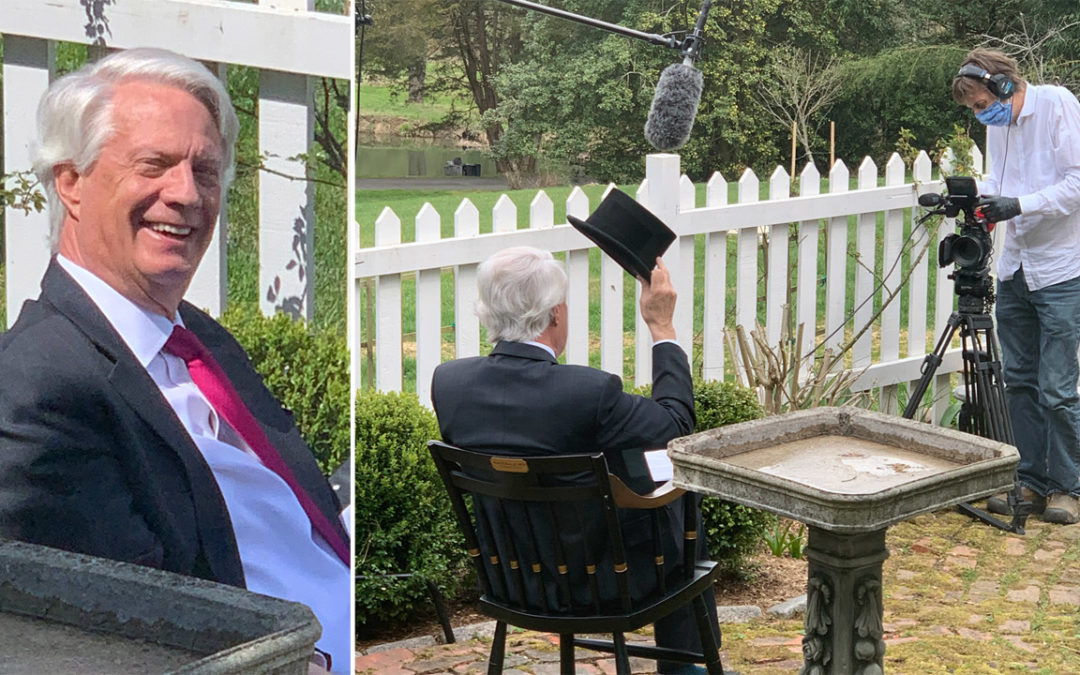
Don’t Settle for a Low Paying Job. Be a Poet Laureate — You’re Qualified!
If you loved your education or even if you didn’t, but love the people, the culture — and you are pretty certain you should have never been admitted — you are a born Poet Laureate.
If you are worried about qualifications, no license is required. And what is really great is that there are endless jobs available because in most institutions this job has not even been created — so you can fill it by volunteering and hold it endlessly as long as you are keeping the alumni laughing.
And if you are worried about keeping your integrity this is absolutely the job for you! You can test this:
Call a restaurant and tell them you are a Poet Laureate. You will get a table next to the kitchen. You can insist on no favoritism and be certain that your request will be honored.
And it is not “a low paying job”! It is a no paying job, so you pay no taxes! And there are other hidden benefits:
I have found that as long as I have been a Poet Laureate they have not revoked my degree. In my case, that’s important.
I have been the Poet Laureate of the Harvard Alumni Association for the last eight years and I am living proof that no talent is richly rewarded for the pure pleasure of just doing this job.
Yes, I have proof:
The job requires that I present my “ode” at the Annual Spring Meetings of the Alumni Association and, for the last two years, for different reasons, it has been videoed.
Have fun with it. Two weeks ago, because of the coronavirus, I bemoaned the cancellation of our graduation and celebrated our student athletes and our football team:
The year before, I celebrated the Harvard Magazine and my former father-in-law:
For the text of the rest see the HAA website.
In truth, this is not a labor of love. It is more than that. I owe this school more than I can ever pay back. For me, it is my foolish way to say thank you. It is worth doing this for that alone.
If your institution does not have a Poet Laureate, volunteer. You will make a fool of yourself but you will open door for others to be free to do the same.
But if you are a graduate of Harvard, the job is taken.

For Everything There Is a Seasoning
What is so great about Classical Christian art is it is like getting morality training delivered in a horror movie.
You have to see it to believe it.
Consider Ugolino.
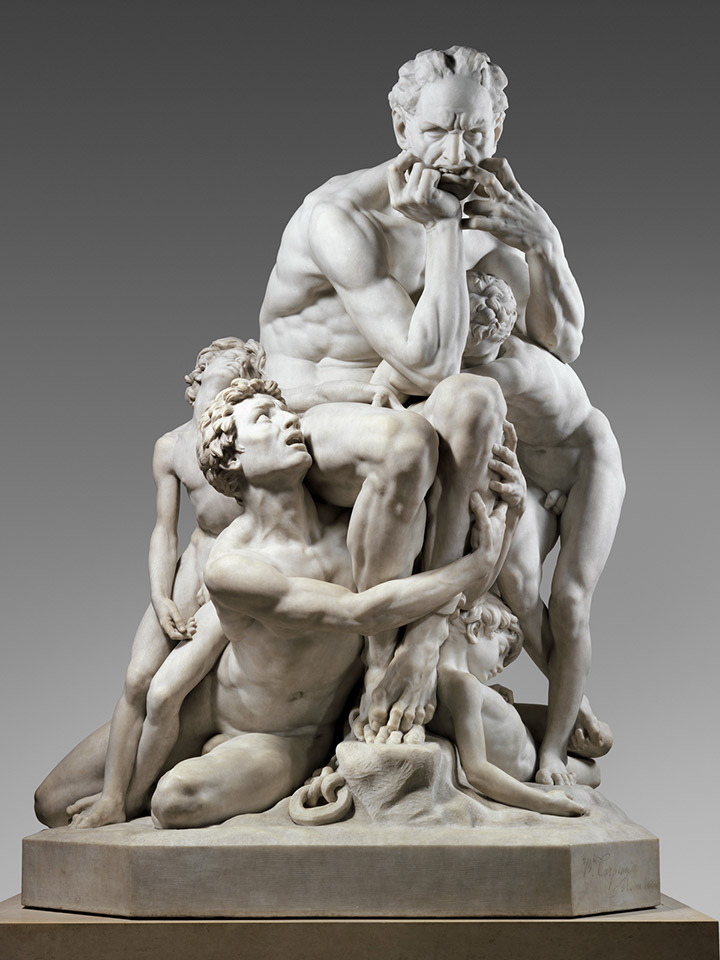
He is in quarantine for life and starving and has to either starve with his family or take care of his own bad self and eat his children.
His quandary is the classic question which pits self-interest against the rights of others.
He ended up at the bottom of Dante’s Inferno.
We have no vaccine or reliable testing that will allow us to determine who can go back to work without putting others in harm’s way.
We don’t have the equipment to make the correct decisions without all the information and we running out of time.
This is a horror movie scenario.
Maybe we have been kidding ourselves all along that our humanity is our ability to reason and think.
Maybe there are sometimes when you have to think with your feelings.
You have to see it to believe it.
In Jean-Baptiste Carpeaux’s sculpture of Ugolino and his children, you can feel the pain of Ugolino at the moment he is the making that decision. His children trust him.
It is that same decision which confronts the caregivers in emergency rooms and elected representatives as they reopen the country, decision by decision and case by case.
Look at all the expressions in that sculpture.
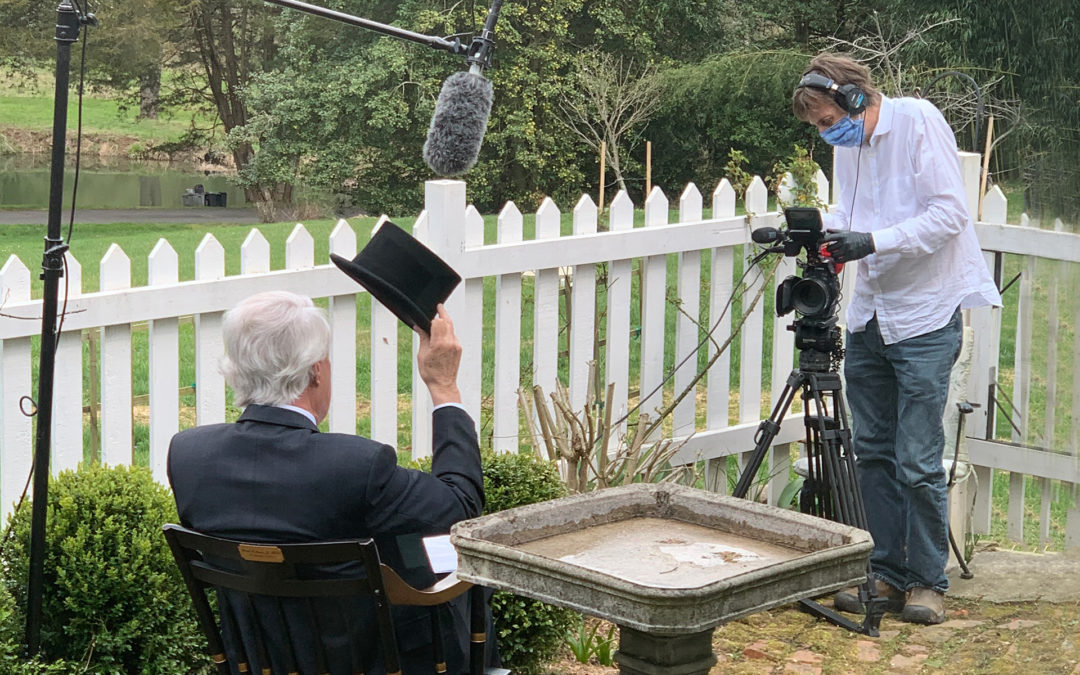
Quarantine Journal Entry
Quarantine Journal Entry #*@!%😱!
On Friday, March 6th, I headed home on a mid-morning train from NYC. We had been busy. The day before, we had finished a third table reading of The Grace of God & The Man Machine. The atmosphere had been wonderful and the actors had greeted each other with hugs and kisses, celebrating the act of making theater.
Other than my wife, this was the last time I have been within six feet of anybody for almost two months. Everyone in the world I know is in quarantine.
I have tracked my friends in New York and elsewhere, as some of them have gotten the virus, gone dark, and returned to report they are better but have lost friends to the disease.
The realization that this will not end easily for anybody has been made clear every morning as I’ve watched a cold spring come to Maryland under iron gray skies. I have been waiting for good news or some sign of change. I want the everyday life that I will always remember but will not see again.
Today, I decided to gather the little things that I might have taken for granted before, and make them into an exciting life that must be coming.
My social media manager Katie Marinello has already posted the Hastings Race and Poverty Law Journal article written by Michael Millemann about the law school class that we taught with Eliot Rauh. We have been notified that it continues to be one of the most downloaded current articles. I read it, and instead of taking it for granted I celebrated it as part of a new beginning, a new opportunity.
A year ago this week, I recited my 7th annual Harvard Alumni Association poet laureate poem (a “serious” bit of frivolity which I dearly love). This year, because the alumni meetings will be held virtually, I was asked to write it and have it videoed for presentation tomorrow. Instead of being disappointed I will not see my friends and fellow alumni and present it to a live audience, I reviewed the video and found myself laughing.
Finally, the play I was afraid would die in New York City after that great reading, we have just been informed is a finalist for the New York Rave Theater Festival and is being considered for perforce in NYC in October.
A different world is evolving now, but at least personally it is starting to feel like we are starting to wake up from a sleepless night to a coming spring.
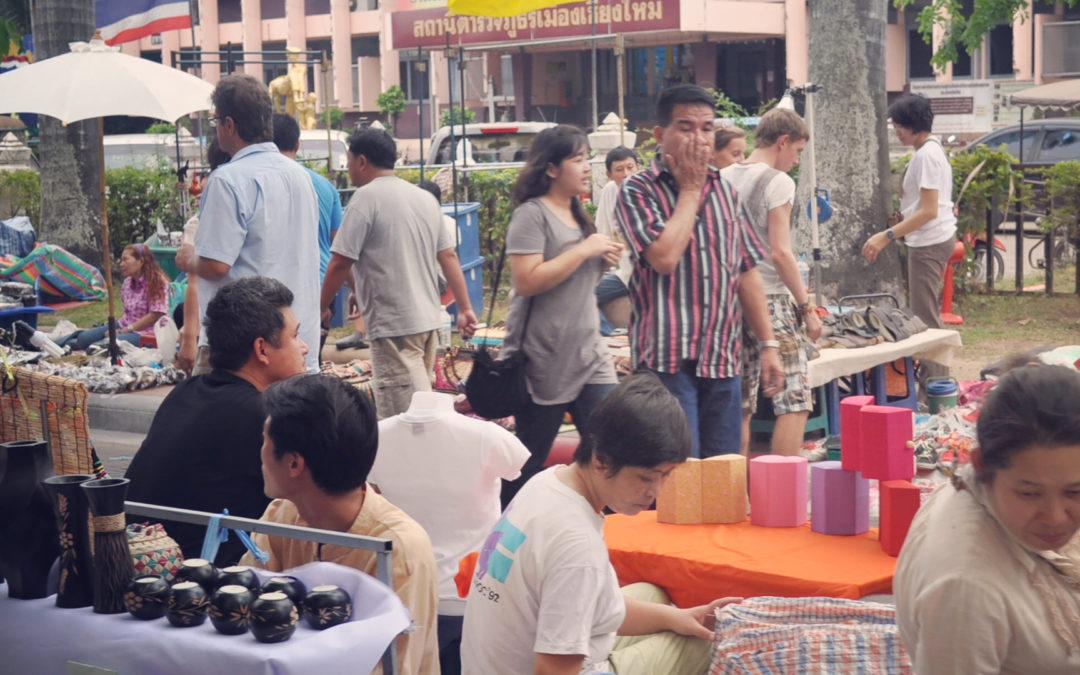
Everybody’s Looking for Something
So, this is how I got tricked into my new unintended optimism:
With the coronavirus, we are confronted with a new “new normal” yet again. I am again surprised at how fast our world can suffer catastrophic change and how quickly we accept it and adapt and —yet again — take no notice that disaster recovery as a way of life may be in our DNA.
Yesterday, quite by accident, when I was deep in quarantine and grumpy, I discovered some old travel photos I had taken ten years ago and my mind played a trick on me.
I was thinking about how years ago, there were no security checks in our airports and how now they are an accepted part of our lives.
I noticed that each picture looked like it could have been taken today, but history makes that impossible.

Look at the picture of the sister bending to be photographed with her little brother and how instantly it was interrupted by two of their playmates who wanted to be part of the fun.
It was taken in Aleppo, a city which was totally destroyed several years ago during the war in Syria.

The second photograph is of a market in Luang Prabang at the edge of the Mekong River in Northern Laos. Since that picture was taken, Chinese civil engineers have changed the flow of the river and thus the life of that little waterfront Buddhist city.
But finally, the picture which is the cause of this my unexpected optimism:

It was taken by total accident in a street market in Chiang Mai, Thailand. I realized the surprise of an unexpected discovery:
“Everybody is looking for something-at the same time.”
All of a sudden, I was surprised by the present that I thought was the past.
The people are so alive despite their futures and their past. We put our best face forward. We are, by nature, resilient. It lives in the acceptance of people in these photographs, whether these people are now alive or dead.
It is who we are.
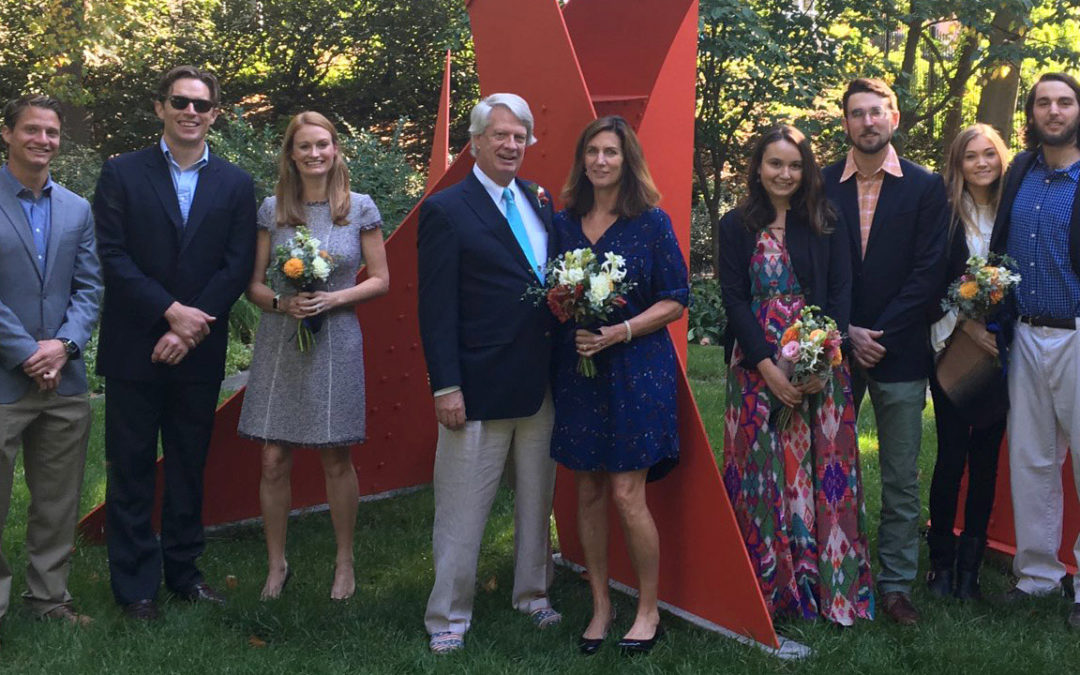
The Claustrophobic Philosopher & The Tiger King?
Being quarantined is like driving with your family at night when the government turns off your headlights.
First, you realize you must pull over because you don’t want to be stopped by an invisible tree or police officer.
The rest is endless waiting and the push and shove of group activity in a very contained space.
The driver instantly loses authority and the backseat gets more and more unruly. (This is an absolute truth.)
Actually, the seat belt is unbuckled for everybody.
There can be no consensus about the radio so it gets turned off.
Out come the cell phones, as people start thinking for themselves rather than for others, but there is no privacy so out come the headphones and the binge watching begins in strange existential silence.
Am I really watching “The Tiger King”?
The world outside the car is the enemy anyway, because no one can dress up to confront it. And worse, if they do, they must wear face masks and plastic gloves, which ruins the grooming and manicure.
As hope for alternatives disappear (“alternatives” are recognized to no longer be available), as a last resort we are confronted by our family and friends and the question:
“How did they happen?”
and
“Why did we end up in this car?”
It is not by accident.
Back when I was growing up in New England, the entire Northeast had a black out and nine months later the birth rate spiked!
You chose it. I don’t mean birth order—I mean you chose to get in the car. Is this car the architecture in which we chose to spend our precious time? Maybe? What are traffic jams anyway?
So why do cars have backseats? For procreation and the storage of loose children?
And this is who we end up with when the lights go out?
Oddly, as if by miracle, these strangers must be eventually confronted and recognized.
At different times for each of the people in the car, during their own moment of silence, something is recognized.
It is that you belong to them and they belong to you.
It happened to me. I am fortunate, and a little surprised to realize the “unexpected” has broken my status quo and given me an opportunity to get out of the car as a different person than when I got in it.
I am fortunate to have the friends and the wonderful extended family which I have.
But I had my moment.
I learned I don’t just want to travel with them. I want to appreciate them and not take them ever for granted and forget for a moment how much I love them again and again and again…
And why The Tiger King should probably end up in solitary.

Do Not Despair. We Have Our Art to Keep Us Wise.
The More Loving One
W. H. Auden – 1907-1973
Looking up at the stars, I know quite well
That, for all they care, I can go to hell,
But on earth indifference is the least
We have to dread from man or beast.
How should we like it were stars to burn
With a passion for us we could not return?
If equal affection cannot be,
Let the more loving one be me.
Admirer as I think I am
Of stars that do not give a damn,
I cannot, now I see them, say
I missed one terribly all day.
Were all stars to disappear or die,
I should learn to look at an empty sky
And feel its total dark sublime,
Though this might take me a little time.
I’m sure you did not know W.H. Auden. He died years ago. And I am absolutely sure he does not know you. But in times like this he is sanity from the dark.
Look at the care he put into this in order to talk to you. Carefully measured 8+\- beat rhyming lines that you can tap out on your knee, like a musician, as you listen. It is sing-song. It has humor.
Why would anybody bother?
Because the genes have made us human, and humans must communicate even from the quarantines of different worlds and times.
Why would a dead man reach out to you and encourage you to love in an indifferent universe ?
Humankind is nasty, but it’s capable of love and humor in the face of indifference. Why? It needs community.
We will get through this and we will come together because of it.

Is It Possible Work Can Change Your DNA?
Okay, I may have a problem. I am a recovering lawyer and now aspiring playwright and poet. Is it possible that I miss time sheets? “Every six minutes” for a lifetime?
People used to say: “You are what you eat,” but what if you are what you “do” or have done?
Maybe I’m getting worse. At the law firm, I made a rule that if anybody could finish a story that I was telling I would stop telling it.
Now I don’t care. If I can get a second laugh or even a third from the same story I will repeat it, again and again. (And I’m going deaf so I’m the only one who doesn’t have to hear it.) It could be senility. It could be I’ve lost any sense of embarrassment, but it definitely demonstrates no merciful memory loss, at all.
The other thing is, even in retirement I must “work.” I have grown even more intolerant of delay because everything I’ve written should be on stage by now! Damn it!
What has happened to me?
In the past year, I have written or rewritten three plays. One (Onaje) has been produced in New York, two will be produced in New York (Vox Populi, for which I wrote the libretto, and The Grace of God & The Man Machine). Another, The Naked House Painting Society, is looking for a home.
Yes, I used to be impatient as a lawyer but now my stuff is not produced fast enough? Do I still need litigation? The need to measure work on massive conflicts in tight building blocks of measured time along with a new project have made me afraid.
I have started working on a poem based on Dante’s Inferno. Dante’s Inferno has 34 cantos and 23 six-line stanzas in each canto. That in itself was my wake-up call. How sick is this?
The law can definitely create “delusions of grandeur.” Might it also imprint the structured, ordered, anal impact of time sheets?
Is it now that I require 34 cantos and 23 six-line stanzas in each canto? Seriously? But I haven’t given into it yet, I think.
Still, as I started the Prologue and began to “write about what I know,“ I found a schizophrenic litigator’s theme begging for harmony. This is how it starts:
Prologue
With first light, or birth, or perhaps before/
And maybe after, comes the dialogue:/
The debate in the mind. Waves on the shore/
Each overriding the last. No monologue./
Two nagging voices in constant conflict./
One “as doubt“ the other “as hope,“ both spent/
Bickering on some path I did not pick/
Living the daily schedule of events/
As I wake and wonder where each day went:/
The debate in the mind. Waves on the shore/
Each overriding the last. What event,/
What plea, what prayer from my central core,/
What keeper of my life long travel log/
Can cure me of this endless dialogue?/
I start with a sonnet? How sick is this?
T.S. Eliot said:
“evenings, mornings, afternoons,/
I have measured out my like with coffee spoons;”/
And the poor man was just a banker.
Still, it will be funny and too long for me to repeat, so that may be progress.
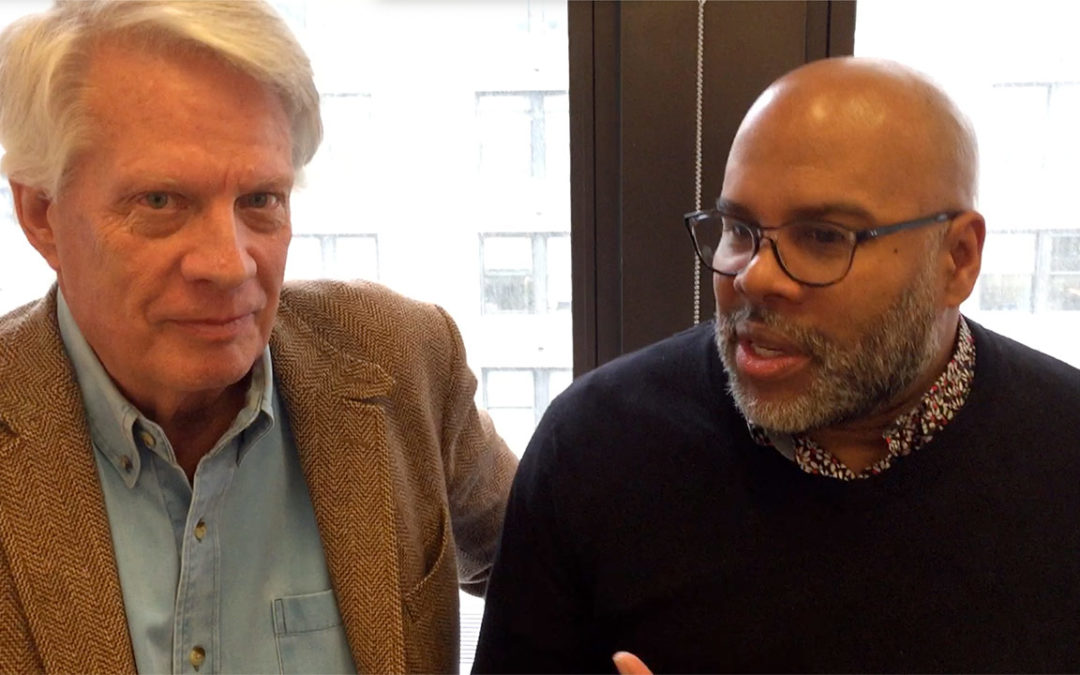
A Big Jump Forward with a Confederacy of Friends
Spring is coming and we have a new lead producer and manager and a “new” play. Onaje is now The Grace of God & The Man Machine.
Mind the Art Entertainment is our new lead producer and manager, who will be working with Sue Conover Marinello.
This is a big deal for us. The money has been raised for two new “table reads” at the New York Opera Center in late February and in early March. The legal documents will be executed in mid-March and then we will start raising money for a production.
How did we get here?
After Onaje got the rave reviews at FringeNYC, Kevin R. Free and his agent John Essay took an interest and made suggestions to develop Onaje from a 93 minute one act to a full length two act. I went to work with Kevin.
Kevin and John have exposed me to a new and more polished professional performance, and Mind the Art has had numerous NYC productions, so both are big steps up. The performance dates will depend on fundraising and the acquiring of an off- or off-off Broadway theater, but we are focused and starting down this very challenging path.
All New York productions are expensive. This is a whole new world. It appears to be more about love and community than money. Most investors, large or small, love the theater and want to be part of the excitement. They are just plain “riverboat gamblers,” if they care about the investment at all. (The producers tell their investors that there is a high likelihood they will not get their money back because only a very small percentage of New York productions are successful investments.)
Over the last months, Kevin and I have met several times and I have been open to and impressed by his ability to X-ray the script and study its bone structure and life force.
We have become friends, and out of that friendship has come a much deeper and more powerful and relevant play because we were vulnerable and shared the differences of our lives.
As we worked on the play I have been surrounded by, and have commented on the politics of the present day.
Those of you who came and saw the production of Onaje remember that it derives from the civil rights riots in Cambridge Maryland in 1967 and its aftermath.
I have discovered that the wellspring of the play and the divisions within our country derive from our first beginnings as a nation. But also from that wellspring has come deep, loving, committed relationships and even great humor. That is what the new play is about.
The support and belief of Mind The Art Entertainment has also been born out of friendship. Christian and Patrick commissioned me to write the libretto for Vox Populi based on the success of Onaje at FringeNYC. The year before, Christian, Sue, and I met in Wallingford, Connecticut at a class for producers at the O’Neil.
The beauty of this creation is it comes from divergent backgrounds and is born from respect and friendship. It is in direct contrast with what this country is presently going through. The new play incorporates the present and our nation’s past.
Cross your fingers and wish us “break a leg!” It will be an interesting year ahead of us!
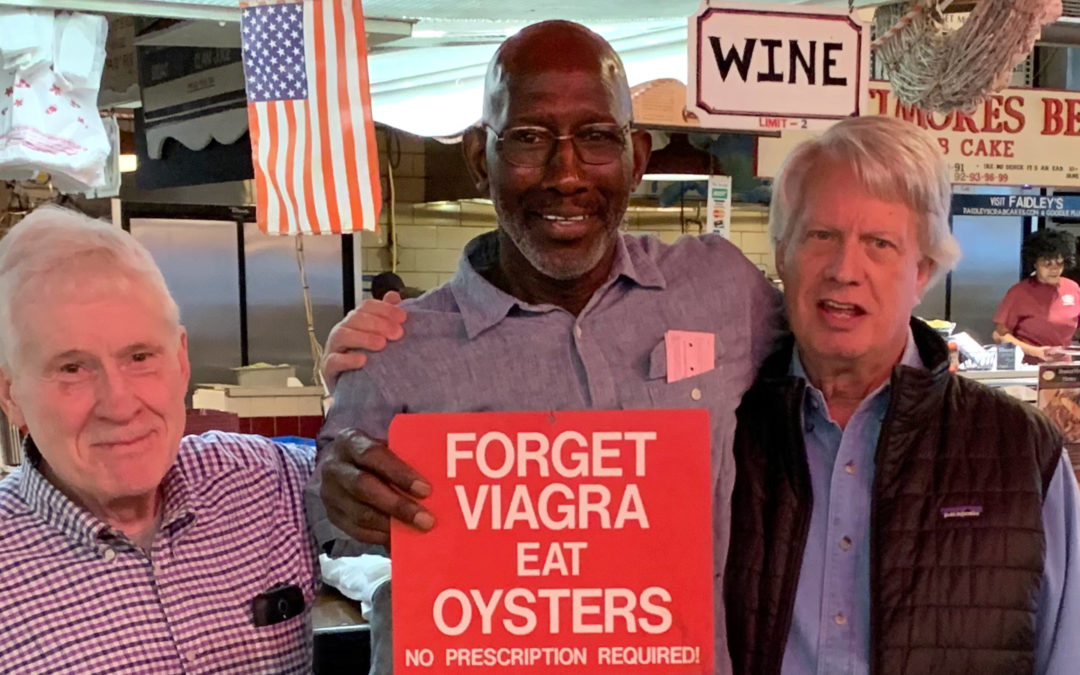
There Will Be At Least One Lawyer in Heaven
There is only one lawyer I know who will go to heaven — Mike Millemann. He recently wrote a law review article about a theater class aimed at teaching law students how to be better lawyers, which we taught together several years ago at The Carey School of Law at University of Maryland. The class was both bizarre and beautiful.
The students were tentative at first but, by the end, definitely loved it. In almost every case, the students were amazed by a third dimension this class offered to their law school education: compassion as it is embodied by our professional responsibility.
One of the students commented:
“Ten years from now, I am certain that when I am asked to share my most eye-opening class in law school, I will mention this class. It has been a learning experience that no other law school class that I have taken can come close to in comparison.”
The model for the class came from the stories of African American males incarcerated and serving life sentences in Maryland, who were later exonerated because they were determined to be completely innocent.
At the first class, one of these innocent men who had spent most of his life incarcerated under a life sentence, was introduced to the class. He quietly answered the student’s questions, remarkably without anger.
Each of these men had been through hell and had escaped it unexpectedly, and they shared that experience.
Throughout the writing and performing process, the students learned in a way that is completely different than the traditional law school education.
After going through trial transcripts, appellate briefs, the underlying facts and the law of each case, the students wrote a play. They collaborated, they wrote the roles of corrupt prosecutors under public pressure and eager for a conviction and incompetent defense lawyers who took $300 from the family of the defendant and provided only half-day trials in capital cases without prior research or exonerating witnesses. But also, the students wrote the story of the diminished hope and desperation of family members who were in shock by the verdict, and who over time grew despondent about American justice.
And then the students lived the roles which they created as they performed their play before a live audience.
In one case, Michael Austin, who had been recently released and had taught himself music during his incarceration, stayed with us throughout the class and was asked to join a class member at the side of the stage to add musical accompaniment.
In the last scene, the governor of Maryland announced publicly that Michael Austin was to be released. On stage, the student playing Michael Austin was asked: “Are you angry about what has happened to you?”
To the extreme surprise of the audience, Austin, barely noticed previously, took center stage and announced: “I am Michael Austin and I am thankful for the lawyers who accomplished my release and for the efforts of this class and this law school for telling my story.” From the surprise, came tears in the audience.
But more importantly, the class had learned what law school doesn’t teach: that a lawyer, when he or she takes the oath required to be licensed, has a greater responsibility to the society than almost everyone else. The oath is not a license to make money. It is a responsibility to “protect the Constitution” and the democracy in which we live.
The brilliant Elliot Rauh, a founding member of Single Carrot Theatre and I worked together on this class, but the suggestion and support for the project came from Professor Michael Millemann. He is going to heaven for his lifetime commitment to public justice and the unfairly incarcerated, and for this class.
Professor Michael Millemann’s article has already been accepted by one law review for publication and others are expected to express interest. When it is published, I will post where it can be read.
Featured in the photo: Michael Millemann, Michael Austin, Robert Bowie, Jr.

No, Lindsey, You Can’t Do That!
We deserve better than this.
Senator Lindsey Graham just announced that the Senate might change its rules to require Nancy Pelosi to submit the Articles of Impeachment to the Senate so that the Senate can have a trial (and McConnell now claims to have the votes to prohibit testimony and new evidence).
There are two problems with Senator Graham’s analysis.
First, the Constitution won’t allow it. Senator Graham apparently has not read Article 1, Section 2: “The House of Representatives… Shall have the sole power of impeachment.” And Article 1, Section 3: “The Senate shall have the sole power to try all impeachments.”
The House is the prosecutor and the Senate is the jury. So, until Nancy Pelosi decides to present the Articles of Impeachment to the Senate, the Senate can’t do anything but wait.
Second, the situation does not allow it. Every day new evidence comes out that has been withheld by the President and should have been part of the impeachment articles.
The House should reopen the impeachment hearings, subpoena the witnesses and documents, hold those that do not comply in contempt, and wait until they comply.
As I have written previously, the Speaker of the House in an impeachment proceeding has a duty to every citizen of the USA to ensure that the constitutional requirements of an impeachment trial will be carried out before she proceeds to the trial in the Senate. She is the lead prosecutor. That is her duty.
It would be a dereliction of that duty, a violation of the Constitution, and an acquiescence to obstruction of justice to proceed with a trial knowing that the defendant is withholding witnesses and documents, and that the jury has predetermined a verdict of acquittal before the trial begins.
She must wait for the federal courts to enforce the Constitution and order the witnesses appear and the documents be produce and are available for consideration at the trial before the Senate. She must not compromise . She must put the spotlight on the head-on collision between fascist partisan politics and the clear violation of our Constitution . The politicians are in control and we deserve better than this.
The senators will take their oath “of objectivity” and for many the hypocrisy quite possibly can’t be stopped. (It might be fun if the prosecution asks Chief Justice Roberts, the judge in this case, for the right to voir dire the jury to determine if there is pre-existing bias, which should require disqualification of senators who have publicly stated that they have made up their minds and are working for the defendant.) No matter what, however, Pelosi must wait for the federal court’s rulings requiring the testimony of witnesses and production of documents.
We can wait. Time is not the enemy of the country in all of this, but it is the enemy of an obstructionist defendant.
President Trump and Senator McConnell will show their hand if they lambast Pelosi for waiting for a court ruling, because they will show that the court and the delay is what they really fear.
They want to force a vote by a biased jury so they can declare victory in the President’s campaign. But if they are forced to wait, and they lose in the courts (as they will) before or even after the election, they will not be able to sweep their obstruction under the rug. It will be a historical record. It will be irrefutable.
Time is not the enemy! Given the time and a chance to talk together, more people will have a chance to understand and get it right. Nixon was elected by every state of the union except Massachusetts. Two years later, he resigned when it became clear he was about to be impeached by a bipartisan vote.
So, in fact, time and the Federal Courts are Pelosi’s ally. The more she waits out the storm and requires that the Constitution be respected, the more President Trump and Senator McConnell will be punished for their stonewalling and other violations when the courts rule against them.
Even though it is presently unsubstantiated, I fear that the President may attempt to use a foreign conflict to unify the country to avoid further focus on the impeachment. If that turns out to be true, that would be both frightening and further grounds for impeachment.
This must not be about election politics. It is about whether we can hold on to our Constitution and who we are as a country.
The question is: Does Pelosi have the guts to withstand the storm and represent all the people of the United States, not just the Democrats?
These are horrible times for all of us. The politicians must not control and divide us. We deserve all the facts and an unbiased jury. We are all Americans and a fair trial is the very heart of what keeps us free.

We Will See Soon Enough
Regardless of how partisan things seem, Nancy Pelosi’s duties no longer run exclusively to the Democratic Party.
As Speaker of the House in an impeachment proceeding, she has a duty to every citizen of the USA to ensure that the constitutional requirements of an impeachment trial be carried out before she proceeds to the trial in the Senate. She is the lead prosecutor. She is an officer of that court.
It would be a dereliction of her duty, a violation of the Constitution, and an acquiescence to obstruction of justice to proceed with a trial knowing that the defendant is withholding witnesses and documents, and that the jury has predetermined a verdict of acquittal before the trial begins.
She must wait for the federal courts to enforce the Constitution. She must not compromise for anything less. She must put the spotlight on the head-on collision between fascist partisan politics and the clear violation of our Constitution, and have the Federal Courts confirm the Constitution and her protection of it.
The senators will take their oath “of objectivity” and for many the hypocrisy quite possibly can’t be stopped. (It might be fun if the prosecution asks Chief Justice Roberts, the judge in this case, for the right to voir dire the jury to determine if there is pre-existing bias, which should require disqualification of senators who have publicly stated that they have made up their minds and are working for the defendant.) No matter what, however, Pelosi must wait for the federal court’s rulings requiring the testimony of witnesses and production of documents.
Time is not the enemy of the country in all of this, but it is the enemy of an obstructionist defendant.
President Trump and Senator McConnell will show their hand if they lambast Pelosi for waiting for a court ruling, because they will show that the court and the delay is what they really fear.
They want to force a vote by a biased jury so they can declare victory in the President’s campaign. But if they are forced to wait, and they lose in the courts (as they will) before or even after the election, they will not be able to sweep their obstruction under the rug. It will be a historical record. It will be irrefutable.
No, time is not the enemy! Given the time and a chance to talk together, more people will have a chance to understand and get it right. Nixon was elected by every state of the union except Massachusetts. Two years later, he resigned when it became clear he was about to be impeached by a bipartisan vote.
So, in fact, time and the Federal Courts are Pelosi’s ally. The more she waits out the storm and requires that the Constitution be respected, the more President Trump and Senator McConnell will be punished for their stonewalling and other violations when the courts rule against them.
It is not about the election. It is about whether we can hold on to our Constitution and who we are as a country.
The question is: Does Pelosi have the guts to withstand the storm and represent all the people of the United States, not just the Democrats?
No guts, no glory, Nancy. Weakness won’t work. “Oh, say can you see?” We will see soon enough.
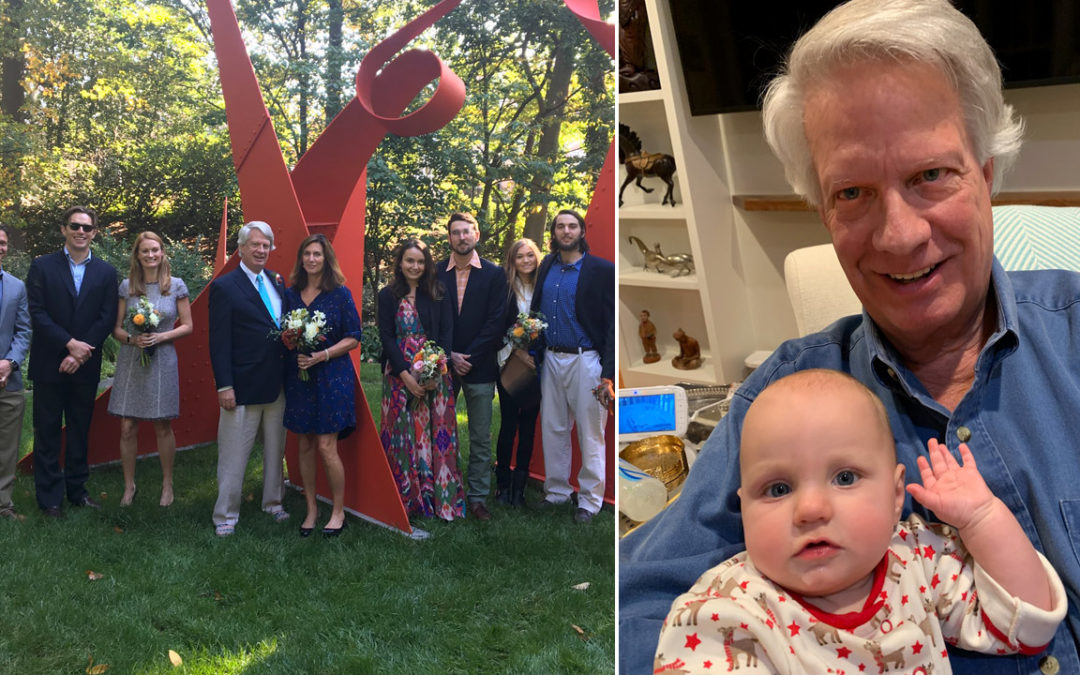
A Bathroom Museum and a Late Commitment to Christmas
Perhaps because I am older, or perhaps because I am now a playwright and a recovering lawyer, I decided I would make a commitment to a more spiritual Christmas this year.
I committed to finding a passage out of the comfortable consumerism, “Jingle Bell Rock” on the radio, Alvin and the Chipmunks and the hula hoop, and into a less self-deceptive and more spiritually aware holiday.
My problem is I excel at self-deception.
In the past, I have always believed that I was sufficiently into the festivities to fool myself, and I would let the transformative spiritual moment gently pass.
No, in truth I am a wizard of self-deception.
I fool myself in little ways all year long as I artfully keep my “spirituality” — like my “modesty“ — at bay.
For example, I have a room right next to my study that contains the framed memorials of the important accomplishments (of which I am so very proud) from my life as a lawyer and playwright.
When I enter this room, I am reminded that I don’t take myself too seriously, because it also contains a sink, a toilet and extra toilet paper. But of course, it is not a private bathroom. If nature calls, our guests are forced to see what I am proud to believe I have made of myself, framed and on the walls when they lock the bathroom door behind them.
I have employed this same gift of willfulness and self-deception when I have prepared myself to let the holidays gently pass by each year.
But as I have said, I think things have changed now that I’m a playwright and recovering lawyer.
I have been forced to see things less as an advocate and more as an observer.
A judge or jury renders a verdict, but there is no redemptive celebration thereafter. Rectifying and resolving social wrongs, if that happens at all, offers no thought of spirituality and in my case, may regrettably explain the bathroom.
But as a playwright, I have come to observe that my plays are meaningless unless the actors commit to giving them life and the audience commits to embracing the performance and the work.
So I have observed that some ethereal things do not come to pass at all unless there is belief, commitment, and then action.
This year, I will find the time for that individual commitment and action on Christmas Day. After I celebrate the joy of being with my family, I will take a walk — perhaps just a little walk — out by myself alone and consider the universe, which I do not understand. I’ll stop for a moment and realize that even if I have no belief in a heaven or a hell, I accept that cold hand of “grace,” which is what so much of religion and spiritual faith is about. And then when I return back home, I’ll try not to see if anyone is locked and reading in the bathroom.
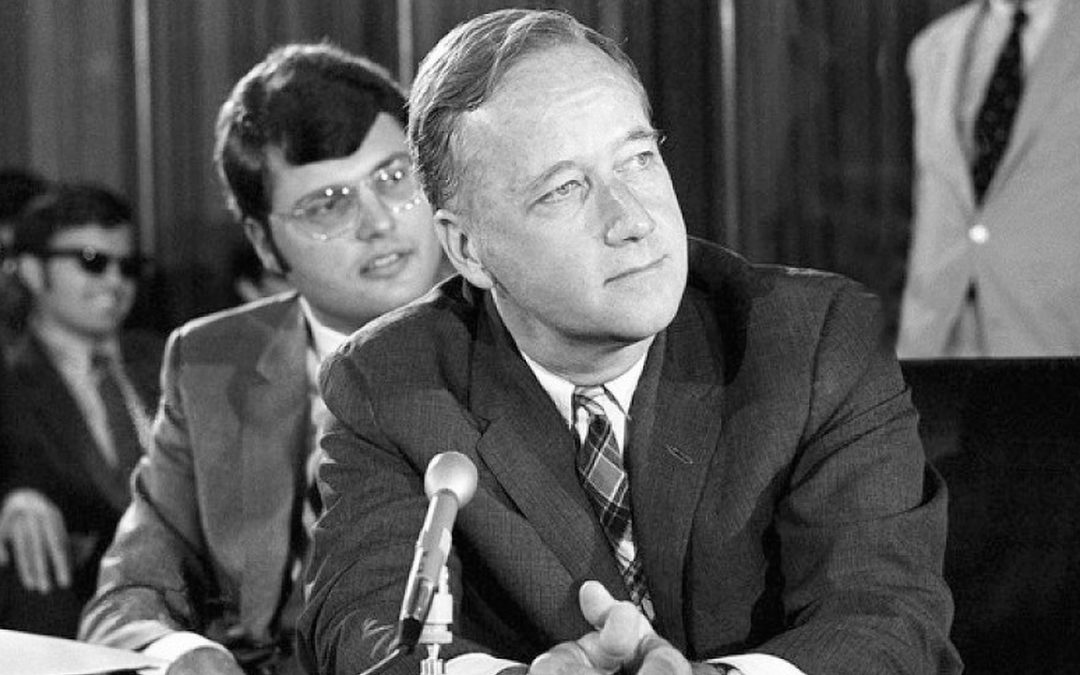
A Memory of a Soon Forgotten Past?
Today, I am mourning a Republican U.S. Senator that I was fortunate to know and serve during the impeachment proceedings of Richard Nixon. I must be wrong.
As the Republican-controlled United States Senate will soon consider impeachment, I have grown horrified by the contrast between what I thought I remembered and what I see today. I must be wrong.
So I went back and reread Senator Charles “Mac” Mathias’s obituary to check my recollection. I will quote the obituary from The New York Times below:
“In a 1974 campaign speech [Mathias] quoted Burke’s 1774 letter to the Electors of Bristol: ‘Your representative owes you, not his industry only, but his judgment; and he betrays instead of serving you if he sacrifices it to your opinion.’”
I thought I remembered that Mathias believed he served the constitution rather than a political party and did not hesitate to practice these beliefs and defend them publicly:
“I’m not all that liberal,” he told The Washington Post in 1974. “In fact, in some respects I’m conservative. A while ago I introduced a bill preserving the guarantees of the Bill of Rights by prohibiting warrantless wiretaps. I suppose they’ll say it’s another liberal effort, but it’s as conservative as you can get. It’s conserving the Constitution.”
I remembered that Mathias exercised these beliefs often at his own expense.
“However he described them, his votes, his vocal unhappiness with the growing conservatism of the Republican Party and his lack of support for Ronald Reagan cost him leadership positions. In 1979, Senator Strom Thurmond maneuvered to block Mr. Mathias from becoming senior Republican on the Judiciary Committee.”
Although he desperately wanted to be the chair of the Senate Judiciary Committee, he saw his responsibilities to serve a greater bipartisan agenda.
“His Senate colleague for many years, Paul Sarbanes, Democrat of Maryland, said Monday that while Mr. Mathias’s ‘most intense critics were within his own party,’ nevertheless ‘Mac commanded enormous respect on both sides of the aisle.’”
Mathias practiced the clear intent of the Constitution, unlike the recent Republican appointees to the Supreme Court who affirmed Citizens United and refused to address the political polarization of gerrymandering.
“Mathias advocated public financing of campaigns and ceilings on contributions (measures enacted the next year). He said that in his 1974 campaign he would reject cash contributions, take no more than $100 from any individual, report every contribution and expenditure”
My recollection was correct.
All that is gone now. The strict constructionist of the Constitution will cite the clear definition of treason, which requires aiding and abetting the enemy at the time of war, and will think nothing of a President and political party that will not impeach a president for turning foreign affairs to his political benefit, who refuses to fight and actually encourages the support and intervention of foreign governments in our elections.
All that is gone now, as our foreign policies, so carefully crafted after WWII to support the allies of freedom, crumble as we abandon the Kurds to Russia, and our allies in South Korea and Japan to the threat of North Korea, as it continues missile testing despite hollow promises to us. And finally, and perhaps most painfully, Europe turns to others as we let NATO and the European Union crumble before our blind eyes.
The Republicans will let the impeachment fail. But if the country gives this president another term, America, a shining “city on a hill,” will be gone as we know it.
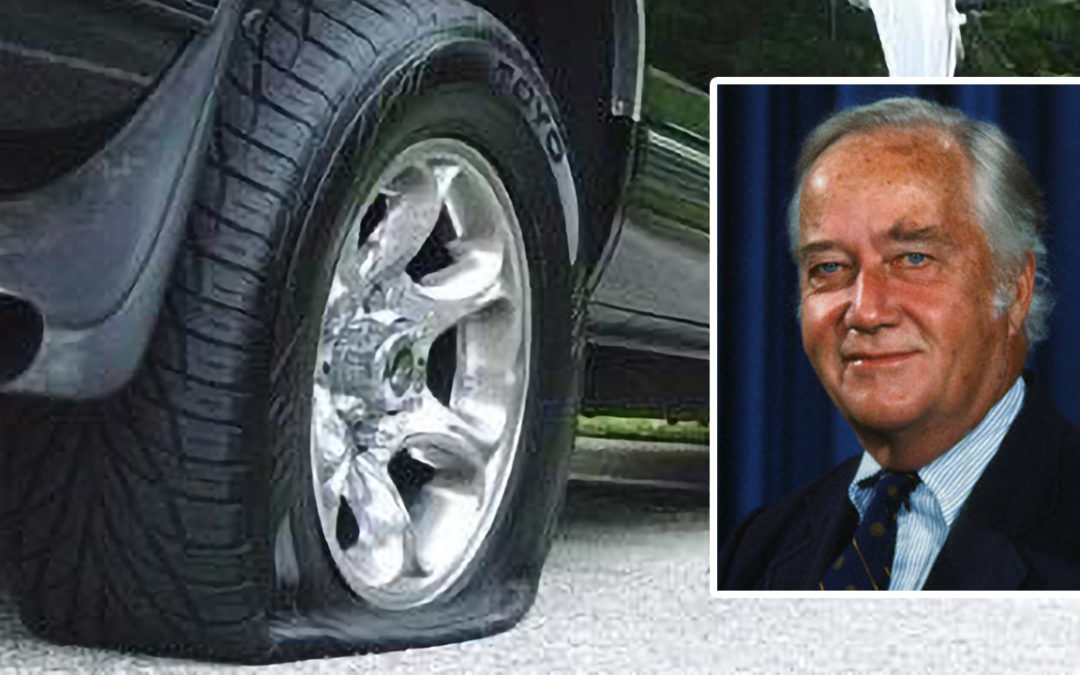
It Is Different Now, but It Remains the Same
You can call it “fake news” or the subjugation of truth, but when confronted by self-serving diatribes and obstructionist partisan arguments, I saw several witnesses at the impeachment hearings persist and tell the truth — or at least preserve its credibility — no matter how difficult that was for them.
When I was a driver for U.S. Senator Charles “Mac” Mathias’s (R-MD) during the Watergate proceedings, news and politics were different than today. Credibility was everything.
On TV, Walter Cronkite delivered the truth on the CBS Evening News. He was voted the most trusted man in America.
The newspapers never had that power of personality, but they doggedly stood behind their stories, even when they relied upon undisclosed sources like “Deep Throat.” They knew they were at risk every day.
Credibility sold the news, and advertising, and paid for heavy overhead and lots of investigative reporters.
Today, news sources on the web do not need credibility. They have followers instead.
They are also not at risk because they have few, if any expenses, and are often not even identifiable. Social media is flooded with unverifiable news sources, some of which are paid for by our enemies as they seek to disrupt our country’s elections.
Senator Mathias was from Frederick, Maryland — farm country — two hours west of DC. He was fiercely loyal to his city and his state. He cherished his reputation for integrity and his nickname, “The Conscience of the Senate.”
It was different back then, but it is still the same.
I was driving Mathias when he was summoned by President Nixon to an afternoon rally the next day. Mathias was to be filmed beside Nixon for the evening news that night. Mathias had, in essence, been summoned to give the President an unspoken endorsement in Maryland’s Washington suburbs, in Mathias’s home state.
Maryland is an overwhelmingly Democratic state. Mathias was no fan of Nixon and Nixon knew it, but Nixon was a Republican and so was Mathias.
Credibility was everything to Mathias but he couldn’t say “no” to the president without punishment from his party.
I picked the Senator up at his home that morning and we headed to his scheduled meetings.
The first thing he said to me as he got into the car was, “looks like that tread on the left rear tire is thin.”
After the morning meetings and before lunch, I offered to take the car to get the tire checked, but Mathias said he wanted me inside to record his speech on the handheld tape recorder I always carried with me for such occasions. He made sure he was never misquoted.
After lunch, as he got into the car he pointed and asked me, “You think it looks like that tread is dangerous?”
I insisted that I get the tire checked immediately so we would be on time for the rally.
The Senator thought for a judicious moment. “I think you are right, Bob. Let’s get it looked at.” But as I turned into a filling station he quietly said, “I have always bought my tires up at the Goodyear store in Frederick.”
By the time we got back to Washington, the rally was over. As I let him out of the car that night, he asked me to remind him to send his apologies to the White House.
To maintain credibility in the face of power, persistence may not always offer the opportunity to speak the truth. But at least it’s a statement on its own: the resistance is a placeholder for the truth, and it retains our gravity.
It is different now, but it remains the same.
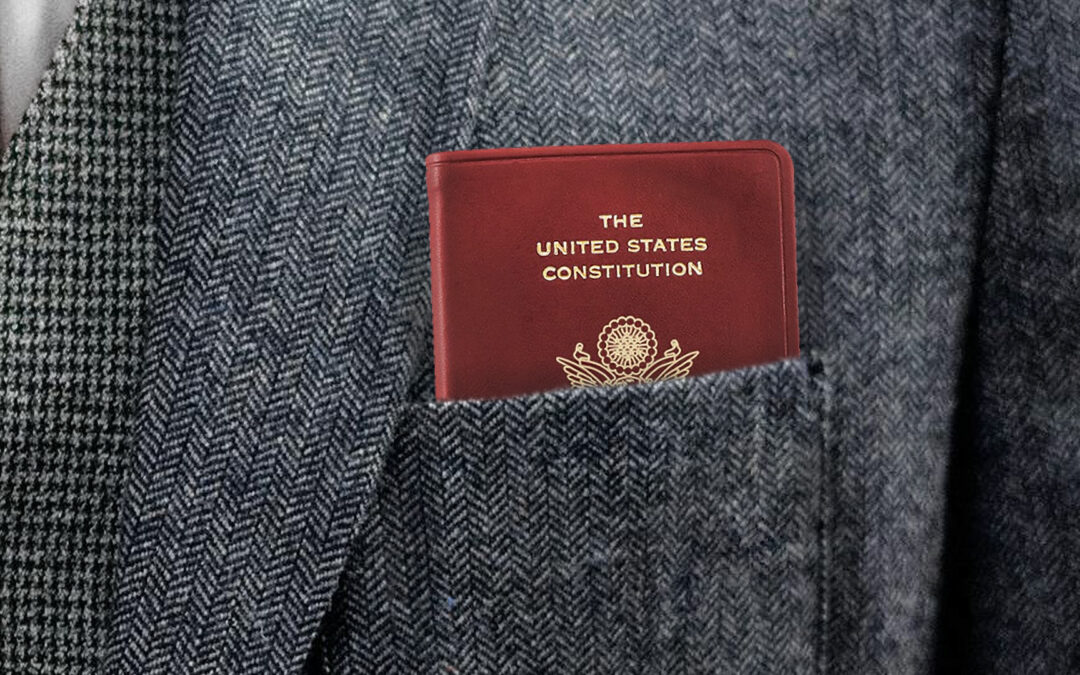
I Almost Got a Chance to Cite the Constitution in Traffic Court
I remember when Congress actually had good manners and I almost got a chance to cite the Constitution in traffic court.
Many years ago, from within a culture of politeness, I watched the U.S. Congress impeachment proceedings of Richard Nixon. Now, 45 years later, this culture of politeness in Congress doesn’t exist, but back then it seemed to have several benefits.
I got a job in the office of Senator Charles “Mac” Mathias (R-MD) as his mail clerk. My “office” was directly behind the wall that separated me from the receptionist and everybody else.
After several months, I got a chance to demonstrate my enthusiasm. The Senator knocked on my door and told me he had a “special assignment” for me.
He told me that there was a lobbyist right on the other side of that wall who was sitting in the receptionist area. The lobbyist had just threatened to pull all of his airline clients out of BWI unless the Senator voted in favor of a bill that would be considered by the Senate that afternoon.
The senator told me to take the lobbyist to the Senate dining room and take detailed notes on what he wanted.
I straightened my tie, went through the door, and introduced myself.
After a brief moment, the lobbyist looked me over and asked me, “What exactly is your job title?”
I proudly told him, “I am the mail clerk!”
He thanked me, declined my invitation to the Senate dining room, and left.
One of the benefits of this culture of politeness was it encouraged good manners without public reprimand.
The Senator eventually took pity on me and I became his driver.
Back then, the Senate was bipartisan and the senators got along. We filled up the back seat with the likes of Kennedy from Massachusetts and Tower from Texas. We all listened to the political news in the car together on WTOP.
Despite often radically different points of view, this civility grew from a collective belief that these representatives were exercising a shared power. It made sense. This responsibility of shared power allowed a culture of compromise and progress that we have not seen since the country has been polarized.
There was a reverence on both sides for the Constitution. Mathias always had a copy in his coat pocket.
No one was immune from this culture, including me. One time as we were headed to Washington from the western part of the state, Mathias leaned over to me, turned down the radio, and said, “We can pick it up a little. You are going to law school. If we get pulled over, you will be able to cite the Constitution to the officer.” Mathias smiled as he patted his coat pocket. “It is illegal to hinder a member of Congress on the way to a vote.”
I never asked him for the chapter and the verse. I just drove a little faster. It just made sense.
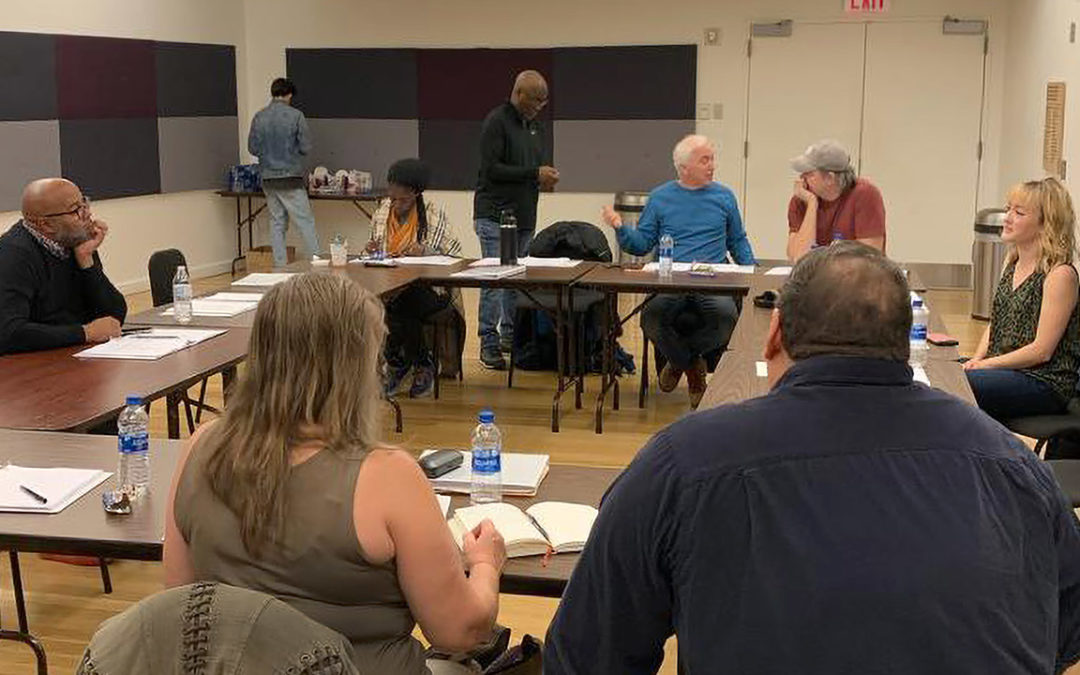
We Have Confronted the Enemy and It Is Us
Sometimes, it seems as if Amtrak travels through America’s subconscious.
Last Sunday, on a cloudy afternoon, I took the train up to NYC for the “table read” of my new draft of Onaje. I put The New York Times on the seat next to me and looked out at the graffiti on the abutments of the bridges and junked cars in back yards.
We are divided by our politicians, but are we now divided from our children too? I had read about why the “millennials” blame the “baby boomers” for the world they have inherited and had wondered if there was a common beginning to all of this.
The millennials don’t have the ”spoiled child” anger of “sex, drugs and rock & roll” and “never trust anyone over the age of 30,” which was the mantra of my generation. Their anger is the residue of all that.
We were born into the rich, expanding post-war economy. They want a job to pay off the student loans for the education to get the job they never got.
How could this have happened?
To placate us, President Lyndon Johnson, ended the draft. Our parents — all of them — had been drafted and went to war together to defeat fascist nation states and rebuild a capitalist Europe, to allow free trade to rebuild the devastated nations that we had defeated, and then to break down walls to offer freedom for others.
For the college-educated boomers, it had been acceptable to avoid the draft, because we didn’t approve of the war.
Unintentionally, by doing so, we split the nation the millennials inherited into the privileged rich who would not, and the working poor who would fight our future foreign wars and salute our flag, after the privileged draft-dodgers had felt free to burn it.
The thing is, the “privileged” never followed through. After we graduated, the Peace Corps and public service became old news. We had bumper stickers that said: “The One Who Dies With The Most Toys Wins.”
We were too self-obsessed to notice that the seeds which had created WWII were composting here in our country as we let the economics of disenfranchisement grow.
NAFTA would bring those seeds to bloom with immigration reform. It was predestined, as the privileged got richer and the jobs of the working poor left town, and women still remained unprotected ( “Me Too”), and the city slums expanded ( “Black Lives Matter“). The white working poor were easily fanned into racist hate as they were left behind.
It was painfully ironic on Monday, at the reading, when the actors brought the past into the present. They brought to life a play about savage racist riots which happen in 1967, just as the early boomers went off to college.
It was painful to see how the cast of white and black Americans could so brilliantly bring the hate and violence between the races to life, and then break from their characters and become friends so easily and talk and laugh. It stood in stark contrast to the story of the play and to the anger presently in our country, now so divided that even families are unable to communicate.
How could this be? It may be that the actors had a common goal that was bigger than any individual in that room. They needed each other and enjoyed each other as they brought that common goal to fruition.
Perhaps the boomers thought only of themselves. The one percent now has all the toys. In the end, we are what we do, not what we say. We said we were ”peace and love,” but we had no commitment to anything other than to our avarice and greed.
We earned Trump and his bone spurs. He is one of us.
I have provided the names of these wonderful actors. Watch for them on TV and on the New York stages. They are each and everyone of them brilliant: Joe Dellger, C.E. Smith, Tim Rush, Khiry Walker, Adam Couperthwaite, Laura Darrell, Mary E. Hodges, Johnny Shea, and Erin O’Brien.
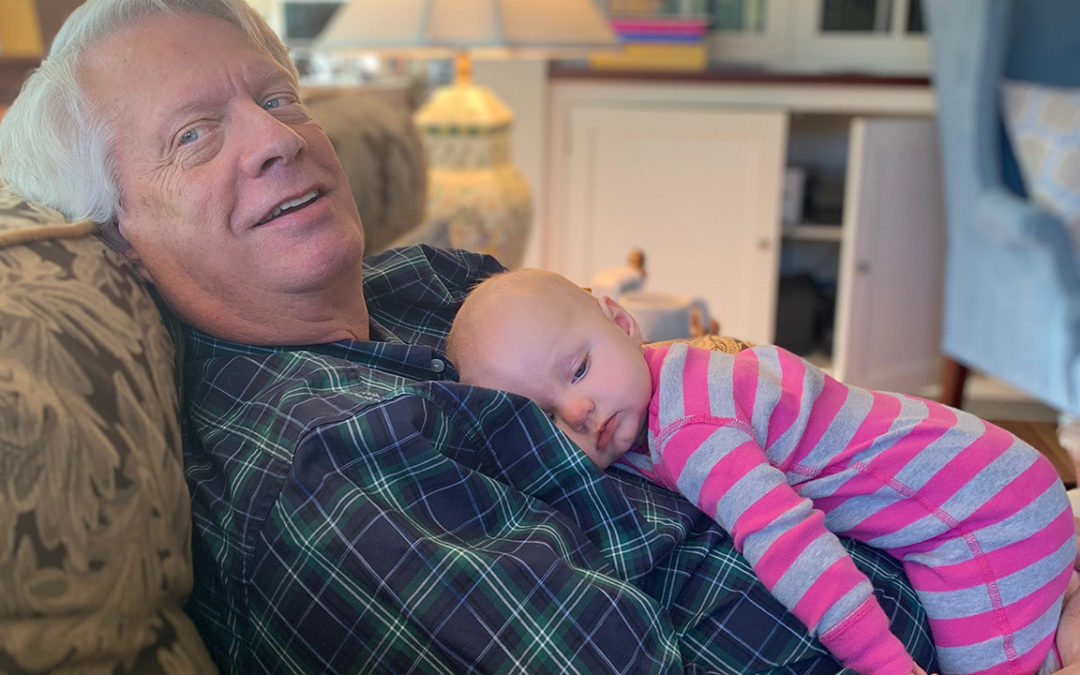
Rules of the Road
So this is what an old progressive thinks he learned from his granddaughter:
Last Sunday afternoon, before my visiting daughter and son-in-law went off to the 8:00 PM Ravens/Patriots game, I volunteered for the early morning shift of “baby duty” the following morning, so they could sleep a little later the next morning.
When Ann, my granddaughter, woke up at 6:00 AM, I fed her her first bottle of the day and we settled into the couch to read a book as we listened to a little Oscar Peterson.
Ann is a very mellow child — unless she is bored. When she is bored, she will cry a little until you introduced her to something new for her to look at or listen to.
When reading books finally didn’t do the trick, we cruised the house looking at artwork and the photographs on the shelves. She was verbal in her approval and remarkable in her concentration.
After a while, we returned to the couch and she bounced gently on my knee to Oscar’s rhythms until she fell asleep in my arms, her head on my chest.
Although we have known each other for her first six months, that morning something had changed. I had listened to her and she had trusted me enough to go to sleep as I was holding her.
We all live under a set of laws which are enforced in different ways. The government issues tickets for speeding or going through a stop sign, but the rules of the road are enforced by indignant drivers who honk their horns.
Nationally, we are punished for violations of federal laws or state laws, but in much of our country also, for violations of “political correctness.” The first two are enacted by our legislatures and interpreted by our courts. The third is the law of a progressive culture, and the rules of this road are now also enforced by the indignant. For them, it is as it is on the highway. There is no appeal for those who they judge to violate these rules, other than an extended middle finger.
Many of the front runners in the Democratic party, with the best of intentions, seek to codify many of these rules. They are indignant at those who wrongly disagree about America’s history of immigration, climate change, universal healthcare, women’s rights, and the rights of gay and transgender people. They have passionate supporters who look down their nose at the “undereducated,” who do not understand the new and better rules of the road.
When Alice and Rick, my natural children, were born they were “my” children and I demanded that I hold them almost immediately after their birth. There was a genetic bond from the start. But with my granddaughter, she is once removed and it was up to me to earn my place in “her” family. With both, I was equally as paternalistic and well-intended, but the relationship was different.
It is easy for a political party to advocate the “obvious” good intended for our country and its people, but how that message is received is the issue, particularly when these rules are seen to threaten the livelihood, safety, and patriotic beliefs of the unconverted.
Further, this intolerance makes it easy to drive a wedge between the two sides and demonize the believers in order to polarize the fearful.
The most effective advocacy starts with listening and empathy if you want others to be part of your family and you want to be part of theirs.
My granddaughter had a voice, if not words, and I had to win her respect and trust. If I had imposed my effort to teach her reading, or required she love the genius of Oscar Peterson, that trust would never have developed as it did.
We are not enemies. We are Americans that disagree. Trusting enough to listen may get us what we want.

As the Pendulum Swings
As the pendulum swings we run out of time.
You know that old joke about if there is one lawyer in town he will go broke but if there are two they both get rich? I keep thinking that’s how our political parties presently work.
But what is wrong with good old American “enlightened self interest”? I mean the two lawyers are not evil or anything. They didn’t intentionally get rich. Same with our political parties.
It is convenient that there are two sides to every conflict, which could potentially become volatile and polarize us — hot button “call to action“ advertising helps but “propaganda” and “false news” really works great! Gerrymandering is just organizing and expanding the zip code of the client base when the holiday cards go out.
Somehow politicians go in poor and end up rich when they come out. How does that happen?
Almost five years ago, to the day, I ran for office in a gerrymandered Republican district and got crushed. I believed back then the people in my district would recognize that the gerrymandering by our politicians was starting to be responsible for the polarization of our country. We knocked on almost 7,000 doors. When I dropped off my literature, I talked to the people I met and almost every time, we joked and enjoyed each other’s company until I was asked, “Republican or Democrat,” at which point the door was slammed in my face.
The polarization now is much worse than when I ran, because it affects not only our country but our place in the world and the “moral authority” we have championed since the Second World War as “leaders of the free world.”
Last month, with the knee-jerk fulfillment of a campaign promise from our last polarized election, we abandoned one of our most loyal allies, the Kurds, who suffered over 11,000 casualties in our battle to eradicate ISIS in northern Syria (we supplied mostly air strikes and lost almost no soldiers). Now we are no longer able to claim to be their trustworthy ally:
Victoria Nuland, who spent more than three decades in the U.S. Foreign Service as a top Russian policy expert and representative to NATO, Ukraine, and Europe during the administrations of George W. Bush and Barack Obama, recently said in an interview with the Harvard Gazette:
“When you are an unreliable ally, then countries and leaders around the world who have bet their security by being on your team have to start hedging their bets and developing multiple relationships… We’ve already felt it vis-à-vis our ability to influence Turkey’s behavior; we’re certainly going to feel it now in Iraq. Israel has been hedging for quite some time in terms of its relationship with Iran. And you see it in other aspects of U.S. foreign policy. Why should the Germans listen to us when we say, “Don’t deepen your economic and information relationship with China?”
It would seem that this must eventually affect every aspect of our life including how safe we feel at home and the cost of the international products we buy in our stores.
Under the constitutions, state and federal, our politicians control the shape and parameters of the political districts from which we elect them. This could obviously be a very powerful tool to make sure that they get elected in a greater proportion than what would otherwise be appropriate.
The Supreme Court has had numerous chances to address gerrymandering but has refused to do so: “Partisan gerrymandering claims present political questions beyond the reach of the federal courts,” Chief Justice John Roberts ruled in a decision that split the court 5-4. He was joined in the decision by Justices Clarence Thomas, Samuel Alito, Neil Gorsuch and Brett Kavanaugh, the court’s conservative wing. Polarization in the Supreme Court, too?
The real trouble is polarization cuts both ways. The Supreme Court, with this ruling, has determined that the Democratic Party in Maryland can constitutionally keep Republicans from having equal representation in the State of Maryland.
According to the Republican appointees to the Supreme Court, our politicians and political parties control our democracy, we don’t.
So what do I suggest? Before that second lawyer moves into your neighborhood, run out the first one. Then meet somebody with whom you disagree, discuss your differences, learn again how to listen, and then figure out a compromise together and do what only you can do. Overturn the Supreme Court and vote out any politician who won’t overturn gerrymandering, and by so doing, help make America great again!
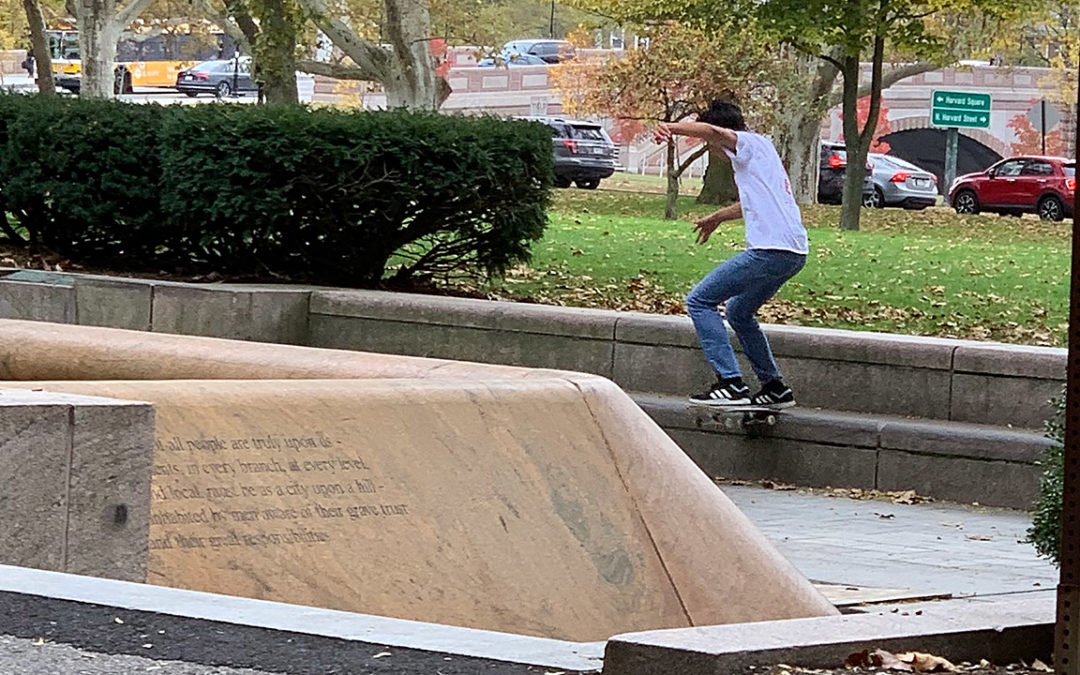
An Offer and Acceptance
Last Friday, I skipped lunch and went back to my Boston hotel room to watch Congressman Elijah Cummings’s funeral on TV.
Thirty-five years ago, when he was still a lawyer, we had a case together. I was representing a modular building company and he was representing one of the prominent African American churches in Baltimore, which had contracted with my client to buy and construct a building for Baltimore city primary school students.
Elijah and I met on the top floor of the church overlooking North Avenue where the ministers’ offices were located. He came over, shook my hand, and said, “I do a lot of criminal law and you know a lot more about business law than I do. Can we agree to work to make this fair for both sides?” I shook his hand and agreed that would be our objective.
The contract negotiations and construction took some time. As the building went up, there were adjustments to the plans and “change orders,” as there always are in construction cases, but we were candid with each other and each time we got it right.
Years later, I was at the Democratic convention in Boston and he saw me and came over and with a big smile he said: “Yeah! We learned to work well together didn’t we?” We both laughed.
I grew up in Cambridge, Massachusetts, and one of my favorite places is an old rusted fountain dedicated to John F. Kennedy. It no longer works but still has his quotes chiseled on its sides.
My hotel was in Harvard Square, so after the funeral I walk down to the fountain and read the quotes again:
“Today the eyes of all people are truly upon us — and our governments, in every branch, at every level, national, state, and local, must be as a city upon a hill — constructed and inhabited by men aware of their grave trust and their great responsibilities.”
Next to the forgotten monument was a sign that said: “No Skateboarding.”
No one was there except a skateboarder, practicing and re-practicing his art, and me.
It occurred to me that there are always laws which will be broken but we all, somehow, are subject to a deeper code. This was what Elijah understood.
Thousands of people, whether in the church or on TV, watched Elijah’s funeral. They watched and listened and were there because Elijah was an example of something we seem to not be able to forget.
Although in our daily lives and in our politics and governance it is sometimes lost, it is there in that handshake, that eye contact, that second thought that reminds us that it is as constant as gravity.
I saw Elijah on and off after that, in airports or at campaign events. He had become my Congressman. We would smile or wave. We were not friends, but we had once come to an understanding because he had offered up his vulnerability so that I could offer mine. And we could trust each other just long enough to do something right.
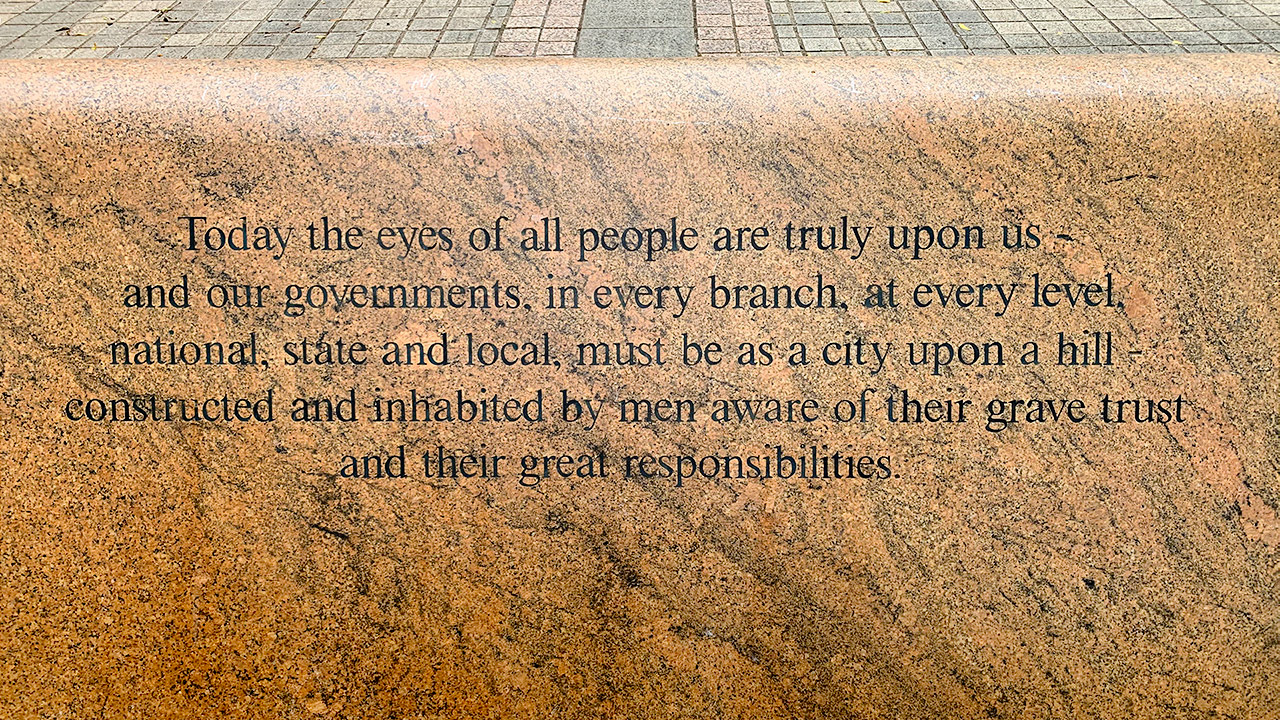

Two Good Friends
Working on the libretto for the operetta, Vox Populi, has brought me back to my love of poetry.
My favorite poems create a universe with a few words. Two good poems with a similar subject, put side by side, can introduce the creator of the other.
Like a painter organizes color and shape with his or her brushstrokes, the poet organizes a vision with the sound and rhythm of words:
“Whose woods these are I think I know./
His house is in the village though;/“
The brushstrokes? The sound and rhythm of these two lines? Speak them out loud. They are like the rocking of a hammock they are so smooth and quiet.
In complete contrast however:
“I sought a theme and sought for it in vain,/
I sought it daily for six weeks or so./“
Brush strokes? This is not like the rocking of a hammock, it is like riding a three-legged horse.
Those are the opening two lines of two completely different poems by two completely different people. Now let’s look at the last two lines of these two poems.
“And miles to go before I sleep./
And miles to go before I sleep./“
Brush strokes? The same rocking hammock. Compared to:
“I must lie down where all the ladders start,/
In the foul rag-and- bone shop of the heart./“
That must’ve been a hell of a rough ride? You are correct.
They are both about the end of life. The first by Robert Frost is entitled “Stopping by Woods on a Snowy Evening” and the second by WB Yeats is in titled “The Circus Animals’ Desertion.”
Both are about “acceptance,” it seems to me, but that acceptance comes in completely different, very personal forms. Frost’s, in a late evening snowy New Hampshire woods, and Yates’, with the casting off his “Circus Animals” (his life’s work of Irish themes).
The libretto for the operetta is meant to be baudy and entertaining. My poetry, on the other hand, is a personal statement that is directed from me to the reader. It’s from my heart.
I have placed links to both poems below for your review and your own contrasts and conclusions. Feel compassion for these two people. They are writing because they are reaching out to you.
“Stopping by Woods on a Snowy Evening” by Robert Frost
“The Circus Animals’ Desertion” by W.B. Yeats
Onaje Reflections
One year ago this past Sunday, our play Onaje had its opening night in NYC. We caught lightning in a bottle that night because of the exceptional talent of those people who came together to make that magic happen. Every performance was sold out and every reviewer gave us a rave.
Since that opening, Onaje has picked up steam, and is headed for a new production and a great future. We thought it might be interesting to ask: “Where are they now?”
Here is what we’ve learned:
Curtis Jackson, who played the titular Onaje, is currently assistant directing a new immersive performance Incomplete Conversations (produced by his company, Silent Theatre Company), a full-length play presented throughout multiple spaces and three floors. He also starred in Blacksite: The Musical! (produced by Soft Cage Films), and Eugenie, a short film with the Southside Filmmaking Youth Initiative.
Tim Rush, who played Henderson, was cast in the double role of Jackson/Kirk in Wendy Macleod’s Women in Jeopardy at The Shaker Bridge Theatre in New Hampshire last spring.
Bristol Pomeroy, who played Richard Middleman Sr, continues to be considered for TV and stage roles.
Prop Master Joey Paradise moved on to FRAGMENTS, a play about a woman with Alzheimer’s remembering being a girl in Austria during WWII. He also joined the New York company of Jersey Boys as a stage management sub and is working as a consultant and script doctor.
Ralph Meizler, our amazing Stage Manager, is currently in rehearsals for the touring company of Broadway hit Frozen.
Mary Hodges, who played Sarah, has been Assistant Director on Slave Play as it has made its way to Broadway! She can also be seen playing Judge Anita Wright on Law & Order: Special Victims Unit.
I also asked some members of my production team to send in their reflections.
Sue Conover Marinello, Producer
In the year since producing Onaje at FringeNYC in 2018, I have marveled at the amazing bonds this project formed. This story, the poetry of this writer, the vision of this production united us. The cast, the crew, the writer, the audience — so many wonderful people who make theatre possible — are joined in the shared experience that is Onaje. While this play highlights specific events that take place on the backdrop of an actual historical riot, Onaje joins us all in a shared history and quest to create a better America and world. It strives to imagine a reality where people respect one another.
To produce Onaje at FringeNYC was intense and wonderful. To continue to move this project forward to its next production is inspiring. The magic of theatre is borne out of hard work, focus, play, experimentation, and precision. Through 2019, Onaje has grown. I am grateful for those strong 2018 bonds, and look forward to 2020 as producers, cast, crew, writer and audience will once again unite to make theatre possible.
Katie Marinello, Social Media Manager
Onaje was a life-changing experience for me. Bob and Sue took a chance, letting me be their social media manager while balancing a full-time job. I learned so much in such a short time as we sold out tickets, grew our following, and increased engagement. I felt energized in a way I hadn’t in forever. Not only did I get to work with a fabulous group of people and see six dynamic and varied plays in six days, my next client was sitting in the audience at Bob’s play! Since then, I’ve been able to quit my full-time job and launch KT World Communications, LLC, a social and digital communications company. Bob has become a mentor as well as a friend and client and I couldn’t be more grateful. I can’t wait to see what’s next!
Jim Marinello, Assistant and fan
A year ago, I was lucky enough to see Onaje awe audiences night after night. Some of them remember 1967; many didn’t. Audiences came with high expectations, and they were not disappointed. Expectations have only grown since then. I have been a super fan of this piece since I first saw it in a staged reading well before the Fringe, and I am pulling for it to find the right forum and production to present its powerful message to a wider audience.
Informally, we have heard that everyone is doing well. More specifics to come but one year later it is pretty clear that good things come from collaborations with good people.
We thank each and every one of you who made this magic happen. If you have any reflections or updates to share with me, please send them along!
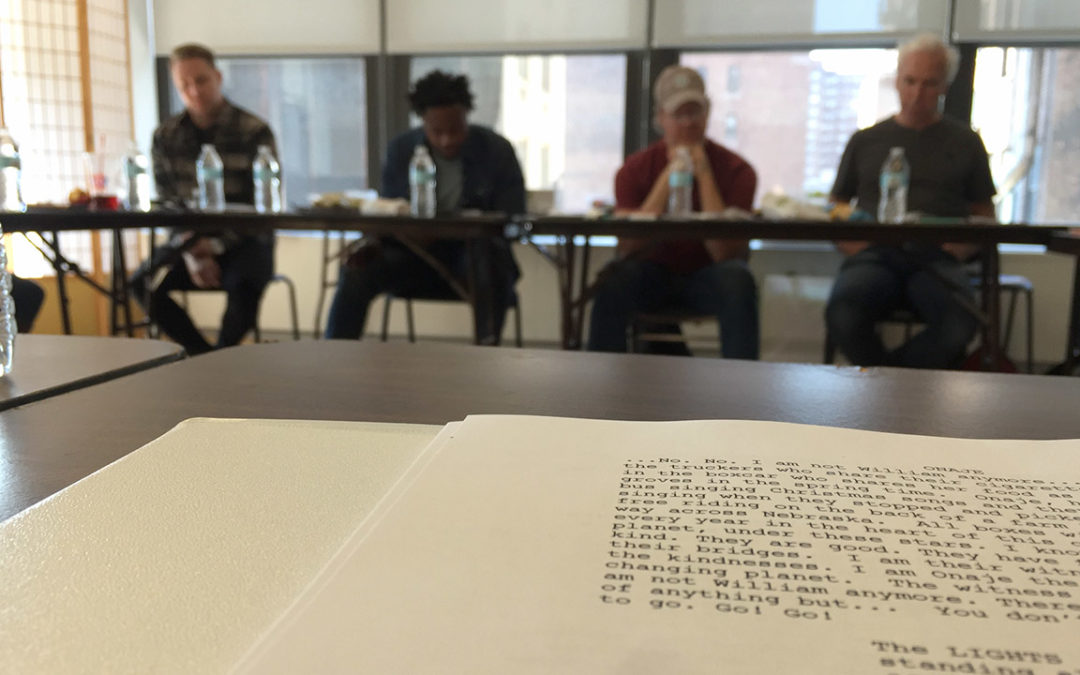
My Sappy Self-Addressed Greeting Card
Ever since I finished the operetta with Christian in beautiful San Miguel, Mexico this August I have been having withdrawals. I have been waking up laughing from nightmares because they are in perfect Hallmark Card couplets:
“Happiness is when all your dreams come true/ ❤️❤️❤️
And become the job you really want to do./” ❤️❤️❤️
Instant dry heaves. What has happened to me? I can’t go back to sleep after something so sappy/awful as that. Probably because I’m afraid to… What is my mind trying to tell me? And I think it is permeating other aspects of my life!
“It also seems to happen when, without regrets/ ❤️❤️❤️
You start a blog and confess to dreaming couplets./” ❤️❤️❤️
Terrible! Terrible! OKAY! Think deep! What could be the cause of this?
Last Tuesday at noon on the eighth floor of the National Opera Center at 7th and 29th, I found myself looking out the window as the actors and Kevin R. Free were entering the room behind me. I should have been nervous.
I had reworked the script with Kevin and he had called for a table read to try it out with many new actors he had chosen. The room was on a corner of the building, so I had a view of 7th Avenue heading north and 29th west. From the eighth floor, even the traffic jams and people zigzagging past each other on the street below seemed to provide a calm order which I took for granted.
Kevin took control and the reading began. I decided to just listen. Predictably, but quite remarkably, the gifted actors brought the story from the page and built the characters and the relationships with their inflections. I was hooked. Every one of them was brilliant. They give a new draft its birth.
After discussion and feedback, Kevin, his agent John Essay, our producer Sue Conover Marinello, and I went next door for a drink and quick dinner.
The actors had universally loved the new rewritten play and those who had performed it before had said the already successful play had been substantially improved. Kevin, John, and Sue agreed and made wonderful additional suggestions. Only then did I realize, both the script and I had been on trial.
Being nervous would have been more than appropriate. But somehow the suggestions, the collaboration, and the successful result all were just steps heading for the more perfect production. Ok — so why am I dreaming in the language of heart-throbbing greeting cards? ❤️❤️❤️
The night before, I had been lucky enough to have dinner with Christian. He confirmed that in the second week of November he would have rehearsals of several of our songs for the operetta and then do a recording of them for marketing purposes. We discussed a new opera that he wanted me to sketch out. It all seemed so natural.
I decided to stay another night so I could see and study “Hadestown” which was chosen as this year’s best musical on Broadway. Christian had told me how much he liked and respected it. Without a second thought, I felt it was important for me to stay and study it.
That night after the theater let out, I walked through Times Square to get home. There were mobs and mobs of people taking photographs of each other below a massive screen, which showed the riots in Hong Kong in the constantly bizarre flashing neon that lit up the remainder of night. I felt oddly detached but quite comfortable.
The next afternoon on the way home, I chose a seat on the train that would allow me to look at the town of Havre de Grace as we crossed the river back to Baltimore. The sun was warm through the windows as it occurred to me: maybe all of this was normal. Maybe it was, just as I dozed off…
“Happiness is when all your dreams come true/
And become the job you really want to do./”
And then again, I couldn’t believe it! What is happening to me? I woke up laughing. ❤️❤️❤️
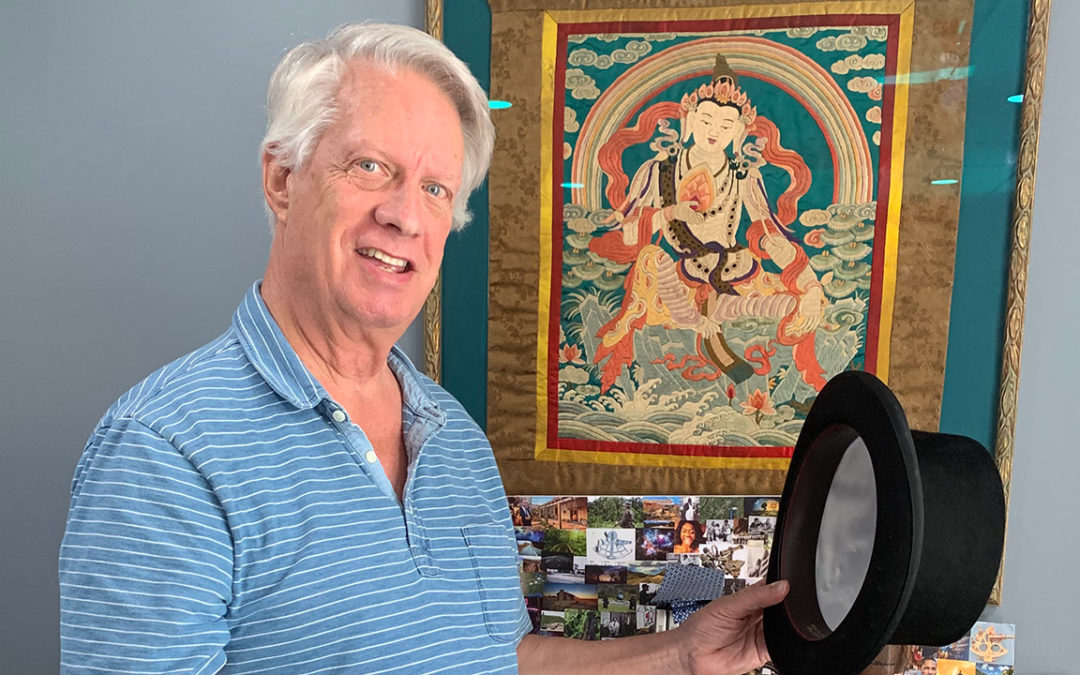
Good Advice, But It Was Too Late for Lear
So his fool tells King Lear: ”Thou shouldst not have been old till thou hadst been wise.”
I am 72 years old today and one step further into my next life. No not the afterlife… the next step and the opportunity of freedom which that entails. As it’s my birthday, I hope you’ll allow me this time to reflect…
I decided to start this blog several years ago to chronicle what would happen to me in retirement. I loved the practice of law, but concluded that there is a time to retire before you get in people’s way and can’t find the bathroom. I wanted to stay a little bit ahead of that curve so I got out early.
I already knew that eccentricity and determination always trumps a loss of intelligence. So this was my chance to be free to try something entirely different, but I still was not free of trepidation. Delusions of grandeur are a wonderful thing until you start to think you might act on them.
Delusions of grandeur are a wonderful thing until you start to think you might act on them. Share on XNonetheless, I first decided I would become a “political force” as a Democrat in an entirely gerrymandered Republican district because I was very concerned about how we, as a country, were being divided by political forces and I was going to change that. This was Trump country. I raised more money than all my Republican opponents combined and knocked on almost 7000 doors for more than a half a year. I was resoundingly defeated and Trump became our president.
Because I obviously had learned nothing about impossibility, next I decided I would become a professional playwright. I bought a Shakespeare coffee mug and applied to the Yale Drama school, fully believing that I would be the oldest applicant ever accepted to Yale’s drama school. I succeeded only in becoming the oldest applicant ever rejected by Yale’s drama school. Nonetheless, I had decided this is what I wanted to do.
Obviously I had to rethink this thing again, with just a little more of my failing intelligence. So I applied to the Commercial Theater Institute (CTI) of New York for a class in producing theater. I had a plan. When the first morning of class broke up the students got lunch and inevitability they talked about what plays they were considering producing. When it came to my turn to talk I informed them I wasn’t considering producing anything. I wanted them to produce me. It worked. The impossible happened. A young producer agreed to read my work, liked it and arranged for professional staged readings in San Francisco and later in New York.
Because I had excelled in something I didn’t want to do and I had completed an introductory class in it, I applied for an advanced class in producing at the prestigious O’Neill Conference in Waterford Connecticut. I got in and there I met Sue Conover Marinello, who produced my play Onaje with great success last year in New York, and Christian De Gré Cardenas of Mind the Art Entertainment who has an amazing history of producing and also writing the music for a number of amazing operettas in New York. Both became friends.
After Sue Conover Marinello’s production of Onaje in New York, Mind the Art commissioned me to write the libretto for an operetta, Vox Populi, a comedy about the seventh deadly sin of pride, for Christian’s music. Last month, Christian and I completed the operetta in San Miguel Mexico.
Because Onaje had done so well, Sue convinced Kevin R. Free, the wonderful NYC director, to read the script. Kevin had fresh and original insights which lead to my reworking the script and his commitment to direct its next production.
The blog has become a happy travelogue. It is a history of mistakes and opportunities. It has taught me that even though I may not succeed in any of this, I’ve lost the fear of failure and each day is more fun than the last. The next step into a new thing is the hardest thing I ever do but it is getting easier with age.
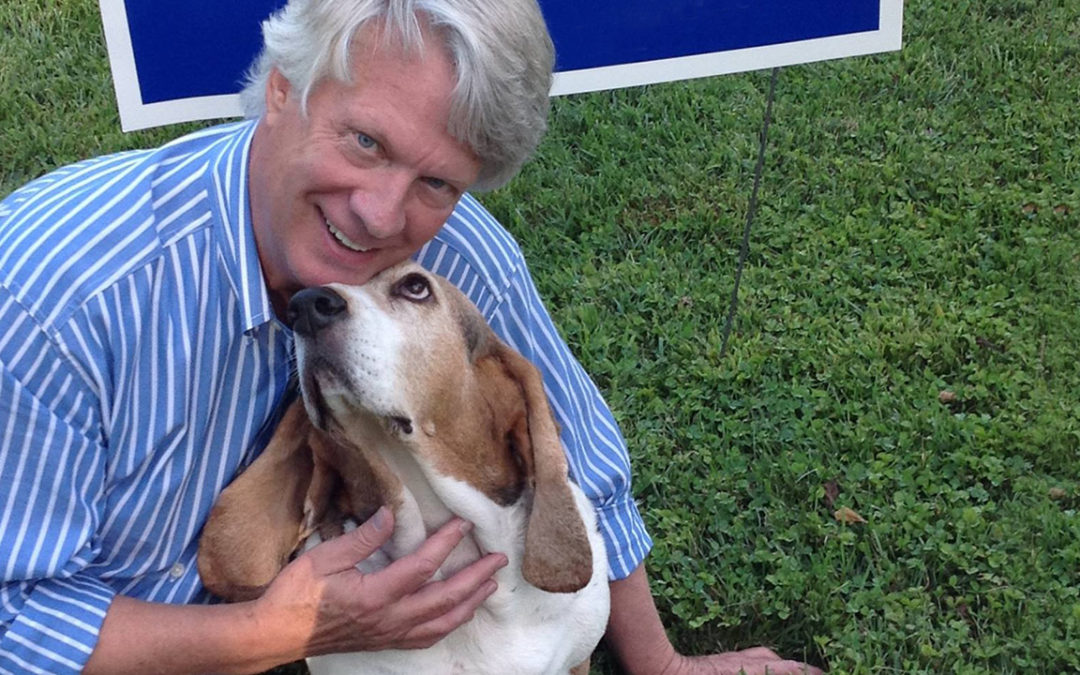
Maybe an Old Dog Can Learn a New Trick… Maybe
I’m trying to teach an old dog a new trick: “patience.” But “impatience” has been one of that old dog’s primary character traits. I am that old dog.
After my play Onaje received its wonderful reviews in New York last October, I was impatient to immediately take it “off-Broadway,” but I was advised because New York is so expensive (The New York Times reported last Sunday that the brilliant and very controversial new Slave Play has spent $3.4 million to get to previews on Broadway) to be patient and watch “good things happen” before the next step.
I was patient and great things happened. Kevin R. Free, the gifted New York director, read the script and was interested but he told me, ”You missed an opportunity.” Dan, Onaje’s father, is African American, and his counterpart, Richard Middleman, Jr.’s father, is white. Both were fellow crabbers and friends down at the docks. Both have been missing their sons because of what happened “that night” so many years ago. What did that do to their friendship? Isn’t that question at the heart of this play?
It was as if Kevin had X-rayed the play and found the missing piece that lifted the play from specific to universal, and I had found a friend and hopefully the dream director who knew the script at least as well as I did and perhaps better. It was the same play but, looked at from a different angle, it was no longer just about Onaje— it had become about “American Terrorists,” the Klan as a destroyer of families.
I immediately started to rewrite so that I could send the new draft to Kevin. He like the rewrite and agreed to direct it in the future, but he wanted to have a table reading of the new script. I, of course, became impatient but I am learning ever so slowly that collaboration offers a kind of maturation and focus.
The play is getting stronger. Kevin’s agent, John Essay, and our producer, Sue Conover Marinello are working together and looking at budgets, venues, and theater opportunities.
The table reading has been set for October. We are off to the birth of a new and much more powerful play that will hit the stage soon but, of course, never soon enough for me. The actors will assemble at the Opera Center on Seventh Avenue in the next few weeks and we will hear a deeper and richer story come to life and I will grow wiser and benefit from learning to become more mature and, patient… Maybe.
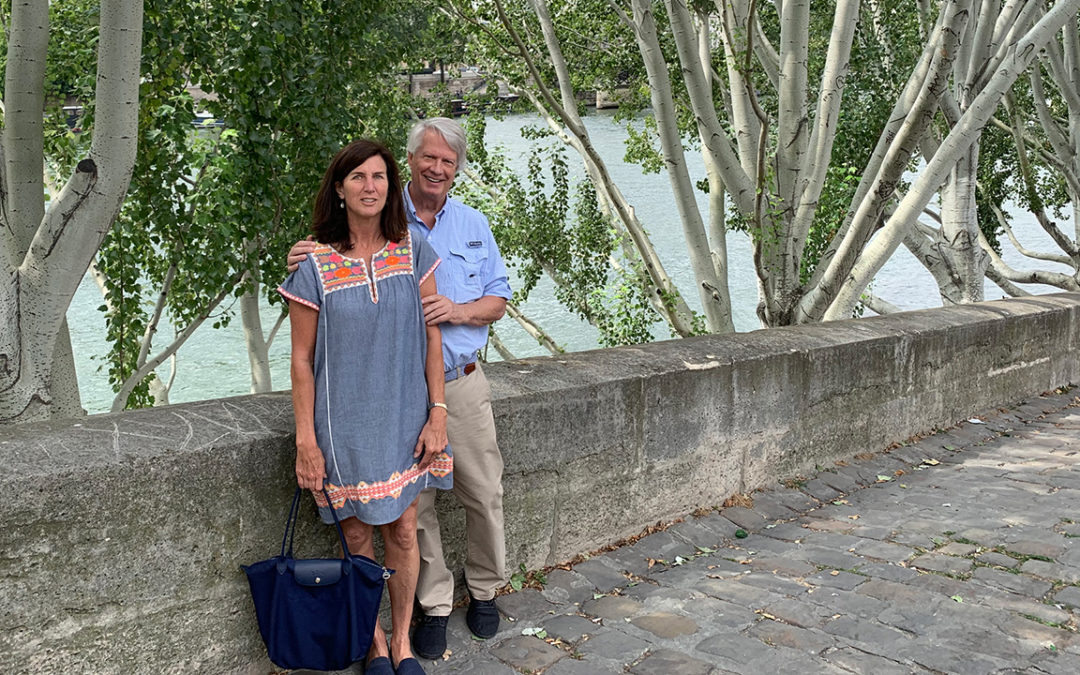
Blessed by My Second Curtain Call
Blessings come in little revelations.
I have thrown myself headlong into my new career as a playwright, but always with the lingering regret that I had not committed to this career sooner. All my new friends in this artistic world are half my age and struggling artists, working, and in many cases raising a family at the same time. I have told people that I have 40 years to make up before I can accomplish what I want to be. I have set up a little office where I write and edit from 9:30 to 4:30. I work hard everyday.
I rarely stop to appreciate the success I have had. Within the last year, I have seen one play extremely successfully performed in NYC, been commissioned to write a libretto for an operetta with the highly acclaimed Christian De Gré Cardenas, and just this month, traveled to Mexico with him, where we finished the operetta. I am very fortunate to be working with an extremely accomplished director and actor, Kevin R. Free, to bring a new and more vibrant Onaje alive in a broader venue in New York City. I have been a man on a mission because of my age and late start.
While I was working on the operetta with Christian in Mexico, he casually mentioned that a mutual friend of ours, Brian, said to him: “You know, Bob has done it right. He made sufficient money so now he is free to work full-time on his art.” That surprised me. I have thought about it and I am not late. I am extremely fortunate to be where I am right now.
I love what I am doing. I have a lifetime of experience to draw from as a writer and a gathering of friends who can help me mature into what I hope to become. I have just finished reworking a new play and am about to send it to my producer, Sue Conover Marinello, for her review and distribution and to Parker Bennett and Katie Marinello for comment and publicity. I have already outlined another play and am researching for another libretto, both of which I will complete before spring.
As I approach my 72nd birthday in September, I am taking a deep breath and realizing that Brian is right. I am unusually fortunate to be able to be living this second Curtain Call. Blessings come in a little revelations.
Now back to work.
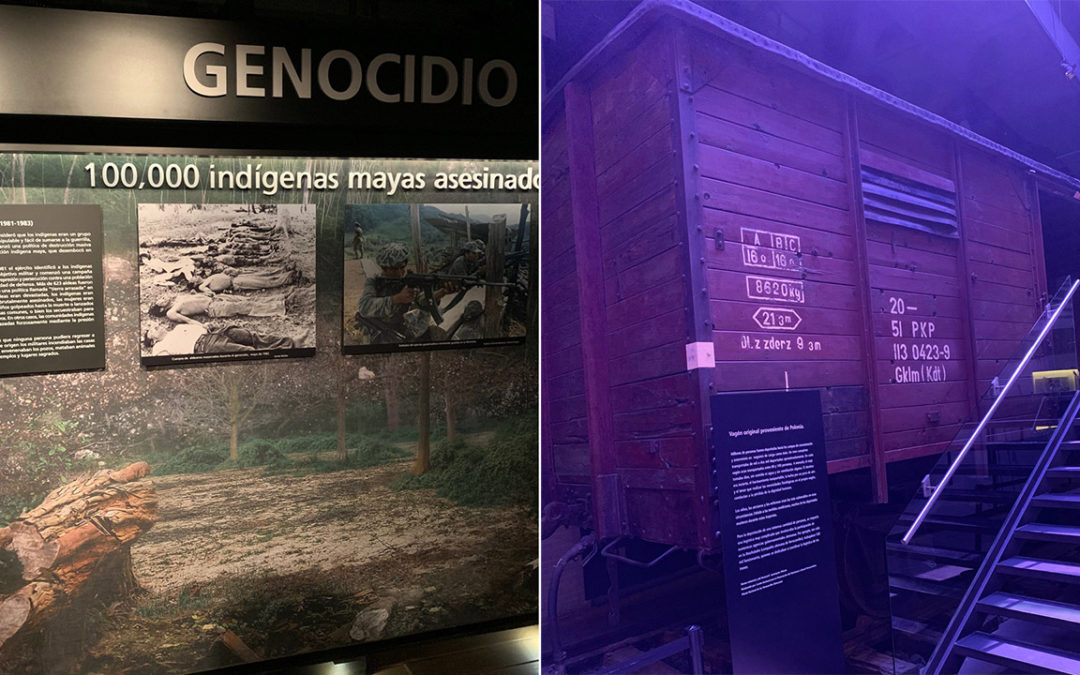
My Rented Rooms
Over the last month I have been traveling. As I would go into a hotel room there was this game I played. I found I couldn’t imagine who had lived there before me. I have played this game before. I have always wondered who were those people who have looked out the same window at the same view?
Yesterday, I stayed in Mexico City for one day with Christian de Gré Cardenas, my friend and collaborator, before flying home. We were celebrating a magnificent week during which we finished the libretto and musical outline for our new comic operetta, Vox Populi (the voice of the people).
Mexico City has more than 180 museums — more than any other city in the world. (Paris, where I was earlier this summer, is second with roughly 140.) Christian and I started our day with an early breakfast, went to different museums all day, finished at 5:45 that evening, and had dinner.
The museums have their own themes but one in particular returned me to my question about imagining the people who have lived in the same hotel rooms as I: Museo Memoria y Tolerancia, The Memory and Tolerance Museum.
Half of it is dedicated to the nightmares of humankind, but the second half is dedicated to tolerance. The first half shows, in painful detail, pictures, films, and the actual objects of genocide during and after WWII: German concentration camps, Rwanda, Sarajevo — it still goes on all around the world every day, forever.
This museum was very focused and shocked me out of my complacency on a subject that I felt I knew relatively well. How is it I only understood these numbers as the amount of times they would have filled a football stadium as a milling crowd or the number of times the population of Baltimore City?
These statistics were always there in The New York Times, The Sun, and The Post as I turn to the entertainment section or the sports page. Yet here, I walked into a small box car that carried people to the camps. I saw footage of the guns going off, the smoke, and the sacrificed falling headlong onto others in a mass grave. There in front of me was the gun that had been fired in the footage.
At dinner, as we talked, Christian read European news article on his phone, which I had missed. It said Michelle Bachelet, UN High Commissioner for Human Rights, had condemned the “undignified and damaging” conditions in which migrants and refugees are being held at the US border. She called for children never to be put in immigration detention or separated from their families. She said she was appalled by the camps, and that several UN human rights bodies had found the detention of migrant children may constitute cruel, inhuman, or degrading treatment, which is banned under international law.
In response, the United States threatened to stop payment of its dues unless it was exempted from the relevant UN provisions.
From the walls of that museum, the eyes looked back at me. It always starts with demonizing a selected group of people. There before my eyes the Propaganda was framed: that paper that had been circulated to the crowds and now was framed on the wall.
It always started with containment “for the public good”. Who are these people that look back at me from a museum exhibit? They must have looked out the windows at the same world I rent now.
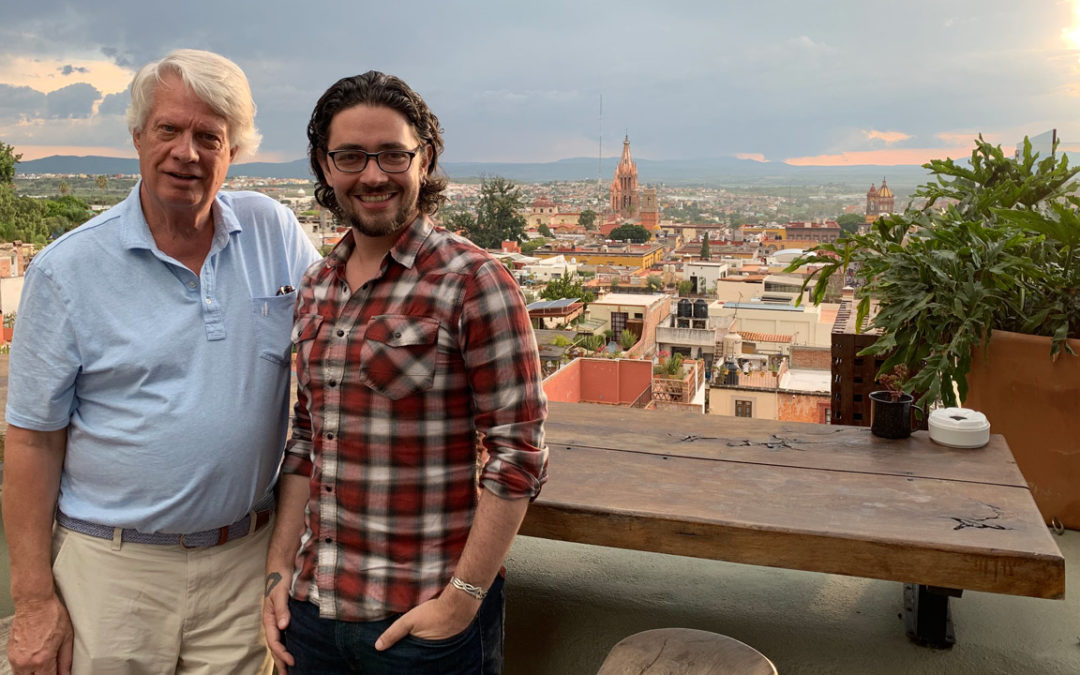
Is This How You Make an Operetta?
Is this how you make an operetta? I swear Christian De Gré Cárdenas and I are only following the charter of our employer, Mind the Art Entertainment, which requires, ”Make Art and Have Fun.”
We are five hours north of Mexico City, holed up in San Miguel de Allende, diligently working over breakfast from 9:30 to 1:30, having a little lunch, perhaps a swim, back to work from 3:30 to 6:30, and then off to the rooftop bars, dinner, local beer, mezcal, and tequila.
This is a beautiful place with deep Mexican history rooted in its independence and, in the last 70 years, the arts. In the winter, American tourists and expats flood in, along with vacationing Europeans. In the summer, far fewer visitors come and generally only for the weekends. They come here to experience the battling mariachi bands around the church plaza, the three-star restaurants at a third of New York and European prices, the stunningly beautiful textiles, art work, and wall art. Here, you walk on cobbled streets older than any in the United States and are surrounded by color.
Christian has had numerous operettas performed in NYC, most recently based on the “seven deadly sins.“ I am honored to have been chosen to write the libretto for the final operetta based on the overarching sin of “pride.”
The first day together, we went over the script I wrote over the last several months, and we just talked about it. The second day, we went to work and went line by line, page by page through the first act. The third day, we worked through the second act and celebrated the harmony of our efforts with a big lunch on a rooftop overlooking the city.
This carrying out of our corporate responsibilities is serious business. Our assignment is to write a bawdy, irreverent “meta” piece (the actors can break character and speak to the audience). It is written in rhyme and hip hop and has a singing dog.
Our first few days have been so productive, we are ahead of schedule. Tomorrow, Christian continues to outline and compose the music while I adjust and continue to shape lines and rhythms. The next several days before we leave, we will shape the two efforts into one operetta and be prepared to have it ready in the fall to be sent out to investors and performance venues.
In the meantime, over the next week, we will continue to carry out our corporate duty.
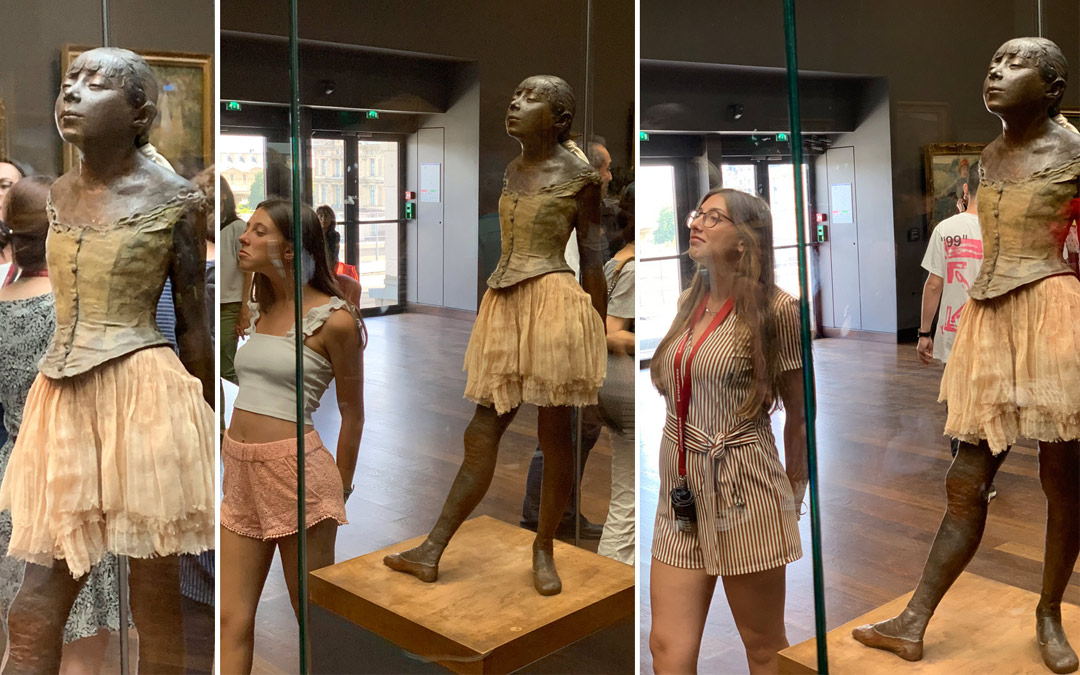
A Way of Knowing
As I turned away from Degas’ statuette of a dancer at the Musee D’Orsay in Paris last week, I almost missed the imitators. The imitators were lining up, looking at the statuette and striking a pose. The reaction was not mocking and somehow not disrespectful. The imitators were reacting to a man-made object created out of his imagination. The interaction is what mattered.
When I was in high school, I read a line from W. H. Auden that said “poetry makes nothing happen.” It stopped me in my tracks. It was the late ’60s. I wanted to do things that made things happen. I became a lawyer. I made things happen.
Now I know I misread the line. Auden was making fun of all those things that appear to make things happen but really don’t. Art makes things happen in that it offers the chance to interact with a created object from another person’s imagination.
But why does that matter? It seems that at the center of our existence we travel a number of years in the mundane pursuit of what we need to survive, but art offers a conversation with another who is, or has been, on that same journey. It offers, but does not demand, this conversation.
In the same gallery, hordes of people were moving from picture to picture, cell phones out, photographing the exhibit as they hurried by. They had not accepted the offer. They were just capturing the object.
The imitators had accepted the offer. They were interacting with the Degas’ statuette.
The conversation can happen in many forums but it is always between the artist and the self. It can come through some or all the senses. It can be theoretical. It can come with an artist’s demand for your attention, as with Andy Warhol asking you to notice common objects, but for me it is always a very personal person-to-person communication.
It can also be environmental. On my way home, I noticed the statues in the park and the park in the city as I walk through. The art of the statue inside the art of the park surrounded by the mundane existence of the traffic and commerce of the city.
I found Auden’s quote:
“For poetry makes nothing happen: it survives
In the valley of its making where executives
Would never want to tamper, flows on south
From ranches of isolation and the busy griefs,
Raw towns that we believe and die in; it survives,
A way of happening, a mouth.”
In Memory of W.B.Yeats
(d. Jan. 1939)
He says all this better than I but I had to learn it for myself.

Redemption and a Big Divot in World History
It is almost impossible to describe the First World War in simple terms. It is unresolved as to how it evolved into the war it became — the number of casualties it caused easily exceeds eight million dead and double that in maimed and wounded — and its end probably was the beginning of the Second World War only twenty years later. Books and books and books continue to be written about it. It is a wellspring of scholarship and a mirror for the future and present.
There are two things it demonstrates to me, however. First, we seem to be incapable of maturing at the same speed as our ability to make weapons evermore capable of our mass destruction. Second, we seem to be able to commit ourselves blindly to use these weapons without realizing the extent of the destruction that we can cause. Both of these observations demonstrate the incredible capacity we have in the form of the “nation state” to destroy ourselves, despite our individual capacity to feel compassion, empathy, and kindness for each other on a daily basis as human beings who are not in a state of war.
Why have I attached a picture of a crater?
WWI introduced airplane warfare, submarine warfare, the machine gun, the tank, and gas warfare. The warfare was so intense that there are specific monuments dedicated to both missing soldiers and unidentifiable body parts.
So, is there something, a simple example from this war, that demonstrates redemption? Yes, I think there is.
Both sides built tunnels for days and months for incredible distances under entire towns and enemy lines to set explosives. Some of these tunnels were only four feet wide and three-and-a-half feet high. The excavation of the dirt was extremely difficult and endlessly time consuming. Imagine the commitment. Imagine the claustrophobia. Imagine the amount of explosives that then had to be carried underground to blow up a town or an enemy stronghold.
As I have said, the picture I have provided is of a crater. It is thirty to forty feet deep and almost a football field wide. The explosion sent debris four thousand feet in the air and killed and injured people who were never found. I took the photograph from the far side. There is a monument on the other side which, if you look closely, is a cross that is several stories high.
In the alternative, it has been documented that during a one-day armistice for Christmas the soldiers from both sides came out over their trenches, exchanged chocolate and cigarettes, and sang Christmas carols together.
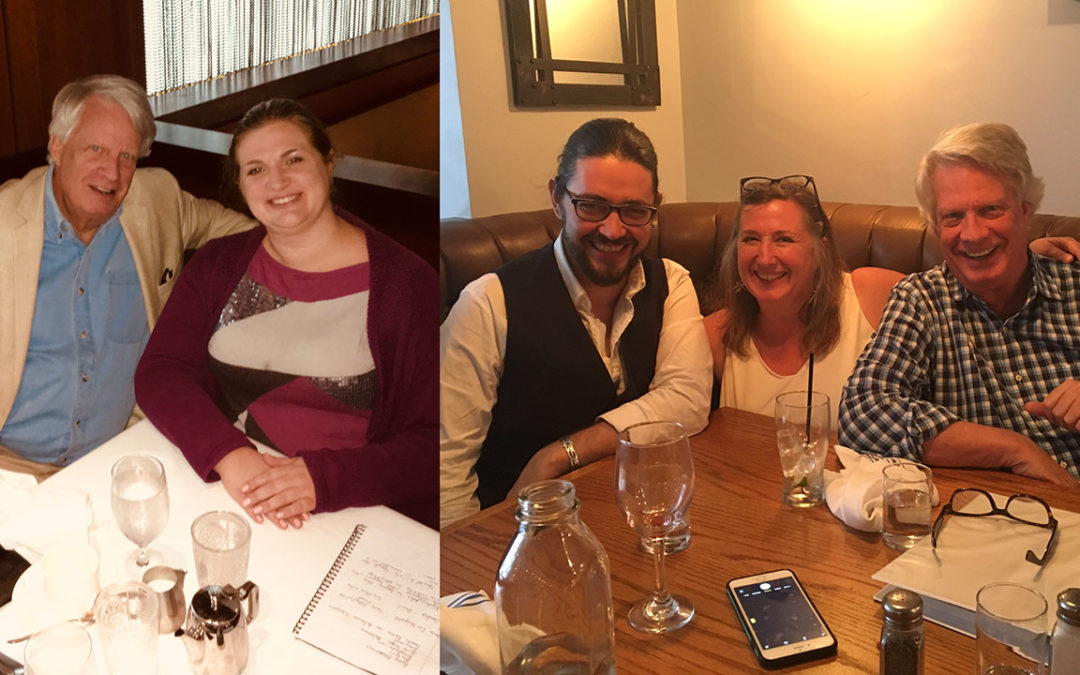
Continuing to Build
Onaje is moving up the ladder in New York.
It is funny how you take a new path and learn the same lesson. Trusted friends, credibility, and hard work were everything in creating my law firm almost 30 years ago and now I learn the same is true in the world of New York theater.
When I sold my controlling interest in my law firm I had decided that I wanted to be equally as successful as a playwright. The problem was I had to make up for 40 years of lost time. I decided I would become the oldest playwright ever to apply to Yale Drama school. I succeeded in being the oldest playwright ever to be rejected by Yale Drama school.
So with my objective still firmly in mind, I decided I would have to change my approach. I took a class at the Commercial Theater Institute in New York, not in playwriting, but in producing. After the first morning, the students gathered outside and shared conversation during a brown bag lunch. As they went around the circle, they all talked about plays they were hoping to produce. When it came to me, I confessed I did not want to be a producer. I wanted them to produce me. I got a laugh and two offers which led to staged readings in San Francisco, NYC, and Los Angeles and I made new friends.
One, Parker Bennett of Aligned Online, signed on to teach me how to create and manage my new website. Following the precedent set with Yale, I proved myself to be an unworthy student, but Parker became a trusted friend, took over the website, and became my guru on all things pertaining to script writing and the business generally, since he is an accomplished writer in his own right.
The following summer I continued on my path and was admitted into the Producers’ Class at the O’Neill Festival in Connecticut and there I met Sue Conover Marinello, the future producer of Onaje at FringeNYC and Christian De Gré Cardenas, who would become an indispensable ally at FringeNYC and ultimately the composer for “The Voice of the People,“ after I was asked to write the libretto by Mind the Art Entertainment.
Sue, Christian, Parker, and now Katie Marinello — who is handling our presence on Instagram and Twitter — have all become indispensable trusted friends.
When Onaje was chosen to be performed at FringeNYC, Sue Conover Marinello asked Kevin R Free, the highly respected NYC director, to direct. He read the script, but had a scheduling conflict and was unable to join us at FringeNYC.
During the pre-rehearsal and rehearsal stages leading up to the performances, Onaje was lovingly shaped and focused with the ideas of additional friends: the actors, director, stage manager, and others. It opened to sold-out performances and rave reviews, largely due to the tireless work of Sue Conover Marinello as its producer.
Sue decided that she wanted to take Onaje up the ladder in New York and elsewhere. She wanted Kevin R Free.
She took me to see several 10-minute plays directed by Kevin for Kelly Girod, the Obie winner and manager of The Fire This Time Theatre Festival. Based on the successes in New York, Sue took the script to Kevin’s agent, John Essay, again. By coincidence, John had seen the reviews of Onaje and asked that Kevin revisit the play.
The path is always different but the results are always the same. When we all met each other for the first time during a Zoom conference call about a month and a half later, Kevin had fresh ideas that highlighted missed opportunities in the script. He had X-rayed it and knew the bone structure perfectly. I joked with him that it was almost as if he had a lawnchair in my brain.
The same lesson is re-learned: trusted friends, credibility, and hard work make the apparently impossible dream happen. I’m so excited to be reaching for the next rung of the ladder.
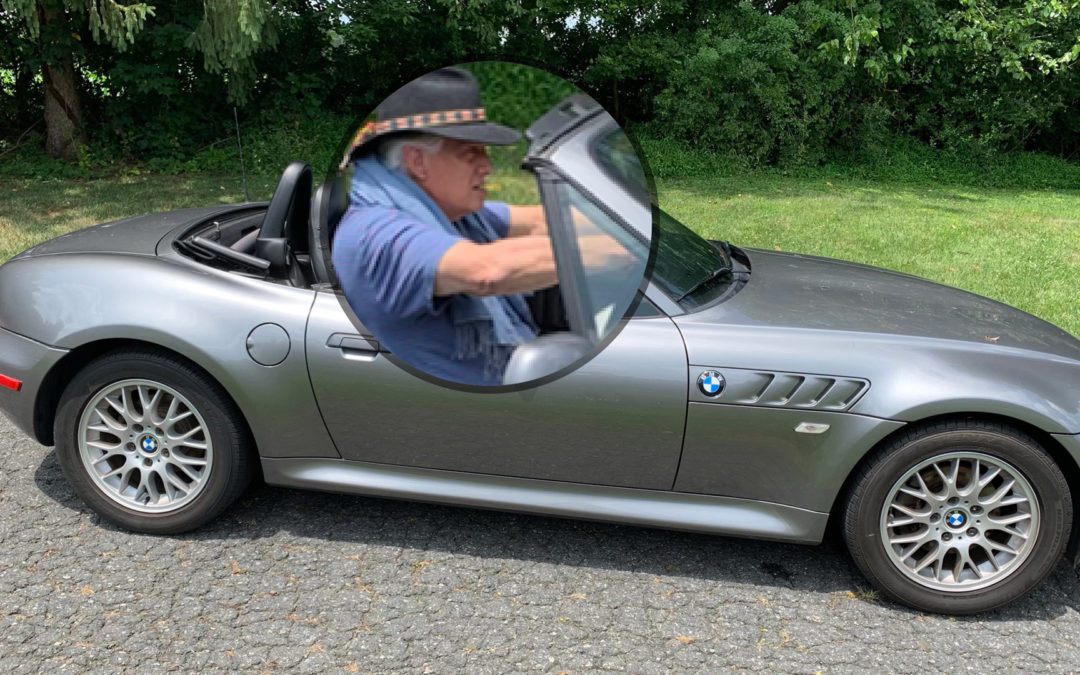
Old Man Driving a Roller Skate
As a lawyer I was your advocate, but now as a Poet my job is to help you see all things differently. For example:
I have a silver gray antique BMW Z3 convertible. It looks like a ridiculous self important go-cart. It has five gears and a stick shift. It is loud. It is very low to the ground and only my head sticks out of the top.
When I drive this car I am publicly on display as a self-confessed idiot. Sort of a clown. Young boys with fresh learner’s permits pull up to me at stop lights, rev their engines, and laugh at me. I should be embarrassed.
But if I tell you, “I know I look like an old man driving a roller skate…” you laugh — but once you’ve imagined me in this car, you look at the car and the old man differently. It may be funny or it may be sad, but as a poet I have that ability to make you see things differently .
It is the ability to break the mold that we all live in and take for granted, again and again and again. The cement truck pours and we instantly take for granted that hardening cement and live with those forms forever. Poetry has the ability to break what is permanent and make it new by presenting it differently.
When I write a poem or a play I am asking you to hear my voice, look through my eyes, and see the “flash” vision that I create out of what we live in and take for granted together. I am driving the same roads, obeying the same traffic lights, and stalled in the same rush-hour traffic as you are. I’m using the same language and your words but I am aware of the sound of the words and the rhythm of our shared language in order to create that “flash” of the vision I want to create: “The old man driving a roller skate.”
That is the poet’s work. I must jackhammer out of existence something you have seen in your imagination, perhaps forever.
Let me give you two “flash” examples. Two quick comic examples from the best Poet of the English language: Shakespeare describes a drunkard who is upchucking on the street as, “Speaking with a full flowing stomach,“ or snidely describes a couple in an illicit affair as, ”being a beast with two backs.” In a “flash,” he can help you imagine what you expect, differently.
The job of the Poet is to bring you back to before the cement truck came into your life.
Poetry has the ability to break what is permanent and make it new by presenting it differently. Share on X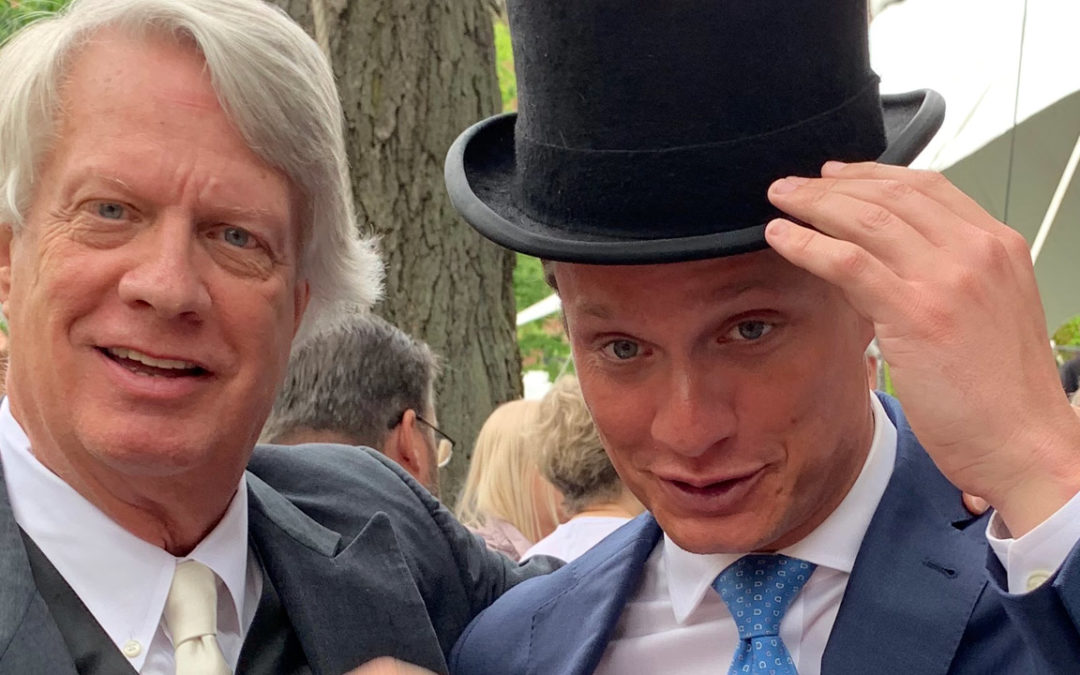
Accidental Cement Truck
For me, the “future” is like a churning cement truck going to a job. The “present” is the dump of the watery mixture and its slow and permanent hardening. The “past” are the hardened roads I travel on again and again and again. Only the gift of “accident” can break apart all three and only with “creativity” do I become released and reborn to grow into a maturing perspective.
Over the last six years, I have been chosen to help The Alumni Association at Harvard put on graduation. I look forward to this and accept with pleasure each year when it is offered. I dress up in a silly top hat and tails to escort the honorary degree recipients and their families at Harvard’s graduation. It is an unusual and informative experience.
Rick, my son, and I are very close. After graduating from Dickinson College, his high school asked him to return to Baltimore to teach and help coach their football program. During these years Rick continued his commitment to education by getting a Master’s Degree from the night school at Johns Hopkins University, which allowed him only one night a week free. During these years Rick and I had dinner together every Monday night.
Rick has always been a very kind and socially conscious person. Rick also has an encyclopedic understanding of football and its rules and strategy. Because there is a deep divide in the opportunities provided in our city, after several years of teaching and coaching at his private high school, Rick elected to join his former head coach and teach at Saint Frances Academy in downtown Baltimore.
The year before Rick joined this school, it had only won one game. The next year, they were undefeated. The following year, they were ranked fourth in the nation.
All of the students on the football team went on to established and respected universities with mostly full scholarships. Rick told me several times that they were the most committed group of young men he had ever met. The school is located in the shadow of the penitentiary.
Rick continued his commitment to both education and football by accepting a graduate assistant position at the University of West Virginia, then followed his coach to the University of Houston. The last two years he has been working 24/7 as a GA for University of Houston’s football team and I never see him anymore.
So those are my hardened roads leading up to this year’s Harvard graduation. Here comes the cement truck: The week before my graduation duties this year, Rick called and said he had a free week. I wanted to see him desperately but I had made my commitment months ago. I asked him, “Do you want to come to Boston?” I couldn’t think of anything more boring for him but he said, “Sure.”
Was this a disaster about to happen or was this a gift of an accident? Rick would not know anybody…
We did everything together. A wonderful lunch with Rick and Lindsey Shepro and John Bowman at B&G oysters (Boston’s best oysters), and a dinner after graduation with Sam and Wendy Plimpton at No.9 Park (Boston’s best restaurant).

It is not easy to be shocked as you watch your child become, before your eyes, more sophisticated than you are. My old friends became his new friends almost instantly. And then we slipped back to our welcome past and beer and a Bruins game on TV and a Red Sox game at Fenway… and a stunning and subtle speech by Angela Merkel in the afternoon of graduation.
So often now, as I become older and easily set in my ways, I look for the gift of the “accident.” It breaks my safe world apart. From broken expectations comes the unexpected rebirth.
So often now, as I become older and easily set in my ways, I look for the gift of the “accident.” It breaks my safe world apart. From broken expectations comes the unexpected rebirth. Share on X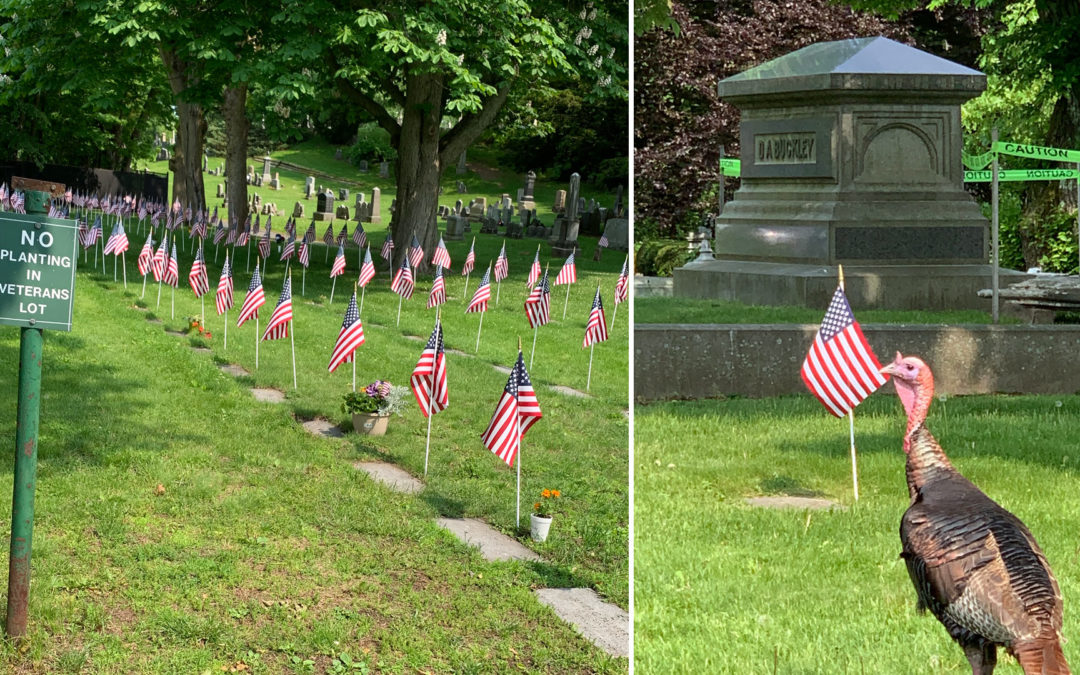
Elizabeth Bishop, Cemeteries, and Contrast as Creativity
I’m extremely fortunate to have had a class with Elizabeth Bishop, who was one of our great, late 20th Century poets. She taught us that any two poems, no matter where they are from, when placed side-by-side will cause an unintended contrast that will illuminate both. Once grasped, this is an eye-opening idea with endless potentiality for creative thought.
I grew up between two schools, two cemeteries, and Harvard Square. The Cambridge cemetery was relatively flat, had few trees, was wide open, and pretty much existed to hold the military dead of foreign wars and the citizens of that city. In contrast, behind the impenetrable black iron fence and gate of Mount Auburn Cemetery, spread a small and elite universe of acres of hills and valleys with shaded walkways and still ponds, as an arboretum of carefully preserved trees and as an aviary for local and migrating birds. These two cemeteries existed side by side divided only by a single two lane road.
As children we would freely ride our bikes among the military dead in the Cambridge cemetery but we were strictly prohibited from even entering Mount Auburn. It wasn’t a place designed for us. However, when the gates were open adults were permitted to walk among the graves and in its verdant splendor. Mount Auburn rested like a shared understanding of what a patrician heaven might be while the Cambridge Cemetery was a plebeian limbo.
When I visited after last Memorial day the Cambridge cemetery had rows and rows of flags. One at each grave. No one was there except a lone bagpiper striding along one of the empty roads. Unexpectedly, I could find only one flag in all of Mount Auburn and it was guarded by a wild turkey that had become domesticated by the place. There was a quiet urgency as groups of horticulturalists or birdwatchers clustered as they whispered observations to each other.
Miss Bishop, as she called herself, was right. The accident of the unintended contrasts caused by my time and location that day opened up worlds for me about the two cemeteries, about the living generation and the predeceased, as I walked between the four.
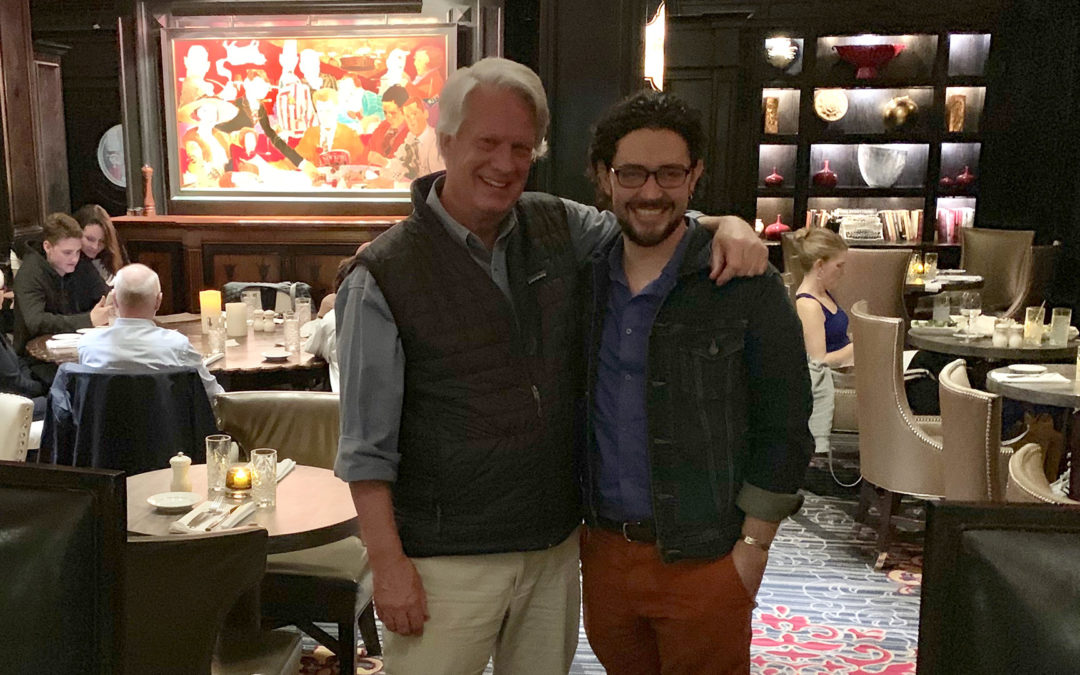
Our Operetta is Happening!
After 80 pages of wonderful foolishness, rhymes & hip-hop, we are on track for operetta submissions by September 1st. Christian De Gré Cardenas and I have set August 10–17 to retreat to Mexico to complete The Voice of the People, our operetta about the seventh of the Seven Deadly Sins — pride.
Is it wrong to say I’m proud?
Last Friday, Patrick Alberty, Christian and I met to go over my most recent draft and we are all excited and happy about our progress. Our target is to have a commitment and opening next spring or summer.
For Harvard Magazine
Last week I presented my ode for the Harvard Alumni Association to keep them laughing. As the Poet Laureate, I love doing this every year. This year, the subject was Harvard Magazine, and my ex-father-in-law, both of which I love.
For Harvard Magazine
(Portrait of Gentleman Jim)
By Robert R. Bowie, Jr. Ab’73
Whenever I became too confident
Of my perfect Harvard education
My ex-father-in-law, concomitant,
Was there to deliver expiation.
His timing was perfect. He’d watch and wait.
He’d set me up and then he’d set me straight.
Let me describe this kind and gentle man:
In profile he was blessed with a perfect
Semi-circular belly and no can.
Perfect as a backlit window silhouette:
A photo I still love and regret.
A photo my ex-wife wouldn’t forget.
A small piece of a small, but sad divorce.
He has ‘passed on’ but I miss the man.
Comfortable with himself. Steady. On course.
Leaning back with a scotch glass in his hand,
“I sell seeds and satisfy farmers’ needs,
Go to church, plant the garden, pull the weeds.”
Every Easter the two of us would go
Outside to smoke illegal Cuban cigars.
He’d get me to tell him what he should know.
He’d always wait until I’d gone too far.
He’d lean back: “Ahh, hoist by your own petard?”
Flick off his ash and say “Harvard-smavard.”
They’re all gone now, his wife, mine and him.
But still up until the very end
I would package and carry up to him
All my old Harvard Magazines and then
He always put them there in the same place,
Next to the kindling and fireplace.
I drove up a month or so before he died.
He so deeply missed his loving wife.
The reconciliations I had tried
Had failed. Love was leaking out of his life.
The door unlocked, sleeping in his chair
With a Harvard Magazine spread out there
Heaving on his perfect snoring belly,
What a perfect find was all of this?
There was food in the ice box from the deli.
I found whiskey and two glasses. I kissed
Him and asked “What’s this you’re reading you fool?”
With a cagey smile: “It ain’t that bad a school.”
Copyright © 2019

Teaching Law Through Playwriting
Several years ago Professor Mike Millemann, on the left, contacted me to see if I wanted to help him fulfill a grant made to the University of Maryland Cary School of Law to teach law differently by using the theater.
We signed up Elliot Rauh, of Single Carrot Theatre and decided the class should write plays about prisoners who had been released from prison after they had been determined to be absolutely innocent after years of incarceration. One of those plays was about Michael Austin, at the center, who was imprisoned in Maryland for over 27 years for a murder he did not commit. He was freed through the brilliant legal work of Larry Nathans, Esq., of Nathans & Biddle.
Last week we got together again at Lexington Market in downtown Baltimore as a reunion of old friends to help Michael because Michael had just found out that due to a typo in his arrest record he was never exonerated and that has kept him from getting work. This will be resolved but the reunion between friends nonetheless was wonderful.
In Michael’s case, and in most of the cases that we turned into plays, the process was remarkably similar. On the first day of class we brought Michael in to meet the class and answer questions. He was calm, collected, and despite the injustice of his incarceration not angry but very wise. In prison he had perfected himself and along the way he had become quite a remarkable musician.
Throughout the following weeks of the semester, the first third of the class was used to do deep research on what went wrong and what led to his conviction. The class went through trial transcripts, records of an incompetent defense lawyer, and files of prosecutors that withheld evidence and a transcript recording of the judge that sentenced an innocent man to life in prison.
The second third of the class the students wrote the backstory, and in the third and final part of the class, Elliot Rauh taught acting and turned inexperienced law students into the actors of their own play which was performed before the law school.
Michael stayed with the class from the beginning. One of the students said that he should provide music for the play and he agreed. Another one of the students suggested that at the end of the play, Michael should leave his instruments behind and identify himself as the Michael Austin about whom the play was written. The audience gasped and some wept.
At first I thought this class might have limited value so we asked that the students provide a one minute clip to the people who had provided us the grant to state whether they thought the grant money had been used appropriately. I became convinced when one student faced the camera and said “I wrote the part of a defense lawyer who was unprepared, acted the part of the prosecutor who withheld the time card that would have exonerated him, and read the exact words 30 years ago when an innocent man was pronounced guilty by a state court judge in the circuit court of Baltimore city and sentenced to life and I have never been in a courtroom.”
At that point we were convinced that the class worked. People were learning from mistakes made before they were fatal. We taught the class for seven years and it was ranked as one of the most appreciated classes at the law school during that time.

The Dream Continues
As I wrote last week, my day job now is to write a “bawdy libretto” for an operetta about the seventh deadly sin: pride. It will be performed in NYC (and hopefully elsewhere) next year. I now have three plays in the works. One was produced in New York last October and remains in development for future professional productions. One I have reworked and is now as fresh as spring time and ready to be sent out. And one I killed by overwriting, but it is on the autopsy table for study.
Right now the future is the libretto for a bawdy operetta. This is what I’ve learned so far:
My bosses and co-collaborators are Christian and Patrick, the founders of Mind the Art Entertainment. Their six previous operettas about the six other deadly sins have either been performed in New York or are in development for performance. This thing is going to happen, baby! These guys are real, and real talented.
But this is what they have taught me: collaboration. They are amazing. They told me to write a libretto. They said they needed 10 songs in the first act and eight songs in the second act. There would be eight actors performing over 35 rolls, it would be entirely sung and it would be a bawdy comedy. Once I wrote the libretto Christian would put music to it. But I had never really understood artistic collaboration before. I kept going to them and saying “is this what you want?” “Is this what you want?” And I kept getting the answer: “Write the libretto you want to write! Make it your voice. Make it your story.”
“How about if it’s totally rhymed?” “How about if I try and do hip-hop?” “How about if I have a singing dog?”
Last Friday I met Patrick at the Opera Center in New York and we were scheduled to work through the first draft that I had provided. It was a corner room with wood floors and perfect acoustics. The sunlight came in through the seventh floor windows. We worked at a central table in the middle of a room, which was much larger than we needed.
I started with my same stubborn questionings: “Is this what you want?” Patrick, almost with an air of irritation, said again: “Write the story that you want. Tell the story that you want. We will collaborate. We will collaborate.” And we did for the rest of that day.
He knew the first draft as if he had written it and just offered ideas for consideration. They were amazing and creative beyond my wildest expectations. I had expected head-banging. I got laughter and collaboration instead. Later on the next night Christian and I went out to dinner at the Algonquin Hotel, the historic home of the round table and Dorothy Parker, and he leaned over and laughed and said, I can write to your words. The rhythms makes sense. And we both laughed. I asked for his thoughts and because I had not brought paper I took notes on both sides of a bar napkin and carefully folded it and put it in my wallet before we left to say good night.
I am now halfway through April and deep into the second draft. This is more fun than I could ever have imagined.
As we closed the bar late that night, Christian said: “Our job is to create art and have fun.”
Thanks to Christian and Patrick, I’m learning that.
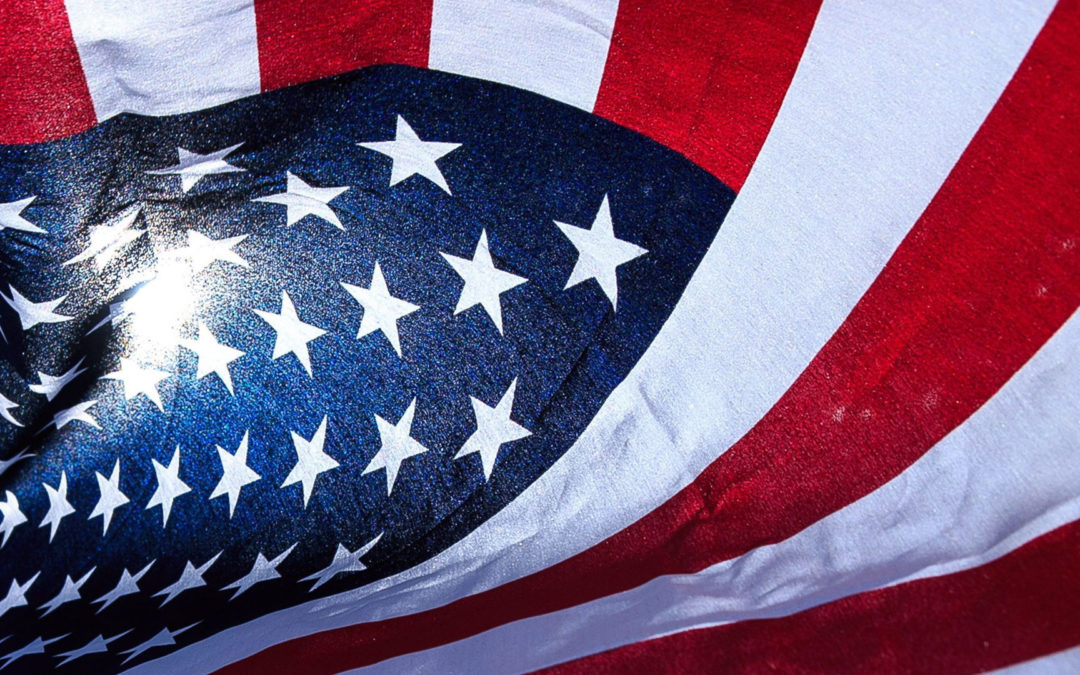
Let’s Agree on One Thing
Let’s agree on one thing.
We are Americans.
We are not two polarized political parties. We must never forget that. We are Americans. We agree?
In light of our agreement let’s take a fresh look at: 1) gerrymandering and 2) the Mueller report.
First let’s look at gerrymandering. Politicians should not be able to reelect themselves by defining their districts. They are our employees. Our taxes pay their salaries and lavish benefits ( but that’s another story). Whoever heard of dividing a country to secure your own job?
The Supreme Court has once again an opportunity to address redistricting and gerrymandering. This issue is so much greater than any single provision in the Constitution. It is at the very bedrock of our republic/democracy. Very early on the Supreme Court recognized “the right to travel between the states” or “Constitutional judicial review” that are not in the language of our Constitution but are at the bedrock of our government. We are Americans.
Second, let’s look at the Mueller report. It is absurd to define the question as “collusion“ or “conspiracy.” There is no doubt that the Trump presidential campaign and the Russian government both wanted to see Trump elected. Two horses pulling the same wagon don’t have to “conspire” or “collude” to make the wagon move forward, if it is in each horse’s interest to move in the same direction.
The question is, should the Russian horse be pulling the wagon at all. I think every American would agree we do not want a foreign government involved in any way in our elections and in any way affect our choice of leaders. The Mueller report misses the point. Who cares about “collusion” or “conspiracy”? That’s not the issue. The issue is that no foreign government should intervene in our democracy in any way. We are Americans.
There are two things I learned as a lawyer: 1) if you let me define the issue I will always win the argument, and 2) once you make up your mind any reason will do.
As Americans I think we have let others who do not have our interests at heart define our issues.
I think all Americans would agree that they do not think it is appropriate for their elected officials or political parties to secure their jobs at our county’s expense.
I think all Americans would agree that it is inappropriate for a foreign government to affect our elections in any way.
Polarization can create this kind of chaos. As Americans we have prospered because we have always trusted each other to talk, and then compromise. How did we lose this? That is our genius.
Rise up! We are better than this. We are Americans.
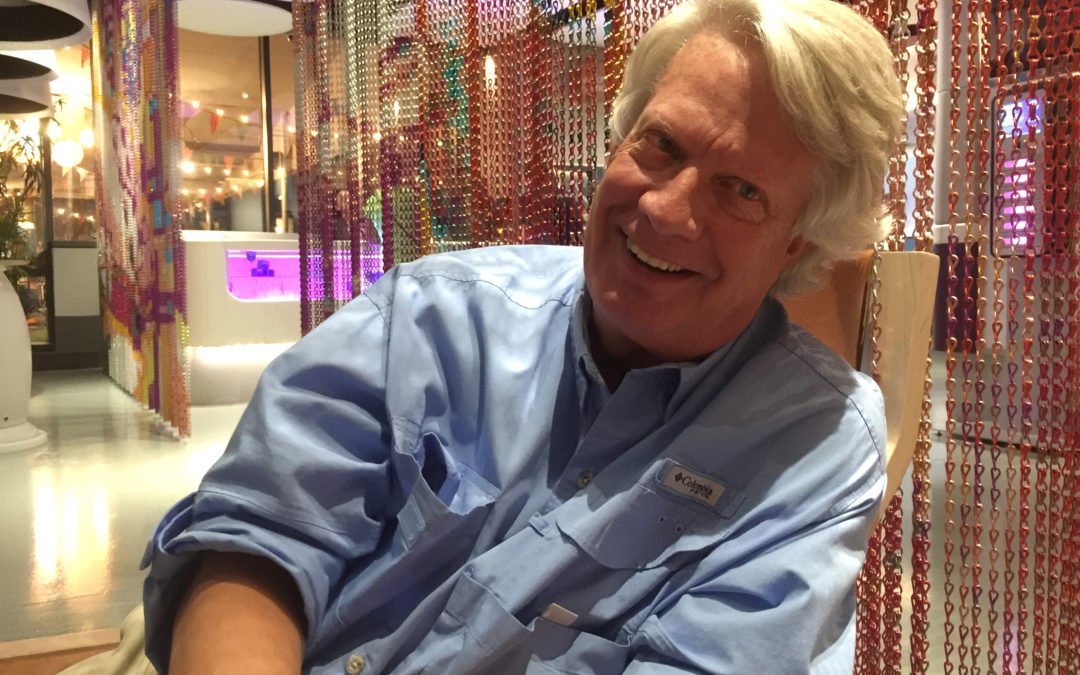
The Impossible Dream Continues
The impossible dream continues and maybe even is gathering steam.
Sue Marinello, Onaje’s producer and her ever-talented daughter Katie, are marketing Onaje after its spectacular reception at the New York Fringe festival in October. During the preparation for Onaje’s opening and throughout the production and thereafter, I have made many friends who have taught me in a way that only talented and experienced people can.
After the close of the show I was invited to write a libretto and help co-write the book for an operetta produced by Mind The Art entertainment for Christian De Gré, the super talented composer of, and producer of numerous successful operettas and musical pieces in New York.
I am finishing the first draft by the end of March and then going over what I have written with Patrick Alberty, the co-writer of the book and Christian in April, and then going to Mexico for a week with this team to put Vox Populi, “the voice of the people,“ based on the seventh deadly sin of pride, into a final format for marketing and production.
I have almost finished the first draft already and I’m optimistic and full of joy at the future prospects of this and other pieces I am working on. Though I loved the service to others that I was blessed to be able to do as a business lawyer, this life after law is truly a dream I have always had come true.
I will keep this blog alive and track my progress by it.
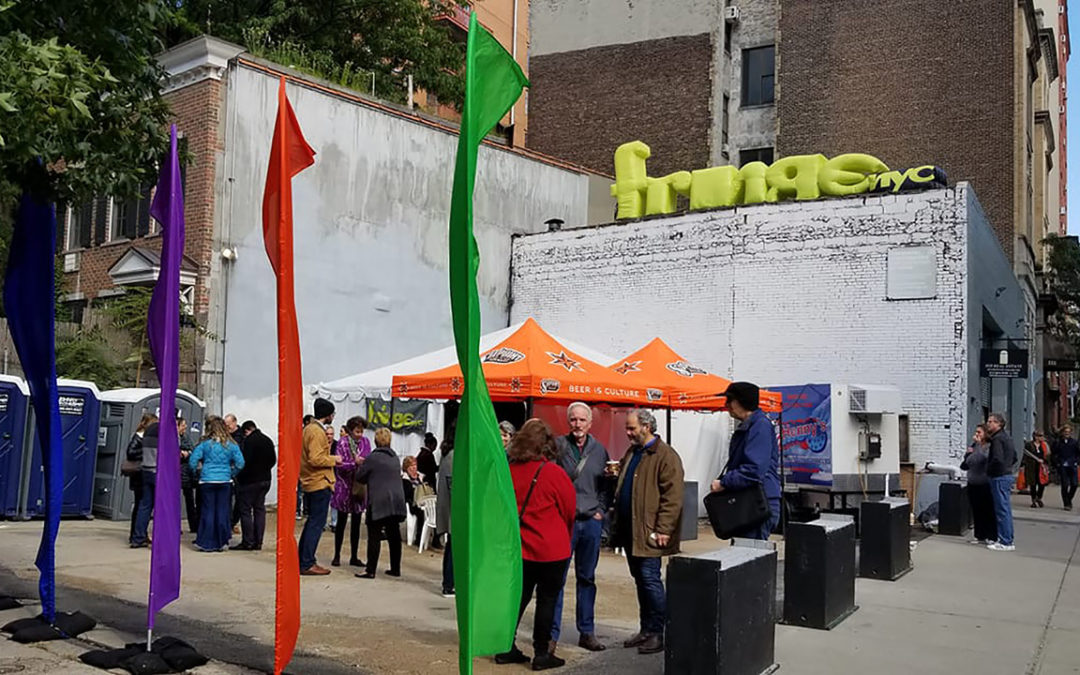
The View from the Back
In the West Village of New York City, on October 13th at 7:00 in the evening, ONAJE opened as my first professionally produced play. I sat in the back, in a balcony with lights and sound equipment around me and watched the audience file in and take their seats. I gave the appearance of being calm but I was terrified.
I have been to opening nights for nine of my prior plays in the little theaters of Baltimore and I have learned there is an immediate courtship: the call offered by the actors at the beginning of the play and the audience’s response. You can feel it. It is confirmed with the first laugh but the commitment can also be felt in the early silence.
As the play unfolds, from the back of the theater, you can watch for physical movement, restless disengagement as evidence of the loss of commitment to a play. It can become contagious in the dead silence and then nothing can resurrect the play. Once you lose them, there is no getting them back.
My friends, the composer Christian De Gré and our producer Susan Conover Marinello, and I had been fortunate to have Tom Viertel as our dinner guest three weeks before we opened. Based on years of experience as a renowned Broadway producer, the founder of the Commercial Theater Institute, and director of the O’Neill, he told us a “no-intermission play cannot run more than 93 minutes” without the high risk it will lose its audience. There was no doubt in his voice. We took his advice. We knew he was right. I went to work cutting lines and shaping the script with four script reductions.
Opening night at FringeNYC was to be judged by a sold-out crowd as they rendered their verdict first in the dance of commitment as the play got underway and then after 90 minutes by the way they moved in their seats.
For me, knowing every line and the slightest modulations in an actor’s voice, the experience was, of course, different than an audience seeing it for the first time. The audience will be engaged until they’re not. The only measurement that is credible is how the theater feels and how the shadows in the seats sit engaged or start to move. That is the only language.
I could feel this audience’s early engagement and commitment to the play and surprisingly when I did, I started to daydream about the genesis of this project:
I am the oldest son. The oldest son of the oldest son of the oldest son, all of whom have been well-respected and distinguished lawyers, professors, and public servants. Although my father supported my love of storytelling, bringing me hand puppets from his travels and building me a little puppet theater so I could perform for my seventh- and eighth-grade classmates, there was no doubt my next step was to carry on the family profession of law.
While I dreamed of writing plays, I grew to love being a business trial lawyer. Before my father died several years ago, while I took care of him during his final years, he quite casually one afternoon looked at me and said, “I am very proud of what you have accomplished. I could never have started a law firm and succeeded in the way you have.”
Almost accidentally, he had released me to change my avocation to my profession. I soon retired and made a full commitment to become a professional playwright.
Opening night at FringeNYC was for me, unconsciously, like a flock of carrier pigeons released well over fifty years ago coming in to roost.
The last seven pages of the play runs 12 minutes to conclusion. I leaned over the rail and listened for the quality of the silence and looked down on an audience that did not move. They were engaged after 96 minutes, three minutes longer than Tom’s ultimatum. We had pushed the envelope but still survived.
The lights came down and there was a moment of silence, and as the actors came to their curtain call they were met by increasing and sustained applause. As the theater emptied out I saw many of my friends, some of whom had traveled from as far as California and Canada, as they walked to the stairs to exit past my door from the balcony.
I was not conscious at the time, even after I was welcomed by the audience and my friends, that like the characters I had written in ONAJE, after a long journey, I had finally come home.
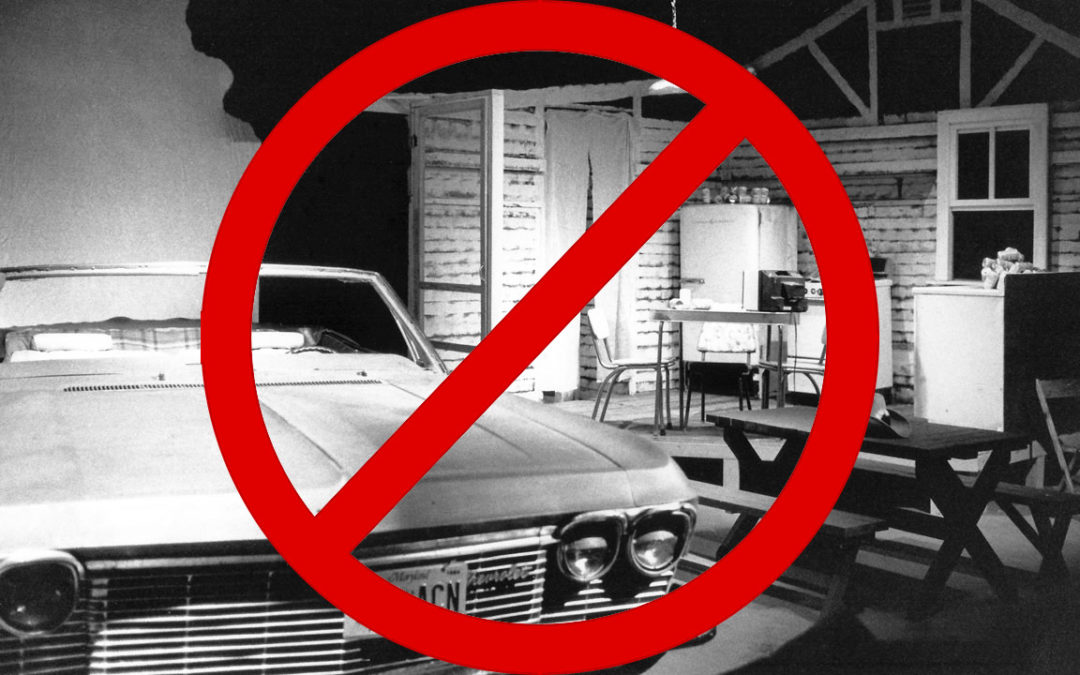
From the Page to the Stage at FringeNYC
The beauty of FringeNYC is that it demands creativity from the start at every level.
By way of example, I want to introduce you to the creativity and resourcefulness of our director, Pat Golden, and producer, Sue Conover Marinello.
ONAJE has set directions that specify a convertible with working lights, horn, and doors, a picnic table that might weigh several hundred pounds, and a working kitchen in a waterman’s house next to the Chesapeake Bay on the Eastern Shore of Maryland.
FringeNYC is similar to a film festival in that a new performance goes up in the same space with only half an hour in between. Each play is given 15 minutes to set up and 15 minutes to break down the set. Obviously, we cannot assemble and deconstruct and store a set that contains a car, a big picnic table, and a kitchen in 15 minutes!
Nonetheless, ONAJE’s creative team is embracing the challenges as an opportunity to increase the impact of an already dramatic play — using light and sound and imaginative props to create a set that will be constructed in the minds of the audience.
Their ideas are already better than what was originally called for in the script.
Come see for yourself this October! We should know our venue and performance dates soon. If you’d like to secure advance tickets you can do so by helping us with a contribution: https://theplayonaje.com/contribute.
ONAJE’s creative team is embracing the challenges as an opportunity to increase the impact of an already dramatic play — using light and sound and imaginative props to create a set that will be constructed in the minds of the audience. Share on X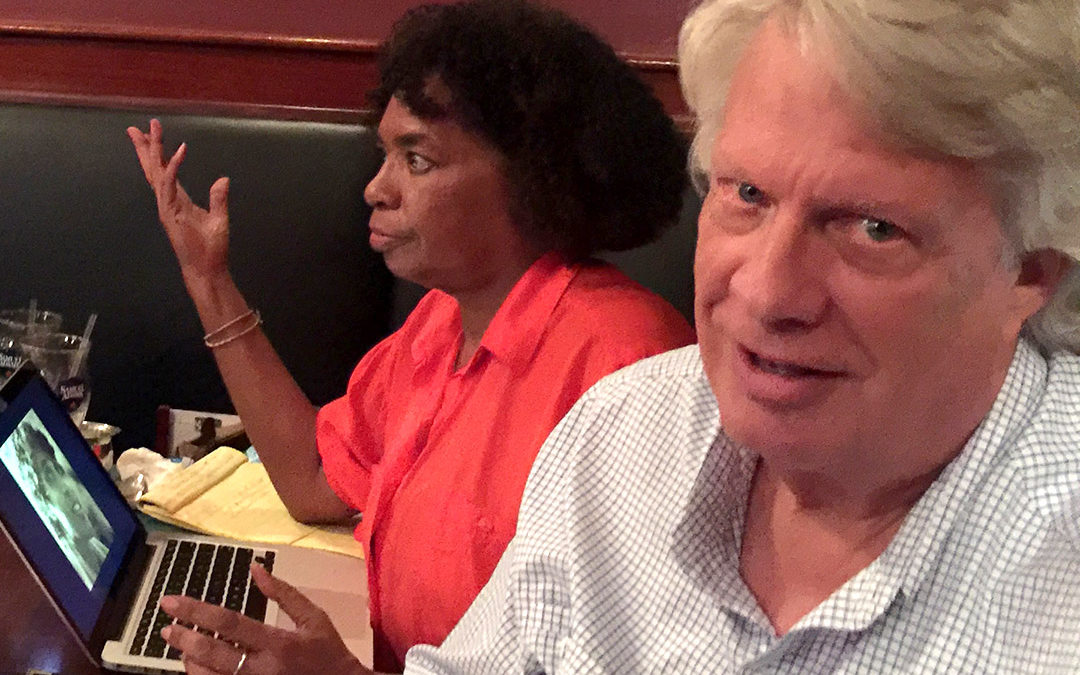
Our Director is Golden
I am continually humbled by the amazing talents of the people who have come together to help bring ONAJE to life at FringeNYC. Two standouts are our tenacious, indispensable producer, Sue Conover Marinello, and our inspired, insightful director, Pat Golden. I am thrilled to have Pat’s creative guidance and casting acumen.
A little about Pat:
Pat Golden is an award-winning director and casting director for stage and film, and has had an extensive career that includes Broadway, Off-Broadway, Regional and International credits. She was Assistant Director to Emily Mann on the Broadway production of A Streetcar Named Desire, and has been affiliated with The Ensemble Studio Theatre (EST), Cherry Lane, Lincoln Center for the Performing Arts’ Mostly Mozart Festival and many other venues.
Pat is also a filmmaker and Casting Director, known for discovering new talent. She won the Artios Award for Best Casting in a Feature Film (Drama) for Platoon, and was nominated for Blue Velvet. Other feature credits include Gimme Shelter, The Handmaid’s Tale, and The Killing Fields. She’s worked with Lee Daniels Entertainment, New Line, Warner Bros and PBS as Associate Producer.
We are truly fortunate to have Pat’s incredible talent, experience, and dedication for ONAJE. Come to FringeNYC in New York this October and see for yourself!
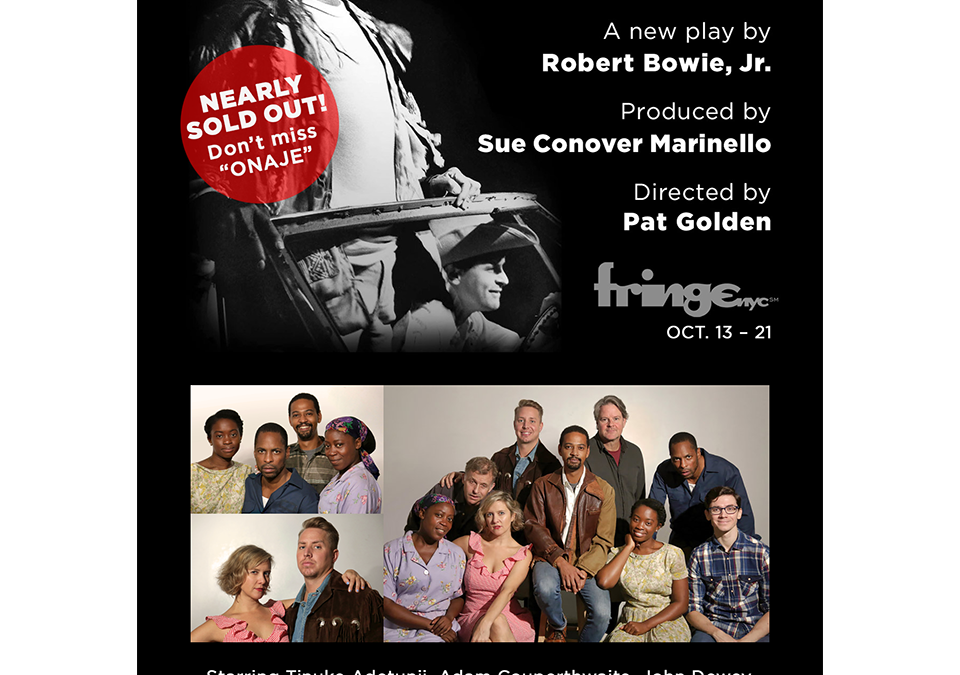
ONAJE Updates:
FringeNYC a Smashing Success!
We’re honored that ONAJE was selected as an official production of FringeNYC, with five sold-out shows, October 13th — 21st, and great audience and critical acclaim.
It was a thrill to have our fantastic director Pat Golden on board, and our phenomenal producer Sue Conover Marinello. Our talented cast was outstanding: Tinuke Adetunji, Adam Couperthwaite, John Dewey, Curtis M. Jackson, Mary E. Hodges, Sheila Joon Ostadazim, Bristol Pomeroy, Tim Rush, and Jay Ward.
Humbly, I must say it was an incredible honor and opportunity, and it’s all thanks to our generous contributors. Please email me to connect — let me know if you’d like to hear about our next production.)
What Changed?
For years and years, I practiced law and total strangers would stop me and say “Yer a lawyer, aren’t you?”
I mean, really!
It started about a year after law school when I was learning to be a litigator. I loved being a lawyer but now I’m retired and in recovery. Strangely, no one asks that question anymore.
What changed? What were they picking up on in the first place?
We all know the world through our five senses, so which of the senses lead me to be identified as a lawyer? I’m portly enough to be the mayor of a small town. I’ve got a voice perfect for broadcasting large sports events. I’m not one of those instant huggers. I bite my own nails and when these people identified me as a lawyer they were not all downwind of me.
When I walk down the street now, I’m waiting for people to recognize me in a new light. “Yer a playwright, aren’t you?” Come see ONAJE this October at FringeNYC and help make that dream come true!
Join me on this adventure at https://theplayonaje.com.
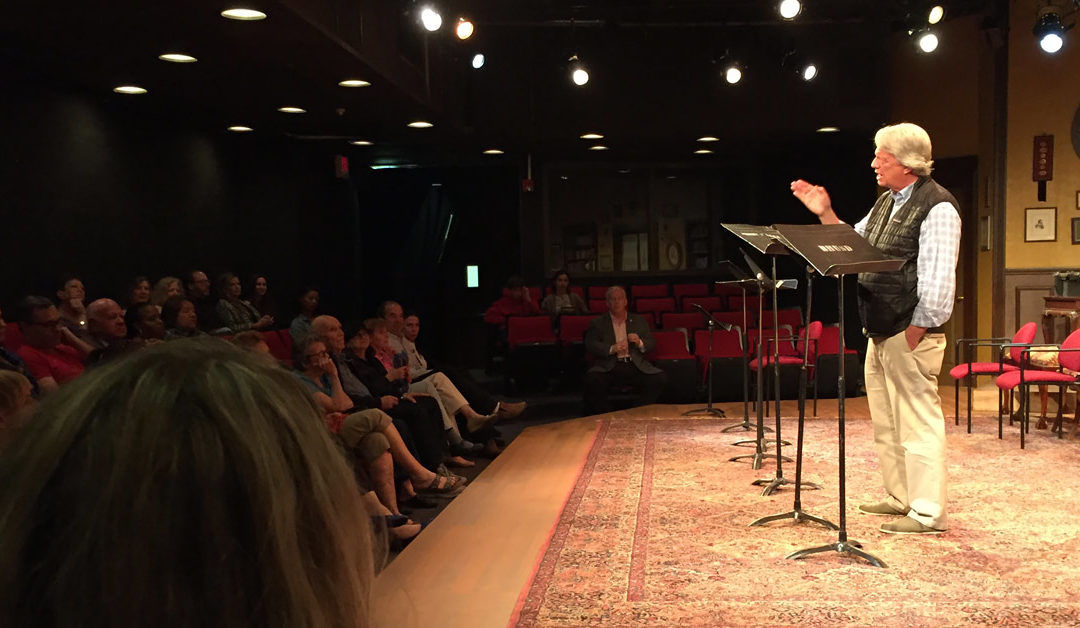
ONAJE Staged Reading in L.A. a great success
ONAJE Staged Reading in L.A. a great success
ONAJE received a new staged reading at Theatre 40 in Beverly Hills on April 15th, superbly directed by Adrian Cohen and featuring an amazing cast: Travon McCall, Annalee Scott, Cathy Tomlin, David Hunt Stafford, David Welsby, Shaun Savage, Stephanie James, Frederick Dawson, Eric Keitel, and Patrick Hallahan.
We had a full audience, who were kind enough to stay afterward and give us some very helpful feedback. It was a great discussion, as well as a reminder of the impact that live theater can have.
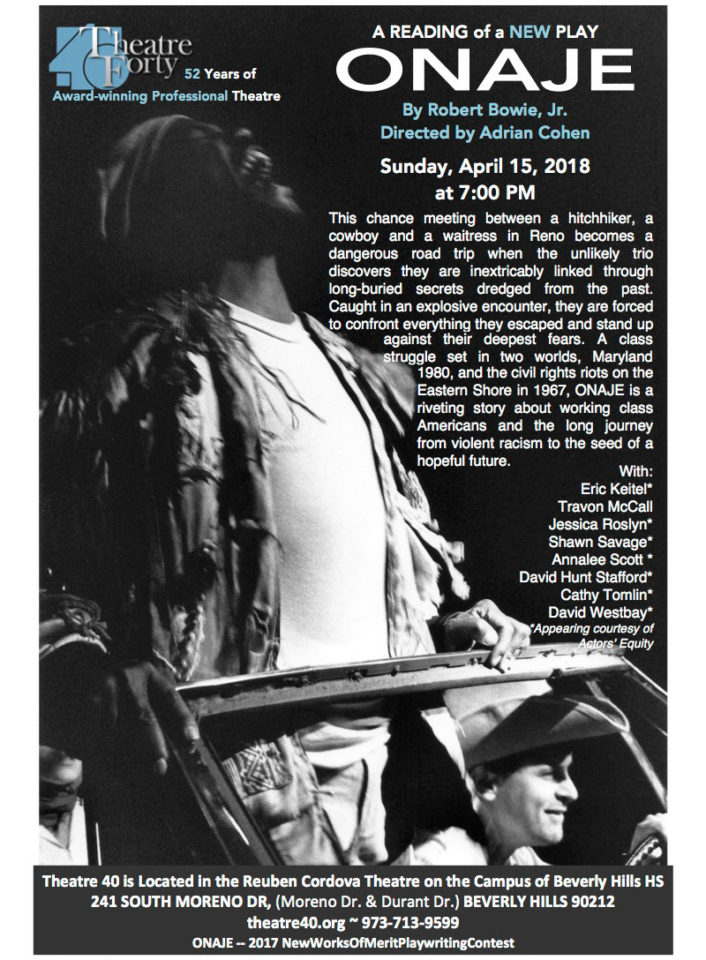

FringeNYC and Beginnings
On May 24, 2018, at 3:25 pm I received an email from the New York Fringe Festival (FringeNYC.org) telling me that my play, Onaje, was accepted for production in New York in October.
At the heart of the play is the Civil Rights riots and burning of Cambridge, Maryland in 1967 —still sadly relevant 50 years later with civil disobedience in Charlottesville Virginia, but this time the President says “there are good people on both sides.” We are still “a house divided.”
I lived on the Eastern shore of Maryland as a boy that summer. I had grown up in liberal Massachusetts and had never experienced firsthand racism or the terror of being an outsider and the range of psychological damage which occurs from it.
My first day visiting the Eastern shore I was invited to go to a country club to go swimming in the club pool. I was not a hippie. My hair was long enough to go over the top of my ears but not over the back of my collar. As I approached the gate to the fence that ran around the edge of the swimming pool I saw the lifeguard looking at me as he descended from his tower to confront me before I entered.
When he stopped me at the gate he told me because of my hair I would have to wear a woman’s bathing cap. Swimming stopped and parents and children looked at me. All the men had short crew cuts and all the women had long hair but were not wearing bathing caps. That was in early June the riots occurred in late July.
I will continue writing in this blog about the production of the play up until I’m through its final performance in October in New York. I don’t know how it will land. This is the story of the first production of my play. Come and share with me the ride.
(We need help to keep the wheels on. If you can manage it, please donate.)
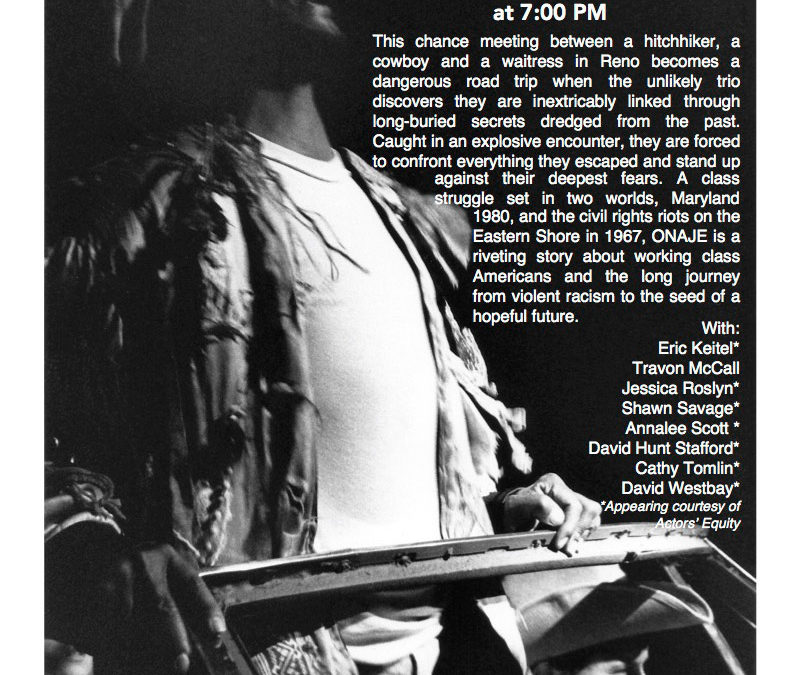
ONAJE Reading in Los Angeles
Staged Reading in Los Angeles
ONAJE will receive a new staged reading at Theatre 40 in Beverly Hills, 7:00 pm, TONIGHT, April 15th, directed by Adrian Cohen. For more info and to RSVP click here.
O’Neil Playwriting Festival
We received word that ONAJE is in consideration for the Eugene O’Neil Playwrights Conference in July of 2018. We’ll hear more by early May.
Honorable Mention
ONAJE was submitted to the New Works Playwriting Competition for 2017 and received an Honorable Mention.
The Play
ONAJE is about the pleasure and horror of vindication, the exile caused by American racism, and a mistake that could steal forever a hero’s soul, his humanity, and his journey toward redemption. Set in two worlds, Maryland 1980, and the civil rights riots in the Eastern shore in 1967, Onaje features a trio of characters inextricably linked through long-buried secrets of their past and forced to return to everything they escaped.
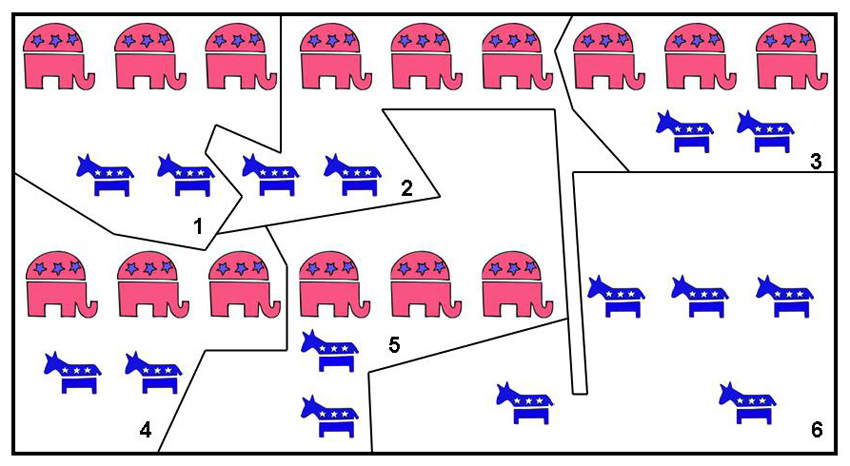
Gerrymandering & Protecting Us from Our Politicians
In prior posts, I have talked about how polarization has been caused by gerrymandering and now the judiciary is stepping in to dismantle it.
In North Carolina, on January 9th, Judge James A. Wynn, Jr. struck down the North Carolina congressional district lines. The three-judge panel ruled if state politicians draw district lines for the purpose of protecting their own interest at the expense of the other party, the districts are invalid. Then last week, the Pennsylvania Supreme Court overturned gerrymandering, citing the state constitution, and required new districts be drawn by the 2018 midterms.
Most importantly now, the Supreme Court has heard arguments on a gerrymandering case out of Wisconsin and has asked for re-argument of a Maryland case, which will probably be part of an opinion that strikes down gerrymandering nationally.
God bless our state and federal judges. It is long overdue for “we the people” to get the chance to take back our country from our politicians.
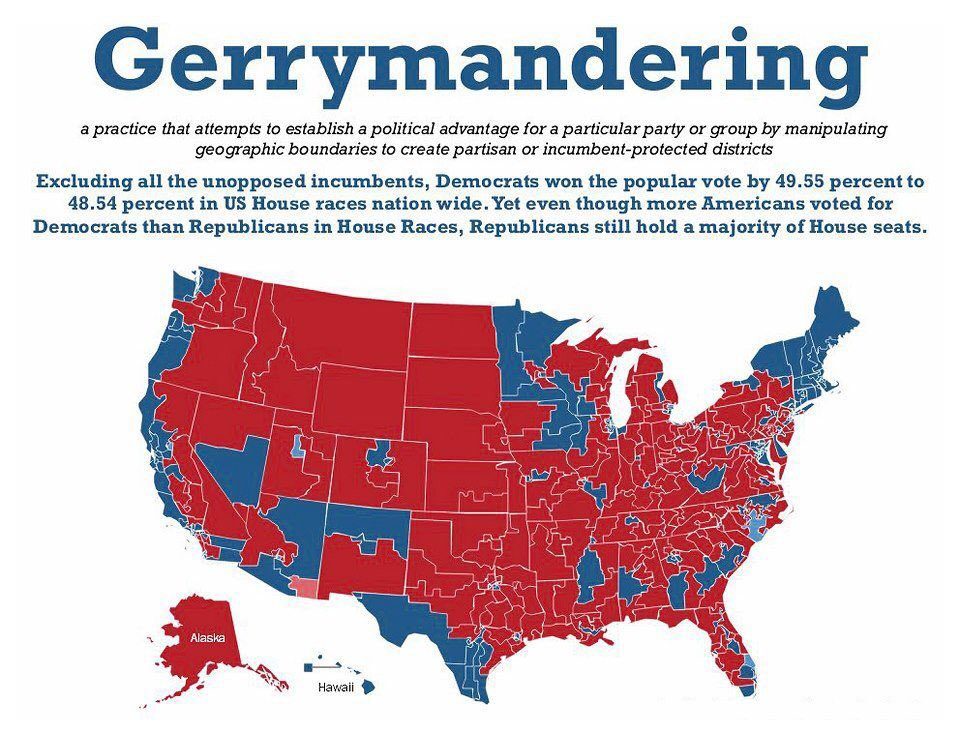
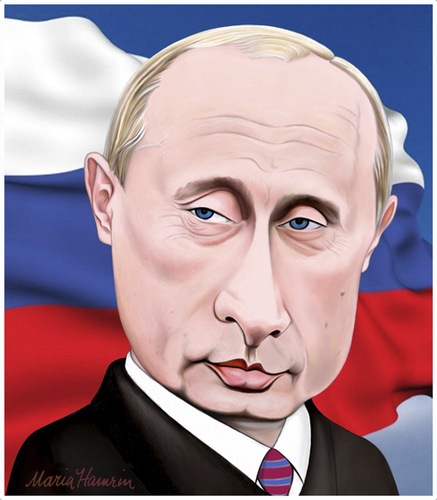
Plot Study #6 Job Interview
KGB-TV Job Interview, Another Plot Study (The Monologue)
To answer your question, yes we are a subsidiary of FOXNews. “We be Putin it where the sun don’t shine.” We have a target market reserved for Viewers that believe in tax cuts for the rich, healthcare as unconstitutional, and a God that loves the NRA because we need weapons to protect churches from people with weapons.
Yes, you’ll be asked only to read tweets on the air. The rest is advertising because our viewers are so stupid they’ve proven that they’ll buy anything….like our propaganda/ news from the last election. But I’m getting ahead of myself. Have you provided us with the signed affidavit that you have never been sexually harassed by anybody, ever? No, don’t date it. We will date it if we need it.
Now please look into the camera and read the following tweets: “News flash! Hillary did not disclose Girl Scout cookie Income!” Don’t forget the smile and long knowing stare after you finish, thank you. All right now do this one: “Bill also does sheep !” Smile – that’s it!. Now the next one: “ Obama Birth certificate proves he’s Putin’s grandmother! “ OK, that’s good. Now before we go to the advertising .” News Flash! Surprise -you don’t have to take the Pampers off of your head after Halloween. You can give them to a Democrat with a dirty mind, for Christmas, and get a 501(c)3 religious organization pass-through tax deduction.”
No wait give it to me like we are in Moscow baby: “News Flash! Democrats seek to tax prenatal care for the born-again!” Keep that stare. Keep that knowing stare. Keep smiling. Good! Watch Pat Robertson prey’n on the Christian Broadcast Network. Listen and learn.”
OK, now sell this:
“Because yer such a good American — Free Trump miniature combover piggy banks! Holds two pennies (“your two cents”). Remember when Republicans shut down the government because they wouldn’t vote for any deficit increase? You don’t? Good, you qualify for “The New Contract with America” and new 1.5 Trillion deficit increase that your great-great-grandchildren are going to be paying off… even if they are Russian citizens of West Virginia. And Just remember this: Your free gift from all of us at KGB-TV and the Citizens United Foundation’s offer: 50% off of on our IQ increasing suppositories. Now installable with your thumb.”
Congrats, you‘ve got the job! We pay in Rubles because after the upcoming recession and increasing deficit the dollar won’t be worth shit. Welcome to KGB-TV! We be Putin it where the sun don’t shine.”
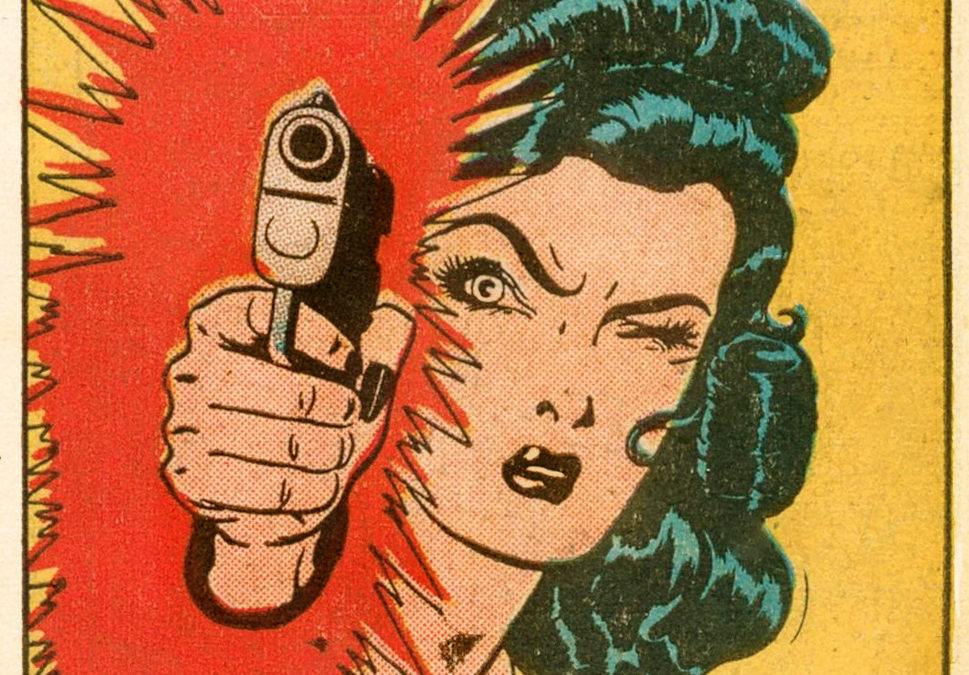
Plot Study #5 A Political Comic Book
We continue our study of theatrical forms about our present political culture in the form of a Marvel comic book with nine picture frames.
1) The opening frame contains the signers of the Declaration of Independence and Abraham Lincoln saying: “You can fool…” and Roger Ailes, Newt Gingrich, and a cast of grinning Fox News panelists universally agree: “The hell you can’t. Cut taxes for the rich, take away their healthcare, promise them lost jobs, and give every idiot a gun… Its the new GOP” (Grotesquely Opportunistic Policymakers).
2) Next: There are two little men in loincloths with little hands. In the bubble above the North Korean’s head: “I will launch heat-seeking suppositories is how I will trump you, Trump!” Behind him are millions of people cheering, in unison, in one bubble over their heads, their approval. The bubble above the orange comb-over: “I’m clenched and ready. It will unify my base.“Behind him stand millions of people (no immigrants) each holding millions of guns all aimed at liberals who point at them as they warn: “Fear the suppositories from all sides” and then do nothing which causes the millions holding guns predictably to unify the Comb-over’s base.
3) The next is a tweet which says: “Second amendment – No hunting license required – shoot people for free! “And “First Amendment is about disrespecting soldiers it’s not about Freedom of political speech.”
4) Next the Bolshevik United Republican Party (BURP) screams: “ You are Americans. You have ‘freedom of choice,“ and Lincoln on his knees says: “No, that’s Burger King.”
5) Next the Korean leader leads his millions in a chant: “We win War! We Win War!!”… death to Americans by suppository special sauce on your toasted bum.
6) Next BURP puts up banners which say: “Keep Liberals angry with ‘false news ‘and you stand for ‘freedom of choice!’ We understand for nothing! To gather we fall.” The Liberals continue to be astounded and do nothing.
7) The Fox commentators stand and slap high-fives and misquote Lincoln: ”Divide and conquer the House and Senate!“ The Comb-over tweets: ”Always been colorblind. The flag is not red, white and blue it is white — salute and retweet?
8) Next is of a hurricane building in the shape of a mushroom cloud as the Self-Anointed Televangelists About Nothing (SATAN) and BURP point at it and drop to their knees and confirm: “There you see the Bible told us so: There is no climate change change.”
9) Is blank in case there is an encore.
This is another entry in my series of plot studies. Click here to read the previous one.

Plot Study #4 – America’s Pastime
Act One
A young student of American history goes to a job interview. The employer who interviews him tells him: “Your job, like this country, requires that you tell the truth because all of us are relying on each other. You can debate the facts but you cannot make up false facts” and then she asks him one question: “What is the difference between a football player who fakes an injury to stop the clock and a baseball catcher who moves his mitt to try to convince the umpire the pitch was a strike?” The young student knows the answer instantly: “The football player is breaking the rules by creating ‘false facts’ with his false injury, but the baseball player is not changing the fact of the pitch because the umpire can see it from beginning to the end. The baseball player is only an advocate but not dealing in false facts.”
Act Two
Convinced that he has a clear understanding of “America’s pastime” and that he will get the job, he goes to a baseball game that afternoon and sits in the bleachers with the fans of both teams. Surrounded by his fellow Americans he happily joins in and argues each ball and strike and catch and call made by the umpires at the game. He sees the same game as the fans of the different teams but all afternoon they enjoy the discussion and their debate and he concludes not only the baseball game but also the debate and discussion are “the American past time.”
Act Three
On his way home he turns on the radio and he hears the home team’s broadcast and then switches to the radio station for the visiting team’s broadcast and he hears an entirely different story. He notices it is not at all what he saw at the game because both radio stations are making up a story of the game for the fans that are listening to them. As he switches back and forth between the stations he realizes that the broadcasts are coming up with an entirely different score and in the wrap-up of the game entirely different league standings.
He is angry when he gets home but he finds both of his parents weeping. He tells them about the conflict between the broadcasts and he asks them: “What are they doing to America’s pastime ?”
Both parents look at him and ask him: “What are they doing to America?”
This is another entry in my series of plot studies. Here’s the previous one. And the next.
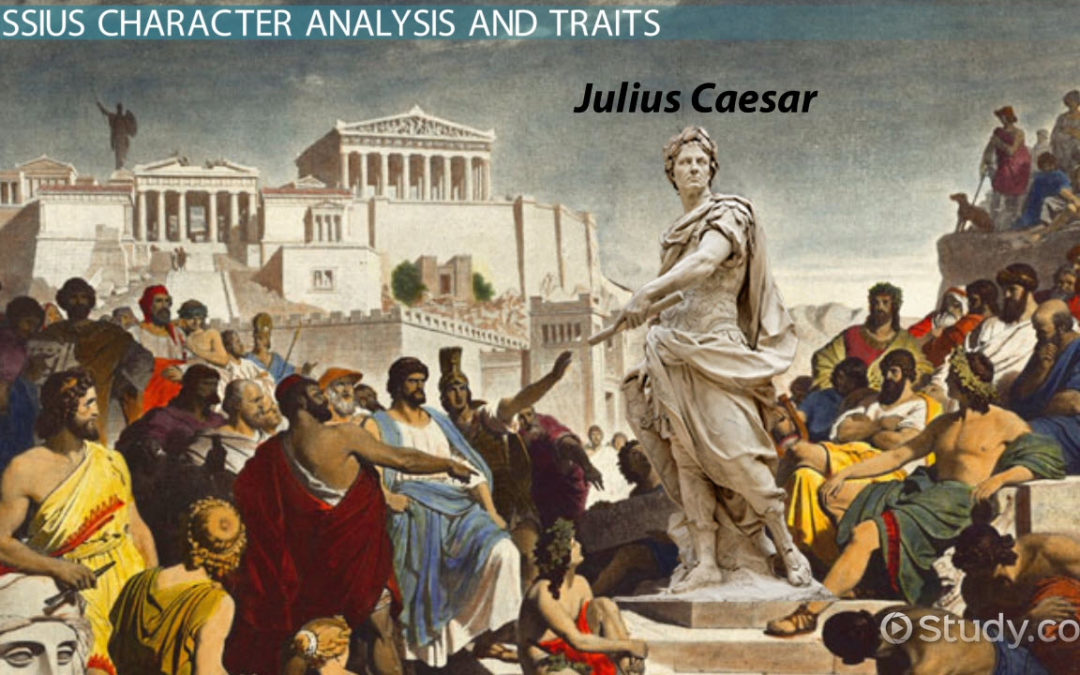
Plot Study #3
In my previous posts, I published Plot Studies #1 as a comedy, and #2 as a musical, both based on our current politics. Is plot study number #3 a tragedy or a puppet show? You decide.
The time and place: Let’s see if our current political environment could be written as a Shakespeare tragedy, say like Julius Caesar (performed somewhere other than in Central Park)? Let’s say that the government of Rome has evolved from a republic to a democracy and on to an oligarchy and that Caesar’s friends and family are running the empire.
The Cast of Characters: A group of historians and law professors and their students and lots of well-meaning myopic liberals who want the republic back (The rule of law) but are too disorganized and apolitical to be effective in advocating for their position. Just for fun let’s call them the Democratic Party.
A Group of all the richest Romans, led by Julius Caesar, who is one of them, but is controlled by this group who want to always increase their power and pay less, or perhaps next to no taxes but receive all the benefits of being Romans (The oligarchy). Just for fun let’s call them Republicans.
And a huge mob, the “peanut crunching crowd,” that thinks with its stomach and votes in the bathroom (The democracy). They are fed by Caesar and his friends a form of pablum which includes facts, false facts, and huge amounts of fantasy, all mixed together and called “news.” They are, of course, constitutionally well armed so that they can kill us and each other. Just for fun let’s call them the advocates and lovers of our present democracy. (Isn’t this great, we start with a cast of millions.)
The plot: As the play starts, Caesar is being investigated by a special prosecutor which he can’t seem to figure out how to get rid of, so Caesar has decided to protect his control by creating constant conflict among the citizens of Rome to avoid unification against him and perhaps total power for him in the future in the event that the special prosecutor recommends his impeachment. (This is exciting – I’m already feeling tragic.)
The way to do this is to pit the well-meaning myopic liberals against the peanut crunching crowd on the issue of race and immigration and to build a wall all around the empire to keep immigrants out to make sure the myopic liberals keep his base polarized and well armed for him. (It’s getting great – it’s all starting to go to hell!) The well intended myopic liberals are so blind and morally correct that they can’t realize that they are playing perfectly into Caesar’s hands. (Yes! Yes! There is a lump in my throat and I’m starting to well up with tears.)
Caesar is building up his army by feeding his followers the pablum as fast as he can so that they will be as angry as possible and loaded down with weapons if the special prosecutor recommends impeachment. (Wow, this is so good! It feels authentic – it’s almost like real life! But how is it going to end? How is it going to end?)
So back to the question: Is this a tragedy or a puppet show? I think that is determined by how it ends. If Caesar prevails with his plans, he can cut Obamacare and reduce taxes because it can be produced with only two characters. Caesar with his right hand on the constitution and his left hand making a single string puppet (which is holding the eye glasses of the liberals as it trails peanut shells) dance! But if we follow the Shakespearean example of Julius Cesar, it is a tragedy of greater proportion because in the second half of the play the Roman empire is divided among the lesser oligarchs. Let’s call it forever polarized by ignorance.
Maybe if Cesar doesn’t divide us and we took action together, all of us, we could write a happier play and call it maybe: “All’s Well that Ends Well.” It’s not too late.
This is another entry in my series of plot studies. Here’s the previous one. And the next.
Plot Studies #2 – The Musical
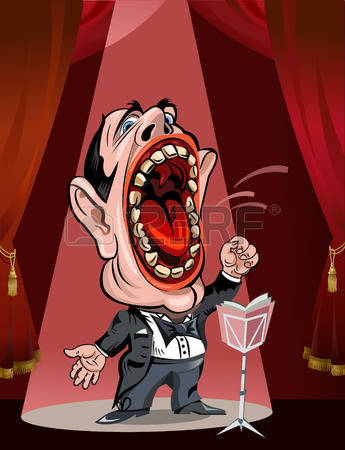 Let’s see what would happen if “we the people” (the audience), wrote our own musical and cast the playwright & librettist as the Congress and the President, and cast their investors as the titans of Wall Street? (Wow– could this be a “revolutionary” musical?)
Let’s see what would happen if “we the people” (the audience), wrote our own musical and cast the playwright & librettist as the Congress and the President, and cast their investors as the titans of Wall Street? (Wow– could this be a “revolutionary” musical?)
The Time & Place: How about our politically gridlocked America? (It is starting to sound like a revolutionary musical!)
The Cast of Characters: Since we are writing it let’s make us, the audience, the heroes, and the playwright, librettist and investors our official villains since they are all dedicated to entertaining the audience by feeding us what they want to hear in order to be able to secure their jobs and protect the wealthy from taxes — employing a smokescreen of misinformation and false news in order to entertain their audience by keeping them angry. (They probably won’t be singing Hamilton hip-hop but let’s see what they come up with “for a song and dance.”)
The Plot: The playwright and librettist entertain us by creating manipulated conflict between the bottom 99% of the audience. The poor versus the poor (which pretends it’s the middle class) so no one will see the puppeteer, the super wealthy? ( I feel a song coming on): Let’s have Wall Street Open the show by singing: “Market Share.” A big bang up number! The first lines could be:
“The bigger the market, the bigger our share /
The more we steal, the less they care! /
Let’s fleece my sister, let’s fleece my brother /
As long as they’re angry at each other. /
Isn’t it sweet, isn’t it funny /
How they love us when we take all their money?”
Hey, it’s “the song and dance”! Let’s call it “The Political shuffle.” (Oh man, the songs are coming fast and furious):
Congress can swing the next song:
“Make Yourself the Perfect Job” (about how gerrymandering can get our elected representatives lifetime employment with the best benefits and retirement their audience can afford, and then the entire audience can rise in opposition and sing:
“The No Wealth No Healthcare Blues” (which can be sung by ZIP Code first by anybody who lives around an emergency room, including patients, doctors, healthcare professionals, and then by everybody in the surrounding ZIP Codes spreading out across the country who is paying (unless you own your own hospital).
Now let’s give the politicians some hand clapping songs:
“I hate ‘tax and spend’ /
Unless I’m where all the taxes end.”
And then a solo for a tone deaf President:
“Free the rich, enslave the poor /
The land of opportunity is no more.”
And then some hand clapping songs for us:
“The false news, no news… /
The Propaganda blues.”
(We could even have the Supreme Court do hip-hop, but they would have to have a rhyme scheme of ABBA because they are too polarized to agree to rhyme together) but maybe they harmonize with the song “Ventriloquism”:
“Yo- Citizens United, long may it last! /
‘Free-speech’ is that what you call it? /
You vote now with what’s inside your wallet /
And we speaketh from where once we passed gas?”
(But wait – just occurred to me – how can we pay for this?) Well if we are the audience, we already have!
So what should we call our new musical?
“Just Keep Us Fighting Among Ourselves?” – No.
“You Think We Are Too Stupid for Democracy?” – No.
“What Happened to My Country? – No.
How about, “Let’s NOT Follow the Money”? – No.
We could close with a kick line and just drop the curtain or …Maybe we could all stand up and remember that we are all Americans who can sing together?
This is another entry in my series of plot studies. Here’s the previous one. And the next.
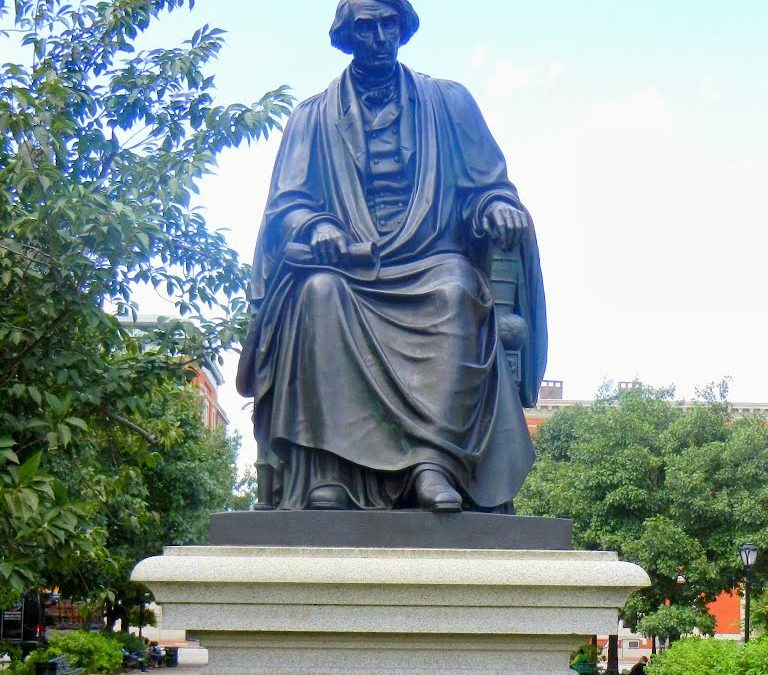
The News v. The Arts
The news often tells us who we are, but the arts tell us who we want to be.
This year my play “Onaje” received staged readings in San Francisco and New York. It is about the head-on collision of two conflicting ideas that happened exactly 50 years ago on June 15, 1967. The relevance of this collision was confirmed by the events in Charlottesville last week. This morning the Baltimore newspapers reported that four Confederate monuments were taken down in the middle of the night last night.
One of the monuments that was taken down was of Roger Brooke Taney, the Chief Justice of the Supreme Court who wrote the Dred Scott decision in 1857, which was instrumental in bringing about the Civil War. The Dred Scott decision held that African-Americans had no rights under the Constitution because they were not recognized as having any rights when it was drafted. Many of the drafters of the Constitution, such as Washington and Jefferson owned slaves. In fact, Jefferson produced children from his slave Sally Hennings. He chose not to recognize their children and never freed her, even after his death.
From our founding, we have been a racist nation. Because this remains unresolved, it boils within our national consciousness and erupts repeatedly and endlessly in the news. But I don’t think that’s who we want to be. The Arts, the books and movies which have been embraced by our general culture from “To Kill a Mockingbird” to “Hamilton,” are far more enlightened and humane. We don’t define ourselves as a nation with blockbuster movies with heroes that are white supremacists or Nazis.
My play is about the civil rights riots in Cambridge Maryland in 1967. It searches for the humanity in all of us as we live in these volatile times, whether they be last week or 50 years ago or from our start.
The Arts offer guidance and hope that the news and perhaps even our history never can.
For more posts and news please visit my Facebook page.
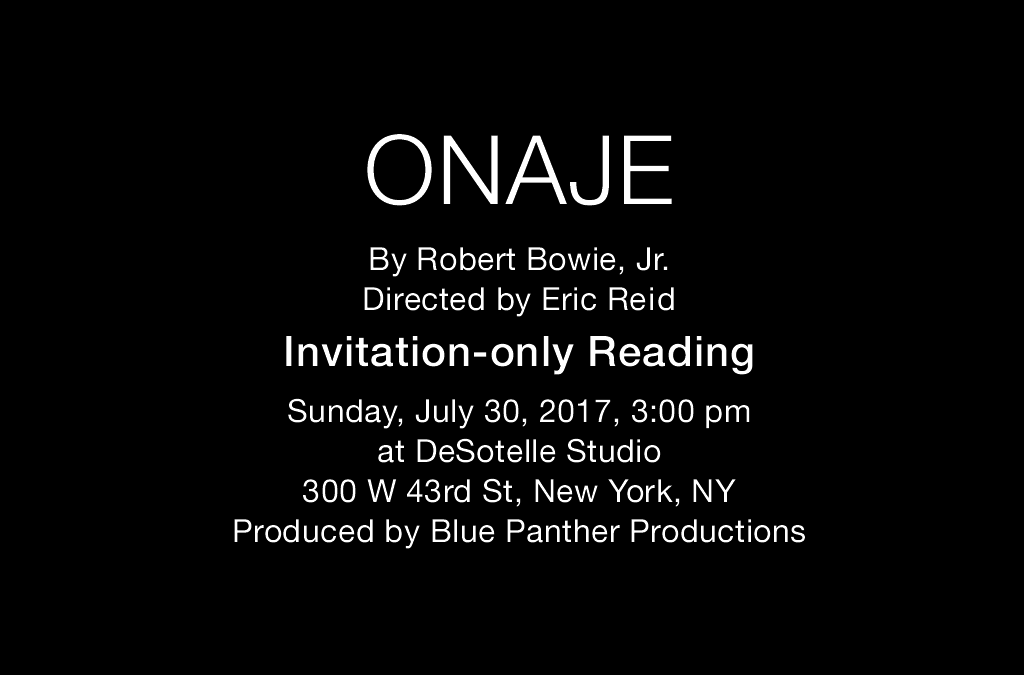
Invitation Only Reading in New York Big Success!
For Artistic Directors and Producers ,we held an invitation only reading of “Onaje,” produced by Blue Panther Productions directed by Eric Reid of San Francisco.Full house .The actors were fabulous and the response and the request for scrips exceeded all of our expectations. For more information please email Laura Lundy.
Sunday July 30 2017 at 3 P.M.
At DeSotelle Studio
300 W43rd St,
New York. NY.
THE PLAY
Reno, 1980. A black hitchhiker is hit by a white cowboy and waitress speeding down the freeway on a get-away. The collision becomes much more dangerous when the unlikely trio realizes that two of them are inextricably linked together through the long-buried secrets of their past. In a shocking conclusion, they are forced to return to everything they escaped and stand up against their deepest fears in a vicious stand-off. “Onaje” is set in two worlds, Maryland 1980, and the civil rights riots in the Eastern shore in 1967.

The Genius of Actors
I write plays but I can’t act. My acting career ended shortly after an all-boys fourth grade Christmas pageant. I was a shepherd. I had one line that I had to speak to introduce Mary onto the stage. The music teacher had placed a wig on the class bully and handed him a plastic Jesus in swaddling clothes. In real life, the class bully had biceps in fourth grade and Elvis hair. I misspoke my one line. I said, “Come mither hairy!” I returned from recess bloody and a playwright.
Last weekend at an invitation-only reading for artistic directors and producers, my play “Onaje” was read at 300 West 43rd street in New York City. It was read by actors who make a living being actors. I was stunned by the uniqueness of their genius.
I am a recovering lawyer. While I practiced law, I had nine plays produced in little theaters in Baltimore. Although I was proud of them, I made no effort to have them performed professionally. When my play was given a staged reading in New York for the first time I worked with professional actors and was blown away.
The performance was scheduled for Sunday at 3 o’clock in a 30-seat performance space. The actors were sent the script about a week before the Saturday morning rehearsal in an apartment in New York. The rehearsal was, in essence, a read-through where Eric Reid, an accomplished actor and director from San Francisco, gave directorial instructions and the actors discussed their characters. The actors were all obviously capable but I was not ready for what I would see the following day.
There was another read-through which was to a large extent the blocking of the reading. All the actors sat in chairs in the black box theater against the wall until they were on stage, which meant they stood and went to the music stands in front of them and delivered their lines. There was a one hour break between that rehearsal and the performance. At the blocking rehearsal, the actors were still playing with their characters well I had a terrible thought that they had not had time to become fully familiar with the script and their characters.
I went off to a late lunch with Eric and returned to see the actors in their own village doing breathing exercises, sitting quietly or doing yoga. I had no understanding of how good they would be on stage.
The small theater filled the actors took their places and the reading began. I saw a transformation that changed my understanding of the art of theater. Somehow, they knew the people they will play in an intimate and unique way. Somehow, they knew each other and the interaction created a greater whole. The play was very well received and the script has been requested after I have had a chance to do some work on the text.
Afterward, the lights went on and the actors were people again and they merged with the audience. I stood in the back of the theater immersed in surprise by the evolution of the process and the sheer genius of those actors. Actors are unique beasts.
A central aspect of my play concerns the capacity of people to empathize with strangers. I realized as I stood there I had witnessed it by the transformation of actors so easily turning the written word into human beings.

Invitation Only Reading in New York
For Artistic Directors and Producers ,we are holding an invitation only reading of “Onaje,” produced by Blue Panther Productions.For information and invitations please email Laura Lundy.
Sunday July 30 2017 at 3 P.M.
At DeSotelle Studio
300 W43rd St,
New York. NY.
THE PLAY
Reno, 1980. A black hitchhiker is hit by a white cowboy and waitress speeding down the freeway on a get-away. The collision becomes much more dangerous when the unlikely trio realizes that two of them are inextricably linked together through the long-buried secrets of their past. In a shocking conclusion, they are forced to return to everything they escaped and stand up against their deepest fears in a vicious stand-off. “Onaje” is set in two worlds, Maryland 1980, and the civil rights riots in the Eastern shore in 1967.
Plot Studies: Let’s see if we can create a comedy based on a conspiracy theory.
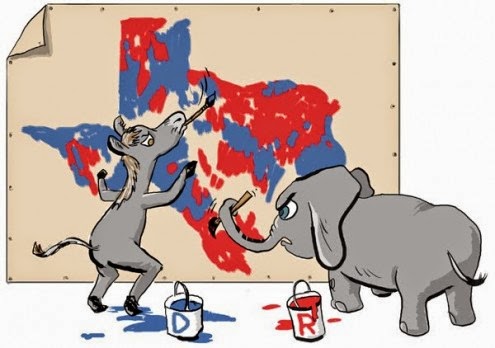 Let’s set the stage in a political world locked in gridlock. (OK – this is a good start.) Let’s make the conspirators: “The Evil institutions of our government “and let’s make the rest of us the “Innocent victims”. (OK -good guys and bad guys.)
Let’s set the stage in a political world locked in gridlock. (OK – this is a good start.) Let’s make the conspirators: “The Evil institutions of our government “and let’s make the rest of us the “Innocent victims”. (OK -good guys and bad guys.)
The Plot: OK what if the Politicians are conspiring to stay in office with the use of gerrymandering and they really don’t care about us as innocent victims. What if each state legislature, when it carved out the districts for its political party thinks only about keeping those in office, permanently in office. (This is great I’m laughing already.) What if that makes the state legislators the creators of jobs which have the best healthcare and retirement packages in the country and are set up, because of the gerrymandering, so that their bosses can’t fire them. (This is hilarious.) Even better they “own ” their bosses by keeping their bosses angry with the gridlock so their bosses won’t fire them. (I’m loving this.) No Wait – what if their bosses are actually not the voters? The voters are only paying the government with their taxes and the government is paying the politician’s salaries but the government isn’t keeping them in office. (OMG). It is the campaign contributors, the wealthy and the special interests and the PAC’s that pay for their campaigns and the campaigns keep them in office. (It’s OK because every comedy has to have surprising twists and turns).
And when we are laughing so hard that there seems to be no way to catch our breath…in rides the national media on a White Horse to save the day. (But that’s not funny and it is sort of a buzz kill –it kills the humor) So let’s just say that the national media would be funny if it was lazy, never researched anything and got advertising by reporting on the hysteria created by the polarization. (OK it’s getting funny again) In fact all they have to do is scream at each other to keep everybody entertained! (I just found myself slapping my knee). But wait – any given station could just run reruns of ” All in the Family” or old “professional wrestling tapes “to have people screaming at each other. (That might be confusing because it might seem like the news is only entertainment -that could be a real problem!) So it won’t work if all the stations are doing the same thing. (Oh No I just become horrified and stopped laughing. What if all the national media were caught presenting only boring entertainment?) No! No, the answer is the national media has to POLARIZE to keep their ratings up and maintain the rolling laughter!
Why am I not laughing? This is getting a little scary! Maybe it’s a tragedy.
This is another entry in my series of plot studies. Click here for the next one
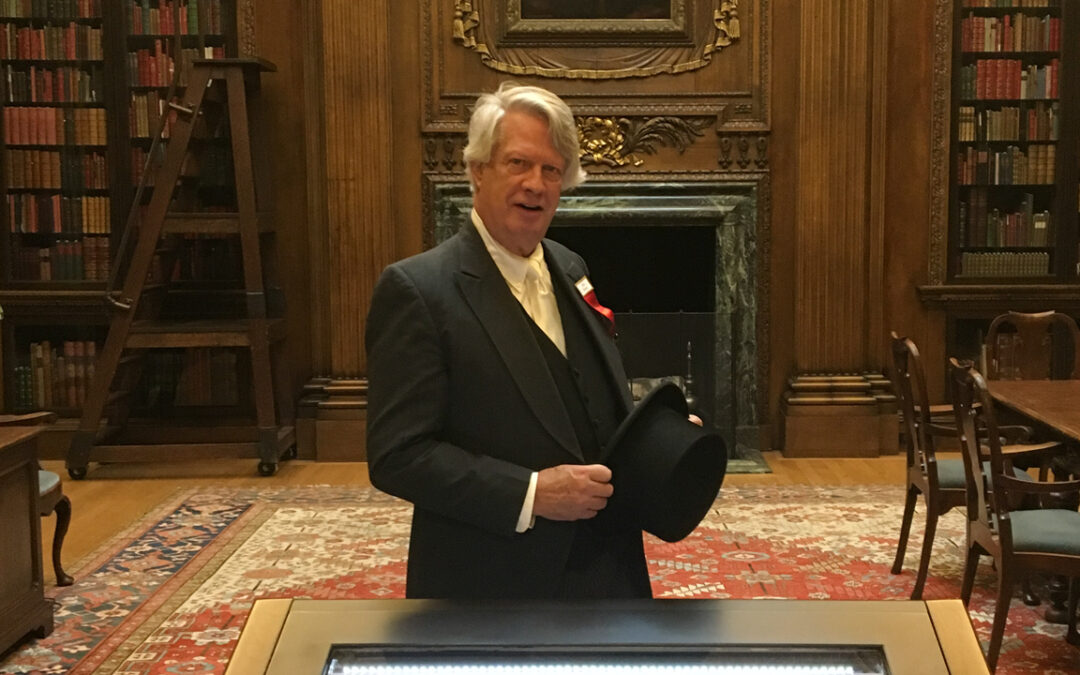
(Costume + Set) – Plot = ?
The “Costume” in my case was white tie and tails with a perfect black top hat. The “Set” was the Harvard graduation of last week. The “Plot”: Because of the custom of complete secrecy, I had been told only a few days before that I had been selected to escort James Earl Jones for the afternoon proceedings and to an honorees lunch at Widener Library after the morning ceremonies where he, along with several others, would be given an honorary degree.
Only last month I had seen his performance as the poet in Tennessee William’s Night of the Iguana at the American Repertory Theater and had read about his career, which started with his first appearance on Broadway in 1957 and spans 60 years on stage and screen.
After the honorary degree had been bestowed on him in the morning and those proceedings had ended, Mr. Jones would descend the stage, which is at the foot of Memorial Church, and march with his fellow honorees below the colorful flags of the graduate schools and the undergraduate houses, between the assembled throng of the thousands of applauding viewers to ascend the steps of Widener library and be directed to the periodical room where I would meet him, take his ceremonial cap and gown, unburden him of his framed honorary degree, and provide him with the refreshment of his choice. Then I would facilitate conversation among the other honorees before we took the elevator up to the lunch and thereafter back to the stage for the afternoon speech by Mark Zuckerberg and the closing proceedings.
I arrived early to Widener and made certain I knew exactly what my duties were and traced my steps from the periodicals room where I would meet Mr. Jones, through the elevator exit and entrance to the luncheon and ultimately the path we would take to get back to the stage and become seated for the afternoon proceedings.
But this was a very special moment for me, so I decided that I could entertain Mr. Jones by offering him a slight diversion from our proscribed path, to see the Gutenberg Bible in a private room which contains a portrait of Harrie Widener, for whom the library was named after he died on the Titanic a century ago. I confirmed that I could get into the room and because I was early I asked a solo passerby to randomly photograph me since the proceedings had not started and we were still allowed photographs before the event began. It would be my stage where I could watch James Earl Jones react to the surroundings I have offered him.
But my play went off script and the plot collapsed and, in fact, disappeared. The weather had been awful all morning with a steady drizzle and unexpected gusts of wind that sent the water across the crowds and the stage. Those being honored on the stage, although they were protected by a grand tent still suffering the blasts of wind and rain and the general chill of the morning.
As the proceedings broke up and the ceremonial march to the steps of Widener began, I assumed my position outside of the periodicals room to meet James Earl Jones, but as the others entered through the grand doors and were steered to their escorts there was no sign of him. After all the other honorees had entered and had turned over their robes and diplomas to their escorts, I went to one of the police officers guarding the ceremonies and started a flurry of walkie-talkie conversations in search of Mr. James Earl Jones. As the others took the elevator up to lunch, someone reported back that Mr. Jones had been worn out by the weather and the cold during the morning proceedings and had asked to go directly from the stage to his hotel room.
I never met him and I have only that photograph of the Gutenberg Bible in the foreground and the portrait of Harrie Widener in the background with a slightly rotund overdressed older man between them, and the realization that dreams can be memorialized in still photographs but plot cannot be deprived of action.
Character Development: “the believers” and “the nonbelievers”
Recently I was fortunate to spend two weeks in southern Africa in the bush in a zoo without Borders. After a long flight from New York to South Africa and a relatively short flight to Victoria Falls in Zimbabwe, a small group of fellow travelers and I flew in several single engine planes and later three helicopters to a wonderful elegant resort campsite miles from everywhere deep in Botswana. Botswana is about the size of Texas , has a population of about 2 million people and has reserved approximately 37% of its land for the preservation of its natural habitat.
The first thing you notice as the dawn comes up on the first day is how wide the sky is. As you scan it you notice that the clouds offer several widely different configurations and weather patterns. Then you realize how big the land is beneath the sky and how far away you are from everybody else.
Slightly before dawn, during breakfast on the first day, we are told explicitly that the jeeps which we will be riding in have no sides and as long as we stay within the boundaries of the jeep we will not be attacked by any of the animals. The animals are apparently not threatened by the jeeps for the jeeps are apparently perceived by them as foul smelling mechanical elephants which neither attack the animals or are worthy of their attack. That is the basis for our safety.
However, we were informed, if we get out of the jeep it is an entirely different game. We are told that within the last two years in South Africa a photographer who leaned out of one of the jeeps for a better photograph was attacked by a lion and when the guide tried to save her he was also killed.
The first morning as we leave the campsite we travel into the bush and see huge herds of zebras and impalas that are living in fear of the lions which stalk them but we see no lions. The second morning just after Dawn we turn into a small clearing and are confronted by four lions walking slowly toward us from a distance of about 50 yards. The driver stops the jeep and instructs us to say nothing but feel free to photograph. The Lions slowly and methodically move toward us. We are facing them and they are walking toward us.
As the lions slowly approach my fellow riders in the jeep become either “believers” that the jeep is safe territory or “nonbelievers” and with every step of the Lions, start to show an increasing countdown of the last seconds of their lives. They can’t move and the fear becomes palpable. The eyes are wide and the breathing becomes slightly labored.
On the other hand, the believers or happily photographing and silently adjusting their telescopic lenses. The Lions grow closer and closer and within 10 feet they veer to the right and one veers to the left so that it will be behind us. Everyone in the jeep recognizes that they must keep their eyes on the three lions that will pass to our left within several feet of the jeep but we will not be able to turn and watch the one lion that is moving behind us on our right. The believers continue to happily photograph adjusting their telescopic lens to catch the reflection of the jeep in a Lion’s eyes. The nonbelievers are breathing softly, their eyes closed, waiting for death.
After a few moments they were passed us and we started the engine and continued our day.
By way of example…I’m headed to Africa
Come back and I’ll keep you posted here and be sure to follow me on Facebook.
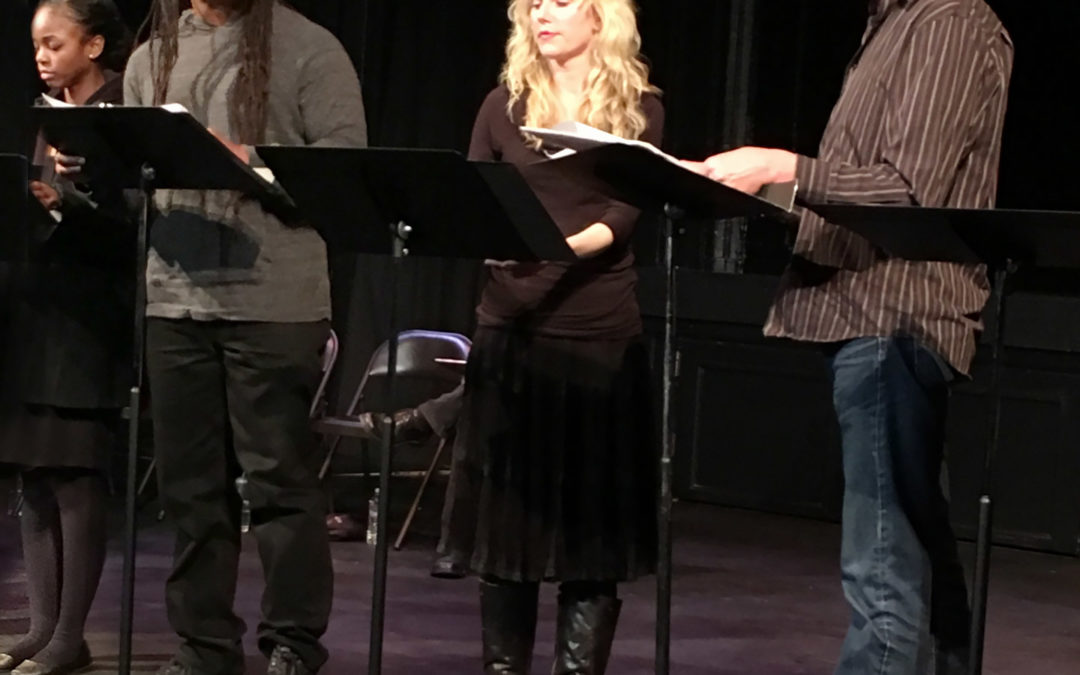
Don’t Retire…Move On!
Several years ago I sold the controlling interest in the law firm I started over 25 years ago. I decided to leave the office behind and the practice of law and start something new. I’m now a playwright. My play “Onaje “,about the 1967 civil rights riots in Cambridge Maryland, has been optioned for regional production in 2018 by Blue Panther Productions of the San Francisco Bay Area. It received its first professional reading on February 22, directed by the acclaimed L.Peter Callender of the African-American Shakespeare Company in San Francisco. The reading was a great success and Blue Panther is currently reaching out to artistic directors of professional and regional theaters.
A Sonnet
My Little Stone Buddha
Like a glass eye looks into the abyss,
My little stone Buddha, on the bookshelf top,
Sits as a “symbol” of “inner peace” and “bliss”;
But as “symbol” is he what he is not?
Is he not just my sculpted end of pain?
The mirror looks back into my wild eyes,
And my old eyes look back at me insane.
Tonight, the pain is deep. Can’t the glass eye cry?
Is everything just a symbolic meaning?
Sure, why not? Probably even for him:
Crosses, numbers, alphabets for reading.
Is he not made from me and my dark within?
Does not the self, not the Buddha, hold the bliss?
We make much of nothing, which is all of this.
A Sonnet
Father and Daughter
I swam, back then, with some father’s daughters,
Back stroking only slightly out of touch,
Out to the raft in the starry waters
And never thought of their fathers all that much.
Alice, don’t judge me till you’re fifty-five
But there were midnight visits to “Ice House Pond,”
In my misspent youth, when I was still alive,
Where couples would strip, and swim and then bond.
And Alice, this I know for sure is true:
At seventeen we both were born to be free
But ’cause I’m your father and I love you
Please consider this seasoned advice from me:
As you lust for life avoid the crudity
But don’t miss occasional sponti-nudity.
A Sonnet
The Order in Things
The last swallow flies low over the lake.
The thick fir trees become the first darkness
Gathering along the shore. Leaves cease to shake.
The dusk foreshadows the lake’s silence.
The deep quiet is its own diversion.
The world is peaceful. My thoughts my own.
I change places but not location
As the mind takes in the scene and is alone.
Standing cold on the dock tonight
I think about the fish roaming hungry
Below while the preying birds in their flight
Circle above. Held in tranquility
Is the bird above and the fish below.
There is order in these moments that come and go
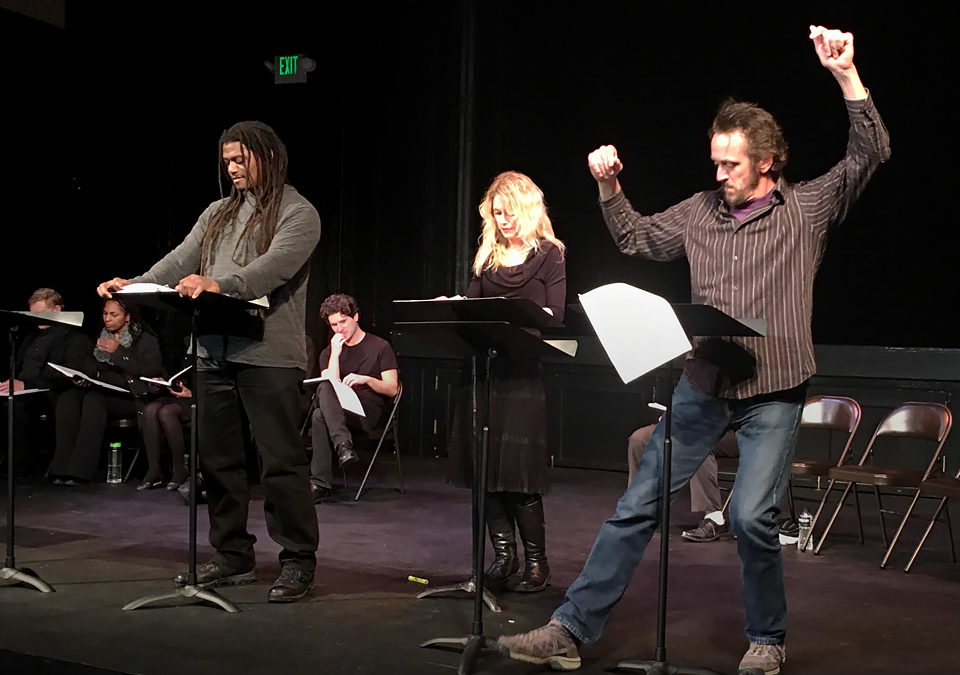
“Onaje” Gets Its First Staged Reading
Thanks to everyone who attended as we kicked the tires on “Onaje” in its first formal staged reading, February 22, 2017 in San Francisco. I’m so grateful for the talents and contributions of director L. Peter Callender of the African American Shakespeare Company, and producer Laura Lundy of Blue Panther Productions.
The actors all did a fantastic job bringing the characters to life, and it was great to see the shape of the play, to hear the words out loud, and get some welcome feedback from everyone.
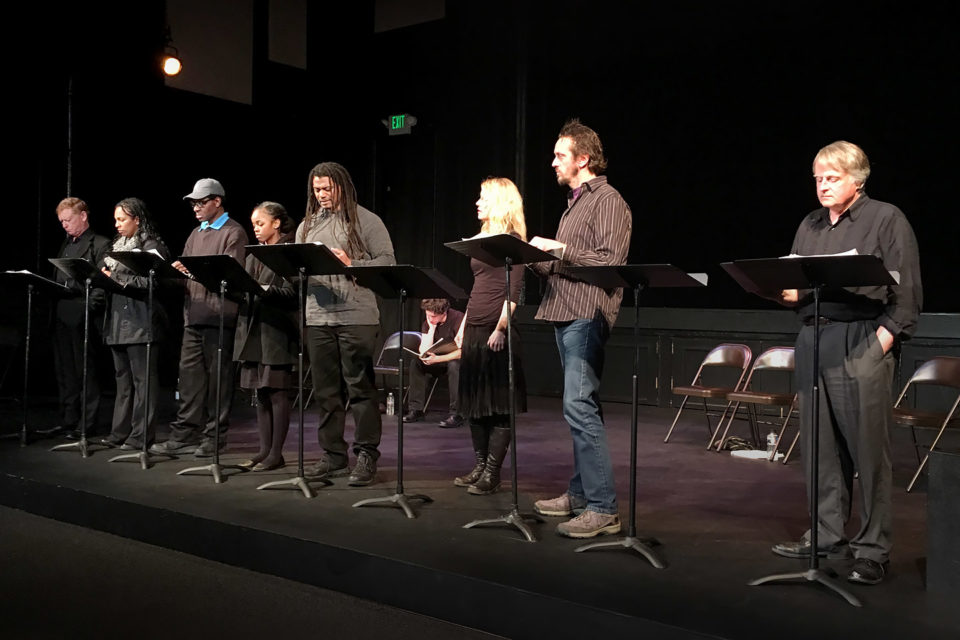
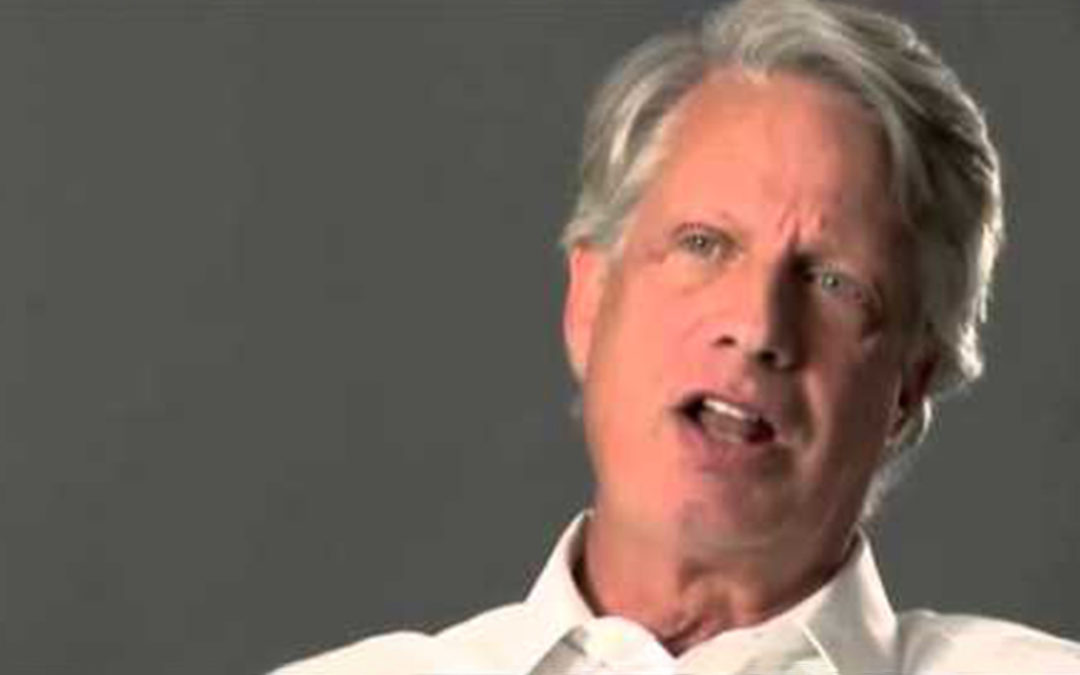
Harvard Stories
Recollections of Elizabeth Bishop, the well-known late-20th Century poet.
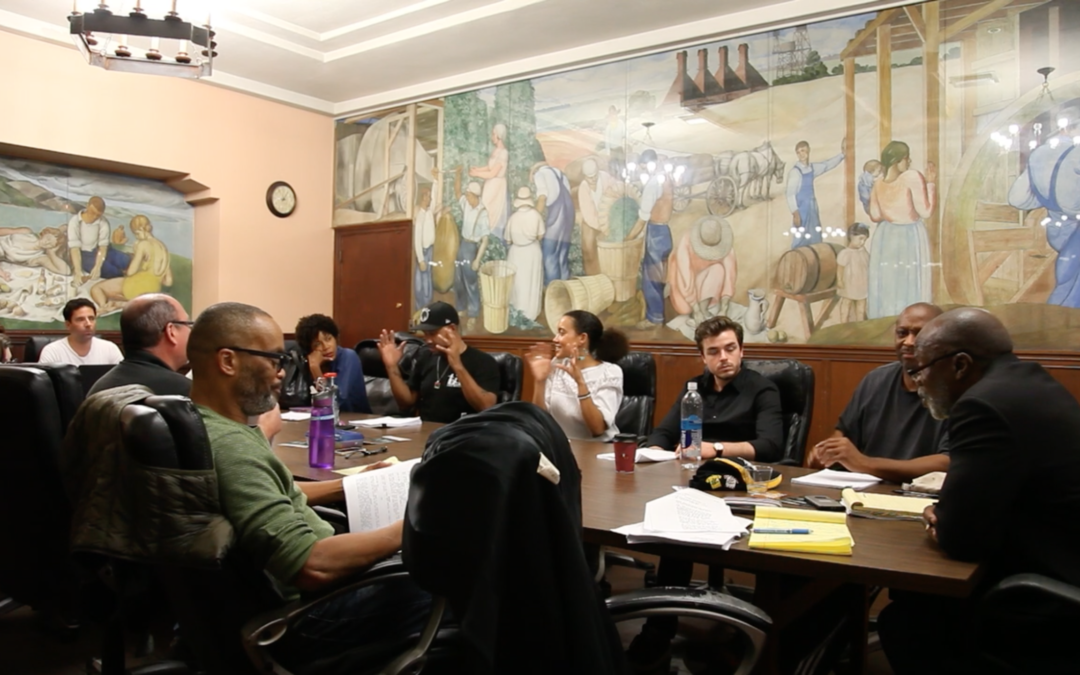
Next Staged Reading Announced for “Onaje”
“Onaje” will receive Its formal Staged Reading directed by Peter Callender at the African American Shakespeare Company in San Francisco on Feburary 22, 2017. Email me if you’d like to know more.
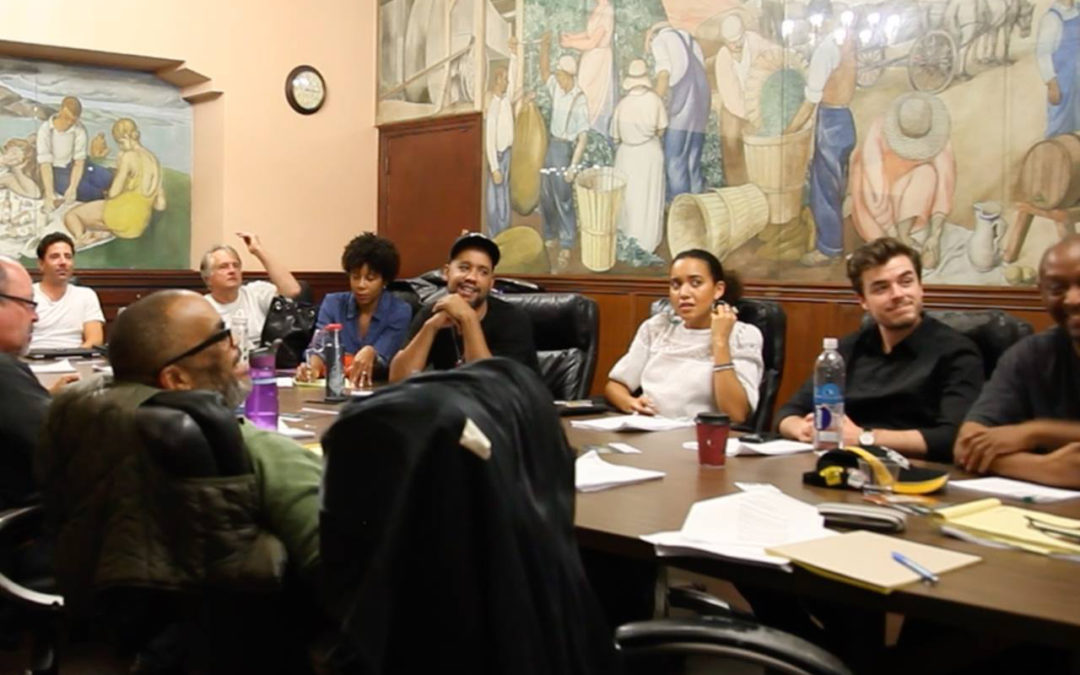
New Play “Onaje” Gets Reading in San Francisco
In San Fran last week “Onaje,” my new play, was given its first West Coast read through under the spirited direction of L. Peter Callender and with the guidance of producer Laura Lundy. It was fantastic! We are off and running!!
A Winter Sonnet
City Snow
From a four o’clock sky the first snowflakes fall
To settle down on trafficked city streets.
Each snowflake falls separately, till all
Conspire to hide the city like a secret.
The last street lights go on, and the snow reflects
Upon the domiciliary landscape.
The more snow falls the less you really expect
The city to be what it’s supposed to be:
It becomes a beautiful blinking shape;
An image of slowing inactivity,
Slowing into snow drifts. It snows very late.
A pronouncement of peace subdues the city.
The drifting snow controls the city violence
With a voice made entirely of silence.



